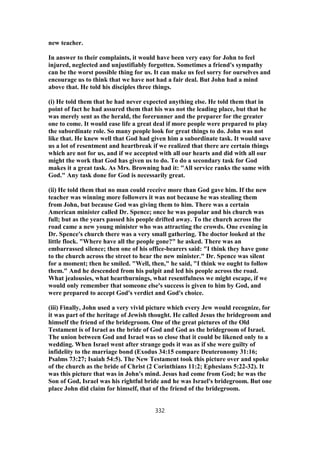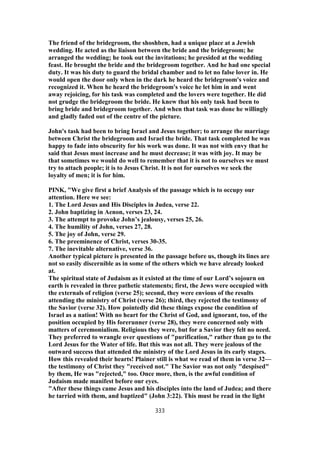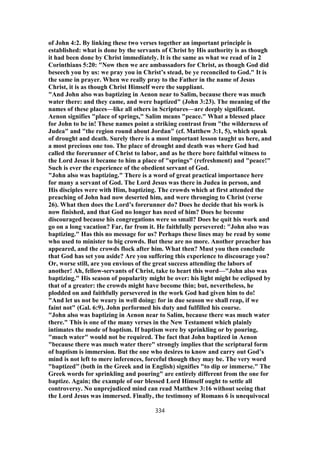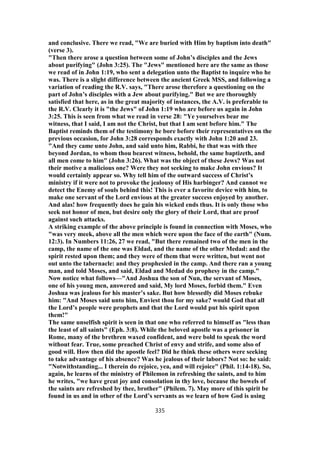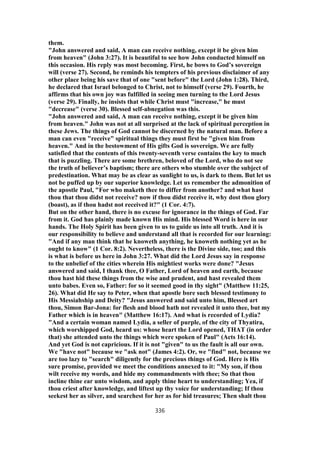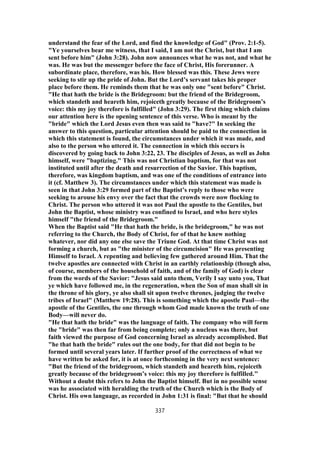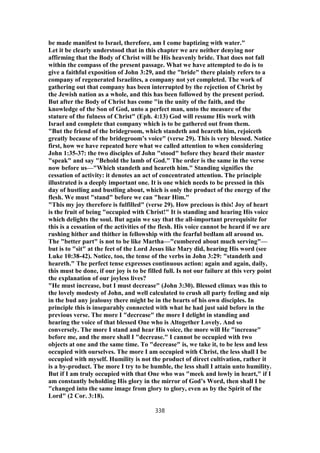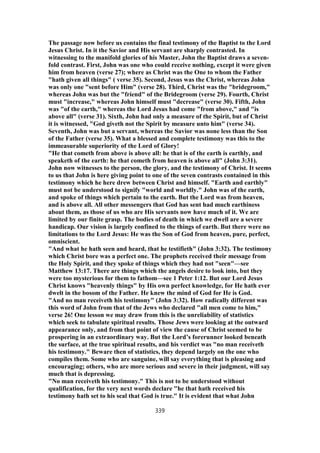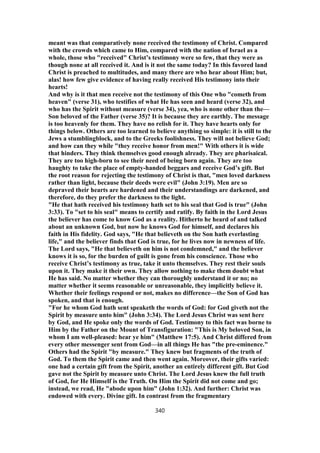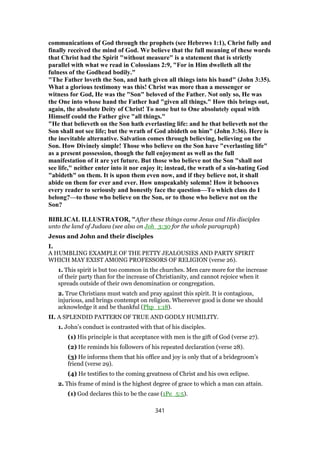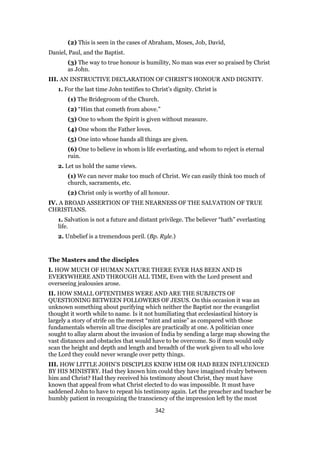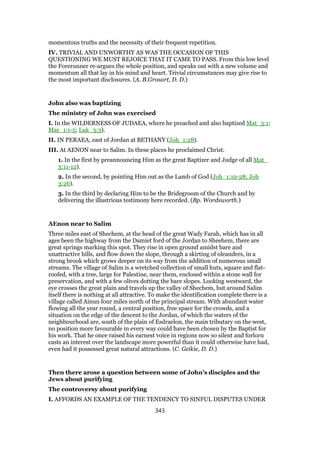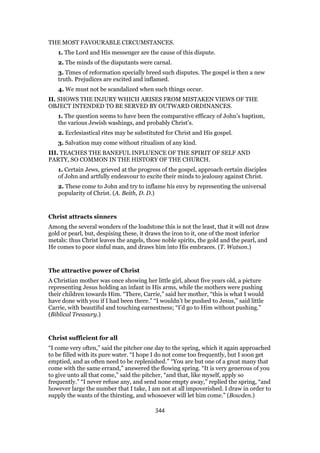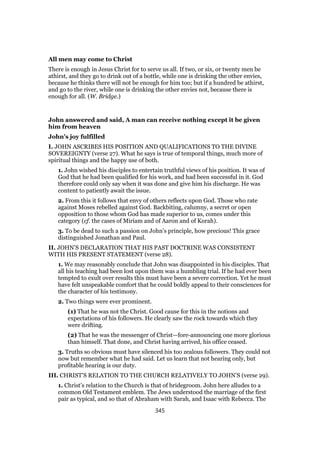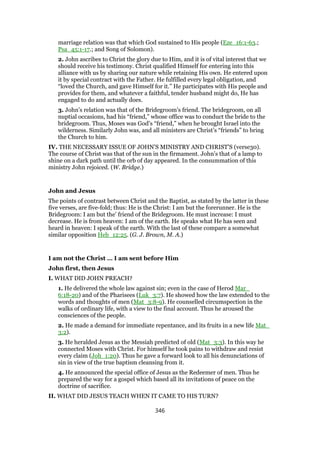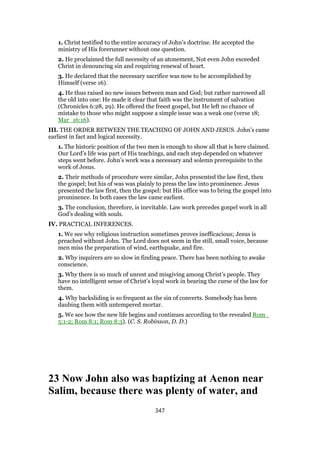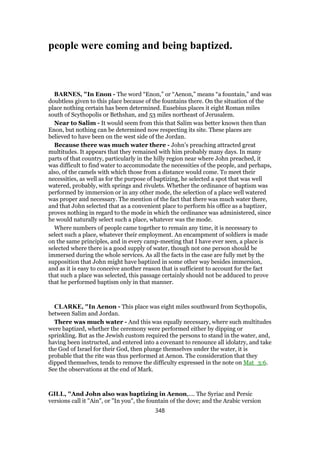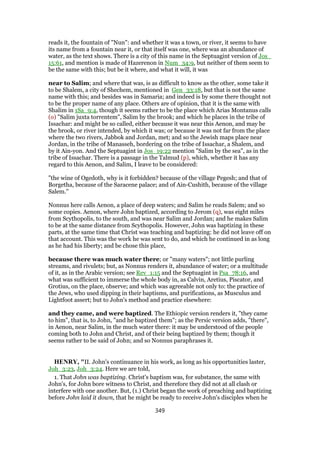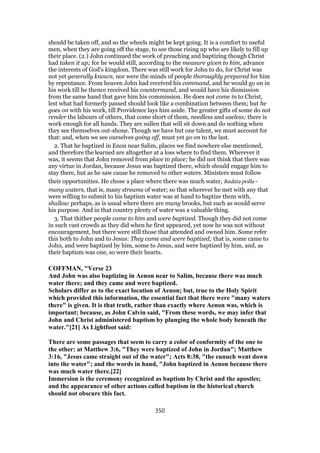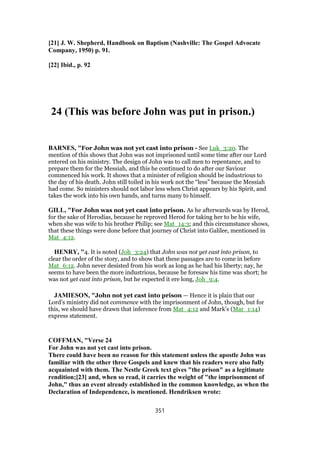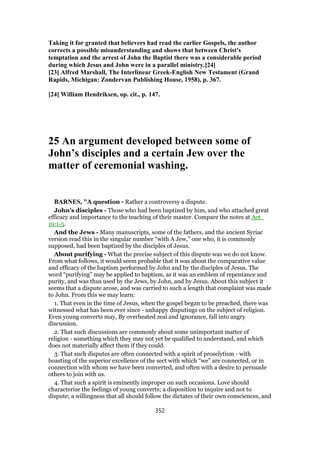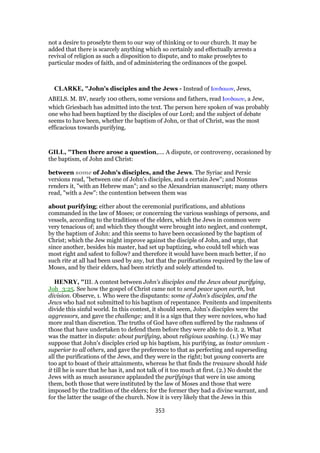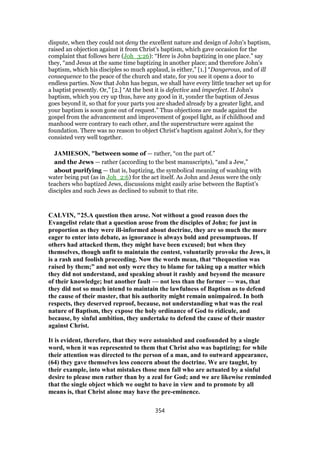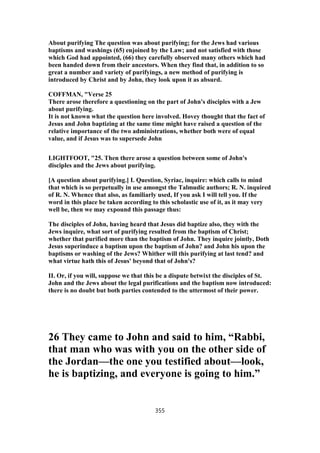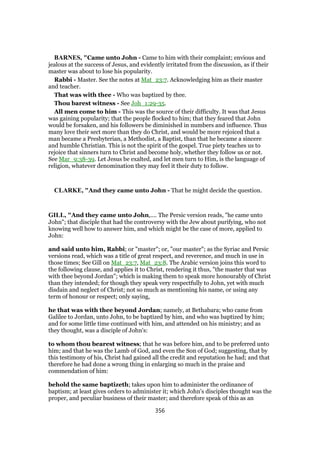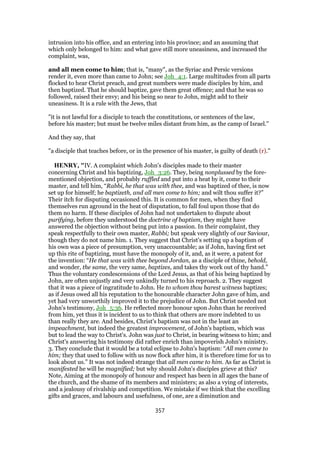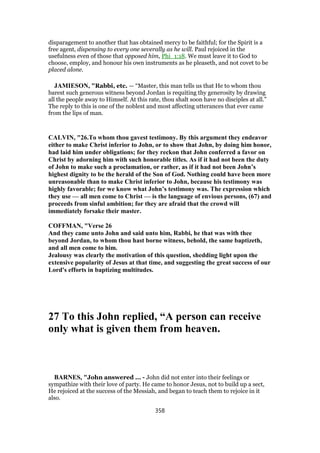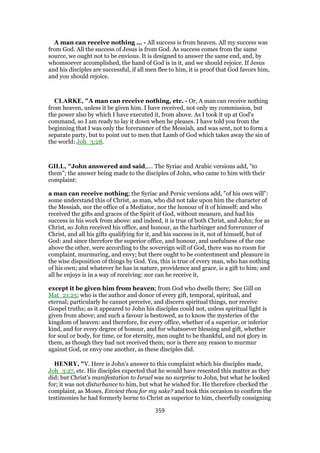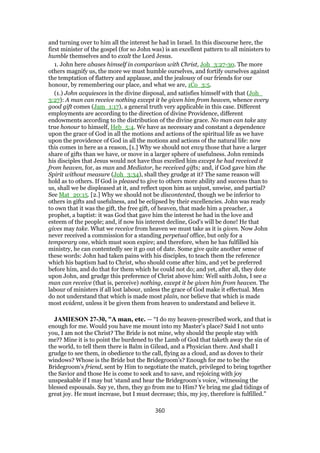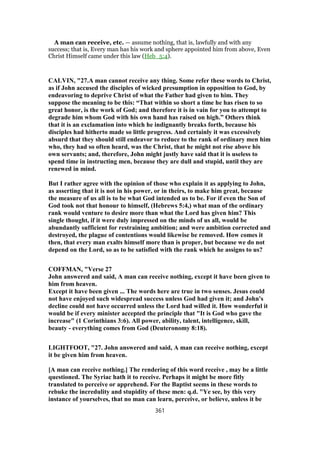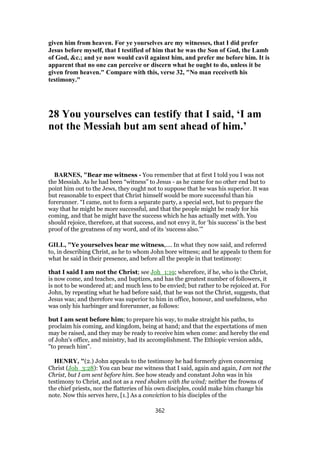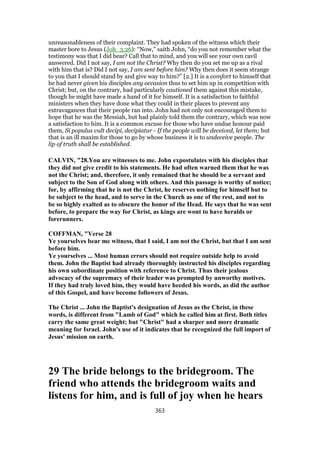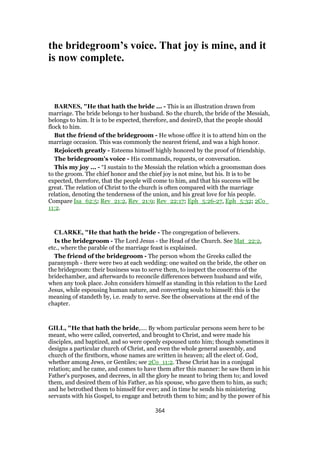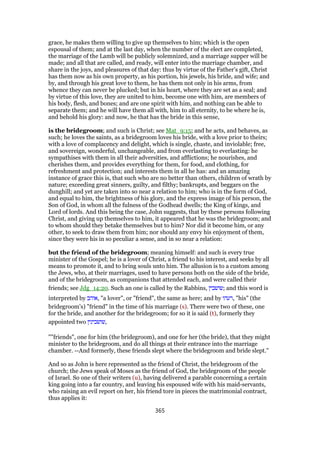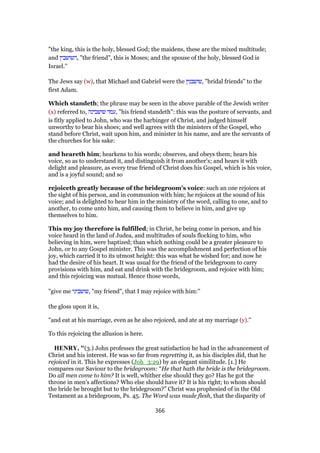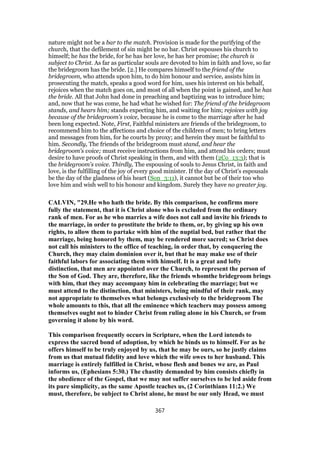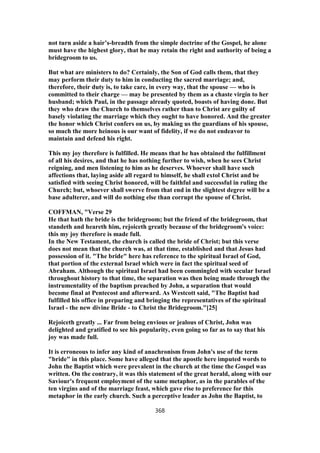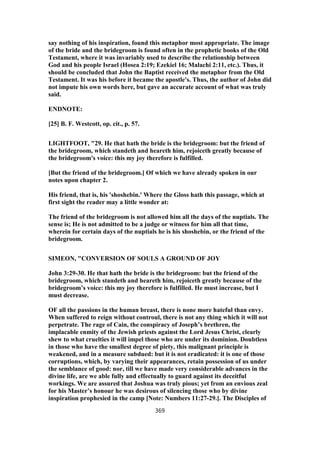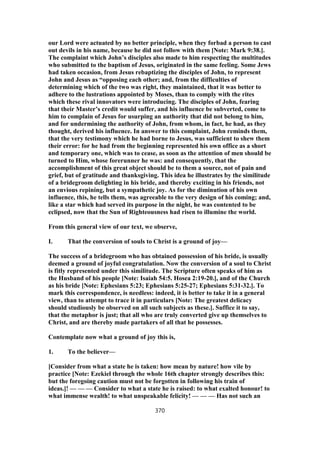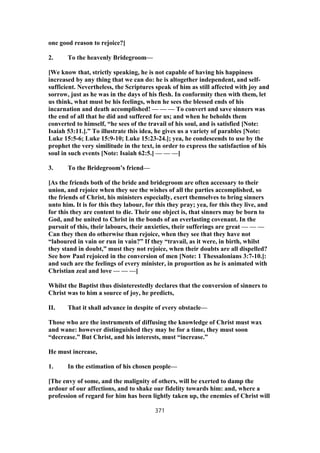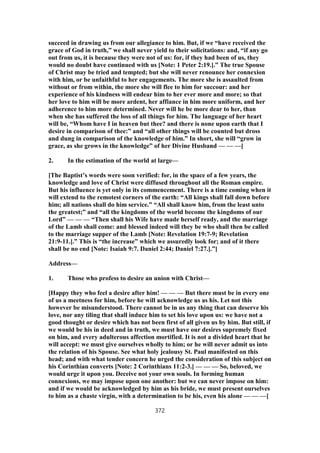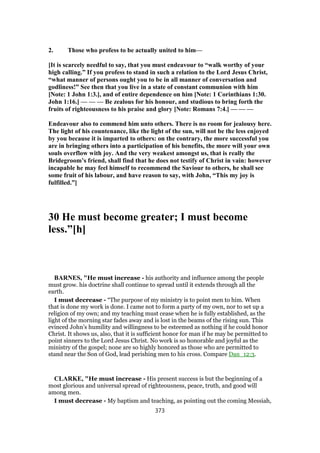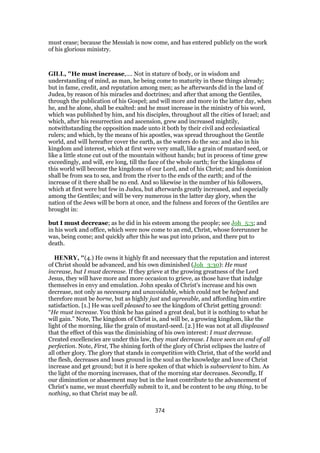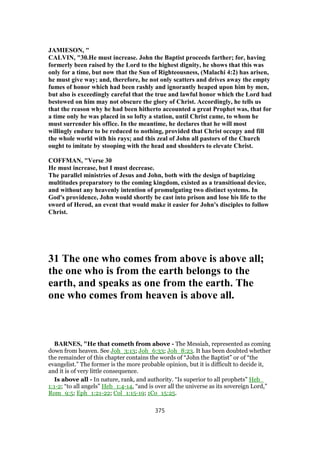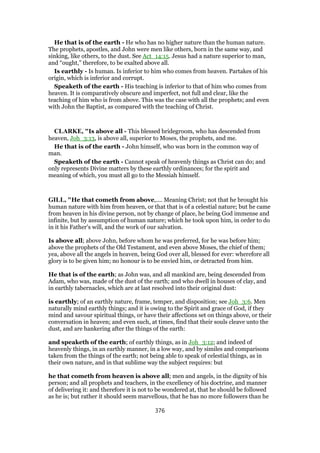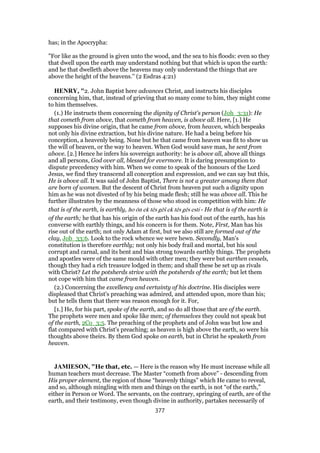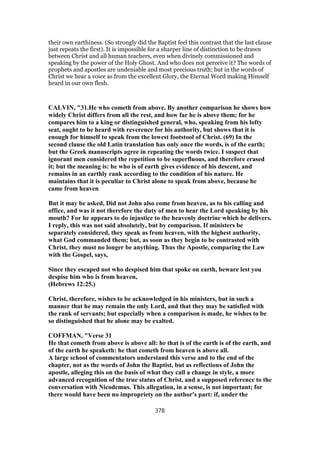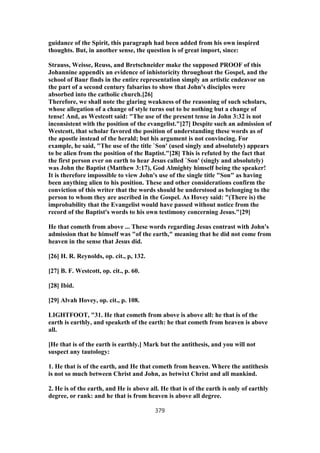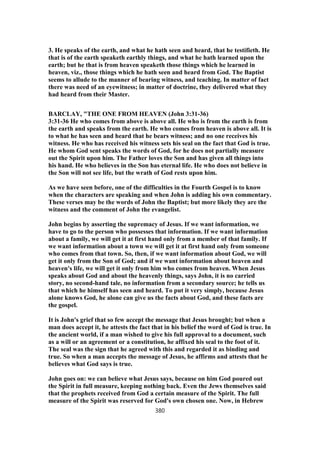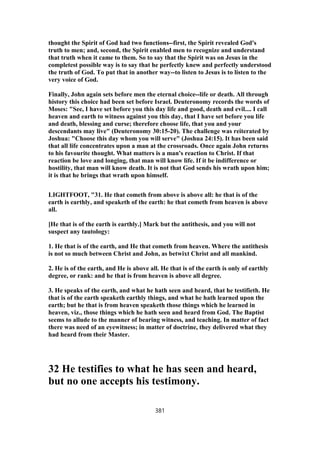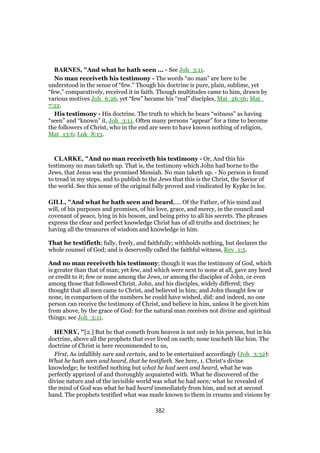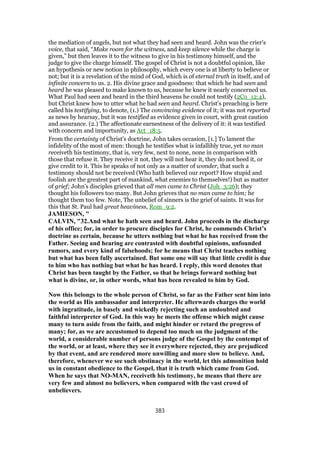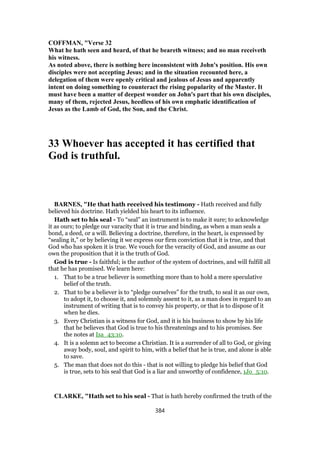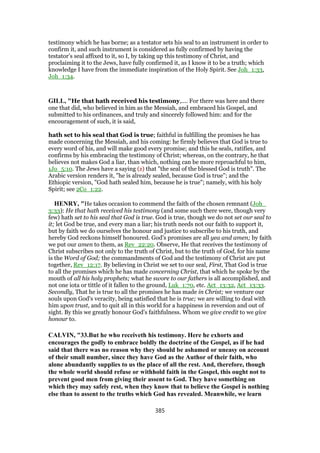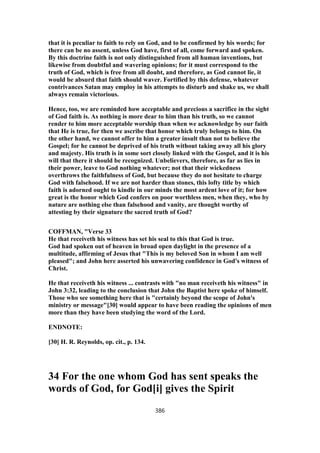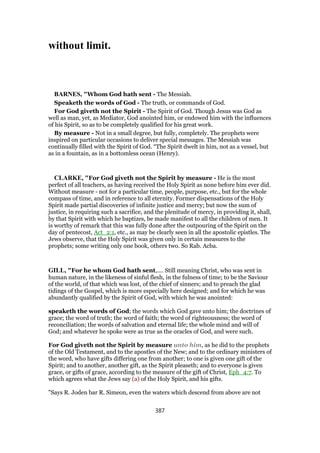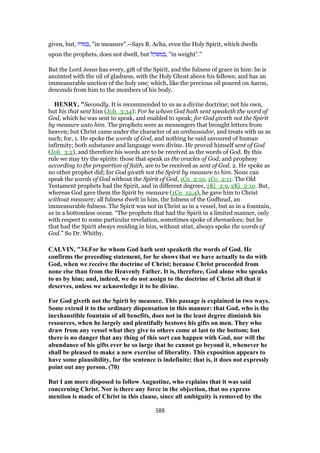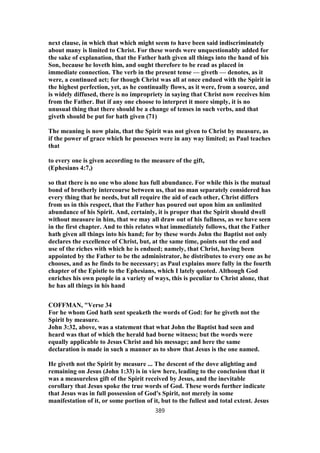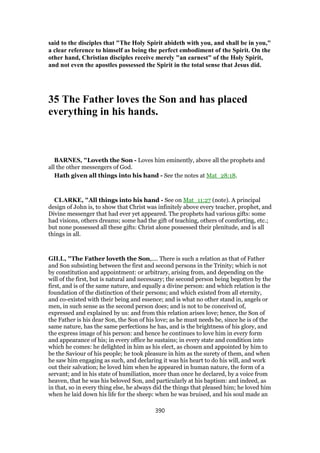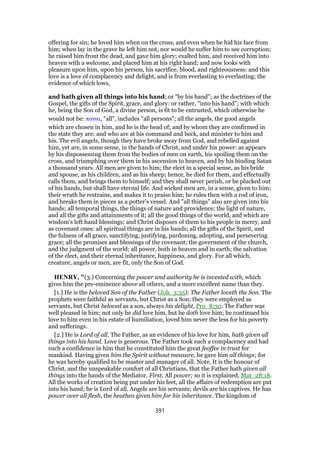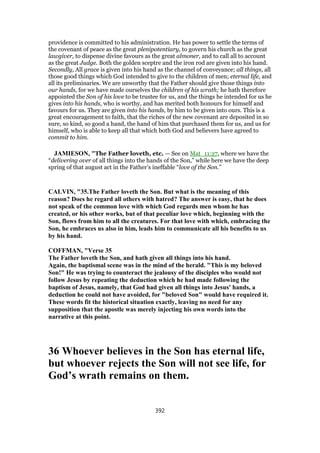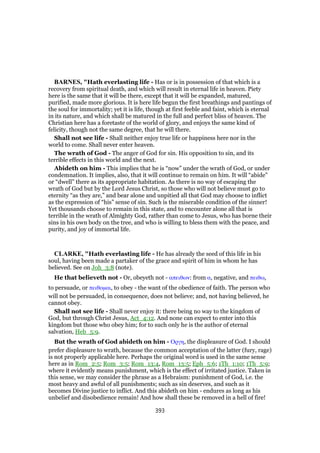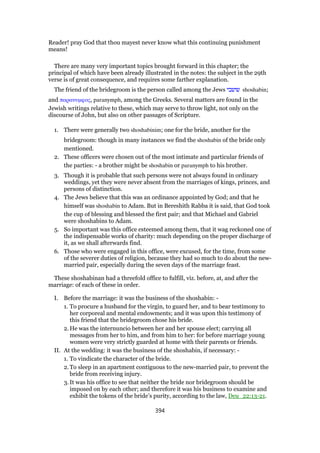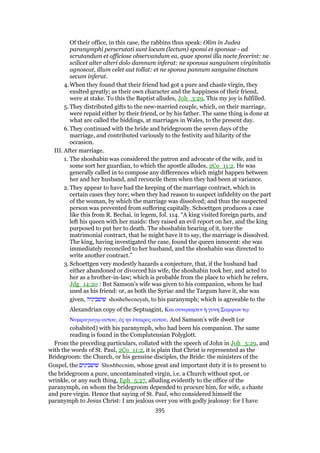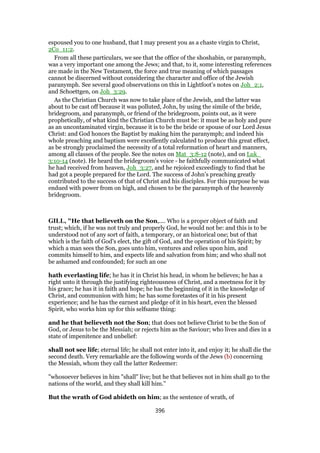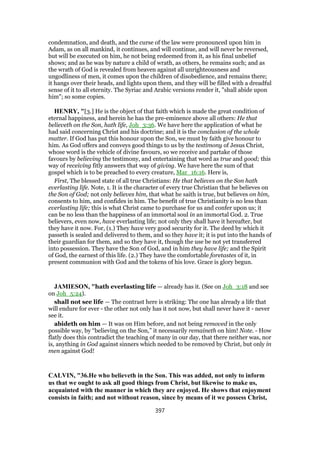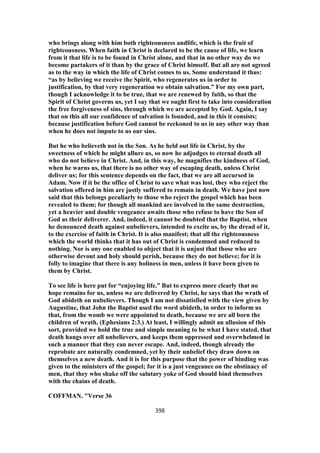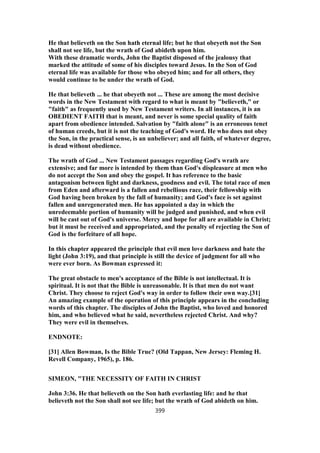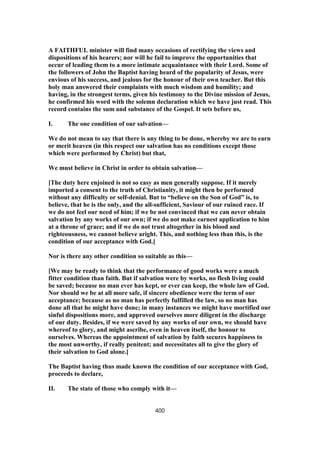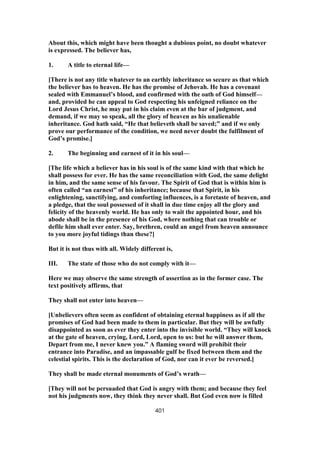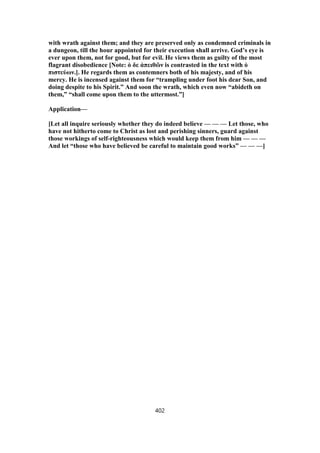The document discusses Nicodemus, a Pharisee and ruler of the Jews who approached Jesus for a conversation at night. It explains his background, status as a member of the Sanhedrin, and how he remained sympathetic to Jesus despite the prevailing opposition against Christ. The commentary also touches on themes of faith, the necessity of spiritual rebirth, and Nicodemus's eventual actions in support of Jesus after his crucifixion.
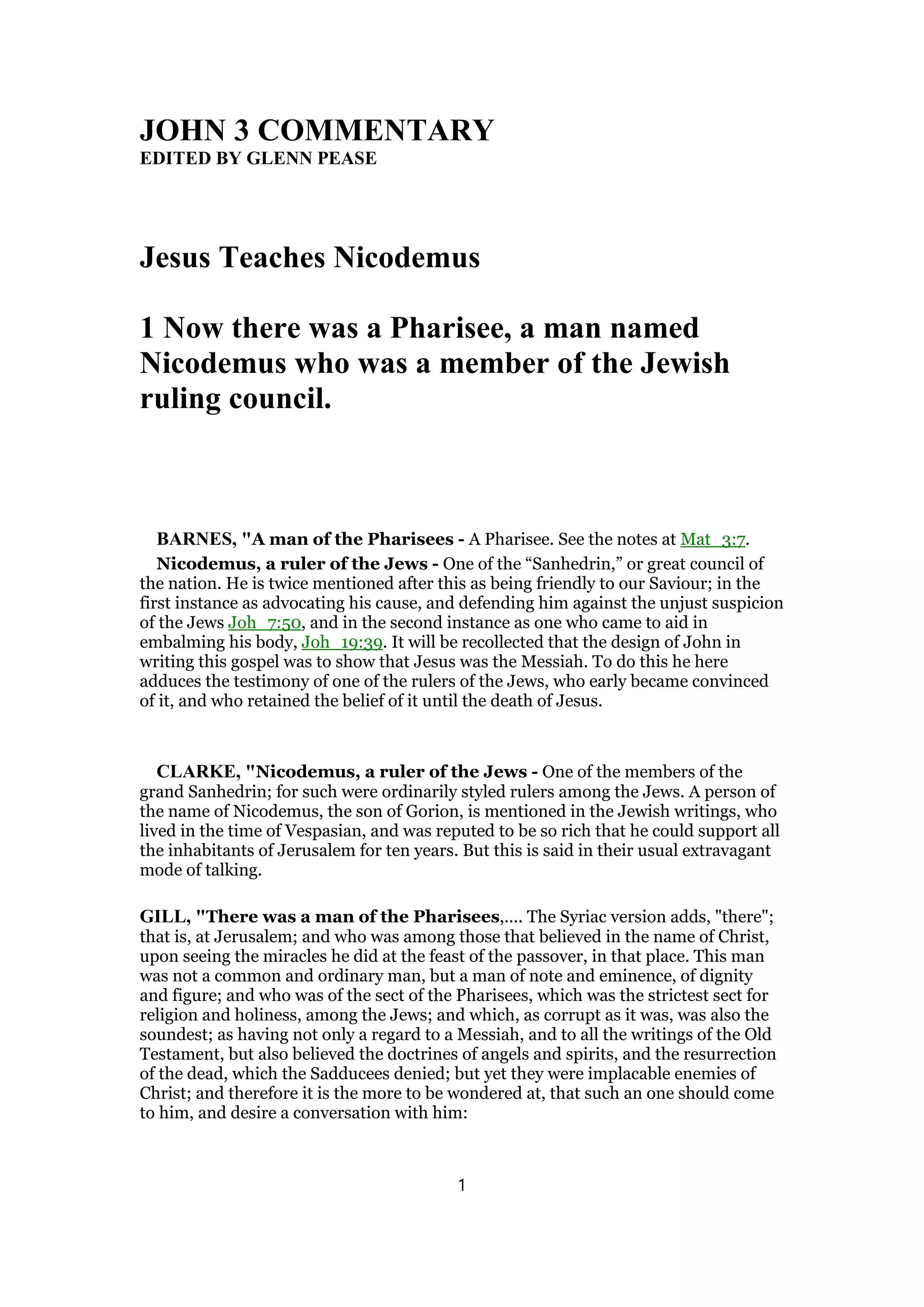
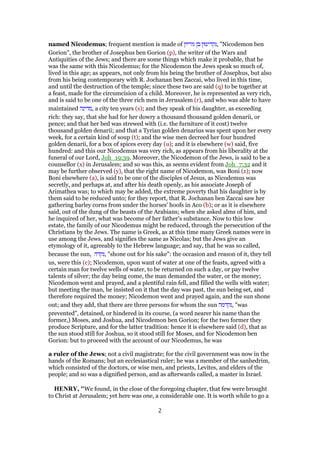
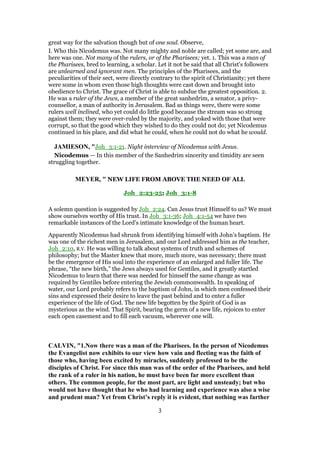
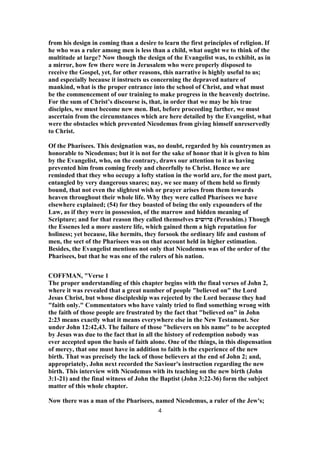
![the same came unto him by night, and said to him, Rabbi, we know that thou art
a teacher come from God; for no one can do these signs that thou doest, except
God be with him. (John 3:1-2)
Nicodemus ... means innocent blood, or victor over the people,[1] depending
upon whether the name is Greek or Hebrew. He was a wealthy Pharisee, member
of the Sanhedrin, teacher of theology, and known as a "ruler of the Jews," a title
reserved in Rabbinic literature "for a great man, or a prince."[2] For an article
on the Pharisees, see my Commentary on Matthew, Matthew 3:7.
The connection here with events of the preceding chapter is dramatic,
Nicodemus clearly being one of those "believers" who did not obey the Lord.
The omniscience of Jesus is evident in his answering the question of Nicodemus
without his utterance of the question. Nicodemus is mentioned three times in this
Gospel: (1) He came to Christ (John 3:2); (2) He spoke for Christ (John 7:45-52);
and (3) He honored Christ (John 19:39,40); and in each instance the
circumstance of his coming to Jesus by night is mentioned.
The same came unto him by night ... Some have supposed that the night
interview resulted from Nicodemus' fear of his peers in the Sanhedrin, but the
idea of secrecy must be imported into the text. It is just as reasonable to suppose
that the night afforded the best opportunity. In the absence of certain
knowledge, one conjecture is as good as another. Although Nicodemus spoke up
on behalf of Jesus before the Sanhedrin (John 7:45-52), it is not recorded that he
did so when that body condemned Jesus to death, hence, the inference that he
was not present at that trial. After Jesus' death, Nicodemus and Joseph of
Arimathea prepared the body for burial (John 19:39,40). One can hope that,
after the resurrection, this sincere, fair-minded man became a loyal disciple.
OOYvery center of Judaism. These words admit that the whole Sanhedrin knew
of the heavenly origin of Jesus and of the validity of his astounding miracles.
Only one of the great signs John selected for this Gospel had been recorded at
this point; but Nicodemus' words, along with John 2:23, show that many signs
had been wrought.
For no one can do these signs ... See above paragraph. How amazing it is that
with such evidence before them, so few, probably only this man and Joseph of
Arimathea, were touched in their hearts sufficiently to lead them to Jesus.
[1] Herbert Lockyer, All the Men of the Bible (Grand Rapids, Michigan:
Zondervan Publishing Company, 1958), p. 259.
[2] Brooks Foss Westcott, The Gospel according to St. John (Grand Rapids,
Michigan: William B. Eerdmans Publishing Company, 1971), p. 248.
LIGHTFOOT, "Verse 1
1. There was a man of the Pharisees, named Nicodemus, a ruler of the Jews:
[Nicodemus.] The Talmudists frequently mention Nicodemus. Now the Jews
5](https://image.slidesharecdn.com/john3commentary-151103172742-lva1-app6891/85/John-3-commentary-5-320.jpg)
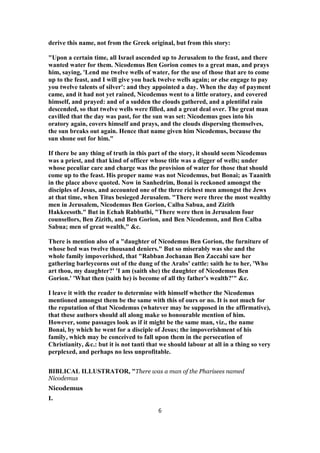
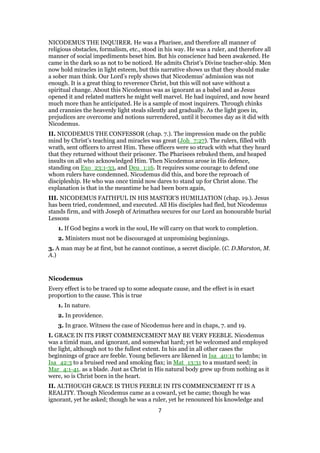
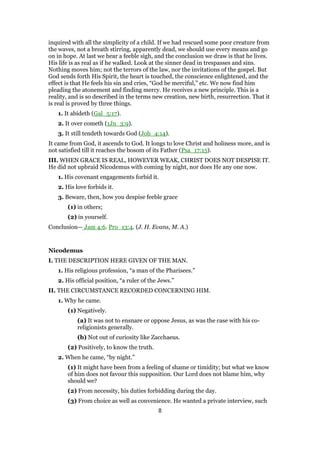
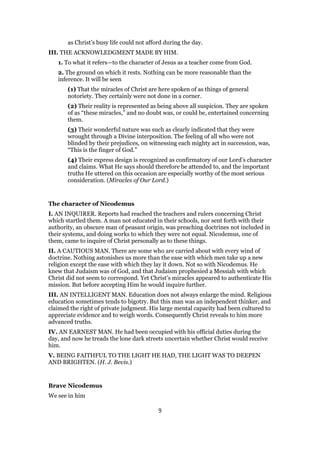
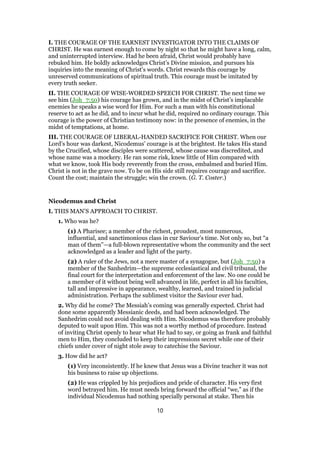
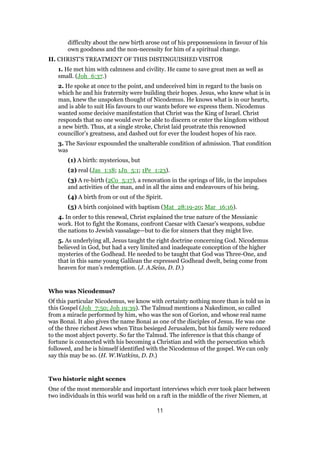
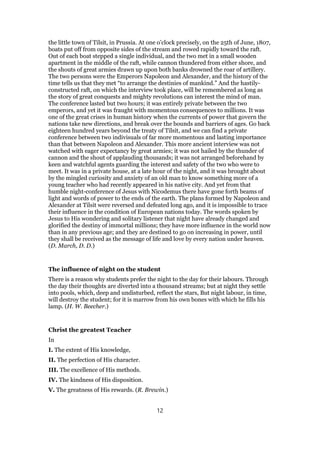
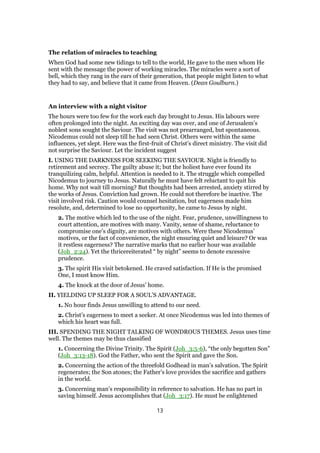
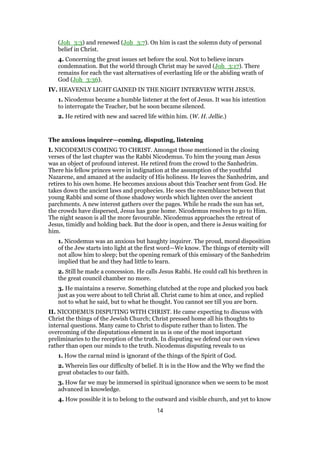
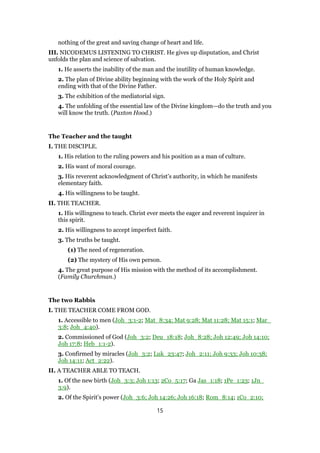
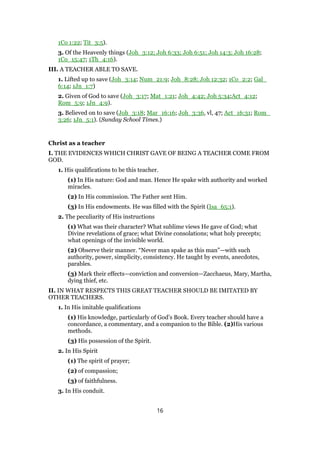
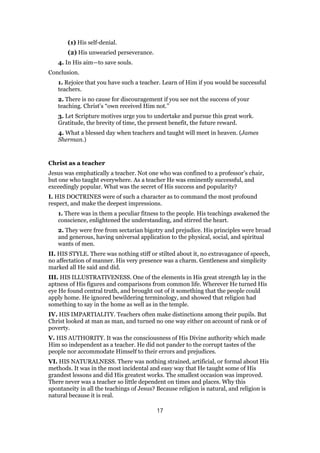
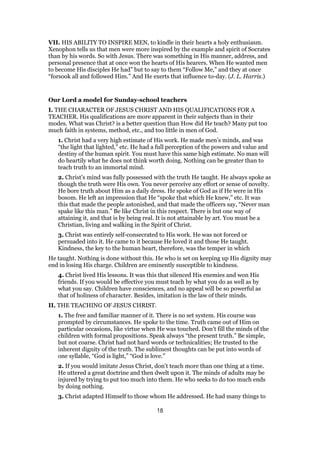
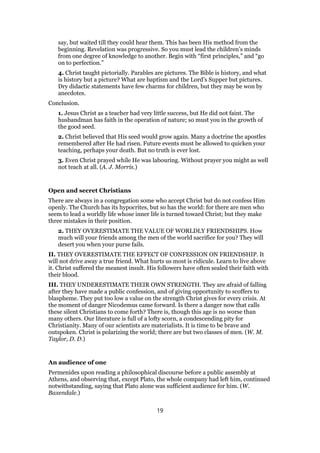
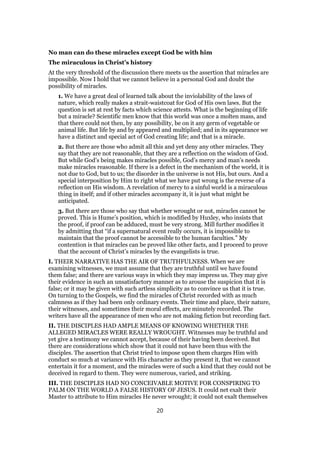
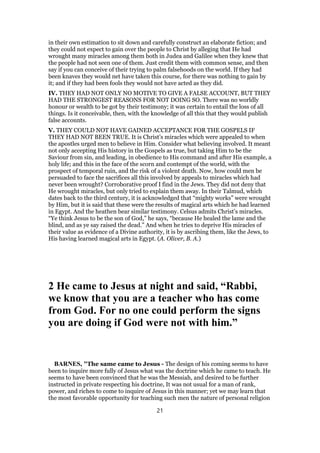
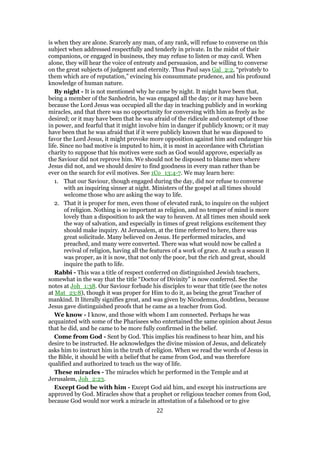
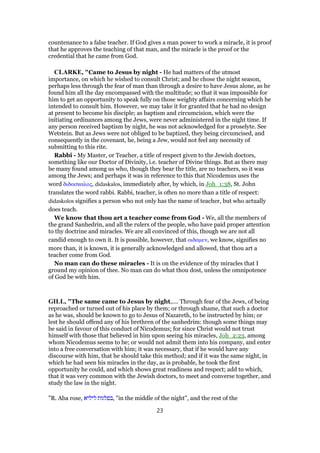
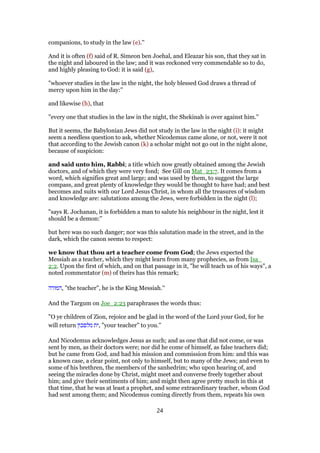
![sense and theirs, supported by the following reason:
for no man can do these miracles that thou dost, except God be with him:
referring to the miracles he had done at the passover in Jerusalem, very lately; see
Joh_2:23. And which, though they are not particularly mentioned, may be concluded
to be such, as the dispossessing of devils, the curing of all manner of diseases by a
word, or touch, from what he at other times, and elsewhere did. Miracles were
expected by the Jews, to be wrought by the Messiah, and many believed in Jesus on
this account; see Joh_6:14; though the modern Jews deny it to be necessary, that
miracles should be done by the Messiah (n); but Nicodemus, and other Jews, thought
otherwise, and considered the miracles of Christ as such, as could never be done by
man, nor without the presence and power of God; and concluded that he was with
God, and God with him, and was the true Immanuel, who is God with us.
HENRY, "II. His solemn address to our Lord Jesus Christ, Joh_3:2. See here,
1. When he came: He came to Jesus by night. Observe, (1.) He made a private and
particular address to Christ, and did not think it enough to hear his public
discourses. He resolved to talk with him by himself, where he might be free with him.
Personal converse with skilful faithful ministers about the affairs of our souls would
be of great use to us, Mal_2:7. (2.) He made this address by night, which may be
considered, [1.] As an act of prudence and discretion. Christ was engaged all day in
public work, and he would not interrupt him then, nor expect his attendance then,
but observed Christ's hour, and waited on him when he was at leisure. Note, Private
advantages to ourselves and our own families must give way to those that are public.
The greater good must be preferred before the less. Christ had many enemies, and
therefore Nicodemus came to him incognito, lest being known to the chief priests
they should be the more enraged against Christ. [2.] As an act of zeal and
forwardness. Nicodemus was a man of business, and could not spare time all day to
make Christ a visit, and therefore he would rather take time from the diversions of
the evening, or the rest of the night, than not converse with Christ. When others
were sleeping, he was getting knowledge, as David by meditation, Psa_63:6, and
Psa_119:148. Probably it was the very next night after he saw Christ's miracles, and
he would not neglect the first opportunity of pursuing his convictions. He knew not
how soon Christ might leave the town, nor what might happen betwixt that and
another feast, and therefore would lose no time. In the night his converse with Christ
would be more free, and less liable to disturbance. These were Noctes Christianae -
Christian nights, much more instructive than the Noctes Atticae - Attic nights. Or,
[3.] As an act of fear and cowardice. He was afraid, or ashamed, to be seen with
Christ, and therefore came in the night. When religion is out of fashion, there are
many Nicodemites, especially among the rulers, who have a better affection to Christ
and his religion than they would be known to have. But observe, First, Though he
came by night, Christ bade him welcome, accepted his integrity, and pardoned his
infirmity; he considered his temper, which perhaps was timorous, and the
temptation he was in from his place and office; and hereby taught his ministers to
become all things to all men, and to encourage good beginnings, though weak. Paul
preached privately to those of reputation, Gal_2:2. Secondly, Though now he came
by night, yet afterwards, when there was occasion, he owned Christ publicly, Joh_
7:50; Joh_19:39. The grace which is at first but a grain of mustard-seed may grow to
be a great tree.
2. What he said. He did not come to talk with Christ about politics and state-affairs
(though he was a ruler), but about the concerns of his own soul and its salvation,
and, without circumlocution, comes immediately to the business; he calls Christ
Rabbi, which signifies a great man; see Isa_19:20. He shall send them a Saviour,
25](https://image.slidesharecdn.com/john3commentary-151103172742-lva1-app6891/85/John-3-commentary-25-320.jpg)
![and a great one; a Saviour and a rabbi, so the word is. There are hopes of those who
have a respect for Christ, and think and speak honourably of him. He tells Christ how
far he had attained: We know that thou art a teacher. Observe, (1.) His assertion
concerning Christ: Thou art a teacher come from God; not educated nor ordained by
men, as other teachers, but supported with divine inspiration and divine authority.
He that was to be the sovereign Ruler came first to be a teacher; for he would rule
with reason, not with rigour, by the power of truth, not of the sword. The world lay in
ignorance and mistake; the Jewish teachers were corrupt, and caused them to err: It
is time for the Lord to work. He came a teacher from God, from God as the Father of
mercies, in pity to a dark deceived world; from God as the Father of lights and
fountain of truth, all the light and truth upon which we may venture our souls. (2.)
His assurance of it: We know, not only I, but others; so he took it for granted, the
thing being so plain and self-evident. Perhaps he knew that there were divers of the
Pharisees and rulers with whom he conversed that were under the same convictions,
but had not the grace to own it. Or, we may suppose that he speaks in the plural
number (We know) because he brought with him one or more of his friends and
pupils, to receive instructions from Christ, knowing them to be of common concern.
“Master,” saith he, “we come with a desire to be taught, to be thy scholars, for we are
fully satisfied thou art a divine teacher.” (3.) The ground of this assurance: No man
can do those miracles that thou doest, except God be with him. Here, [1.] We are
assured of the truth of Christ's miracles, and that they were not counterfeit. Here was
Nicodemus, a judicious, sensible, inquisitive man, one that had all the reason and
opportunity imaginable to examine them, so fully satisfied that they were real
miracles that he was wrought upon by them to go contrary to his interest, and to the
stream of those of his own rank, who were prejudiced against Christ. [2.] We are
directed what inference to draw from Christ's miracles: Therefore we are to receive
him as a teacher come from God. His miracles were his credentials. The course of
nature could not be altered but by the power of the God of nature, who, we are sure,
is the God of truth and goodness, and would never set his seal to a lie or a cheat.
JAMIESON, "came to Jesus by night — One of those superficial “believers”
mentioned in Joh_2:23, Joh_2:24, yet inwardly craving further satisfaction,
Nicodemus comes to Jesus in quest of it, but comes “by night” (see Joh_19:38, Joh_
19:39; Joh_12:42); he avows his conviction that He was
come from God — an expression never applied to a merely human messenger,
and probably meaning more here - but only as “a teacher,” and in His miracles he
sees a proof merely that “God is with Him.” Thus, while unable to repress his
convictions, he is afraid of committing himself too far.
CALVIN, "2.He came to Jesus by night. From the circumstance of his coming by
night we infer that his timidity was excessive; for his eyes were dazzled, as it
were, by the splendor of his own greatness and reputation. (55) Perhaps too he
was hindered by shame, for ambitious men think that their reputation is utterly
ruined, if they have once descended from the dignity of teachers to the rank of
scholars; and he was unquestionably puffed up with a foolish opinion of his
knowledge. In short, as he had a high opinion of himself, he was unwilling to lose
any part of his elevation. And yet there appears in him some seed of piety; for
hearing that a Prophet of God had appeared, he does not despise or spurn the
doctrine which has been brought from heaven, and is moved by some desire to
obtain it, — a desire which sprung from nothing else than fear and reverence for
26](https://image.slidesharecdn.com/john3commentary-151103172742-lva1-app6891/85/John-3-commentary-26-320.jpg)
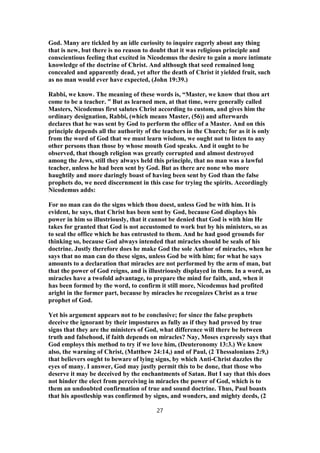
![Corinthians 12:12.) To whatever extent Satan may, like an ape, counterfeit the
works of God in the dark, yet when the eyes are opened and the light of spiritual
wisdom shines, miracles are a sufficiently powerful attestation of the presence of
God, as Nicodemus here declares it to be.
LIGHTFOOT, "2. The same came to Jesus by night, and said unto him, Rabbi,
we know that thou art a teacher come from God: for no man can do these
miracles that thou doest, except God be with him.
[We know.] It may be a question whether Nicodemus, using the plural number
[we know], does by that seem to own that the whole Sanhedrim (of which himself
was a member) acknowledge the same thing. I am apt to think the fathers of the
Sanhedrim could not well tell how indeed to deny it: which will be more largely
discussed upon chapter 11:48. But we know may either be the plural or the
singular, which in the first person is most commonly used in all languages. Or
else, we know, may signify as much as, it is commonly owned and acknowledged.
[Thou art a teacher come from God.] Nicodemus seems to have reference to the
long cessation of prophecy which had not been known in that nation for above
four hundred years now past; in which space of time there had been no masters
or teachers of the people instituted but by men and the imposition of hands; nor
had there in that appeared any one person that would pretend to teach them by a
spirit of prophecy:--But we see that thou art a teacher sent from God.
MACLAREN, "TEACHER OR SAVIOUR?
The connection in which the Evangelist introduces the story of Nicodemus throws
great light on the aspect under which we are to regard it. He has just been saying that
upon our Lord’s first visit to Jerusalem at the Passover there was a considerable
amount of interest excited, and a kind of imperfect faith in Him drawn out, based
solely on His miracles. He adds that this faith was regarded by Christ as unreliable;
and he goes on to explain that our Lord exercised great reserve in His dealings with
the persons who professed it, for the reason that ‘He knew all men, and needed not
that any should testify of man, for He knew what was in man.’
Now, if you note that reiteration of the word ‘man,’ you will understand the
description which is given of the person who is next introduced. ‘He knew what was
in man. There was a man of the Pharisees named Nicodemus, a ruler of the Jews.’ It
would have been enough to have said, ‘There was a Pharisee.’ When John says ‘a man
of the Pharisees,’ he is not merely carried away by the echo in his ears of his own last
words, but it is as if he had said, ‘Now, here is one illustration of the sort of thing that
I have been speaking about; one specimen of an imperfect faith built upon miracles;
and one illustration of the way in which Jesus Christ dealt with it.’
Nicodemus was ‘a Pharisee.’ That tells us the school to which he belonged, and the
general drift of his thought. He was ‘a ruler of the Jews.’ That tells us that he held an
official position in the supreme court of the nation, to which the Romans had left
some considerable shadow of power in ecclesiastical matters. And this man comes to
Christ and acknowledges Him. Christ deals with him in a very suggestive fashion. His
confession, and the way in which our Lord received it, are what I desire to consider
28](https://image.slidesharecdn.com/john3commentary-151103172742-lva1-app6891/85/John-3-commentary-28-320.jpg)
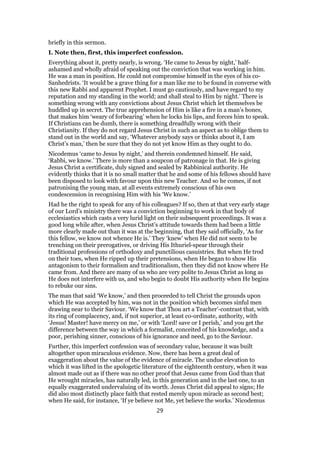
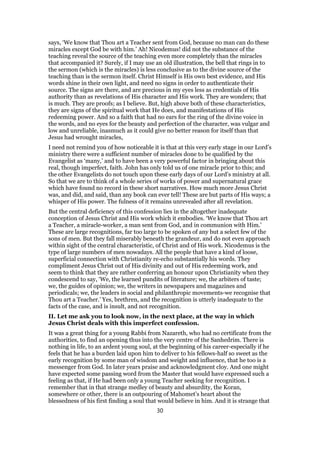
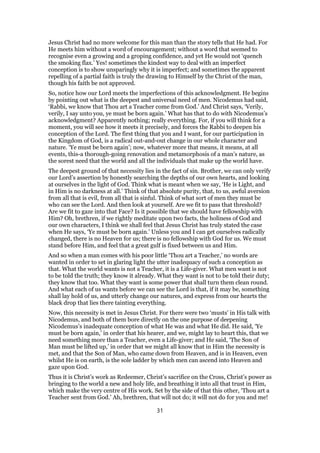
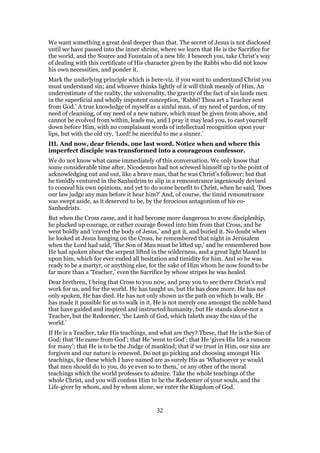
![3 Jesus replied, “Very truly I tell you, no one
can see the kingdom of God unless they are
born again.[a]”
BARNES, "Verily, verily - An expression of strong affirmation, denoting the
certainty and the importance of what he was about to say. Jesus proceeds to state one
of the fundamental and indispensable doctrines of his religion. It may seem
remarkable that he should introduce this subject in this manner; but it should be
remembered that Nicodemus acknowledged that he was a teacher come from God;
that he implied by that his readiness and desire to receive instruction; and that it is
not wonderful, therefore, that Jesus should commence with one of the fundamental
truths of his religion. It is no part of Christianity to conceal anything. Jesus declared
to every man, high or low, rich or poor, the most humbling truths of the gospel.
Nothing was kept back for fear of offending men of wealth or power; and for them, as
well as the most poor and lowly, it was declared to be indispensable to experience, as
the first thing in religion, a change of heart and of life.
Except a man - This is a universal form of expression designed to include all
mankind. Of “each and every man” it is certain that unless he is born again he cannot
see the kingdom of God. It includes, therefore, men of every character and rank, and
nation, moral and immoral, rich and poor, in office and out of office, old and young,
bond and free, the slave and his master, Jew and Gentile. It is clear that our Saviour
intended to convey to Nicodemus the idea, also, that “he” must be born again. It was
not sufficient to be a Jew, or to acknowledge him to be a teacher sent by God that is,
the Messiah; it was necessary, in addition to this, to experience in his own soul that
great change called the “new birth” or regeneration.
Be born again - The word translated here “again” means also “from above,” and
is so rendered in the margin. It is evident, however, that Nicodemus understood, it
not as referring to a birth “from above,” for if he had he would not have asked the
question in Joh_3:4. It is probable that in the language which he used there was not
the same ambiguity that there is in the Greek. The ancient versions all understood it
as meaning “again,” or the “second time.” Our natural birth introduces us to light, is
the commencement of life, throws us amid the works of God, and is the beginning of
our existence; but it also introduces us to a world of sin. We early go astray. All men
transgress. The imagination of the thoughts of the heart is evil from the youth up. We
are conceived in sin and brought forth in iniquity, and there is none that doeth good,
no, not one. The carnal mind is enmity against God, and by nature we are dead in
trespasses and sins, Gen_8:21; Psa_14:2-3; Psa_51:5; Rom_1:29-32; Rom_3:10-20;
Rom_8:7.
All sin exposes men to misery here and hereafter. To escape from sin, to be happy
in the world to come, it is necessary that man should be changed in his principles, his
33](https://image.slidesharecdn.com/john3commentary-151103172742-lva1-app6891/85/John-3-commentary-33-320.jpg)
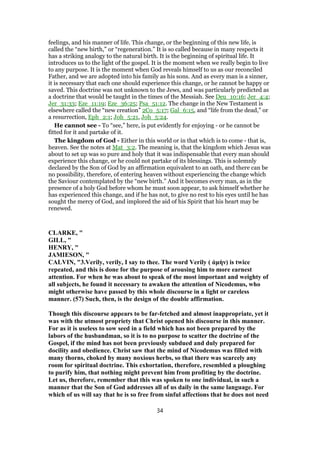
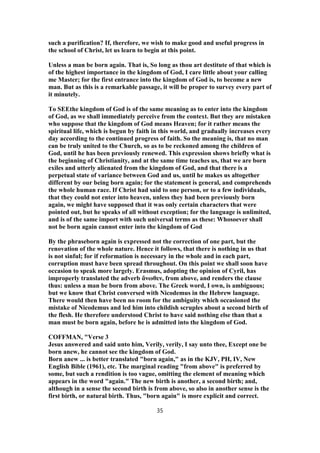
![The doctrine of the new birth will be discussed under John 3:5, where Jesus
more fully described it. Here the emphasis is upon the absolute necessity of it. It
is not merely true that one cannot enter God's kingdom without the new birth;
he cannot even see it! The requirement here stated by Jesus was actually a
demand that Nicodemus forsake all reliance upon the law of Moses, and upon
the elaborate ritual and traditionalism of the Pharisees, and enter upon a totally
new way of life. It was a shocking requirement; and the evidence is that
Nicodemus, at that point in time, was not able to accept it.
Concerning the abrupt manner of Jesus' speaking to Nicodemus, Hovey said:
The answer seems abrupt, but it is unnecessary to suppose the omission of any
connecting thought. For Jesus, being recognized as a teacher from God, and
reading for himself at a glance the character of Nicodemus, as well as the
question in his heart, viz.: "What must a man do in order to enter Messiah's
kingdom?" (Meyer) ... declares at once that a new birth a new life, is
indispensable to any real knowledge of the kingdom of God. "No one," he says,
"whether Jew or Gentile, can grow up and glide over from nature to grace; every
one must begin his life altogether anew, in order to share in my kingdom,"[3]
The kingdom of God ... It is a mistake to minimize the teaching of this Gospel
regarding the kingdom of God. True, John was more concerned with the
credentials of the King, the burden of the Gospel being to prove the deity and
Godhead of Jesus Christ; but the kingdom was never far from his thoughts. In
this great passage, the terms of entering the kingdom are emphatically stated;
and before Pontius Pilate Jesus made pointed reference to "my kingdom" (John
18:36,37). Jesus' great purpose of establishing his kingdom is there stated to have
been his total reason for coming into the world; and John, with the synoptics,
recorded the inscription with the significant words "The King of the Jews"
(John 19:19).
ENDNOTE:
[3] Alvah Hovey, Commentary on John (Philadelphia: The American Baptist
Publication Society, 1885), p. 95.
BARCLAY, "THE MAN WHO CAME BY NIGHT (John 3:1-6)
3:1-6 There was a man who was one of the Pharisees who was called Nicodemus,
a ruler of the Jews. He came to Jesus by night and said to him: "Rabbi, we know
that you are a teacher who has come from God, for no one can do the signs which
you do unless God is with him." Jesus answered him: "This is the truth I tell
you--unless a man is reborn from above, he cannot see the kingdom of God."
Nicodemus said to him: "How can a man be born when he is old? Surely he
cannot enter into his mother's womb a second time and be born?" Jesus
answered: "This is the truth I tell you--unless a man is born of water and the
Spirit, he cannot enter into the kingdom of God. That which is born from the
flesh is flesh, and that which is born of the Spirit is spirit."
For the most part we see Jesus surrounded by the ordinary people, but here we
36](https://image.slidesharecdn.com/john3commentary-151103172742-lva1-app6891/85/John-3-commentary-36-320.jpg)
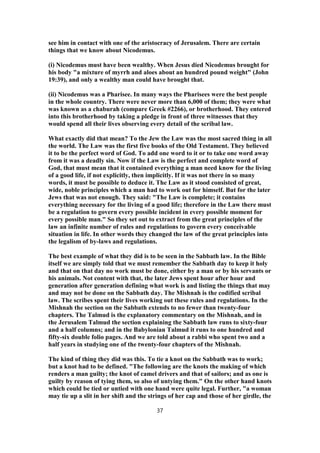
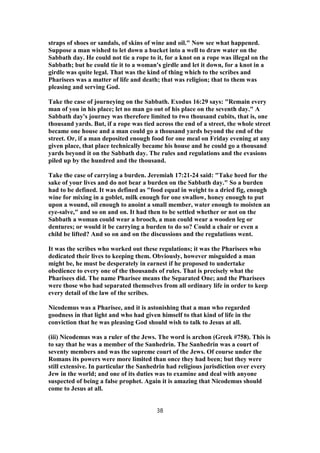
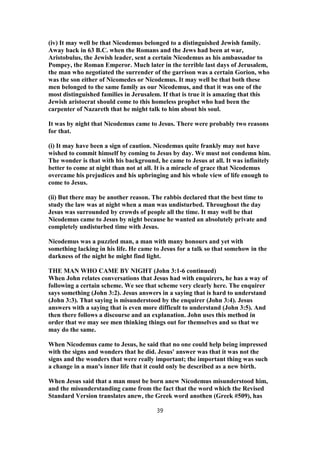
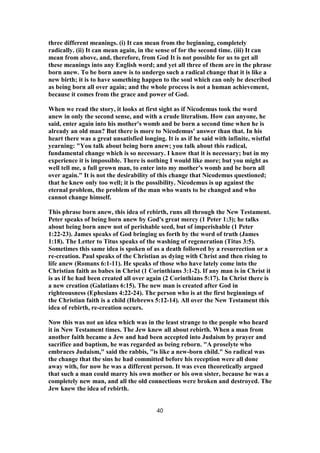
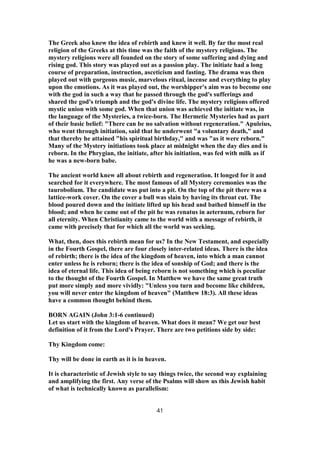
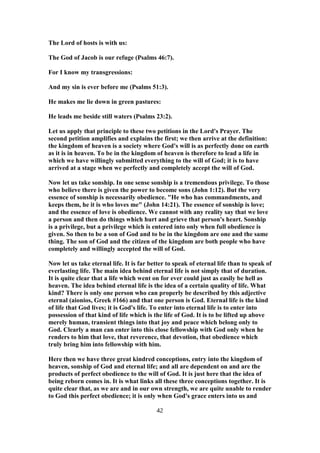
![takes possession of us and changes us that we can give to him the reverence and
the devotion we ought to give. It is through Jesus Christ that we are reborn; it is
when he enters into possession of our hearts and lives that the change comes.
When that happens we are born of water and the Spirit. There are two thoughts
there. Water is the symbol of cleansing. When Jesus takes possession of our lives,
when we love him with all our heart, the sins of the past are forgiven and
forgotten. The Spirit is the symbol of power. When Jesus takes possession of our
lives it is not only that the past is forgotten and forgiven; if that were all, we
might well proceed to make the same mess of life all over again; but into life
there enters a new power which enables us to be what by ourselves we could
never be and to do what by ourselves we could never do. Water and the Spirit
stand for the cleansing and the strengthening power of Christ, which wipes out
the past and gives victory in the future.
Finally, in this passage, John lays down a great law. That which is born of the
flesh is flesh and that which is born of the Spirit is spirit. A man by himself is
flesh and his power is limited to what the flesh can do. By himself he cannot be
other than defeated and frustrated; that we know only too well; it is the
universal fact of human experience. But the very essence of the Spirit is power
and life which are beyond human power and human life; and when the Spirit
takes possession of us, the defeated life of human nature becomes the victorious
life of God.
To be born again is to be changed in such a way that it can be described only as
rebirth and re-creation. The change comes when we love Jesus and allow him
into our hearts. Then we are forgiven for the past and armed by the Spirit for
the future; then we can truly accept the will of God. And then we become citizens
of the kingdom; then we become sons of God; then we enter into eternal life,
which is the very life of God.
LIGHTFOOT, "3. Jesus answered and said unto him, Verily, verily, I say unto
thee, Except a man be born again, he cannot see the kingdom of God.
[Jesus answered, &c.] You may ask how this answer suits with the question that
Nicodemus put: it may appear very apposite upon this account: "You seem, O
Nicodemus, to see some sign of the approaching kingdom of heaven in these
miracles that are done by me. Verily, I say unto thee, No one can see the kingdom
of God as he ought, if he be not born from above."
[Except a man be born again.] By what word our Saviour expressed born again
in the Jewish language, it is not easy determining. The subject of the question,
well considered, may afford us some light in the solution of it.
I. We must not suppose it a set discourse merely, and on purpose directed upon
the subject of regeneration, though the doctrine of the new birth may be well
enough asserted and explained from hence: but the question is about the
aptitude and capacity of the man qualified to be a partaker of the kingdom of
God, or of heaven, or of the times or benefits of the Messiah. For that the
43](https://image.slidesharecdn.com/john3commentary-151103172742-lva1-app6891/85/John-3-commentary-43-320.jpg)
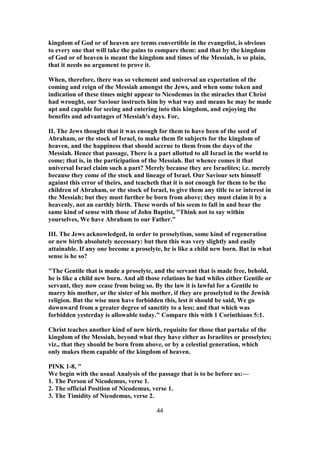
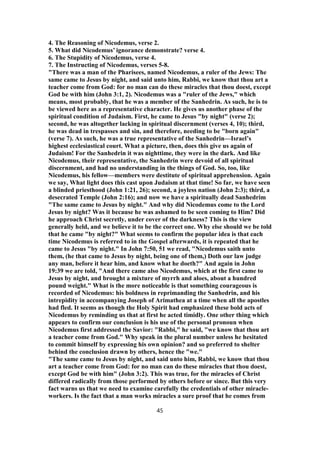
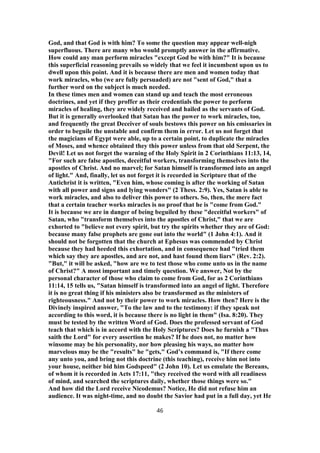
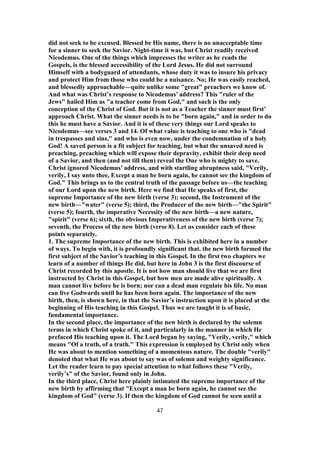
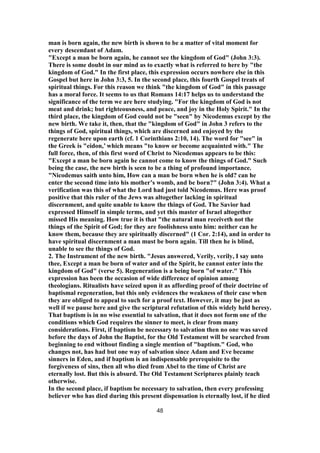
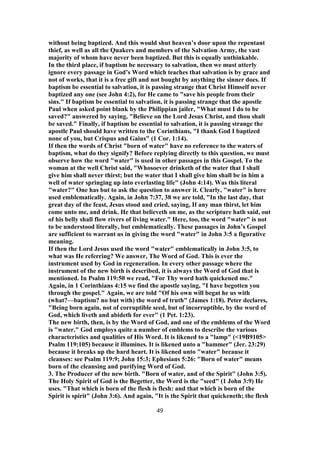
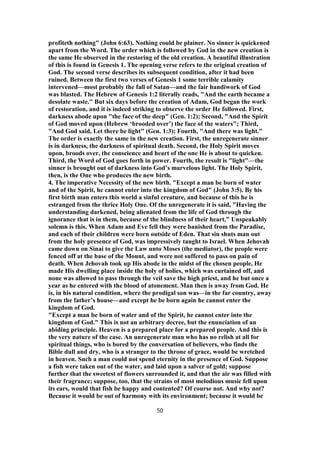
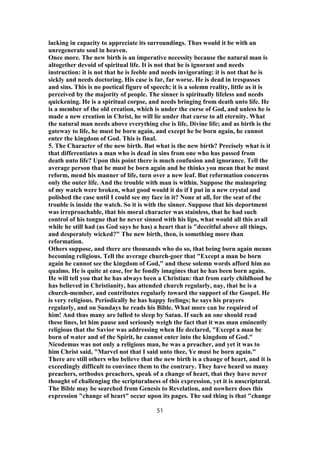
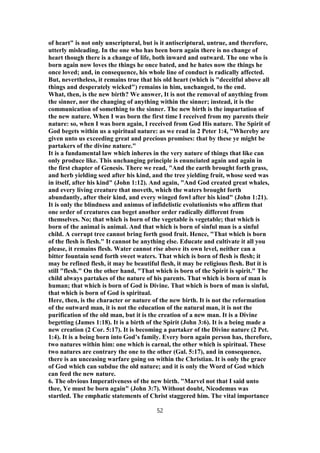
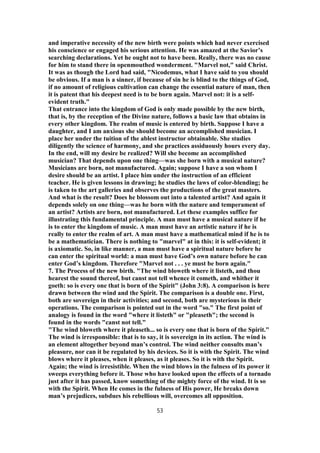
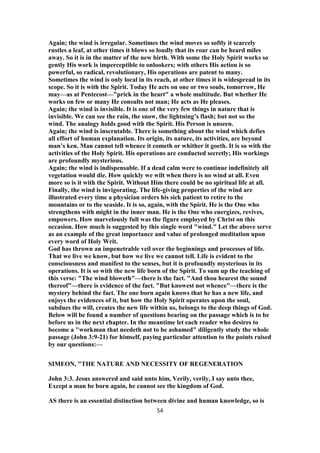
![there a very great difference in the ways by which each of them is to be obtained;
the one being attainable only by rational investigation, the other only by faith.
Reason indeed must judge whether such or such things be revealed; but when
that point is clearly ascertained, faith must receive the truth simply on the
authority of God; and that too, no less when it lies beyond the sphere of our
reason, than when it may easily be comprehended by it. The manner in which
revealed truths are inculcated seems to imply this; for the prophets enforced
their declarations, not with arguments, but with, “Thus saith the Lord:” and our
Saviour, with an authority which none but himself ever presumed to exercise,
and which strongly marked his equality with the Father, disdained to use any
other confirmation than that of his own assertion: this appears, as in numberless
other passages, so particularly in his conversation with Nicodemus; when,
instructing him in the mysterious doctrine of regeneration, he required a full
assent to it upon the testimony of his own word. May we bow to his authority,
while we consider,
I. The nature of regeneration—
The mistakes which very generally obtain respecting this subject being first
rectified, the truth will be more clearly seen—
Many suppose that baptism is the same with regeneration—
[In the early ages of Christianity these terms were often used as synonymous,
because it was taken for granted that none but truly regenerate persons would
submit to a rite which engaged them to separate themselves from an ungodly
world, and exposed them to the most imminent peril of their lives. But there is a
wide difference between the two; regeneration being absolutely necessary to
salvation, while baptism, as in the case of the dying thief, may under some
circumstances be dispensed with. Besides, it was doubtless the great design of
our Lord and his Apostles to regenerate and convert men: but were they so
intent on administering the rite of baptism? Our Lord, we are told, “baptized no
man;” and it is said of Paul, that “God sent him not to baptize;” yea, he himself
“thanks God that he had baptized none but Crispus and Gaius:” but if he had
regenerated none other, would he have thought that a proper ground for
thanksgiving? Again, if baptism and regeneration be the same thing, we may use
them altogether as synonymous terms: now it is said that “Whosoever is born of
God overcometh the world [Note: 1 John 5:4.],” and that “he neither doth sin
nor can sin, because he is born of God [Note: 1 John 3:9.].” But if we should say
the same of all that are baptized, would not the worldly and sinful lives of many
flatly contradict us? It appears then from the superior importance of
regeneration, from the design of Christ and his Apostles respecting it, and from
the properties ascribed to it in Scripture, that it neither is, nor can be, the same
with baptism. Baptism is an outward work of man upon the body; regeneration
is an inward work of God upon the soul.]
Others think that regeneration imports no more than an outward reformation,
or at most, a partial change of the inward man—
55](https://image.slidesharecdn.com/john3commentary-151103172742-lva1-app6891/85/John-3-commentary-55-320.jpg)
![[But can we conceive that, when a ruler of the Jews came to our Lord,
acknowledging him to be a teacher sent from God, and desiring to be instructed
in those things which he was come to reveal, our Lord would tell him that wicked
men could not be saved without reforming their lives? Did Nicodemus need such
information as that? Or, if this was all that our Lord meant, would this teacher
in Israel have been so astonished at it? And would not our Lord have instantly
rectified his misapprehension, and shewn him that there was no cause for
astonishment? Can we imagine that our Lord would have confirmed the mistake,
by representing this doctrine as an incomprehensible mystery, which man can no
more fathom, than he can ascertain the hidden causes, or mark the exact
boundaries, of the wind? Yea, would he have left this man so bewildered, saying,
How can these things be! if he had meant no more than, that a wicked man must
reform his life? Nor is it less evident that regeneration does not consist in a
partial change even of the inward man. To what purpose should we boast of
having experienced the illumination of Balaam [Note: Numbers 24:4.], the
humiliation of Ahab [Note: 1 Kings 21:29.], the confession of Judas [Note:
Matthew 27:4.], the faith of Simon Magus [Note: Acts 8:13; Acts 8:21; Acts
8:23.], the confidence of the unbelieving Jews [Note: John 8:41-42.], the attention
of Ezekiel’s auditors [Note: Ezekiel 33:31.], the reformation of Herod [Note:
Mark 6:20; Mark 6:27.], or (what perhaps includes all these together) the
promising appearance of the stony-ground hearers [Note: Matthew 13:20-21.], if,
like them, we rest in any partial change? Surely, if our righteousness exceed not
theirs, we cannot hope that we shall be happier than they in our final doom.]
In opposition to all such erroneous notions, the Scripture itself defines
regeneration to be “a new creation, wherein old things pass away, and all things
become new [Note: 2 Corinthians 5:17.].”
[The author of this work is the Holy Spirit, who by a supernatural agency
renews our inward man, and makes us partakers of a divine nature [Note: 2
Peter 1:4.]. Our faculties indeed remain the same as they were before; but there
is a new direction given to them all. Our understanding is enlightened, so that we
behold ourselves, and Christ, and the world, yea, every thing else too, in a very
different light from what we ever did before [Note: Acts 2:37-47.] — — — Our
will is changed, so that instead of following, or even desiring to follow, our own
way, we surrender up ourselves altogether to God’s government, saying most
unfeignedly, Not my will, but thine be done [Note: Acts 9:6.] — — — Our
affections also are exercised in a very different manner from what they were
before, so that, instead of being called forth principally by the things of time and
sense, they are set upon things spiritual and eternal [Note: Colossians
3:2.] — — — We say not that this change is perfect in any man, (for there still
are sad remains of the old and corrupt nature even in the best of men; the
leprosy is never wholly removed till the walls be taken down.) But the change is
universal in all the faculties, and progressive throughout our lives: nor can it be
effected by any efforts of man, or by any other power than that of God [Note:
John 1:13.].]
As the Scriptures give this extensive view of regeneration, so they fully declare,
56](https://image.slidesharecdn.com/john3commentary-151103172742-lva1-app6891/85/John-3-commentary-56-320.jpg)
![II. The necessity of it—
“The kingdom of God” sometimes imports the kingdom of grace on earth, and
sometimes the kingdom of glory in heaven. Indeed both are one and the same
kingdom, subject to the same Head, composed of the same members, and
governed by the same laws: grace is glory begun; glory is grace consummated.
But for the purpose of illustrating our subject, we observe that, without
regeneration,
1. We cannot enter into God’s kingdom of grace—
[There are many duties to be performed, and many privileges to be enjoyed, by
the subjects of God’s spiritual kingdom, which an unregenerate man can neither
perform nor enjoy. Who can doubt whether it be our duty to “repent in dust and
ashes,” to “live by faith on the Son of God,” or to “crucify the flesh with its
affections and lusts?” But can an unregenerate man do these things? We
acknowledge that he may restrain in many respects his outward conduct; but can
he root out from his heart the love of the world, and the love of sin? Can he truly
lothe and abhor himself as well for the unhallowed corruptions of his heart, as
for the grosser transgressions of his life? As well may he attempt to create a
world as to effect these things by any power of his own. Again; it is the
Christian’s privilege to enjoy that “peace of God which passeth all
understanding,” to “abound in hope through the power of the Holy Ghost,” and
to be transported with that “joy which is unspeakable and full of glory.” But can
an unregenerate man possess that peace, when his iniquities are not forgiven?
Can he look forward with delight to the coming of the day of Christ, when all his
desires and pursuits terminate in this lower world? Can he be so elevated with
holy joy, when there is nothing in his state which does not rather call for rivers of
tears? But if any one doubt what answer he must return to these questions, let
him go to his chamber, and see whether he be competent to form his mind to
these sublime employments; and he will soon find that no power but that which
created our souls at first, can form them anew after the Divine image.]
2. We cannot enter into the kingdom of glory—
[There is a meetness for the heavenly inheritance [Note: Colossians 1:12.], which
every one must attain, before he can enjoy the felicity of the saints in light. As, on
earth, no occupation can afford us pleasure, if we have not an inward taste and
relish for it, so, in heaven, we must have dispositions suited to the state of those
above. But where is this disposition to be obtained, if not in this life? Can it be
thought that there shall be “repentance in the grave,” and that we shall become
regenerate in a future state? Shall he, who never supremely loved his God,
become at once inflamed with devout affection towards him? Shall not he, who
never was renewed after the Divine image, rather behold with dread and horror
the holiness of God, and tremble at the sight of that Lamb, whose dying love he
despised, and whose blood he trampled under foot? Shall he, who never sought
one hour’s communion with God in secret, delight to have no other employment
to all eternity? No; “as the tree falleth, so it lieth;” “he that was unjust will be
unjust still; and he that was filthy will be filthy still.” As there is this reason on
57](https://image.slidesharecdn.com/john3commentary-151103172742-lva1-app6891/85/John-3-commentary-57-320.jpg)
![the part of man, so is there a still more cogent reason on the part of God. God
has declared, with repeated and most solemn asseverations, that “except a man
be born again, he shall never enter into his kingdom.” And has he spoken thus
merely to alarm us? “Is he a man that he should lie, or the son of man that he
should repent?” Will he dishonour himself to favour us? Will he violate the
rights of justice, holiness, and truth, in order to save those, who, to their dying
hour, rejected and despised his proffered mercy? If all the world tell you that
you shall be admitted into heaven, believe them not: for the Judge of quick and
dead has with the strongest possible asseverations declared, you never shall. Let
us not then deceive ourselves with such vain hopes: for they can terminate in
nothing but disappointment and ruin.]
Address—
1. The unregenerate—
[You cannot surely be at a loss to know your real state, if you will examine
candidly whether you have ever experienced such a change in your views,
desires, and pursuits, as has been before described? O, let every one put home to
his conscience this question, Am I born again? And know that neither
circumcision, nor uncircumcision will avail you any thing, but a new creation
[Note: Galatians 6:15.]. You must be born again, or perish — — —]
2. The regenerate—
[St. Peter, writing to such persons under the severest persecution, begins his
Epistle with congratulations [Note: 1 Peter 1:1; 1 Peter 1:3-4.]: and St. Paul bids
us under the heaviest calamities to be thankful for renewing grace [Note:
Colossians 1:11-13.]. Do ye then bless God in every state, and “shew forth the
virtues of him who hath called you to his kingdom and glory [Note: ἀρετὰς. 1
Peter 2:9.]” — — — Let your renovation be progressive; and never think that
you have attained any thing as long as any thing remains to be attained.]
BIBLICAL ILLUSTRATOR, "Except a man be born again he cannot see the
kingdom of God
The birth of the new man
Man is confronted with two facts.
1. The existence of evil.
2. The hope of deliverance. Christ here shows how this hope may be realized, viz.,
by a new birth, and by that alone.
I. WHY MUST THIS BE? Simply because to live in heaven we must have the life of
heaven. Man can enter no world but by a birth, and to enter heaven, therefore, he
must be born into it. To the heavenly world man is dead Eph_2:1). This is not his
proper condition, nor was he created in or for it (Gen_1:26-27). But very soon his life
went out. Adam fell, and begat sons and daughters in his own image; and we, the
58](https://image.slidesharecdn.com/john3commentary-151103172742-lva1-app6891/85/John-3-commentary-58-320.jpg)
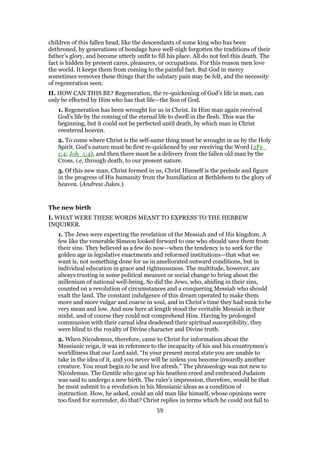
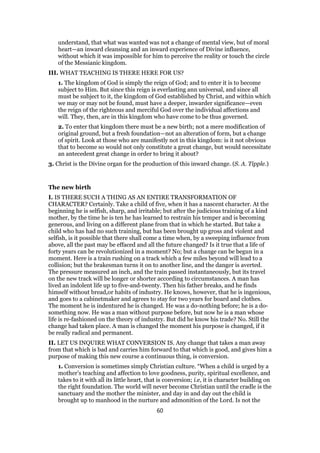
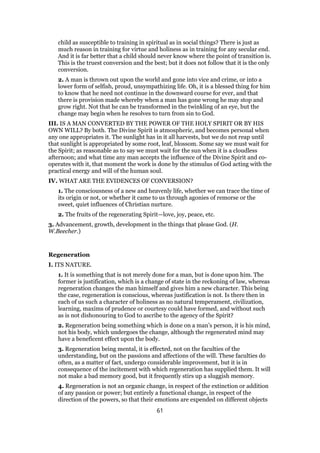
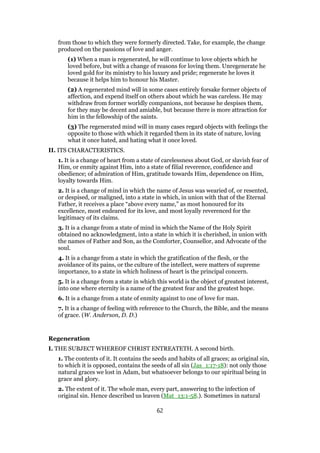
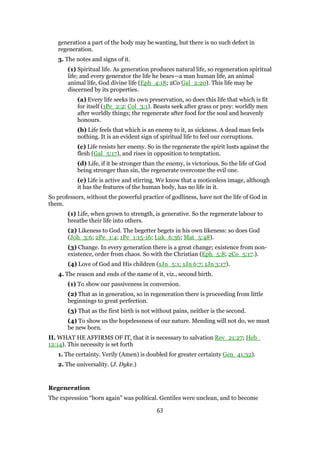
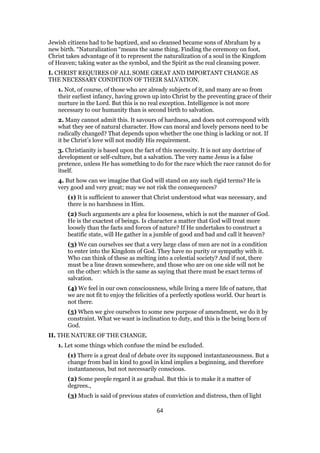
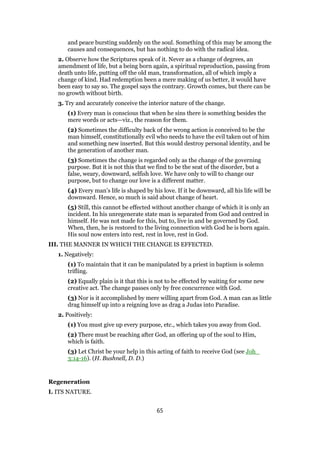
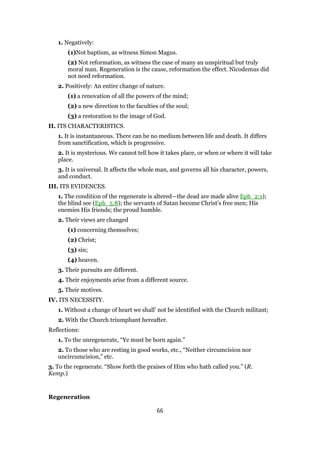
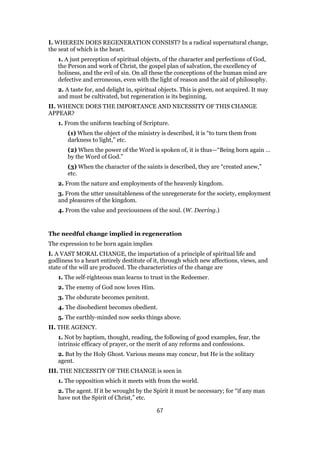
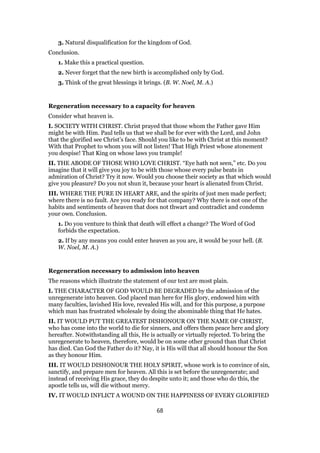
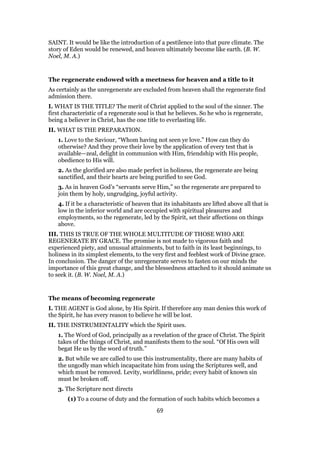
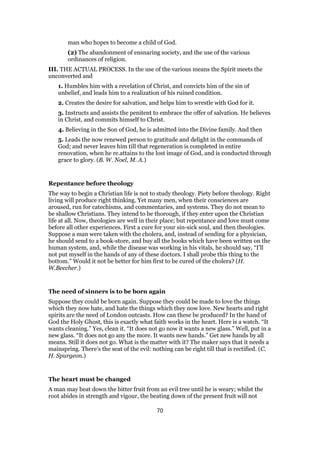
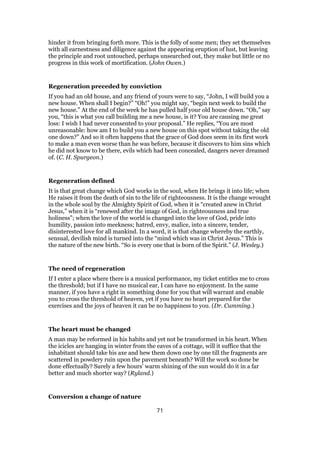
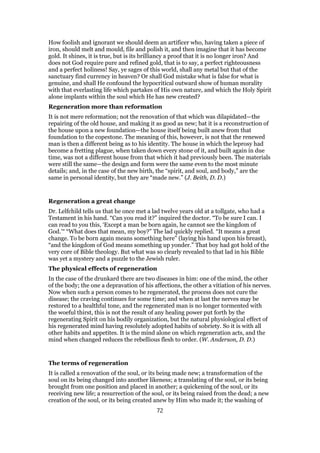
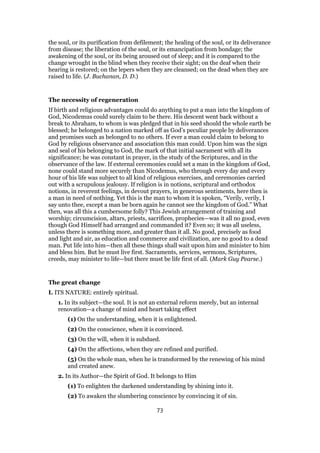
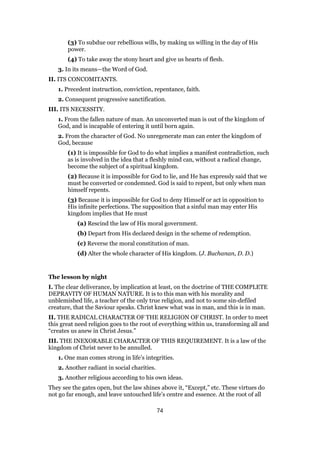
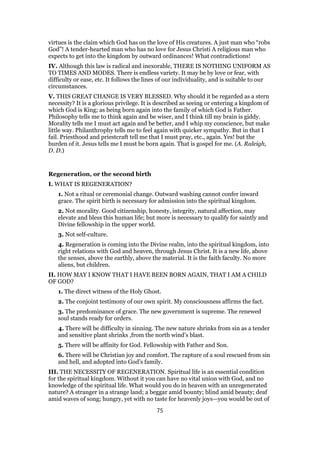
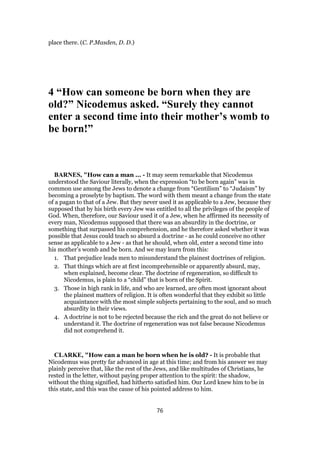
![GILL, "Nicodemus saith unto him,.... Understanding him of a natural birth, to
be repeated:
how can a man be born when he is old? as it seems by this, he himself now was:
can he enter the second time into his mothers womb, and be born? the
Ethiopic version adds, "again"; and the Arabic version, "and then be born"; this he
urges, as absurd, impracticable, and impossible; and which shows him to have been
as yet a natural man, who could not receive nor discern spiritual things.
HENRY, "III. The discourse between Christ and Nicodemus hereupon, or, rather,
the sermon Christ preached to him; the contents of it, and that perhaps an abstract of
Christ's public preaching; see Joh_3:11, Joh_3:12. Four things our Saviour here
discourses of: -
1. Concerning the necessity and nature of regeneration or the new birth, Joh_
3:3-8. Now we must consider this,
(1.) As pertinently answered to Nicodemus's address. Jesus answered, Joh_3:3.
This answer was wither, [1.] A rebuke of what he saw defective in the address of
Nicodemus. It was not enough for him to admire Christ's miracles, and acknowledge
his mission, but he must be born again. It is plain that he expected the kingdom of
heaven, the kingdom of the Messiah now shortly to appear. He is betimes aware of
the dawning of that day; and, according to the common notion of the Jews, he
expects it to appear in external pomp and power. He doubts not but this Jesus, who
works these miracles, is either the Messiah or his prophet, and therefore makes his
court to him, compliments him, and so hopes to secure a share to himself of the
advantages of that kingdom. But Christ tells him that he can have no benefit by that
change of the state, unless there be a change of the spirit, of the principles and
dispositions, equivalent to a new birth. Nicodemus came by night: “But this will not
do,” saith Christ. His religion must be owned before men; so Dr. Hammond. Or, [2.]
A reply to what he saw designed in his address. When Nicodemus owned Christ a
teacher come from God, one entrusted with an extraordinary revelation from heaven,
he plainly intimated a desire to know what this revelation was and a readiness to
receive it; and Christ declares it.
JAMIESON, "How, etc. — The figure of the new birth, if it had been meant only
of Gentile proselytes to the Jewish religion, would have been intelligible enough to
Nicodemus, being quite in keeping with the language of that day; but that Jews
themselves should need a new birth was to him incomprehensible.
CALVIN, "4.How can a man be born when he is old? Though the form of
expression which Christ employed was not contained in the Law and the
prophets, yet as renewal is frequently mentioned in Scripture, and is one of the
first principles of faith, it is evident how imperfectly skilled the Scribes at that
time were in the reading of the Scriptures. It certainly was not one man only who
was to blame for not knowing what was meant by the grace of regeneration; but
as almost all devoted their attention to useless subtleties, what was of chief
importance in the doctrine of piety was disregarded. Popery exhibits to us, at the
present day, an instance of the same kind in her Theologians. For while they
weary out their whole life with profound speculations, as to all that strictly
77](https://image.slidesharecdn.com/john3commentary-151103172742-lva1-app6891/85/John-3-commentary-77-320.jpg)
![relates to the worship of God, to the confident hope of our salvation, or to the
exercises of religion, they know no more on these subjects than a cobbler or a
cowherd knows about the course of the stars; and, what is more, taking delight
in foreign mysteries, they openly despise the true doctrine of Scripture as
unworthy of the elevated rank which belongs to them as teachers. We need not
wonder, therefore, to find here that Nicodemus stumbles at a straw; for it is a
just vengeance of God, that they who think themselves the highest and most
excellent teachers, and in whose estimation the ordinary simplicity of doctrine is
vile and despicable, stand amazed at small matters.
COFFMAN, "Verse 4
Nicodemus saith unto him, How can a man be born when he is old? Can he enter
a second time into his mother's womb and be born?
Nicodemus the teacher of Israel appeared here in a very obtuse and unspiritual
frame of mind, in that he ridiculed the Lord's requirement of a new birth. Even
ordinary spiritual perceptiveness would have saved him from such a reply as
this, which was merely another way of saying, "What you ask is an
impossibility!" However, it was not so much the impossibility of a new birth that
Nicodemus rejected, as it was the idea that such a thing was necessary.
Nicodemus was a Pharisee, one of a class that had rejected out of hand the
baptism of repentance for the remission of sins preached by John the Baptist
(Luke 7:30). It should be remembered that John's baptism was from God, and
that all who rejected it rejected God. This fact underlies the truth that the
publicans and harlots entered God's kingdom before the Pharisees. They
accepted John's baptism; the Pharisees did not. Christ and his apostles accepted
the baptism of John and submitted to it; and that baptism was intended as
preparatory for the kingdom of heaven; and, therefore, it is impossible to
suppose that Nicodemus should have been excused for not knowing what Jesus
meant by being "born of water," mentioned in the next breath: the excuse for
Nicodemus being founded upon the sophistry that the baptism of the great
commission was not announced by Jesus until long after this interview; but there
was another water baptism much nearer at hand, of which Nicodemus did know,
and which he had rejected along with others of his class. Again from Hovey:
The metaphor of the new birth appears to have been used by the Rabbis to
describe the religious change in a Gentile who became a proselyte to Judaism;
and the import of baptism as administered by John implied the same view of
repentance, namely, that it was a burial of the old life, and entrance upon a new
life.[4]
ENDNOTE:
[4] Ibid., p. 96.
LIGHTFOOT, "4. Nicodemus saith unto him, How can a man be born when he
is old? can he enter the second time into his mother's womb, and be born?
[Can he enter the second time into his mother's womb?] The common opinion of
the Jews about the qualification of an Israelite, qua Israelite, still sticks in the
78](https://image.slidesharecdn.com/john3commentary-151103172742-lva1-app6891/85/John-3-commentary-78-320.jpg)
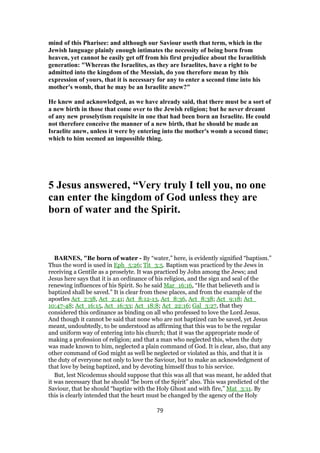
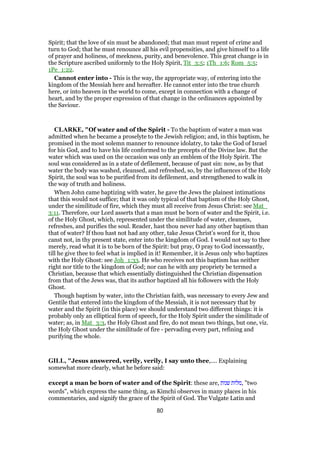
![Ethiopic versions read, "the Holy Spirit", and so Nonnus; and who doubtless is
intended: by "water", is not meant material water, or baptismal water; for water
baptism is never expressed by water only, without some additional word, which
shows, that the ordinance of water baptism is intended: nor has baptism any
regenerating influence in it; a person may be baptized, as Simon Magus was, and yet
not born again; and it is so far from having any such virtue, that a person ought to be
born again, before he is admitted to that ordinance: and though submission to it is
necessary, in order to a person's entrance into a Gospel church state; yet it is not
necessary to the kingdom of heaven, or to eternal life and salvation: such a mistaken
sense of this text, seems to have given the first birth and rise to infant baptism in the
African churches; who taking the words in this bad sense, concluded their children
must be baptized, or they could not be saved; whereas by "water" is meant, in a
figurative and metaphorical sense, the grace of God, as it is elsewhere; see Eze_
36:25. Which is the moving cause of this new birth, and according to which God
begets men again to, a lively hope, and that by which it is effected; for it is by the
grace of God, and not by the power of man's free will, that any are regenerated, or
made new creatures: and if Nicodemus was an officer in the temple, that took care to
provide water at the feasts, as Dr. Lightfoot thinks, and as it should seem Nicodemon
ben Gorion was, by the story before related of him; See Gill on Joh_3:1; very
pertinently does our Lord make mention of water, it being his own element:
regeneration is sometimes ascribed to God the Father, as in 1Pe_1:3, and sometimes
to the Son, 1Jo_2:29 and here to the Spirit, as in Tit_3:5, who convinces of sin,
sanctifies, renews, works faith, and every other grace; begins and carries on the work
of grace, unto perfection;
he cannot enter into the kingdom of God; and unless a man has this work of
his wrought on his soul, as he will never understand divine and spiritual things, so he
can have no right to Gospel ordinances, or things appertaining to the kingdom of
God; nor can he be thought to have passed from death to life, and to have entered
into an open state of grace, and the kingdom of it; or that living and dying so, he shall
ever enter into the kingdom of heaven; for unless a man is regenerated, he is not born
heir apparent to it; and without internal holiness, shall not enter into it, enjoy it, or
see God.
HENRY, "(2.) As positively and vehemently asserted by our Lord Jesus: Verily,
verily, I say unto thee. I the Amen, the Amen, say it; so it may be read: “I the faithful
and true witness.” The matter is settled irreversibly that except a man be born again
he cannot see the kingdom of God. “I say it to thee, though a Pharisee, though a
master in Israel.” Observe,
[1.] What it is that is required: to be born again; that is, First, We must live a new
life. Birth is the beginning of life; to be born again is to begin anew, as those that
have hitherto lived either much amiss or to little purpose. We must not think to
patch up the old building, but begin from the foundation. Secondly, We must have a
new nature, new principles, new affections, new aims. We must be born anōthen,
which signifies both denuo - again, and desuper - from above. 1. We must be born
anew; so the word is taken, Gal_4:9, and ab initio - from the beginning, Luk_1:3. By
our first birth we are corrupt, shapen in sin and iniquity; we must therefore undergo
a second birth; our souls must be fashioned and enlivened anew. 2. We must be born
from above, so the word is used by the evangelist, Joh_3:31; Joh_19:11, and I take
this to be especially intended here, not excluding the other; for to be born from
above supposes being born again. But this new birth has its rise from heaven (Joh_
1:13) and its tendency to heaven: it is to be born to a divine and heavenly life, a life of
communion with God and the upper world, and, in order to this, it is to partake of a
81](https://image.slidesharecdn.com/john3commentary-151103172742-lva1-app6891/85/John-3-commentary-81-320.jpg)
![divine nature and bear the image of the heavenly.
[2.] The indispensable necessity of this: “Except a man (Any one that partakes of
the human nature, and consequently of its corruptions) be born again, he cannot see
the kingdom of God, the kingdom of the Messiah begun in grace and perfected in
glory.” Except we be born from above, we cannot see this. That is, First, We cannot
understand the nature of it. Such is the nature of things pertaining to the kingdom of
God (in which Nicodemus desired to be instructed) that the soul must be re-
modelled and moulded, the natural man must become a spiritual man, before he is
capable of receiving and understanding them, 1Co_2:14. Secondly, We cannot
receive the comfort of it, cannot expect any benefit by Christ and his gospel, nor have
any part or lot in the matter. Note, Regeneration is absolutely necessary to our
happiness here and hereafter. Considering what we are by nature, how corrupt and
sinful, - what God is, in whom alone we can be happy, - and what heaven is, to which
the perfection of our happiness is reserved, - it will appear, in the nature of the thing,
that we must be born again, because it is impossible that we should be happy if we
be not holy; see 1Co_6:11, 1Co_6:12.
This great truth of the necessity of regeneration being thus solemnly laid down,
a. It is objected against by Nicodemus (Joh_3:4): How can a man be born when
he is old, old as I am: gerōn ōn - being an old man? Can he enter the second time into
his mother's womb, and be born? Herein appears, (a.) His weakness in knowledge;
what Christ spoke spiritually he seems to have understood after a corporal and carnal
manner, as if there were no other way of regenerating and new-moulding an
immortal soul than by new-framing the body, and bringing that back to the rock out
of which it was hewn, as if there was such a connection between the soul and the
body that there could be no fashioning the heart anew but by forming the bones
anew. Nicodemus, as others of the Jews, valued himself, no doubt, very much on his
first birth and its dignities and privileges, - the place of it, the Holy Land, perhaps
the holy city, - his parentage, such as that which Paul could have gloried in, Phi_3:5.
And therefore it is a great surprise to him to hear of being born again. Could he be
better bred and born than bred and born an Israelite, or by any other birth stand
fairer for a place in the kingdom of the Messiah? Indeed they looked upon a
proselyted Gentile to be as one born again or born anew, but could not imagine how
a Jew, a Pharisee, could ever better himself by being born again; he therefore thinks,
if he must be born again, it must be of her that bore him first. They that are proud of
their first birth are hardly brought to a new birth. (b.) His willingness to be taught.
He does not turn his back upon Christ because of his hard saying, but ingenuously
acknowledges his ignorance, which implies a desire to be better informed; and so I
take this, rather than that he had such gross notions of the new birth Christ spoke of:
“Lord, make me to understand this, for it is a riddle to me; I am such a fool as to
know no other way for a man to be born than of his mother.” When we meet with
that in the things of God which is dark, and hard to be understood, we must with
humility and industry continue our attendance upon the means of knowledge, till
God shall reveal even that unto us.
b. It is opened and further explained by our Lord Jesus, Joh_3:5-8. From the
objection he takes occasion,
(a.) To repeat and confirm what he had said (Joh_3:5): “Verily, verily, I say unto
thee, the very same that I said before.” Note, The word of God is not yea and nay, but
yea and amen; what he hath said he will abide by, whoever saith against it; nor will
he retract any of his sayings for the ignorance and mistakes of men. Though
Nicodemus understood not the mystery of regeneration, yet Christ asserts the
necessity of it as positively as before. Note, It is folly to think of evading the
obligation of evangelical precepts, by pleading that they are unintelligible, Rom_3:3,
82](https://image.slidesharecdn.com/john3commentary-151103172742-lva1-app6891/85/John-3-commentary-82-320.jpg)
![Rom_3:4.
(b.) To expound and clear what he had said concerning regeneration; for the
explication of which he further shows,
[a.] The author of this blessed change, and who it is that works it. To be born again
is to be born of the Spirit, Joh_3:5-8. The change is not wrought by any wisdom or
power of our own, but by the power and influence of the blessed Spirit of grace. It is
the sanctification of the Spirit (1Pe_1:2) and renewing of the Holy Ghost, Tit_3:5.
The word he works by is his inspiration, and the heart to be wrought on he has access
to.
[b.] The nature of this change, and what that is which is wrought; it is spirit, Joh_
3:6. Those that are regenerated are made spiritual, and refined from the dross and
dregs of sensuality. The dictates and interests of the rational and immortal soul have
retrieved the dominion they ought to have over the flesh. The Pharisees placed their
religion in external purity and external performances; and it would be a mighty
change indeed with them, no less than a new birth, to become spiritual.
JAMIESON, "of water and of the Spirit — A twofold explanation of the “new
birth,” so startling to Nicodemus. To a Jewish ecclesiastic, so familiar with the
symbolical application of water, in every variety of way and form of expression, this
language was fitted to show that the thing intended was no other than a thorough
spiritual purification by the operation of the Holy Ghost. Indeed, element of water
and operation of the Spirit are brought together in a glorious evangelical prediction
of Ezekiel (Eze_36:25-27), which Nicodemus might have been reminded of had such
spiritualities not been almost lost in the reigning formalism. Already had the symbol
of water been embodied in an initiatory ordinance, in the baptism of the Jewish
expectants of Messiah by the Baptist, not to speak of the baptism of Gentile
proselytes before that; and in the Christian Church it was soon to become the great
visible door of entrance into “the kingdom of God,” the reality being the sole work of
the Holy Ghost (Tit_3:5).
SBC, "I. By "being born again" is meant exactly the same thing as by "rising again;"
or, rather, the same two things are meant by it. In its literal sense it means what is
meant by the Resurrection literally; that is, our entrance upon a new state of being,
after our present one is over. By being born, we came into this world from a state of
nothingness; by being born again, we shall pass into another world from a similar
state of nothingness—that is, from death. This is being born again literally; and by
thus being born again we enter into the kingdom of God. Now, in one sense certainly
we are all in His kingdom already. We cannot go anywhere where He is not over all;
we see the whole of Nature around us, the very stars of heaven in their courses
moving according to His laws. But here there are some things which do not obey
Him, but have chosen to themselves another king; and these things are the evil hearts
of men. It will then be the kingdom of God truly and perfectly, when there shall be
nothing which does not obey Him—when not the earth, the moon, and the stars shall
move more entirely according to His will than the hearts of all His reasonable
creatures.
II. Into this kingdom of God, into this new and Divine life, we can by no natural
process be born. That which is born of the Spirit is spirit. By His new creation a new
nature is wrought for us, incapable of delay, incapable of sin, and so fit for the eternal
society of God. It is still by the Spirit and the water and the blood, all agreeing in one,
that we are brought nearer and nearer to the redemption of our body, to the real
resurrection, the real birth, into the kingdom of God; not by water only—that is by
83](https://image.slidesharecdn.com/john3commentary-151103172742-lva1-app6891/85/John-3-commentary-83-320.jpg)
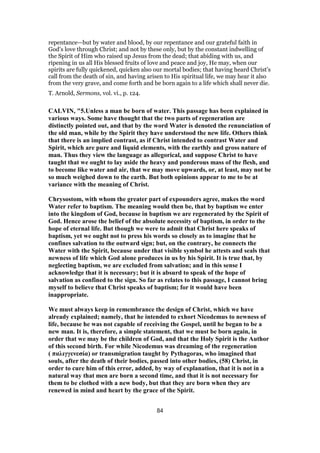
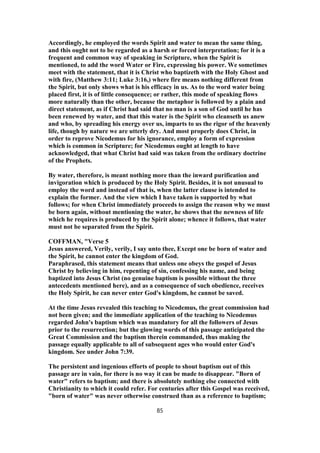
![and, as noted above, in its application to Nicodemus, it pointed to the Pharisaical
refusal to submit to the baptism of John; but, by extension, it is even more
emphatic in its application to that baptism which is greater than John's, namely,
that of the Great Commission.
In the study of this passage, it should be remembered that it is only quite recently
in Christian times that interpretations of this verse have been devised to exclude
its obvious reference to Christian baptism. John Boys, Dean of Canterbury,
renowned preacher and scholar of the Church of England in the 17th century,
wrote as follows:
Some few modern divines (Note: Although few THEN, they are many NOW -
James Burton Coffman) have conceded that these words are not to be construed
of external baptism; because, say they, "Christ taketh water here by a borrowed
speech for the Spirit of God, the effect whereof it shadoweth out; and so water
and the Spirit are all one!" To this interpretation answer is made: first, that it is
an old rule in expounding of Holy Scripture, that where a literal sense will stand,
the farthest from the letter is commonly the worst ... (Note: Boys wrote at great
length concerning the efforts of men toward "changing the meaning of words,"
calling such conduct "licentious and deluding," and denouncing it as "perverting
the text.")
Origen, Chrysostom, Augustine, Cyril, Beda, Theophylact, Euthymius, in the
commentaries on this place (John 3:5), along with Justin Martyr, Tertullian,
Ambrose, Hierome, Basil, Gregory, Nyssen, and many more, yea most of the
Fathers - Hooker, a man of incomparable reading, openeth his mouth wider,
avowing peremptorily that ALL THE ANCIENTS (capitals mine, J.B.C.) have
construed this text, as our church doth, of outward baptism.[5]SIZE>
It cannot be denied, therefore, that all interpretations that would edit any
reference to baptism out of this text are too late by centuries, to have any weight
at all with people who wish to know what the word of the Lord teaches. The
warping and distortion of the views of expositors since the Lutheran
reformation, who have sought to conform this text to Luther's erroneous theory
of justification, were denounced by no less a giant of Biblical exegesis than
Alford, who wrote:
There can be no doubt, on any honest interpretation of the words, that
[@gennethenai] [@ek] [@hudatos] (born of water) refers to the token or
outward sign of baptism, [@gennethenai] [@ek] [@pneumatos] (born of the
Spirit) to the thing signified, or the inward grace of the Holy Spirit. All attempts
to get rid of these two plain facts have sprung from doctrinal prejudices, by
which the views of expositors have been warped.[6]
It is regrettable that Afford injected the jargon of "outward sign" and "inward
grace" into his comment; because the relative meaning of these two things, "born
of water" and "born of the Spirit" is not under discussion in this passage. It
makes no difference what either one of these things is in its relationship to the
other, both are absolutely necessary to salvation, that being the unqualified
affirmation of this text. Thus, in order to be saved, one must be baptized (born of
water) and receive the Holy Spirit (born of the Spirit). Christ joined these
86](https://image.slidesharecdn.com/john3commentary-151103172742-lva1-app6891/85/John-3-commentary-86-320.jpg)
![entities in this passage; and what God hath joined, let no man put asunder! The
opinions of great scholars might be multiplied in support of this interpretation of
the text; and, for those who might be influenced by such opinions, reference is
made to the Handbook on Baptism,[7] in which fifty of the most notable scholars
of the last 200 years are quoted. Only one other will be cited here, namely, Phillip
Schaff (1819-1893), Professor of Church History, Union Theological Seminary,
New York, President of the American Company of the New Testament Revisers,
and one of the greatest Christian scholars of all time. He said:
In view of the facts that John baptized, that Christ himself was baptized, that his
disciples baptized in his name (John 4:2), it seems impossible to disconnect water
in John 3:5, from baptism. Calvin's interpretation arose from doctrinal
opposition to the Roman Catholic over-valuation of the sacrament, which must
be guarded against in another way.[8]
Most of the bitterest denunciations against what Jesus taught here are actually
directed against a straw man called "baptismal regeneration," in which it is
continually affirmed that water cannot save anyone; but, of course, no one
supposes that it can. No efficacy was ever attributed to the water, even by the
staunchest defenders of what Jesus here clearly made a precondition of
salvation. Fulminations against baptismal regeneration might have been relevant
in Calvin's day, when that scholar attacked the Medieval superstition that a few
drops of water sprinkled religiously upon a dead infant could save a soul; but
those arguments by Calvin are not relevant arguments against Christ's promise
that "He that believeth and is baptized shall be saved" (Mark 16:16). And that
promise is as good a commentary on John 3:5 as any other (yes, better than any
other) that might be brought forward to explain this disputed passage. The
importance of the questions raised around the sacred words of Jesus in this place
requires that further attention be directed to their study. See "Regarding the
New Birth" below.
REGARDING THE NEW BIRTH
The new birth "of water and of the Spirit" is one birth, not two, despite there
being two elements in it. One of these elements "born of water," is water
baptism, that being the element of the new birth for which man himself is
responsible for the doing of it. Thus, Saul of Tarsus was commanded, "Get
thyself baptized" (Acts 22:16).[9] The other element of the new birth, "born of
the Spirit," is the reception of the Holy Spirit of promise, which is an earnest of
our inheritance (Ephesians 1:13,14). Contrasting with what is done by man, this
endowing with the Holy Spirit is what is done by God. The great heresy
regarding this one birth is the doctrine that people may omit their part, not being
baptized, but that God will go ahead, despite that, and endow the believer with
the Holy Spirit anyway! John 3:5 teaches that both elements are absolutely
necessary in the new birth.
Born of water is a reference to the ceremony of baptism; but there is no magic in
water, nor does the ceremony itself contribute anything to sanctification, as often
alleged. Millions of faithful Christians can testify that submission to the
commandment of baptism did not automatically give them a new nature, the new
87](https://image.slidesharecdn.com/john3commentary-151103172742-lva1-app6891/85/John-3-commentary-87-320.jpg)
![nature coming through a growth process in consequence of the endowment of the
Spirit. Care should be taken to distinguish between "baptism" as a reference to
the immersion ceremony, and "baptism" meaning the new birth of which the
ceremony is an element. Jesus himself used the word in this latter sense in Mark
16:16.
But if the actual ceremony does not change the nature of the convert, what does
it do? (1) It is the last of the preconditions of salvation to be fulfilled by the
sinner, the others being: believing, repenting, and confessing Christ; and upon
compliance with all of them by the sinner, God forgives all previous sin of the
sinner and confers upon him a state of absolute innocence. The fulfilling of the
preconditions by the sinner does not merit or earn God's forgiveness, nor
provide any class of works that could place God under any obligation other than
his own gracious and merciful promise. However, such is the importance of this
ceremonial element in the new birth, that it may be dogmatically affirmed that in
the history of Christianity there has never been an exception to the proposition
that every true believer who repented and was baptized was then and there
forgiven of all past sin and endowed with a status of absolute innocence in God's
sight. This is accomplished not by the ceremony but by God WHEN the
ceremony is obeyed, and not otherwise. This is clear from "Arise and be baptized
and wash away thy sins, calling upon the name of the Lord" (Acts 22:16).
(2) In the second instance, there is achieved in the penitent a clear conscience
upon the event of his submission to the ceremony, as affirmed by the apostle
Peter (1 Peter 3:1). See my Commentary on Hebrews, Hebrews 9:13,14. There is
no way that any man on earth can have a clear conscience without submitting to
baptism. That is why even the churches that deny the necessity of baptism have
not dispensed with it altogether. Their consciences will not allow it, despite the
fact that their doctrine, if heeded, would demand it. The universal rejoicing that
attends submission to the ordinance was in New Testament times (Acts 8:39;
16:34, etc.), as now, the certain evidence of a clear conscience.
(3) The ceremony of immersion called baptism is the God-ordained rite of
initiation into Jesus Christ; and that status of being the appointed device by
which God inducts the penitent into corporate union with the Son of God, that is,
into his kingdom, church, or spiritual body - that status uniquely belongs to the
baptismal ceremony. As Vine noted, "Baptizing into the Name (Matthew 28:19)
would indicate that the baptized person was closely bound to, or became the
property of, the one into whose Name he was baptized."[10] Three times the New
Testament declares that people are baptized "into Christ," or into his "body"
(Galatians 3:26,27; Romans 6:3-5; 1 Corinthians 12:13). See article, "Jesus
Christ Incorporated," my Commentary on Romans, p. 123. It is encouraging to
note that present-day scholarship is taking a further look at the importance of
the baptismal ceremony. Thus, Beasley-Murray recently assented to the key
thesis maintained here, namely, that "Baptism is the occasion when the Spirit
brings to new life him that believes in the Son of Man!"[11] This is true; and if,
through failure to obey the Lord in baptism the OCCASION never comes, then
neither will the new life.
88](https://image.slidesharecdn.com/john3commentary-151103172742-lva1-app6891/85/John-3-commentary-88-320.jpg)
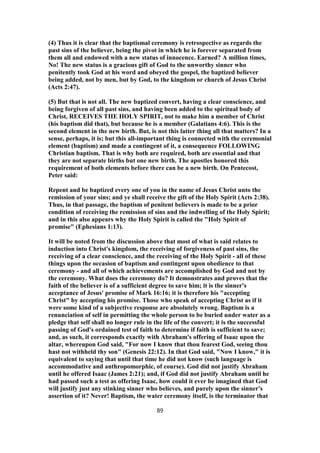
![separates between the saved and the lost; and as long as the faith of any person is
insufficient to prompt his obedience to God's universal commandment of
baptism, there is no way that such a faith could save. That is why Jesus said, "He
that believeth and is baptized shall be saved" (Mark 16:16), and, in regard to the
quibble which says, "Well, Jesus did not say, `He that is not baptized shall be
condemned,'" the answer that thunders from the New Testament is that the
meaning is exactly the same as if he had said that!
Now, whereas the operation of the ceremony of baptism itself is retrospective
regarding past sins, the second element of the new birth, the reception of the
Holy Spirit, is prospective and looks to the perfection of the believer in Christ. It
is this progressive work of the Holy Spirit that leads to a greater and greater
degree of sanctification in the heart of the saved. For more on sanctification see
my Commentary on Romans, Romans 6:22.
When a person is truly baptized (and only believing, penitent, confessing persons
can be TRULY baptized), as Christ commanded, God sends the Holy Spirit into
his heart (the second element of the new birth); and, when viewed in connection
with this divine fulfillment of the promise of the Holy Spirit, baptism is the new
birth; but it is not a birth of water only, but a birth of "water and of the Spirit"
as Jesus said. On the other hand, when baptism is thought of as the water
ceremony only, it is only part of the new birth, nevertheless a vital and necessary
part of it. It is proper to use baptism as a synecdoche for the new birth in its
entirety; and thus Jesus himself used it in Mark 16:16.
[5] John Boys, An Exposition of the Dominical Epistles and Gospels (London,
1938); quoted from Handbook on Baptism (Nashville: Gospel Advocate
Company, 1950), p. 322.
[6] Handbook on Baptism, Nashville: Gospel Advocate Company, 1950), p. 320.
[7] Ibid.
[8] Ibid., p. 334.
[9] W. E. Vine, An Expository Dictionary of New Testament Words (Old
Tappan, New Jersey: Fleming H. Revell Company, 1962), p. 97.
[10] Ibid.
[11] G. R. Beasley-Murray, Baptism in the New Testament (Grand Rapids,
Michigan: William B. Eerdmans Publishing Company, 1973), p. 278.
LIGHTFOOT, "5. Jesus answered, Verily, verily, I say unto thee, Except a man
be born of water and of the Spirit, he cannot enter into the kingdom of God.
[Except a man be born of water and of the Spirit.] He tells him, that the Jew
himself cannot be admitted into the kingdom of the Messiah unless he first strip
himself of his Judaism by baptism, and then put off his carnal and put on a
90](https://image.slidesharecdn.com/john3commentary-151103172742-lva1-app6891/85/John-3-commentary-90-320.jpg)
![spiritual state. That by water here is meant baptism, I make no doubt: nor do I
much less question but our Saviour goes on from thence to the second article of
the evangelical doctrine. And as he had taught that towards the participation of
the benefits to be had by the Messiah, it is of little or of no value for a man to be
born of the seed of Abraham, or to be originally an Israelite, unless he was also
born from above.
GREAT TEXTS OF THE BIBLE, "A New Beginning
Jesus answered, Verily, verily, I say unto thee, Except a man be born of water
and the Spirit, he cannot enter into the kingdom of God.—Joh_3:5.
1. It is impossible for any one to read or hear these words without remembering
what solemn words they have been to multitudes of our fellow-men. There are
hardly any words that Christ ever spoke which have more fascinated and held
the hearts of earnest men.
In a letter from Whitefield to Benjamin Franklin, dated 1752, occur these words:
“As I find you growing more and more famous in the learned world I would
recommend to your diligent and unprejudiced study the mystery of the new
birth. It is a most important study, and, when mastered, will richly answer all
your pains. I bid you, my friend, remember that One at whose bar we shall both
presently appear hath solemnly declared that without it we shall in no wise see
His Kingdom.”
2. Born again! The new birth! Oh, these old words which so many souls have
puzzled over and could not understand, and yet have been fascinated by so that
they could not let them go! In silent chambers souls have agonized and
wondered, “What is it to be born again?” In silent chambers souls, conscious of a
richer and fuller life, have dreamed and questioned timidly: “Is it possible, then,
that this is the new birth? Have we come any nearer to an answer to it all to-day?
Have we passed from the shallow life to the profound, from the unspiritual to the
spiritual, from the first life to the second?”1 [Note: Phillips Brooks, Seeking Life,
208.]
How was it that he, who in 1727 could not move a village, after 1739 could shake
three kingdoms? How did it come to pass that the teacher who was driven out of
a little colony as a mere human irritant became the teacher, the comforter, the
trusted leader of whole generations? The explanation certainly does not lie in
any personal gifts of body or brain Wesley possessed. These were exactly the
same at both stages of his career. Wesley at Wroote was twenty-five years of age.
He had then the scholar’s brain, the zealot’s fire, the orator’s tongue; and he
failed—failed consciously and completely. “I preached much,” is his own record,
“but saw no fruits of my labour.” Wesley, again, in Charleston, was thirty-two
years of age. At no stage of his life did he show a higher passion of zeal, or more
methodical and resolute industry; a self-sacrifice so nearly heroic in temper. And
yet he failed! But something came into his life by the gate of his conversion,
something he never lost, something which transfigured his career. It was a
strange gift of power—power that used Wesley’s natural gifts—his tough body,
91](https://image.slidesharecdn.com/john3commentary-151103172742-lva1-app6891/85/John-3-commentary-91-320.jpg)
![his keen intellect, his resolute will—as instruments, but which was more than
these. Who looks on Wesley’s life as a whole, and sees on one side of a particular
date doubt, weakness, and defeat, and on the other side certainty, gladness, and
matchless power, cannot doubt that the secret of Wesley’s career lies in the
spiritual realm. Wesley’s story is simply one embodied, historic, and
overwhelming demonstration of the truth of what is called the Evangelical
reading of Christianity.1 [Note: W. H. Fitchett Wesleu and his Century 281.]
3. Many are perplexed, as Nicodemus was. They understand religion on its
educational and tangible side; but the doctrine of regeneration, of conversion,
perplexes and offends them. They will consent to the faith of Christ, to the
Church of Christ, excepting this one doctrine, which is of its very essence. Yet
what of the fact? Only as our interior eyes are enlightened can we see the
Kingdom of God; only as our mind, affections, conscience, and will are raised
and energized by the Holy Spirit can we enter into that Kingdom and share its
righteousness and blessedness. Such is the teaching of the Master, and tens of
thousands in all generations testify to the truth of His teaching. They are
conscious that they have experienced this very change; they know it as a fact, the
most glorious fact of their history. They have been transformed in the spirit of
their mind; they henceforth walk in newness of life. These witnesses will vary
much as to what brought it all about, as to their recognition of the time and place
of awakening, and many features of the experiences through which they passed;
but concerning the substantial fact itself, that the Spirit of God has imparted to
them a higher life, given them a clean heart, and renewed within them a right
spirit, they bear testimony to it as the most indubitable and blessed fact of their
life. Let there be no mistake about it; that penitent men are turned from
darkness to light, and from the power of Satan unto God, is one of the best
authenticated facts in the history of the race.
There are a great many things that I cannot explain and cannot reason out, and
yet that I believe. I heard a commercial traveller say that he had heard that the
ministry and religion of Jesus Christ were matters of revelation and not of
investigation. “When it pleased God to reveal his Son in me,” says St. Paul (Gal_
1:15-16). There was a party of young men together, going up the country; and on
their journey they made up their minds not to believe anything they could not
reason out. An old man heard them, and presently he said, “I heard you say you
would not believe anything you could not reason out.” “Yes,” they said, “that is
so.” “Well,” he said, “coming down on the train to-day, I noticed some geese,
some sheep, some swine, and some cattle, all eating grass. Can you tell me by
what process that same grass was turned into hair, feathers, bristles, and wool?
Do you believe it is a fact?” “Oh yes,” they said, “we cannot help believing that,
though we fail to understand it.” “Well,” said the old man, “I cannot help
believing in Jesus Christ. And I cannot help believing in the regeneration of man,
when I see men who have been reclaimed, when I see men who have been
reformed.”1 [Note: D. L. Moody, The Way to God, 45.]
4. Let us remember the occasion upon which the words were spoken. Our Lord
at the very beginning of His ministry exercised His vital powers to heal those
who were sick with all manner of diseases; and this He did in order to manifest
92](https://image.slidesharecdn.com/john3commentary-151103172742-lva1-app6891/85/John-3-commentary-92-320.jpg)
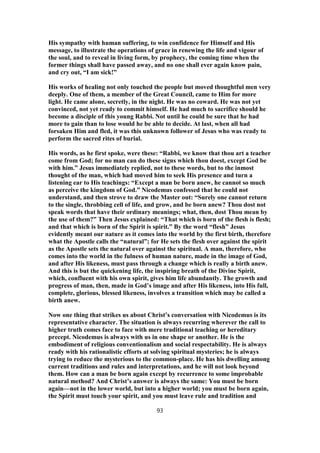
![interpretations behind you. Morally you must be born again into the Kingdom of
the Father, where God is loved and trusted and dealt with at first hand and
communed with.
Speaking of the writer of the “Eikon Basilike,” Carlyle said that he was the most
portentously self-righteous mortal ever extant in this planet; that seemed to say
to the Almighty, in place of asking for His grace and mercy, “Oh, Lord, I have
attained to such a pitch of heavenly perfection that I fear it is not even in Thy
power to make me any better than I am; but if at the time Thou shouldst find an
opportunity for adding a little finish and perfectness to my many excellences I
should feel obliged to Thee.”1 [Note: Mrs. Brookfield and Her Circle, ii. 436.]
5. In religious circles in Jerusalem there was nothing being talked of but the
Kingdom of God which John the Baptist had declared to be at hand. And when
Jesus told Nicodemus that in order to enter this Kingdom he must be born again,
He told him just what John had been telling the whole people. John had assured
them that, though the King was in their midst, they must not suppose they were
already within His Kingdom by being the children of Abraham. He
excommunicated the whole nation, and taught them that it was something
different from natural birth that gave admission to God’s Kingdom. And just as
they had compelled Gentiles to be baptized, and to submit to other arrangements
when they wished to partake of Jewish privileges, so John compelled them to be
baptized. The Gentile who wished to become a Jew had to be symbolically born
again. He had to be baptized, going down under the cleansing waters, washing
away his old and defiled life, being buried by baptism, disappearing from men’s
sight as a Gentile, and rising from the water as a new man. He was thus born of
water, and this time born, not a Gentile, but a Jew. As the Gentile had to be
naturalized and born again that he might rank as a child of Abraham, and enjoy
the external privileges of the Jew, so must the Jew himself be born again if he is
to rank as a child of God and to belong to the Kingdom of God. He must submit
to the double baptism of water and of the Spirit—of water for the pardon and
cleansing of past sin and defilement, of the Spirit for the inspiration of a new and
holy life.
The Jewish doctors, it is said, not uncommonly described the Gentile as one who
became a little child, who began his life anew, when he was received by baptism
into the privileges of their outer court. If so, Nicodemus must have been familiar
with the expression; but it must have been to him, and to most who availed
themselves of it, a mere figure of rhetoric—one of those counters which pass
among religious people, which have a certain value at first, but which become at
length so depreciated that they serve no purpose but to impose on those who take
and those who give them. However little Nicodemus might know of Jesus, he did
know that He was not resorting to figures of rhetoric—that if He spoke of a
birth, He meant a birth; and he must have perceived that what He said did not
apply to sinners of the Gentiles, but to him, the religious ruler of the Jews. It
was, therefore, a good and healthy sign, a proof of the power of the new Teacher,
that he forgot the conventionalisms of the Sanhedrim, and spoke out coarsely
and naturally, as a peasant might have done. Our Lord, surely, passed this
judgment upon him; for, instead of rebuking him for his question, He meets it in
94](https://image.slidesharecdn.com/john3commentary-151103172742-lva1-app6891/85/John-3-commentary-94-320.jpg)
![the most direct manner possible: “Jesus answered, Verily, verily, I say unto thee,
Except a man be born of water and the Spirit, he cannot enter into the kingdom
of God.” The object of Nicodemus in coming to ask Him about His kingdom is
still kept prominently forward; but there is a noticeable change in our Lord’s
words. He had spoken of seeing the Kingdom of God; He now speaks of entering
into it. Each expression may, unquestionably does, involve the other; still they
are distinct. To see a kingdom is to have an apprehension of its reality and of its
nature; to enter into a kingdom is to become a subject of it.1 [Note: F. D.
Maurice, The Gospel of John, 90.]
6. Our Lord speaks of the second birth as completed by two agencies, water and
the Spirit. To make the one of these merely the symbol of the other is to miss His
meaning. The Baptist baptized with water for the remission of sins, but he was
always careful to disclaim power to baptize with the Holy Ghost. His baptism
with water was of course symbolical; that is to say, the water itself exercised no
spiritual influence, but merely represented to the eye what was invisibly done in
the heart. But that which it symbolized was not the life-giving influence of the
Holy Spirit, but the washing away of sin from the soul. Assurance of pardon
John was empowered to give. Those who humbly submitted to his baptism with
confession of their sins went from it forgiven and cleansed. But more than that
was needed to make them new men—and yet, more he could not give. For that
which would fill them with new life they must go to a Greater than he, who alone
could bestow the Holy Ghost.
These, then, are the two great incidents of the second birth—the pardon of sin,
which is preparatory, and which cuts our connection with the past; the
communication of life by the Spirit of God, which fits us for the future. Both of
these are represented by Christian baptism because in Christ we have both; but
those who were baptized by John’s baptism were only prepared for receiving
Christ’s Spirit by receiving the forgiveness of their sins.
This passage brings out the deep truth of which Baptism was afterwards made
an outward and visible exponent. Here we are shown the need of an external
acceptance of promise and position, and of these being sealed on us, and still
further the need of the Spirit dwelling in our hearts to make this outward
confession a reality, and give us power for practising it. And so, be it ever
remembered, the mere form of baptism, unless the Holy Spirit be actually in the
heart, can avail nothing. It is but, as it were, a husk, and can be no more, but the
gift of the Holy Spirit is open to all; and as we read this passage, and are perhaps
for the moment tempted to think it excludes some, or even ourselves, from the
Kingdom, we should put beside it that other glorious passage of promise: “If ye
then, being evil, know how to give good gifts unto your children, how much more
shall your heavenly Father give the Holy Spirit to them that ask him?” (Luk_
11:13).1 [Note: J. H. Rogers, The “Verily, Verilys” of Christ, 28.]
Imagine not infants, but crowds of grown-up persons already changed in heart
and feelings; their “life hidden with Christ in God,” losing their personal
consciousness in the laver of regeneration; rising again from its depths into the
light of heaven, in communion with God and nature; met as they rose from the
95](https://image.slidesharecdn.com/john3commentary-151103172742-lva1-app6891/85/John-3-commentary-95-320.jpg)
![bath with the white raiment, which is “the righteousness of the saints,” and ever
after looking back on that moment as the instant of their new birth, of the
putting off of the old man, and the putting on of Christ. Baptism was to them the
figure of death, burial, and resurrection all in one, the most apt expression of the
greatest change that can pass upon man, like the sudden change into another life
when we leave the body.1 [Note: B. Jowett, The Epistles of St. Paul, i. 291.]
7. We now see what our Lord demanded of Nicodemus. It was that he should
enter into an entirely new relationship to God. There were two classes of people,
“the righteous” and “the sinners.” The difference between them was due to their
attitude to the Law. The righteous “knew” the Law, and so counted themselves
right with God; the sinners did not “know” it; and the judgment which the
righteous pronounced on them was, “This people who knoweth not the law are
cursed.”
Now when Nicodemus came to Jesus, instead of being confirmed in his
righteousness, or perhaps told what omissions he had to make good in order that
his obedience to the Law might be perfect, he was informed that the whole
framework of his life was wrong. His relation had been to the Law, not to the
Person of God. He had obeyed God as a servant; he had not loved Him as a son.
The whole structure of righteousness which he had built up laboriously, by rigid
observance of the precepts of the Law, had therefore to be taken down. He had
to begin at the beginning again; or, to use the inimitable figure of our Lord, he
had to be “born anew.”
The New Birth, then, is the entrance on a new attitude towards God, the attitude
of a loving son to a Father instead of that of an obedient servant to a lawgiver.
This new attitude is entered upon by repentance on the part of the sinner
(however “righteous” the sinner may have thought himself to be), and the gift of
the Spirit on God’s part. It thus involves three things—first and chiefly a new
attitude to God; next, and as belonging to that, a new attitude to the past, or
Repentance; and, last, a new attitude to the future, or Spiritual Life.
I doubt if there is a doctrine of Jesus which modern men so thoroughly disbelieve
as that which staggered Nicodemus nineteen centuries ago. I know just how men
roast it over the slow fires of their sarcasm. I have watched them score it with the
keenest infidel blades. I have seen it pilloried and hung in effigy before an
admiring crowd. To all of which there is just this to say—and I believe it can be
substantiated with vital truth—that of all the Master’s doctrines none is more
self-evident and philosophical than this. There was nothing in it to bewilder
Nicodemus or any man of us. Jesus touched the bedrock of common-sense when
He insisted that there is no way into His Kingdom except through “a second
birth.”1 [Note: G. C. Peck, Ringing Questions, 161.]
I
A New Attitude to God
1. To be “born again” means to get back to our childhood. Who has not cried,
96](https://image.slidesharecdn.com/john3commentary-151103172742-lva1-app6891/85/John-3-commentary-96-320.jpg)
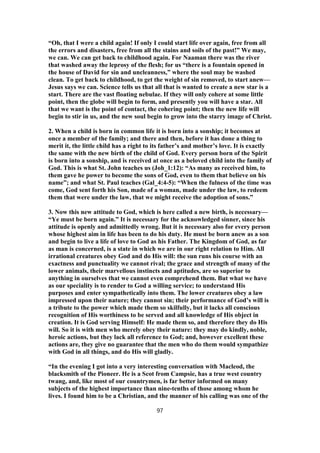
![most singular that has ever been heard of. He was for some time resting on a
righteousness of his own, trusting to a moral life and his general goodness, but
frequently with misgivings as to the security of his foundations. At times he fel t
that the sand on which he was resting was moving. When at Johanna on board
the Lynx, he was sent along with a party to assist the Enchantress, which had got
ashore. In the subsequent destruction of the vessel there was much confusion.
Kicking about the deck, he found some of Spurgeon’s sermons. In reading a few
sentences casually where the book opened, he met the expression: ‘You need not
carry your coals to Newcastle,’ i.e. you need not bring your righteousness to the
righteousness of Christ. He saw his mistake, and shortly afterwards found peace
and rest on the true foundation.” This blacksmith had made the very discovery
that was made by Saul of Tarsus, Luther, Wesley, and Dr. Chalmers.1 [Note:
Stewart of Lovedale, 67.]
(1) This new attitude is not required, of course, of such as are already subjects of
the change; and many are so even from their earliest years, having grown up into
Christ by the preventing or anticipating grace of their nurture in the Lord, so
that they can recollect no time when Christ was not their love, and the currents
of their inclination did not run toward His word and His cause. The case,
however, of such is no real exception; and, besides this, there is even no
semblance of exception. Intelligence, in fact, is not more necessary to our proper
humanity than the second birth of this humanity to its salvation.
The first years of our existence are simply animal; then the life of a young man is
not that of mere instinct, it is a life of passion, with mighty indignations, strong
aversions. And then passing on through life we sometimes see a person in whom
these things are merged; the instincts are there only for the support of existence;
the passions are so ruled that they have become gentleness, and meekness, and
love. Between these two extremes there must have been a middle point, when the
life of sense, appetite, and passion, which had ruled, ceased to rule, and was
ruled over by the life of the spirit; that moment, whether it be long or short,
whether it come like the rushing mighty wind, or as the slow, gentle zephyr of the
spring—whenever that moment was, then was the moment of spiritual
regeneration.
My conversion to the Lord Jesus might, with propriety, be compared to a mother
rousing an infant with a kiss—a simile answering exactly to my experience in
recalling it. Nor can I look back to that blessed epoch in my life without
magnifying His tender loving-kindness who spared me the doubts, terrors, and
perplexities through which so many souls have passed ere they tasted “joy and
peace in believing.”1 [Note: The Life, Labours, and Writings of Cæsar Malan,
37.]
There is no outwardly marked act of religious decision in Rainy’s youth, except
that he was admitted as a communicant in the year 1842 in connection with St.
John’s congregation, the minister of which at the time was the Rev. Dr. Thomas
Brown. He was a notably regular attendant at public worship. But we have
merely these outward facts. No one now survives who could give any report of
his religious impressions at this period and he has himself left no indication of
98](https://image.slidesharecdn.com/john3commentary-151103172742-lva1-app6891/85/John-3-commentary-98-320.jpg)
![them. I venture, however, to recall in this connection a remark he once made to
me to the effect that Tolstoi’s way of stating the Christian life lacked something
of saneness and even his way of exposing sinful life something of wholesomeness,
probably because his conversion unfortunately had had to be so violent a
reaction. Robert Rainy’s decisive religious experience, it may be safely said (if
one may so far presume as to characterize it), was not so much a reaction as a
realization—that equally genuine and equally evangelical type of conversion
(though the word conversion seems inappropriate to describe it) which consists
in the love and grace of God in Jesus Christ becoming, and that perhaps not at
any special time but with the natural development of mind and heart and will,
something personal and something vital. A Christian life thus originated is at
once supernatural and normal. It is the Christian life of one who not only has
been converted but has been converted and become as a little child, with a child’s
natural trust in its father, a child’s sheer happiness in goodness, a child’s instinct
of recoil from the impure. This was the note of Principal Rainy’s religion to the
end, and it seems to have been so from the beginning.2 [Note: P. C. Simpson, The
Life of Principal Rainy, i. 25.]
(2) One reason why the new attitude must be entered on by everybody is that it is
the entrance into a new order of being. It is the passage from the natural to the
spiritual. That fact gives the figure of the “new birth” peculiar appropriateness,
though the figure must not be urged too far, or treated literally. The passage
from the natural to the spiritual is beyond a man’s own effort; it is accomplished
by co-operation with the Spirit of God.
In this world we find a number of creatures which have what is known as animal
life. They can work, and feel, and, in a fashion, think. They have wills, and
certain dispositions, and distinctive characteristics. Every creature that has
animal life has a certain nature according to its kind, and determined by its
parentage; and this nature which the animal receives from its parents determines
from the first the capabilities and sphere of the animal’s life. The mole cannot
soar in the face of the sun like the eagle; neither can the bird that comes out of
the eagle’s egg burrow like the mole. No training can possibly make the tortoise
as swift as the antelope, or the antelope as strong as the lion. If a mole began to
fly and enjoy the sunlight it must be counted a new kind of creature, and no
longer a mole. The very fact of its passing certain limitations shows that another
nature has somehow been infused into it. Beyond its own nature no animal can
act. You might as well attempt to give the eagle the appearance of the serpent as
try to teach it to crawl. Each kind of animal is by its birth endowed with its own
nature, fitting it to do certain things, and making other things impossible. So is it
with us: we are born with certain faculties and endowments, with a certain
nature; and just as all animals, without receiving any new, individual,
supernatural help from God, can act according to their nature, so can we. We,
being human, have a high and richly-endowed animal nature, a nature that leads
us not only to eat, drink, sleep, and fight like the lower animals, but also to think
and to love, and which, by culture and education, can enjoy a much richer and
wider life than the lower creatures. Men need not be in the Kingdom of God in
order to do much that is admirable, noble, lovely, because their nature as
animals fits them for that. If we were to exist at all as a race of animals superior
99](https://image.slidesharecdn.com/john3commentary-151103172742-lva1-app6891/85/John-3-commentary-99-320.jpg)
![to all others, then all this is just what must be found in us. Irrespective of any
kingdom of God at all, irrespective of any knowledge of God or reference to Him,
we have a life in this world, and a nature fitting us for it. And it is this we have
by our natural birth, a place among our kind, an animal life. The first man, from
whom we all descend, was, as St. Paul profoundly says, “a living soul,” that is to
say, an animal, a living human being; but he had not “a quickening spirit,” could
not give to his children spiritual life and make them children of God.
It is not any doctrine of development or self-culture, no scheme of ethical
practice or social reorganization; but it is a salvation—a power moving on fallen
humanity from above its level to regenerate, and so to save. The whole fabric is
absurd, therefore, unless there was something to be done in man, and for him,
that required a supernatural intervention. We can see, too, at a glance, that the
style of the transaction is supernatural from the incarnate appearing onward.
Were it otherwise—were Christianity a merely natural and earthly product—
then it were only a fungus growing out of the world, and, with all its high
pretensions, could have nothing more to do for the world than any other fungus
for the heap on which it grows. The very name, Jesus, is a false pretence unless
He has something to do for the race which the race cannot do for itself—
something regenerative and new-creative—something fitly called a salvation.1
[Note: H. Bushnell, The New Life, 60.]
The difference between the two positions is radical. Translating from the
language of Science into that of Religion, the theory of Spontaneous Generation
is simply that a man may become gradually better and better until in course of
the process he reaches that quality of religious nature known as Spiritual Life.
This Life is not something added ab extra to the natural man; it is the normal
and appropriate development of the natural man. Biogenesis opposes to this the
whole doctrine of Regeneration. The Spiritual Life is the gift of the Living Spirit.
The spiritual man is no mere development of the natural man. He is a New
Creation born from above. As well expect a hay infusion to become gradually
more and more living, until in course of the process it reached Vitality, as expect
a man by becoming better and better to attain the Eternal Life.2 [Note: H.
Drummond, Natural Law in the Spiritual World, 65.]
Truly there is only one way of being born again, regeneration by the power of
the Spirit of God, the new heart; but there are many ways of conversion, of
outwardly turning to the Lord, of taking the actual first step that shows on
whose side we are. Regeneration is the sole work of the Holy Spirit in the human
heart and soul, and is in every case one and the same. Conversion, on the other
hand, bringing into play the action also of the human will, is never absolutely the
same perhaps in even two souls—as like and yet as different as are the faces of
men.3 [Note: John G. Paton, ii. 217.]
II
A New Attitude to the Past
The new attitude to God involves a new attitude to the past life. The “sinner”
100](https://image.slidesharecdn.com/john3commentary-151103172742-lva1-app6891/85/John-3-commentary-100-320.jpg)
![repents of his sin and turns to God in Christ; the “righteous” man passes from
outward obedience to inward love, with a sense of his sinfulness as keen as that
of any acknowledged sinner.
When men talk of the abolition of conversion and of the imitation of Jesus
Christ, they forget that there is a past which must be atoned for. Look at it this
way. Supposing I have run up an account with a tradesman, and I owe him quite
a large sum of money. I call at his place of business and I tell him that in future
all my transactions with him will be on a strictly cash basis, that I will pay for
everything as I order or receive it. I say nothing about the money which I owe
him, but I point out that as I intend to pay cash in future we start all square! Do
you think you could find a tradesman willing to agree to this? No. “What about
the money you already owe?” he would ask. “Payment of cash in the future will
never wipe out the debt of the past, and not until that is cleared off can we start
square.”1 [Note: A Father’s Letters to his Son, 128.]
1. We can verify our Lord’s assertion by honestly searching the depths of our
own hearts, and looking at ourselves in the light of God. Think what is meant
when we say, “God is light and in him is no darkness at all.” Think of that
absolute purity, that, to us, awful aversion from all that is evil, from all that is
sinful. Think of what sort of men they must be who can see the Lord. Are we fit
to pass that threshold? Are we fit to gaze into that Face? Is it possible that we
should have fellowship with Him? If we rightly meditate upon two facts, the
holiness of God and our own characters, we shall feel that Jesus Christ has truly
stated the case when He says, “Ye must be born again.” Unless we can get
ourselves radically changed, there is no Heaven for us; there is no fellowship
with God for us. We must stand before Him, and feel that a great gulf is fixed
between us and Him.
Self-dissatisfaction is with most of us our one necessity. Do you remember
Browning’s verses on the pictures in Florence, that tremendous and thrilling
contrast which he draws between the great Christian pictures in their manifest
incompleteness and the early Greek statues with their manifest completeness of
beauty and grace? Many of us have felt the contrast. It would be well for us all if
we fought our way with him through the depression to which the thought
sometimes gives birth. How vividly he sets forth the truth that a sense of
incompleteness is the first condition of completeness! You must ever be born
again to higher completeness if you would believe in a life to come, and the very
fact that you recognize your imperfection is the best thing about you. It is
finiteness in view and purpose that is our besetting sin. It was finiteness of view
and purpose that gave to the old classic statues a chance to seem complete, and
their very finiteness is the proof of their utter incompleteness; out of that came at
once their possibilities and their impossibilities.1 [Note: R. Eyton, The Glory of
the Lord, 25.]
Growth came when, looking your last on them all,
You turned your eyes inwardly one fine day
101](https://image.slidesharecdn.com/john3commentary-151103172742-lva1-app6891/85/John-3-commentary-101-320.jpg)
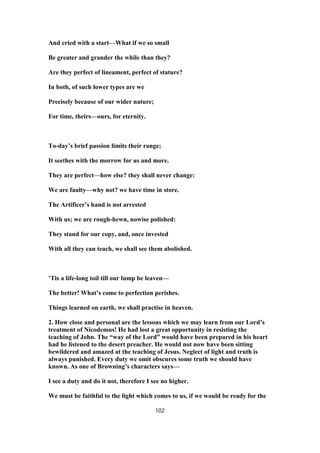
![greater light when it arises.
Our deeds still travel with us from afar,
And what we have been makes us what we are.
We can never tell how much we lose by unfaithfulness to the truths which touch
the conscience or to the light which shows the way of duty. The demands from
which we shrink or which we refuse are not always done with when we turn
away from them. They meet us again. The sin we know, the duty we have
neglected, the right which we have disobeyed, present themselves to us again.
They have to be confessed, performed, obeyed, before we can enter the kingdom
of life and peace.
(1) The first evidence of the reality of the new attitude to the past is that the
sinner ceases from sin. This is the meaning of the words of St. John (1Jn_3:9):
“Whosoever is born of God doth not commit sin; for his seed remaineth in him;
and he cannot sin, because he is born of God.” The passage of which this forms a
part is sometimes quoted as proving the sinlessness of all those who are
partakers of what is called higher life. The sixth verse especially is thus appealed
to. But these passages do not refer to any particular class who have attained this
higher life of which they speak, but to all, according to the sixth verse, who have
either seen or known Christ, and, according to the ninth verse, to all who have
been born again. If the passage teaches the perfect sinlessness in thought, word,
and act of any individual, it is of every one that has been born of the Spirit. But
that is not the meaning of the passage. The tense employed in the Greek is the
tense employed to denote habit, and the word is that made use of by St. John
himself to express habitual practice. The word rendered “commit” in 1Jn_3:9 is
the same word as is rendered “keep” in Joh_7:19 : “None of you keepeth the
law”; and the one verse may explain the other. As none of the Jews kept the law,
so those who have been born again do not keep sin. With their whole heart they
have given up their wicked ways; their habits are changed; they have abandoned
their former ways; they hate the sins they once loved, and they prove by their life
and conversation that a real change has taken place in their heart. That this is
the true meaning of the passage is proved beyond all doubt by the tenth verse,
“In this the children of God are manifest, and the children of the devil;
whosoever doeth not righteousness is not of God, neither he that loveth not his
brother.”
A man lying drunk was accosted by Dr. Kidd, who asked him what he was and
why he was lying there. “Do you not know me, Doctor? I am ane o’ your
converts,” was the reply. “Very like my handiwork,” rejoined the Doctor; “for if
God had converted you, you wouldn‘t be where you are.”1 [Note: James Stark,
Dr. Kidd of Aberdeen, 277.]
(2) Another sign of the reality of our new attitude to our past life is that we
obtain a clear victory over sin. It is impossible to overestimate the terrific hold
that sin has on the natural man. It grips him with such a grasp that he has no
better hope of escape than a fly has in a spider’s web. But when a person is
103](https://image.slidesharecdn.com/john3commentary-151103172742-lva1-app6891/85/John-3-commentary-103-320.jpg)
![reconciled to God through the precious blood of Christ, and born in Him into the
family of God, the web is broken, the chains are loosed, the conqueror is
conquered, and the captive free. Look at the words in 1Jn_5:4-5 : “For
whatsoever is born of God overcometh the world: and this is the victory that
overcometh the world, even our faith. Who is he that overcometh the world, but
he that believeth that Jesus is the Son of God?” The change therefore is not
merely one in thought or feeling, nor only an alteration of opinion; it is
essentially practical, and the result of it is that the dishonest man becomes
honest; the drunkard becomes sober; the rough-tempered man gentle; the
corrupt man pure; and the immoral profligate is transformed into the humble,
holy, repentant, and God-fearing servant of the Lord.
I would not for one minute have you suppose that God’s children are perfect,
and without spot or stain or defilement in themselves. Do not go away and say I
told you they were pure as angels and never made a slip or stumble. The same St.
John in the same Epistle declares: “If we say that we have no sin, we deceive
ourselves, and the truth is not in us.… If we say that we have not sinned, we
make him a liar, and his word is not in us.” But I do say that in the matter of
breaking God’s commandments, every one that is born again is quite a new man.
He no longer takes a light and cool and easy view of sin; he no longer judges of it
with the world’s judgment; he no longer thinks a little swearing, or a little
Sabbath-breaking, or a little fornication, or a little drinking, or a little
covetousness, small and trifling matters; but he looks on every sort of sin against
God or man as exceeding abominable and damnable in the Lord’s sight, and, as
far as in him lies, he hates it and abhors it, and desires to be rid of it root and
branch, with his whole heart and mind and soul and strength.1 [Note: J. C. Ryle,
The Christian Race, 44.]
Immediately upon his conversion the conviction came clearly to the scholar’s
mind that his opium-habit must at once be broken. There seems to have been no
parleying about it. Ever since he first entered the missionary’s household his
conscience had troubled him on the subject. Mr. Hill’s kind but sorrowful words
would not leave him, and their reproach was burnt into his soul.
“Mr. Hsi,” he had said, “you are a distinguished member of a scholarly family. I
deeply regret to see you brought to so enfeebled a condition through opium. If
you do not cleanse yourself, how can you be an example to others?”
But at that time he knew no power that could enable him to cleanse himself from
the degrading vice. Now all was different. He belonged to Christ, and there could
be no doubt as to the will of his new Master. It was thoroughly in keeping with
the character of the man to come to this clear decision at once. Of course, he
knew well what leaving off opium-smoking would involve. But there was no
shrinking; no attempt at half measures. He saw it must be sacrificed at once,
entirely, and for ever.
Then came the awful conflict. It was as though the great enemy of souls, seeing
his prisoner escaping, fell back upon this opium-habit as an invincible chain with
which to bind him. How critical was the struggle, how momentous the issues, Hsi
104](https://image.slidesharecdn.com/john3commentary-151103172742-lva1-app6891/85/John-3-commentary-104-320.jpg)
![himself hardly realized. Upon its outcome all his future power and usefulness
depended. As angels lingered near the Saviour tempted in the wilderness, may
we not believe the watchful ones lingered near Hsi in the hour of his great need?
By the merciful aid of God he was at last victorious.2 [Note: J. E. Hellier, Life of
David Hill, 136.]
(3) Another sign is that we gain the victory over the world. What is the natural
man?—a wretched slave to the opinion of this world. What the world says is
right he follows and approves; what the world says is wrong he renounces and
condemns also. How shall I do what my neighbours do not do? What will men
say of me if I become more strict than they? This is the natural man’s argument.
But from all this he that is born again is free. He is no longer led by the praise or
the blame, the laughter or the frown, of children of Adam like himself. He no
longer thinks that the sort of religion which everybody about him professes must
necessarily be right. He no longer considers “What will the world say?” but
“What does God command?”
I fear that unworldliness is almost conspicuous by its absence from our Church
members to-day. The world and the Church are so interlocked in unholy
wedlock that it is scarcely possible to say where the Church ends and where the
world begins. There was a time when the world and the Church were widely
separated, in the days when the early Christians carried their cross for Jesus;
but now the world has become religious, or which amounts to the same thing, the
Church has become worldly and the power of God has almost left us.1 [Note: G.
C. Grubb, Unsearchable Riches, 33.]
(4) The whole man is changed. “Old things are passed away; behold, all things
are become new.” There are new sorrows, new joys, new motives, new hopes, and
new principles. All things are now seen under a new light, and so appear in a
new colour; for “all things are of God, who hath reconciled us to himself by
Jesus Christ.” That great reconciliation changes everything.
It is inevitable that in such a moment there shall come into a man’s mind a
disgust for the past life,—the life of selfishness, the life of low ideals, the life of
contentment with self and with selfish surroundings. There will come a disgust in
the man’s soul, and he will say, Is it possible that I was made for this, that this is
the end and object of my life?—to go down town every morning and back again
at night, to see more beautiful things year by year in my house, to gather my
books about me, to learn a little more, to make myself more comfortable? Is it
possible that this is the last expression of life, the outcome of all the Divine power
that has been moving in the universe since the fiery clouds first filled the
firmament? Is this the outcome of it? An animal, comfortable, respecting himself,
respected of his fellow-men? Is this the end? Is there no higher term of existence?
1 [Note: L. Parks, The Winning of the Soul, 182.]
In a former chapter, we followed Father Paul Le Jeune on his winter roamings,
with a band of Montagnais, among the forests on the northern boundary of
Maine. Now Father Gabriel Druilletes sets forth on a similar excursion, but with
one essential difference. Le Jeune’s companions were heathen, who persecuted
105](https://image.slidesharecdn.com/john3commentary-151103172742-lva1-app6891/85/John-3-commentary-105-320.jpg)
![him day and night with their gibes and sarcasms. Those of Druilletes were all
converts, who looked on him as a friend and a father. There were prayers,
confessions, masses, and invocations of St. Joseph. They built their bark chapel
at every camp, and no festival of the Church passed unobserved. On Good
Friday they laid their best robe of beaver-skin on the snow, placed on it a
crucifix, and knelt around it in prayer. What was their prayer? It was a petition
for the forgiveness and the conversion of their enemies, the Iroquois. Those who
know the intensity and tenacity of an Indian’s hatred will see in this something
more than a change from one superstition to another. An idea had been
presented to the mind of the savage to which he had previously been an utter
stranger. This is the most remarkable record of success in the whole body of the
Jesuit Relations.2 [Note: Parkman, The Jesuits in North America, ii. 138.]
That noble old soul, Abraham, stood by me as an angel of God in sickness and in
danger; he went at my side wherever I had to go; he helped me willingly to the
last inch of strength in all that I had to do; and it was perfectly manifest that he
was doing all this, not from mere human love, but for the sake of Jesus. That
man had been a Cannibal in his heathen days, but by the grace of God there he
stood verily a new creature in Christ Jesus. Any trust, however sacred or
valuable, could be absolutely reposed in him; and in trial or danger, I was often
refreshed by that old Teacher’s prayers, as I used to be by the prayers of my
saintly father in my childhood’s home. No white man could have been a more
valuable helper to me in my perilous circumstances, and no person, white or
black, could have shown more fearless and chivalrous devotion.3 [Note: John G.
Paton, i. 173.]
III
A New Attitude to the Future
We have seen that two things are essential to a member of the Kingdom—an
outward act of allegiance, signifying repentance and the acceptance of pardon,
and an inward infusion of a new nature, which is indicated generally in chap.
Joh_1:12 by the words, “As many as received him, to them gave he power to
become the sons of God, even to them that believe on his name.”
The Christianity of Clovis does not indeed produce any fruits of the kind usually
looked for in a modern convert. We do not hear of his repenting ever so little of
any of his sins, nor resolving to lead a new life in any the smallest particular. He
had not been impressed with convictions of sin at the battle of Tolbiac; nor, in
asking for the help of the God of Clotilde, had he felt or professed the remotest
intention of changing his character, or abandoning his projects. What he was,
before he believed in his queen’s God, he only more intensely afterwards became,
in the confidence of that before unknown God’s supernatural help. His natural
gratitude to the Delivering Power, and pride in its protection, added only
fierceness to his soldiership, and deepened his political enmities with the rancour
of religious indignation. No more dangerous snare is set by the fiends for human
frailty than the belief that our own enemies are also the enemies of God; and it is
perfectly conceivable to me that the conduct of Clovis might have been the more
106](https://image.slidesharecdn.com/john3commentary-151103172742-lva1-app6891/85/John-3-commentary-106-320.jpg)
![unscrupulous, precisely in the measure that his faith was more sincere.1 [Note:
Ruskin, The Bible of Amiens (Works, xxxiii. 39).]
1. The new birth is the commencement of a new life. When the child is born it
begins to live. No one can tell what that mysterious power is that we call life. It is
something which all the science of the world is unable either to create or to
define. Now as life commences in the child at the moment of its birth, so life
commences in the soul when it is born again of the Spirit. The new birth is not
merely a change of habit in a living soul, it is the commencement of life where
there was none before. Thus the change when a person is born again is of the
same character as that which took place in Adam when God “breathed into his
nostrils the breath of life; and man became a living soul.” There is the same
difference in a person before the new birth and after it as there is between a
beautiful statue and a living man. The statue may be perfect in form, but it is
lifeless; the living person may be in some respects less beautiful in figure, but he
is alive, and, being alive, can move, and think, and act for God.
They tell me that some months ago a young Scotsman, who had been blind all his
life, suddenly, by a marvellous operation, received his sight. They say that to that
young man the world is another place. He wanders daily up and down in scenes
with which you and I are so familiar that we do not even call them beautiful, and
he sees a radiance which was hidden from ordinary everyday eyes that have
gazed upon them all their lives. “Oh,” he says, “the world is so beautiful! Who
would have thought it was so beautiful?” Apt figure of the experience of the man
who has found his God through the touch of a quickening Spirit.1 [Note: R. J.
Campbell, The Song of Ages, 160.]
Lord, I was blind: I could not see
In Thy marred visage any grace;
But now the brightness of Thy face
In radiant vision dawns on me.
2. The fundamental difficulty in understanding the truth of the new birth and
the new life lies in attempting to grasp it as a whole, and not in its special
activities. All life grows vague if you try to understand its central essence. All life
is clear, if you look at its special exhibitions. Ask us what life is in the most
commonplace of living men, and we utterly fail to tell what it is in its unfound
essence, or where it lurks among the hiding-places of the wondrous body; but
when he lifts his hand and strikes, when he opens his mouth and talks, then in a
moment we know unmistakably the living man. Now, so it is with the spiritual
life. It is hard to tell just what the essence of the new Christian life is in any man.
Theologians may contend over that, just as the physiologists contend over the
essence of life in the body; but the new functions of the new existence, the way in
which each separate power works differently, and each separate act is done
differently, in the Christian’s experience—this is not hard to trace.
107](https://image.slidesharecdn.com/john3commentary-151103172742-lva1-app6891/85/John-3-commentary-107-320.jpg)
![(1) One of the features of the new life is self-satisfaction.—There is a bad and a
good self-satisfaction. The bad self-satisfaction is only too common. It is what we
call self-conceit. A man seems to himself sufficient for everything. There is no
task that he will not accept. He does not look outside himself. The strength is in
his own arm, which he can make strong as iron to subdue his foes; in his own
heart, which he can make hard as a rock to bear his troubles. For doing or
enduring he needs nothing but himself. He can do anything. That self-conceit
must die, or the man is a failure. Somehow or other, the man must learn that in
himself he can do nothing. Then comes humility; and when in his humility he
casts himself upon another strength, and expects to do nothing save in the power
of God, then he is born again into a new self-satisfaction. To find himself taken
by God; to feel that God is giving him His strength; to say, “I can do anything
through Christ”; to face the world not in his own power, but in his Master’s—
that is the new, the deeper self-satisfaction.
“The first effect of conversion,” says Pascal, “is that we see the world and
ourselves from a standpoint altogether new.” New also are the feelings of relief
after struggle, of peace and harmony, of strength suddenly acquired, that the
triumph of unity brings in its train. The convert is caught up into a world of
grandeurs hitherto unknown. While shackled to the Moi he was a prisoner in a
strange land, cooped up in narrow bounds of space and time. Its chains once
broken, he feels heir to immensities beyond all telling.1 [Note: Viscount St.
Cyres, Pascal, 227.]
It is with man’s Soul as it was with Nature: the beginning of Creation is—Light.
Till the eye have vision, the whole members are in bonds. Divine moment, when
over the tempest-tost Soul, as once over the wild-weltering Chaos, it is spoken:
Let there be Light! Ever to the greatest that has felt such moment, is it not
miraculous and God-announcing; even as, under simpler figures, to the simplest
and least? The mad primeval Discord is hushed; the rudely-jumbled conflicting
elements bind themselves into separate Firmaments: deep silent rock-
foundations are built beneath; and the skyey vault with its everlasting
Luminaries above: instead of a dark wasteful Chaos, we have a blooming, fertile,
heaven-encompassed World.2 [Note: Carlyle, Sartor Resartus, bk. ii. ch. ix.]
(2) Another feature is Happiness.—It is easy to recognize the two levels of
happiness, and the way in which men pass from the upper and lighter into the
profounder and more serious one. Is this man happy whom I see in the first flush
of youth, just feeling his new powers, the red blood strong and swift in all his
veins, the exquisite delight of trying his just-discovered faculties of taste and
thought and skill filling each day with interest up to the brim? Is he happy, he
with his countless friends, his easy home, the tools and toys of life both lying
ready at his hand? Most certainly he is. His days sing as they go, and sparkle
with a bright delight that makes the generous observer rejoice for him, and
makes the jealous envy him.
But then you lose sight of him for a while, and years after you come on him
again. The man is changed. All is so altered! Everything is sobered. Is he happy
still? As you look into his face you cannot doubt his happiness a moment, but
108](https://image.slidesharecdn.com/john3commentary-151103172742-lva1-app6891/85/John-3-commentary-108-320.jpg)
![neither can you fail to see that this new happiness is something very different
from that which sparkled there before. This is serene and steady, and as you look
at it you see that its newness lies in this, that it is a happiness in principles and
character, while the other was a happiness in circumstances. The man whom you
used to know was happy because everything was right about him, because his
self was thoroughly indulged, because the sun shone and he was strong. The man
whom you know now is happy because there is goodness in the world, because
God is governing it, because in his own character the discipline of God is going
on. The first sort of happiness was self-indulgent; the new sort is built on and
around self-sacrifice.
You hear much of conversion nowadays: but people always seem to think they
have got to be made wretched by conversion,—to be converted to long faces. No,
friends, you have got to be converted to short ones; you have to repent into
childhood, to repent into delight, and delightsomeness.1 [Note: Ruskin, The
Crown of Wild Olive (Works, xviii. 431).]
To “the typical Moody convert,” during this mission, the Gospel came as tidings
of great joy.
“I had seen occasional instances before of instant transition from religious
anxiety to the clear and triumphant consciousness of restoration to God; but
what struck me in the gallery of Bingley Hall was the fact that this instant
transition took place with nearly every person with whom I talked. They had
come up into the gallery anxious, restless, feeling after God in the darkness, and
when, after a conversation of a quarter of an hour or twenty minutes, they went
away, their faces were filled with light, and they left me not only at peace with
God but filled with joy. I have seen the sunrise from the top of Helvellyn and the
top of the Righi, and there is something very glorious in it; but to see the light of
heaven suddenly strike on man after man in the course of one evening is very
much more thrilling. These people carried their new joy with them to their
homes and their workshops. It could not be hid.”1 [Note: The Life of R. W. Dale
of Birmingham, 319.]
A short time before leaving for China it became my daily duty to dress the foot of
a patient suffering from senile gangrene. The disease commenced as usual
insidiously, and the patient had little idea that he was a doomed man and
probably had not long to live. I was not the first to attend him, but when the case
was transferred to me I naturally became very anxious about his soul. The family
with whom he lived were Christians, and from them I learned that he was an
avowed atheist and very antagonistic to anything religious. They had without
asking his consent invited a Scripture reader to visit him, but in great passion he
had ordered him from the room. The Vicar of the district had also called, hoping
to help him, but he had spit in his face and refused to allow him to speak. His
temper was described to me as very violent, and altogether the case seemed as
hopeless as could well be imagined.
Upon first commencing to attend him I prayed much about it, but for two or
three days said nothing of a religious nature. By special care in dressing his
109](https://image.slidesharecdn.com/john3commentary-151103172742-lva1-app6891/85/John-3-commentary-109-320.jpg)
![diseased limb I was able considerably to lessen his sufferings, and he soon began
to manifest appreciation of my services. One day with a trembling heart I took
advantage of his grateful acknowledgments to tell him what was the spring of my
action, and to speak of his solemn position and need of God’s mercy through
Christ. It was evidently only a powerful effort of self-restraint that kept his lips
closed. He turned over in bed with his back to me, and uttered no word.
I could not get the poor man out of my mind, and very often through each day I
pleaded with God, by His Spirit, to save him ere He took him hence. After
dressing the wound and relieving the pain, I never failed to say a few words to
him which I hoped the Lord would bless. He always turned his back, looking
annoyed, but never made any reply.
After continuing this for some time my heart sank. It seemed to me that I was not
only doing no good but perhaps really hardening him and increasing his guilt.
One day after dressing his limb and washing my hands, instead of returning to
the bedside, I went to the door and stood hesitating a moment with the thought
in my mind, “Ephraim is joined to idols; let him alone.” Looking at my patient I
6 Flesh gives birth to flesh, but the Spirit[b]
gives birth to spirit.
BARNES, "That which is born of the flesh - To show the necessity of this
change, the Saviour directs the attention of Nicodemus to the natural condition of
man. By “that which is born of the flesh” he evidently intends man as he is by nature,
in the circumstances of his natural birth. Perhaps, also, he alludes to the question
asked by Nicodemus, whether a man could be born when he was old? Jesus tells him
that if this could be, it would not answer any valuable purpose; he would still have
the same propensities and passions. Another change was therefore indispensable.
Is flesh - Partakes of the nature of the parent. Compare Gen_5:3. As the parents
are corrupt and sinful, so will be their descendants. See Job_14:4. And as the parents
are wholly corrupt by nature, so their children will be the same. The word “flesh”
here is used as meaning “corrupt, defiled, sinful.” The “flesh” in the Scriptures is
often used to denote the sinful propensities and passions of our nature, as those
propensities are supposed to have their seat in the animal nature. “The works of the
flesh are manifest, which are these: adultery, fornication, uncleanness,
lasciviousness,” etc., Gal_5:19-20. See also Eph_2:3; 1Pe_3:21; 1Pe_2:18; 1Jo_2:16;
Rom_8:5.
Is born of the Spirit - Of the Spirit of God, or by the agency of the Holy Spirit.
Is spirit - Is spiritual, “like” the spirit, that is, holy, pure. Here we learn:
1. That all men are by nature sinful.
110](https://image.slidesharecdn.com/john3commentary-151103172742-lva1-app6891/85/John-3-commentary-110-320.jpg)
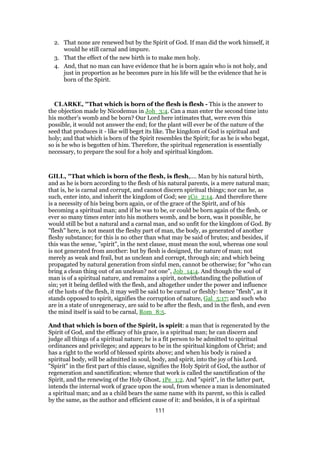
![nature itself, and exerts itself in spiritual acts and exercises, and directs to, and
engages in spiritual things; and has its seat also in the spirit, or soul of man.
HENRY, " The necessity of this change. First, Christ here shows that it is
necessary in the nature of the thing, for we are not fit to enter into the kingdom of
God till we are born again: That which is born of the flesh if flesh, Joh_3:6. Here is
our malady, with the causes of it, which are such that it is plain there is no remedy
but we must be born again. 1. We are here told what we are: We are flesh, not only
corporeal but corrupt, Gen_6:3. The soul is still a spiritual substance, but so wedded
to the flesh, so captivated by the will of the flesh, so in love with the delights of the
flesh, so employed in making provision for the flesh, that it is mostly called flesh; it is
carnal. And what communion can there be between God, who is a spirit, and a soul in
this condition? 2. How we came to be so; by being born of the flesh. It is a corruption
that is bred in the bone with us, and therefore we cannot have a new nature, but we
must be born again. The corrupt nature, which is flesh, takes rise from our first
birth; and therefore the new nature, which is spirit, must take rise from a second
birth. Nicodemus spoke of entering again into his mother's womb, and being born;
but, if he could do so, to what purpose? If he were born of his mother a hundred
times, that would not mend the matter, for still that which is born of the flesh if flesh;
a clean thing cannot be brought out of an unclean. He must seek for another original,
must be born of the Spirit, or he cannot become spiritual. The case is, in short, this:
though man is made to consist of body and soul, yet his spiritual part had then so
much the dominion over his corporeal part that he was denominated a living soul
(Gen_2:7), but by indulging the appetite of the flesh, in eating forbidden fruit, he
prostituted the just dominion of the soul to the tyranny of sensual lust, and became
no longer a living soul, but flesh: Dust thou art. The living soul became dead and
inactive; thus in the day he sinned he surely died, and so he became earthly. In this
degenerate state, he begat a son in his own likeness; he transmitted the human
nature, which had been entirely deposited in his hands, thus corrupted and
depraved; and in the same plight it is still propagated. Corruption and sin are woven
into our nature; we are shapen in iniquity, which makes it necessary that the nature
be changed. It is not enough to put on a new coat or a new face, but we must put on
the new man, we must be new creatures. Secondly, Christ makes it further necessary,
by his own word: Marvel not that I said unto thee, You must be born again, Joh_3:7.
1. Christ hath said it, and as he himself never did, nor ever will, unsay it, so all the
world cannot gainsay it, that we must be born again. He who is the great Lawgiver,
whose will is a law, - he who is the great Mediator of the new covenant, and has full
power to settle the terms of our reconciliation to God and happiness in him, - he who
is the great Physician of souls, knows their case, and what is necessary to their cure, -
he hath said, You must be born again. “I said unto thee that which all are concerned
in, You must, you all, one as well as another, you must be born again: not only the
common people, but the rulers, the masters in Israel.” 2. We are not to marvel at it;
for when we consider the holiness of the God with whom we have to do, the great
design of our redemption, the depravity of our nature, and the constitution of the
happiness set before us, we shall not think it strange that so much stress is laid upon
this as the one thing needful, that we must be born again.
[d.] This change is illustrated by two comparisons. First, The regenerating work of
the Spirit is compared to water, Joh_3:5. To be born again is to be born of water and
of the Spirit, that is, of the Spirit working like water, as (Mat_3:11) with the Holy
Ghost and with fire means with the Holy Ghost as with fire. 1. That which is
primarily intended here is to show that the Spirit, in sanctifying a soul, (1.) Cleanses
and purifies it as water, takes away its filth, by which it was unfit for the kingdom of
God. It is the washing of regeneration, Tit_3:5. You are washed, 1Co_6:11. See Eze_
112](https://image.slidesharecdn.com/john3commentary-151103172742-lva1-app6891/85/John-3-commentary-112-320.jpg)
![36:25. (2.) Cools and refreshes it, as water does the hunted hart and the weary
traveller. The Spirit is compared to water, Joh_7:38, Joh_7:39; Isa_44:3. In the first
creation, the fruits of heaven were born of water (Gen_1:20), in allusion to which,
perhaps, they that are born from above are said to be born of water. 2. It is probable
that Christ had an eye to the ordinance of baptism, which John had used and he
himself had begun to use, “You must be born again of the Spirit,” which regeneration
by the Spirit should be signified by washing with water, as the visible sign of that
spiritual grace: not that all they, and they only, that are baptized, are saved; but
without that new birth which is wrought by the Spirit, and signified by baptism, none
shall be looked upon as the protected privileged subjects of the kingdom of heaven.
The Jews cannot partake of the benefits of the Messiah's kingdom, they have so long
looked for, unless they quit all expectations of being justified by the works of the law,
and submit to the baptism of repentance, the great gospel duty, for the remission of
sins, the great gospel privilege. Secondly, It is compared to wind: The wind bloweth
where it listeth, so is every one that is born of the Spirit, Joh_3:8. The same word
(pneuma) signifies both the wind and the Spirit. The Spirit came upon the apostles in
a rushing mighty wind (Act_2:2), his strong influences on the hearts of sinners are
compared to the breathing of the wind (Eze_37:9), and his sweet influences on the
souls of saints to the north and south wind, Son_4:16. This comparison is here used
to show, 1. That the Spirit, in regeneration, works arbitrarily, and as a free agent.
The wind bloweth where it listeth for us, and does not attend our order, nor is
subject to our command. God directs it; it fulfils his word, Psa_148:8. The Spirit
dispenses his influences where, and when, on whom, and in what measure and
degree, he pleases, dividing to every man severally as he will, 1Co_12:11. 2. That he
works powerfully, and with evident effects: Thou hearest the sound thereof; though
its causes are hidden, its effects are manifest. When the soul is brought to mourn for
sin, to groan under the burden of corruption, to breathe after Christ, to cry Abba -
Father, then we hear the sound of the Spirit, we find he is at work, as Act_9:11,
Behold he prayeth. 3. That he works mysteriously, and in secret hidden ways: Thou
canst not tell whence it comes, nor whither it goes. How it gathers and how it spends
its strength is a riddle to us; so the manner and methods of the Spirit's working are a
mystery. Which way went the Spirit? 1Ki_22:24. See Ecc_11:5, and compare it with
Psa_139:14.
JAMIESON, "That which is born, etc. — A great universal proposition; “That
which is begotten carries within itself the nature of that which begat it” [Olshausen].
flesh — Not the mere material body, but all that comes into the world by birth, the
entire man; yet not humanity simply, but in its corrupted, depraved condition, in
complete subjection to the law of the fall (Rom_8:1-9). So that though a man “could
enter a second time into his mother’s womb and be born,” he would be no nearer this
“new birth” than before (Job_14:4; Psa_51:5).
is spirit — “partakes of and possesses His spiritual nature.”
CALVIN, "6.That which is born of the flesh. By reasoning from contraries, he
argues that the kingdom of God is shut against us, unless an entrance be opened
to us by a new birth, ( παλιγγενεσία) For he takes for granted, that we cannot
enter into the kingdom of God unless we are spiritual. But we bring nothing
from the womb but a carnal nature. Therefore it follows, that we are naturally
banished from the kingdom of God, and, having been deprived of the heavenly
life, remain under the yoke of death. Besides, when Christ argues here, that men
113](https://image.slidesharecdn.com/john3commentary-151103172742-lva1-app6891/85/John-3-commentary-113-320.jpg)
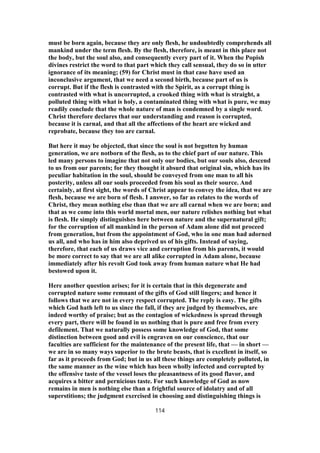
![partly blind and foolish, partly imperfect and confused; all the industry that we
possess flows into vanity and trifles; and the will itself, with furious impetuosity,
rushes headlong to what is evil. Thus in the whole of our nature there remains
not a drop of uprightness. Hence it is evident that we must be formed by the
second birth, that we may be fitted for the kingdom of God; and the meaning of
Christ’s words is, that as a man is born only carnal from the womb of his
mother; he must be formed anew by the Spirit, that he may begin to be spiritual.
The word Spirit is used here in two senses, namely, for grace, and the effect of
grace. For in the first place, Christ informs us that The Spirit of God is the only
Author of a pure and upright nature, and afterwards he states, that we are
spiritual, because we have been renewed by his power.
COFFMAN, "Verse 6
That which is born of the flesh is flesh; and that which is born of the Spirit is
spirit.
Just as there are two elements in the new birth, there are two elements in man
that require it. The flesh is born of the water (baptized), and the spirit is born of
the Spirit (receives the Holy Spirit); but these are not two births, only one new
birth.
Born ... The etymology of this word bears witness to the nature of the ceremony
of baptism, coming from an old Anglo-Saxon word, "to be drawn forth from."
The previous verse revealed the two elements of the new birth, this the
requirement that both flesh and spirit participate in it. Thus, what Jesus was
saying to Nicodemus was: "Do what my disciples have done; first submit to
John's baptism, and then come join my company."[12] If he had done so, the
second element of the new birth, the reception of the Spirit would have been
completed after Pentecost. The fact that at that particular time, Nicodemus could
not have received the Holy Spirit, since he was not given yet, proves that the new
birth as experienced in the new dispensation was in view here. See under John
7:39.
ENDNOTE:
[12] A. M. Hunter, The Gospel according to John (Cambridge: University Press,
1965), p. 37.
7 You should not be surprised at my saying,
‘You[c] must be born again.’
115](https://image.slidesharecdn.com/john3commentary-151103172742-lva1-app6891/85/John-3-commentary-115-320.jpg)
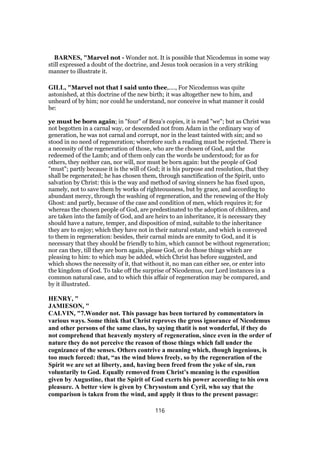
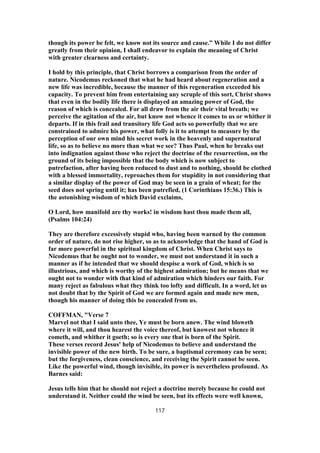
![and no one doubted the existence or power of the agent.[13]
Nicodemus, schooled in all the Mosaic ritual, found the concept of a new birth
difficult to accept; but he is not the only one who ever had trouble with these
words of Jesus. Note this:
If the rite of baptism provided the moment and occasion of the spiritual result,
we should know whence it came and whither it went. We might not know how,
but we should know WHEN and WHENCE the spiritual change took place. But
this knowledge is distinctly negatived by Christ who herein declares the moment
of the spiritual birth to be lost or hidden to God.[14]
This interpretation (!) is typical of the gimmickry employed in vain efforts to talk
the rite of baptism out of this passage and out of the whole New Testament. Note
the play upon the words "whence" and "when," as if the similarity of these
words interchanged their meaning. Can anyone believe that Jesus was here
telling Nicodemus that he could not tell "when" the wind was blowing? But the
words rhyme! So what? "P" stands for pool; and "P" rhymes with "T" and "T"
stands for trouble, right here in River City! People do know WHEN the wind is
blowing; and Christ also revealed the WHEN of the new birth; it is WHEN we
are baptized into Christ. As Paul said, "Being THEN made free from sin"
(Romans 6:17,18 KJV), that is, WHEN we have been baptized. Paul was
discussing Christian baptism in that passage, and he did not hesitate to make the
Christian's baptism the exact moment, the THEN of his being made free from sin
and becoming a servant of righteousness. See my Commentary on Romans, p.
226.
[13] Alfred Barnes, Notes on the New Testament (Grand Rapids: Baker Book
House, 1954), Volumes on Luke and John, p. 203.
[14] H. R. Reynolds, The Pulpit Commentary (Grand Rapids, Michigan: William
B. Eerdmans Publishing Company, 1962), Vol. 17, p. 118.
BARCLAY, "THE DUTY TO KNOW AND THE RIGHT TO SPEAK (John
3:7-13)
3:7-13 Do not be surprised that I said to you: "You must be reborn from above.
The wind blows where it will, and you hear the sound of it, but you do not know
whence it comes and whither it goes. So is every one that is born of the Spirit."
Nicodemus answered: "How can these things happen?" Jesus answered: "Are
you the man whom everyone regards as the teacher of Israel, and you do not
understand these things? This is the truth I tell you--we speak what we know,
and we bear witness to what we have seen; but you do not receive our witness. If
I have spoken to you of earthly things and you do not believe me, how will you
believe me if I speak to you about heavenly things." No one has gone up to
heaven, except he who came down from heaven, I mean, the Son of Man, who is
in heaven.
There are two kinds of misunderstanding. There is the misunderstanding of the
man who misunderstands because he has not yet reached a stage of knowledge
and of experience at which he is able to grasp the truth. When a man is in that
state our duty is to do all that we can to explain things to him so that he will be
118](https://image.slidesharecdn.com/john3commentary-151103172742-lva1-app6891/85/John-3-commentary-118-320.jpg)
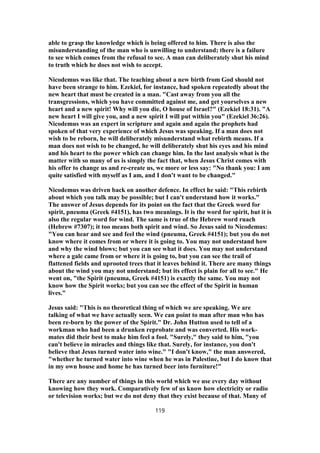
![us drive an automobile with only the haziest notion of what goes on below its
hood; but our lack of understanding does not prevent us using and enjoying the
benefits which an automobile confers. We may not understand how the Spirit
works; but the effect of the Spirit on the lives of men is there for all to see. The
unanswerable argument for Christianity is the Christian life. No man can
disregard a faith which is able to make bad men good.
Jesus said to Nicodemus: "I have tried to make things simple for you; I have
used simple human pictures taken from everyday life; and you have not
understood. How can you ever expect to understand the deep things, if even the
simple things are beyond you?" There is a warning here for every one of us. It is
easy to sit in discussion groups, to sit in a study and to read books, it is easy to
discuss the intellectual truth of Christianity; but the essential thing is to
experience the power of Christianity. And it is fatally easy to start at the wrong
end and to think of Christianity as something to be discussed, not as something
to be experienced. It is certainly important to have an intellectual grasp of the
orb of Christian truth; but it is still more important to have a vital experience of
the power of Jesus Christ. When a man undergoes treatment from a doctor,
when he has to have an operation, when he is given some medicine to take, he
does not need to know the anatomy of the human body, the scientific effect of the
anaesthetic, the way in which the drug works on his body, in order to be cured.
99 men out of every 100 accept the cure without being able to say how it was
brought about. There is a sense in which Christianity is like that. At its heart
there is a mystery, but it is not the mystery of intellectual appreciation; it is the
mystery of redemption.
In reading the Fourth Gospel there is the difficulty of knowing when the words
of Jesus stop and the words of the writer of the gospel begin. John has thought so
long about the words of Jesus that insensibly he glides from them to his own
thoughts about them. Almost certainly the last words of this passage are the
words of John. It is as if someone asked: "What right has Jesus to say these
things? What guarantee do we have that they are true?" John's answer is simple
and profound. "Jesus," he says, "came down from heaven to tell us the truth of
God. And, when he had companied with men and died for them, he returned to
his glory." It was John's contention that Jesus' right to speak came from the fact
that he knew God personally, that he had come direct from the secrets of heaven
to earth, that what he said to men was most literally God's own truth, for Jesus
was and is the embodied mind of God.
8 The wind blows wherever it pleases. You hear
its sound, but you cannot tell where it comes
from or where it is going. So it is with everyone
born of the Spirit.”[d]
120](https://image.slidesharecdn.com/john3commentary-151103172742-lva1-app6891/85/John-3-commentary-120-320.jpg)
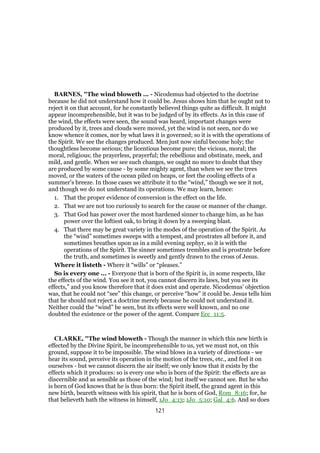
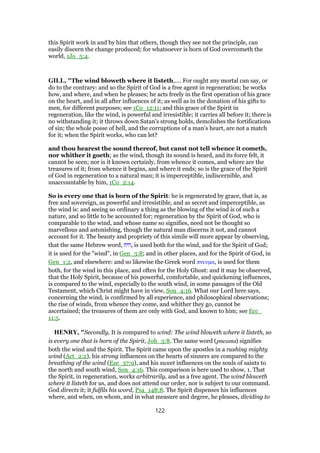
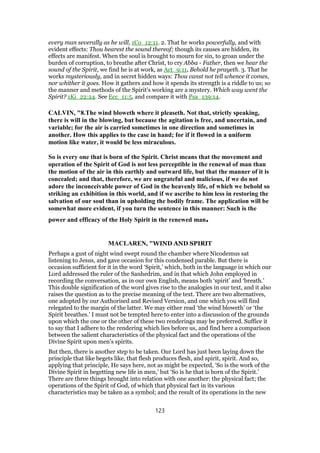
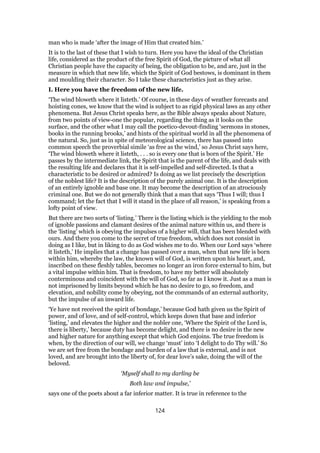
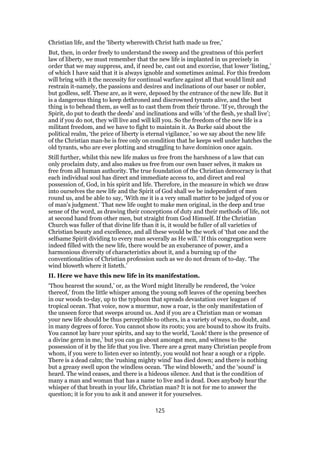
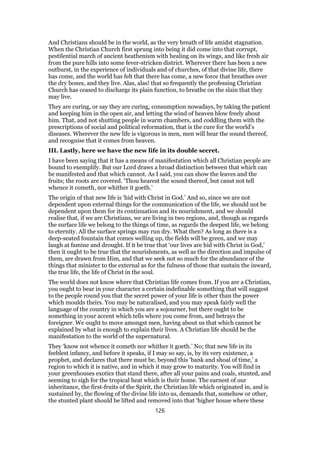
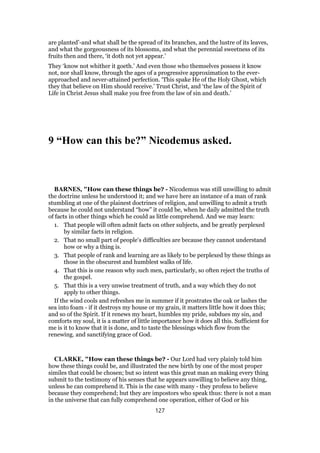
![instrument nature; and yet they must believe, and do believe, though they never did
nor ever can fully comprehend, or account for, the objects of their faith.
GILL, "Nicodemus answered and said unto him,.... Remaining still as
ignorant as ever, though Christ had explained the phrase "born again", at which he
stumbled, by a being "born of water and of the Spirit", or of the grace of the Spirit of
God; and had illustrated this by the free, powerful, and invisible blowing of the wind:
how can these things be? The Arabic version reads, "how can this be?" referring
either to the last thing said, that a man's being born of the Spirit, is like the blowing
of the wind; or to the explanation of the first expression, that a man should be born
of water, and of the Spirit; or to the first assertion itself, that a man should be born
again; which notwithstanding the explanation and illustration, seemed as impossible,
and as impracticable as ever; or rather to them all, and so the Persic version reads,
"how can all these things be?"
HENRY, "2. Here is a discourse concerning the certainty and sublimity of gospel
truths, which Christ takes occasion for from the weakness of Nicodemus. Here is,
(1.) The objection which Nicodemus still made (Joh_3:9): How can these things
be? Christ's explication of the doctrine of the necessity of regeneration, it should
seem, made it never the clearer to him. The corruption of nature which makes it
necessary, and the way of the Spirit which makes it practicable, are as much
mysteries to him as the thing itself; though he had in general owned Christ a divine
teacher, yet he was unwilling to receive his teachings when they did not agree with
the notions he had imbibed. Thus many profess to admit the doctrine of Christ in
general, and yet will neither believe the truths of Christianity nor submit to the laws
of it further than they please. Christ shall be their teacher, provided they may choose
their lesson. Now here, [1.] Nicodemus owns himself ignorant of Christ's meaning,
after all: “How can these things be? They are things I do not understand, my capacity
will not reach them.” Thus the things of the Spirit of God are foolishness to the
natural man. He is not only estranged from them, and therefore they are dark to
him, but prejudiced against them, and therefore they are foolishness to him. [2.]
Because this doctrine was unintelligible to him (so he was pleased to make it), he
questions the truth of it; as if, because it was a paradox to him, it was a chimera in
itself. Many have such an opinion of their own capacity as to think that that cannot
be proved which they cannot believe; by wisdom they knew not Christ.
(2.) The reproof which Christ gave him for his dulness and ignorance: “Art thou a
master in Israel, Didaskalos - a teacher, a tutor, one who sits in Moses's chair, and
yet not only unacquainted with the doctrine of regeneration, but incapable of
understanding it?” This word is a reproof, [1.] To those who undertake to teach
others and yet are ignorant and unskilful in the word of righteousness themselves.
[2.] To those that spend their time in learning and teaching notions and ceremonies
in religion, niceties and criticisms in the scripture, and neglect that which is practical
and tends to reform the heart and life. Two words in the reproof are very emphatic: -
First, The place where his lot was cast: in Israel, where there was such great plenty of
the means of knowledge, where divine revelation was. He might have learned this out
of the Old Testament. Secondly, The things he was thus ignorant in: these things,
these necessary things, there great things, these divine things; had he never read
Psa_50:5, Psa_50:10; Eze_18:31; Eze_36:25, Eze_36:26?
128](https://image.slidesharecdn.com/john3commentary-151103172742-lva1-app6891/85/John-3-commentary-128-320.jpg)
![JAMIESON, "How, etc. — Though the subject still confounds Nicodemus, the
necessity and possibility of the new birth is no longer the point with him, but the
nature of it and how it is brought about [Luthardt]. “From this moment Nicodemus
says nothing more, but has sunk unto a disciple who has found his true teacher.
Therefore the Savior now graciously advances in His communications of truth, and
once more solemnly brings to the mind of this teacher in Israel, now become a
learner, his own not guiltless ignorance, that He may then proceed to utter, out of
the fullness of His divine knowledge, such farther testimonies both of earthly and
heavenly things as his docile scholar may to his own profit receive” [Stier].
SBC, "The Christian Mysteries.
The Feast of Trinity succeeds Pentecost; the light of the Gospel does not remove
mysteries in religion. This is our subject. Let us enlarge upon it.
I. Consider such difficulties in religion as press upon us independently of the
Scriptures. Now we shall find the Gospel has not removed these; they remain as great
as before Christ came. Why does God permit so much evil in His own world? This
was a mystery before God gave His revelation. It is as great a mystery now, and
doubtless for this reason, because knowledge about it would do us no good; it would
merely satisfy curiosity.
II. Nor, again, are the difficulties of Judaism removed by Christianity. The Gospel
gives us no advantages, in mere barren knowledge, above the Jew, or above the
unenlightened heathen.
III. Nay, we may proceed to say, further than this, that it increases our difficulties. It
is, indeed, a remarkable circumstance, that the very revelation that brings us
practical and useful knowledge about our souls, in the very act of doing so, may (as it
would seem), in consequence of doing so, bring us mysteries. We gain spiritual light
at the expense of intellectual perplexity; a blessed exchange doubtless, still at the
price of perplexity. As we draw forth many remarkable facts concerning the natural
world which do not lie on its surface, so by meditation we detect in revelation this
remarkable principle, which is not openly propounded, that religious light is
intellectual darkness.
IV. Such being the necessary mysteriousness of Scripture doctrine, how can we best
turn it to account in the contest which we are engaged on with our own evil hearts?
Difficulties in revelation are expressly given to prove the reality of our faith. They are
stumbling-blocks to proud, unhumbled minds, and were intended to be such. Faith is
unassuming, modest, thankful, obedient. Those that believe not fall away; the true
disciples remain firm, for they feel their eternal interests at stake, and ask the very
plain and practical, as well as affectionate, question, "To whom shall we go" if we
leave Christ?
J. H. Newman, Parochial and Plain Sermons, vol. i., p. 203.
CALVIN, "9.How can these things be? We see what is the chief obstacle in the
way of Nicodemus. Every thing that he hears appears monstrous, because he
does not understand the manner of it; so that there is no greater obstacle to us
than our own pride; that is, we always wish to be wise beyond what is proper,
and therefore we reject with diabolical pride every thing that is not explained to
our reason; as if it were proper to limit the infinite power of God to our poor
capacity. We are, indeed, permitted, to a certain extent, to inquire into the
manner and reason of the works of God, provided that we do so with sobriety
129](https://image.slidesharecdn.com/john3commentary-151103172742-lva1-app6891/85/John-3-commentary-129-320.jpg)
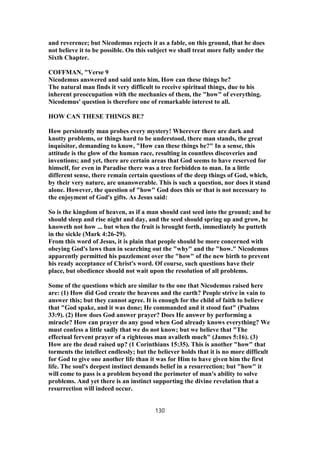
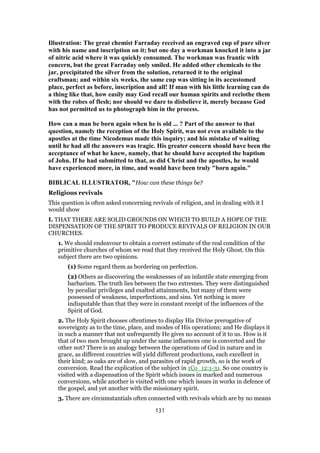
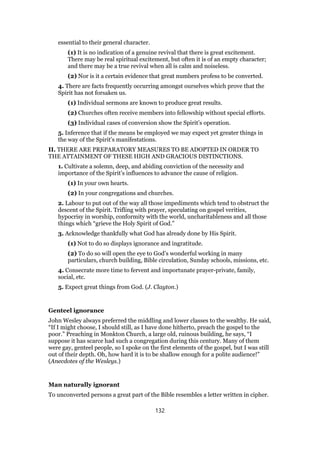
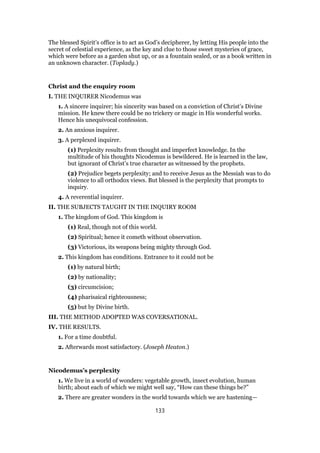
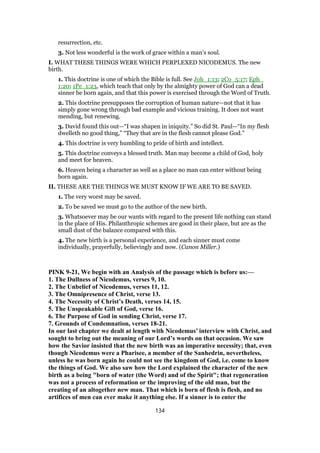
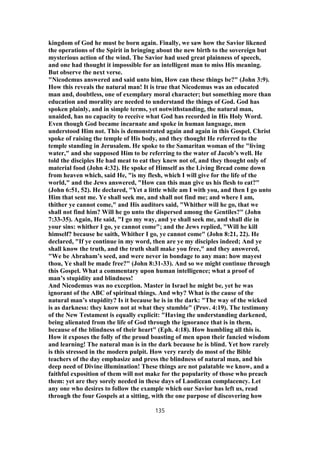
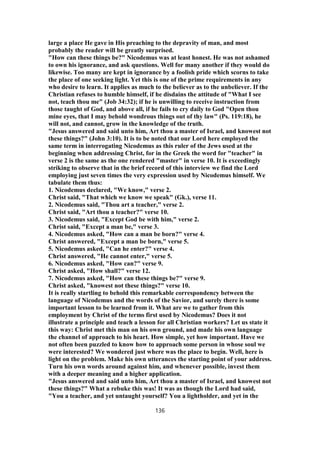
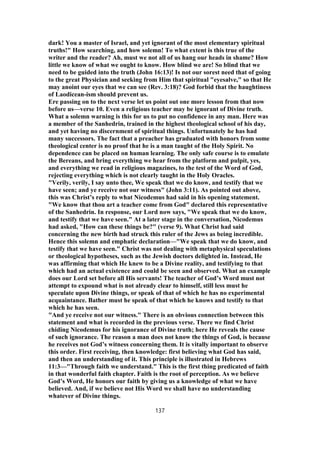
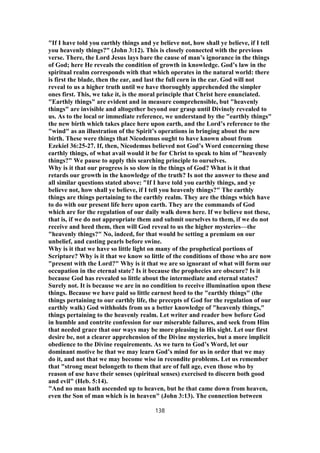
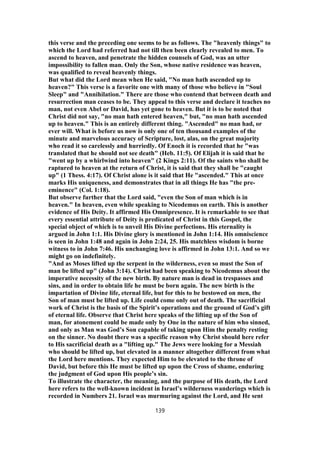
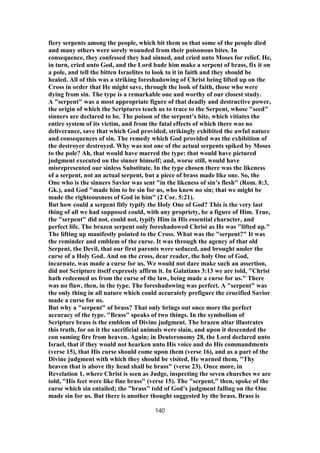
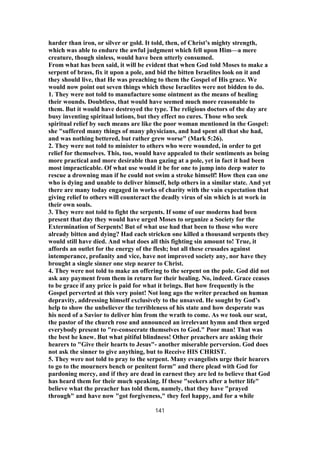
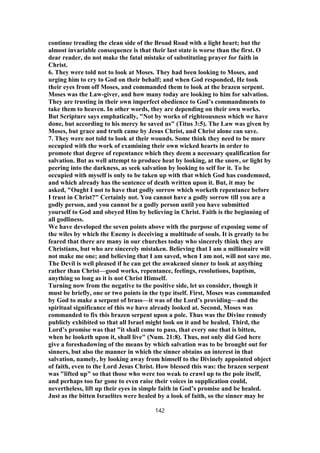
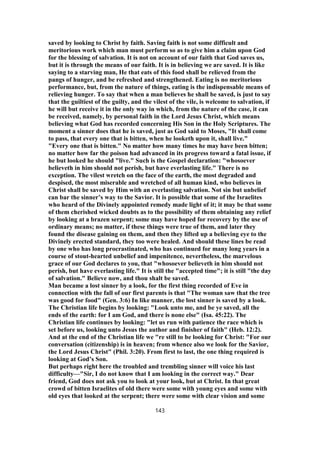
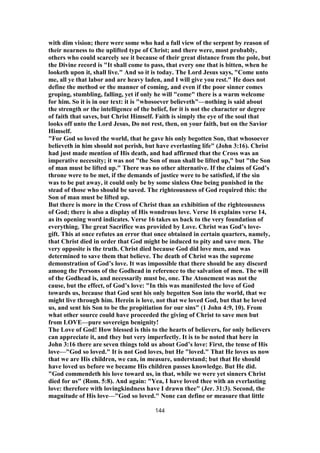
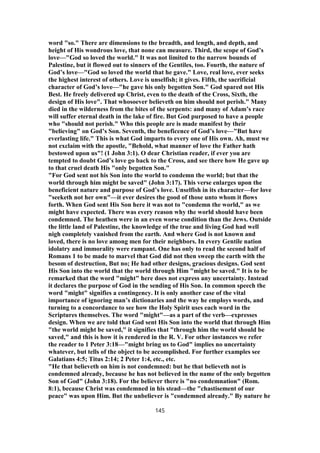
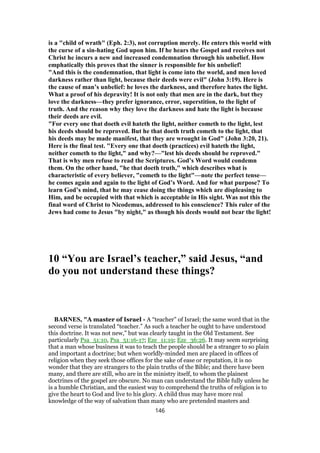
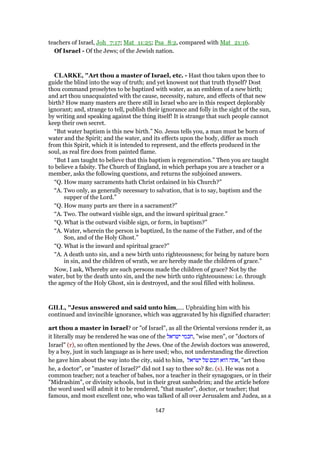
![surpassing one: and now, though he was not only an Israelite, with whom were the
laws, statutes, judgments, and oracles of God, the writings of Moses, and the
prophets; but a teacher of Israelites, and in the highest class of teachers, and of the
greatest fame among them, yet was he ignorant of the first and most important
things in religion:
and knowest not these things? which were so plainly to be suggested in the
sacred writings, with which he was; or ought to have been conversant: for the same
things Christ had been speaking of, are there expressed by a circumcision of the
heart; by a birth, a nation's being born at once; by sanctification; by the grace of God
signified under the metaphor of water; and by quickening persons, comparable to dry
bones, through the wind blowing, and breathing into them, Deu_30:6.
HENRY, "The reproof which Christ gave him for his dulness and ignorance: “Art
thou a master in Israel, Didaskalos - a teacher, a tutor, one who sits in Moses's chair,
and yet not only unacquainted with the doctrine of regeneration, but incapable of
understanding it?” This word is a reproof, [1.] To those who undertake to teach
others and yet are ignorant and unskilful in the word of righteousness themselves.
[2.] To those that spend their time in learning and teaching notions and ceremonies
in religion, niceties and criticisms in the scripture, and neglect that which is practical
and tends to reform the heart and life. Two words in the reproof are very emphatic: -
First, The place where his lot was cast: in Israel, where there was such great plenty of
the means of knowledge, where divine revelation was. He might have learned this out
of the Old Testament. Secondly, The things he was thus ignorant in: these things,
these necessary things, there great things, these divine things; had he never read
Psa_50:5, Psa_50:10; Eze_18:31; Eze_36:25, Eze_36:26?
CALVIN, "10.Thou art a teacher of Israel. As Christ sees that he is spending his
time and pains to no purpose in teaching so proud a man, he begins to reprove
him sharply. And certainly such persons will never make any progress, until the
wicked confidence, with which they are puffed up, be removed. This is, very
properly, placed first in order; for in the very matter in which he chiefly plumes
himself on his acuteness and sagacity, Christ censures his ignorance. He thought,
that not to admit a thing to be possible would be considered a proof of gravity
and intelligence, because that man is accounted. foolishly credulous who assents
to what is told him by another, before he has fully inquired into the reason. But
still Nicodemus, with all his magisterial haughtiness, exposes himself to ridicule
by more than childish hesitation about the first principles. Such hesitation,
certainly, is base and shameful. For what religion have we, what knowledge of
God, what rule of living well, what hope of eternal life, if we do not believe that
man is renewed by the Spirit of God? There is an emphasis, therefore, in the
wordthese; for since Scripture frequently repeats this part of doctrine, it ought
not to be unknown even to the lowest class of beginners. It is utterly beyond
endurance that any man should be ignorant and unskilled in it, who professes to
be a teacher in the Church of God.
COFFMAN, "Verse 10
And Jesus answered and said unto him, Art thou the teacher of Israel and
understandest not these things?
By this answer, Christ did not deny some element of mystery regarding the
148](https://image.slidesharecdn.com/john3commentary-151103172742-lva1-app6891/85/John-3-commentary-148-320.jpg)
![questions Nicodemus had raised, but was exclaiming at his failure to understand
the basic things Christ had commanded him to do. The Lord's words to this
ruler of the Jews were the blunt equivalent of "Look, you Pharisees stop
rejecting John's baptism; obey God by submitting to it; but that is only part of
it; you must allow the Spirit of God to dwell in your heart, and that can come
about only by your following me" (Luke 7:30).
Greater importance attaches to John's baptism than is usually supposed. Jesus
submitted to that baptism, as did (presumably) all the apostles, for it is
inconceivable that the disciples of Jesus would have refused a baptism to which
Jesus himself submitted. Also, those disciples baptized others during John's
ministry; and they could not have done this without themselves accepting it and
obeying it. Though called the baptism of John, it was actually God's baptism
administered by John. Also, for a season, it was also administered by Jesus
through his apostles. It was mandatory for all Israel, even for the priests and
Pharisees; and it was the only baptism in force until Pentecost. With Pentecost
and the preaching of the Great Commission, John's baptism was supplanted by
that of the commission; but it was valid until then. The function of John's
baptism was exactly like that of the great commission in the particulars of its
being by immersion and its being the separator between the true Israel of God
and the hardened secular Israel with which the true Israel was commingled until
Pentecost.
The Pharisees, including Nicodemus, had utterly rejected God's baptism
administered by John, even though Jesus himself submitted to it; and that was
the key to their ultimate rejection of Christ. The ignorance of the Pharisaical
party regarding the sacred ordinance of baptism was the immediate beginning of
the end of the whole Jewish nation as the covenant people. That stubborn blind
ignorance, as it appeared so stark and adamant in Nicodemus, called forth the
exclamation of Jesus in this verse. No wonder Israel was in trouble spiritually
when even her noblest teachers rejected the idea of being born of water and of
the Spirit. In such rejection, it was clear that the major part of Israel would
continue to trust in Abrahamic descent, despite the warnings of both Jesus and
John the Baptist (Matthew 3:8-10; John 8:39).
How strange is it that the same pattern of evil is endlessly repeated? Just as the
Pharisees of Jesus' day stumbled at being "born of water," that is, at being
baptized, just so, many today stumble at the very same thing; and it is no less a
marvel now than it was then.
LIGHTFOOT, "10. Jesus answered and said unto him, Art thou a master of
Israel, and knowest not these things?
[Art thou a master of Israel?] Art thou a Wise man in Israel? It was the answer
of a boy to R. Joshua, when he asked him, "Which is the shortest way to the city?
The boy answered, 'This is the shortest way though it is the longest: and that is
the longest way though it is the shortest.' R. Joshua took that way which was the
shortest, though the longest. When he came very near the city, he found gardens
and places of pleasure hedged in [so that he could go no further]. He returned
149](https://image.slidesharecdn.com/john3commentary-151103172742-lva1-app6891/85/John-3-commentary-149-320.jpg)
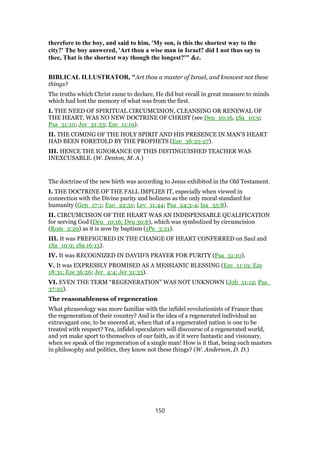
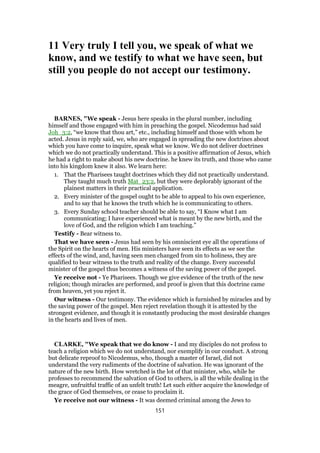
![question or depart from the authority of their teachers. Nicodemus grants that our
Lord is a teacher come from God, and yet scruples to receive his testimony relative to
the new birth, and the spiritual nature of the Messiah’s kingdom.
GILL, "Verily, verily, I say unto thee, we speak that we do know,....
Meaning either himself, and John the Baptist his forerunner, who preached the same
doctrine of regeneration, internal sanctification, and evangelical repentance, as well
as outward reformation, as necessary to entrance into the kingdom of heaven, or the
Gospel dispensation, he declared was just at hand; or his disciples with himself, who
were now with him, and whom he had called to preach the same truths he himself
did; or the prophets of the Old Testament, who agreed with him in these things; or
the Father that was with him, and never left him alone, and the Holy Spirit that was
upon him, by whom he was anointed to preach these things, and who spoke them in
him; or else he may use the plural number of himself alone, as being one in authority,
and speaking with it, as he sometimes did, Mar_4:30, and the rather this seems to be
the sense, since he immediately, in the next verse, speaks in the singular number, "if I
have told you earthly things", &c. Now Christ must needs thoroughly, and certainly
know what he spoke, since he was not only the omniscient God, but, as Mediator, had
all the treasures of wisdom and knowledge in him, and the spirit of wisdom and
knowledge rested on him:
and testify that we have seen; and therefore ought to have been received as a
credible witness, as he was a faithful one; since "seeing" and "knowing" are
qualifications in a witness, Lev_5:1; and though these were eminently in Christ, the
generality of the Jews gave no credit to his testimony:
and ye received not our witness; which was an aggravation of their sin and
unbelief; see Joh_3:32.
HENRY, "(3.) Christ's discourse, hereupon, of the certainty and sublimity of
gospel truths (Joh_3:11-13), to show the folly of those who make strange of these
things, and to recommend them to our search. Observe here,
[1.] That the truths Christ taught were very certain and what we may venture upon
(Joh_3:11): We speak that we do know. We; whom does he mean besides himself?
Some understand it of those that bore witness to him and with him on earth, the
prophets and John Baptist; they spoke what they knew, and had seen, and were
themselves abundantly satisfied in: divine revelation carries its own proof along with
it. Others of those that bore witness from heaven, the Father and the Holy Ghost; the
Father was with him, the Spirit of the Lord was upon him; therefore he speaks in the
plural number, as Joh_14:23 : We will come unto him. Observe, First, That the
truths of Christ are of undoubted certainty. We have all the reason in the world to be
assured that the sayings of Christ are faithful sayings, and such as we may venture
our souls upon; for he is not only a credible witness, who would not go about to
deceive us, but a competent witness, who could not himself be deceived: We testify
that we have seen. He spoke not upon hear-say, but upon the clearest evidence, and
therefore with the greatest assurance. What he spoke of God, of the invisible world,
of heaven and hell, of the divine will concerning us, and the counsels of peace, was
what he knew, and had seen, for he was by him as one brought up with him, Pro_
8:30. Whatever Christ spoke, he spoke of his own knowledge. Secondly, That the
unbelief of sinners is greatly aggravated by the infallible certainty of the truths of
Christ. The things are thus sure, thus clear; and yet you receive not our witness.
152](https://image.slidesharecdn.com/john3commentary-151103172742-lva1-app6891/85/John-3-commentary-152-320.jpg)
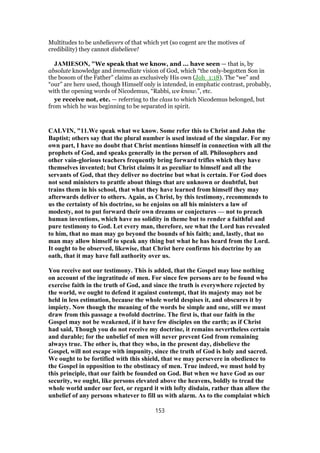
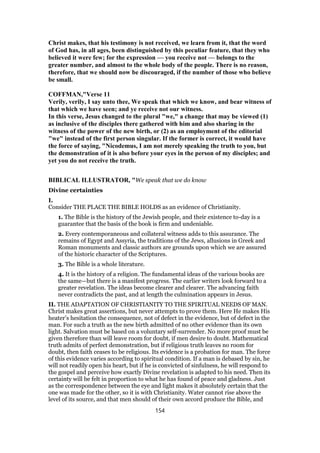
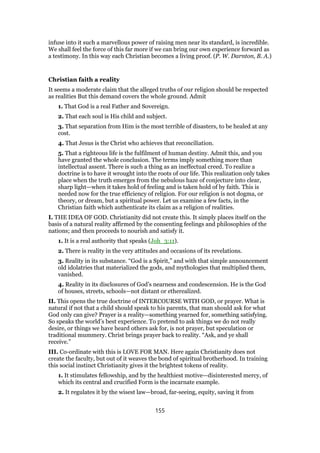
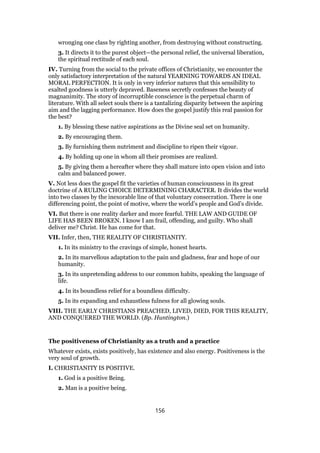
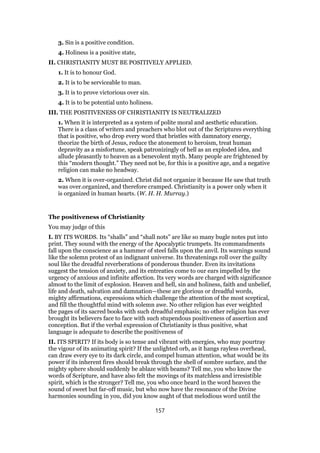
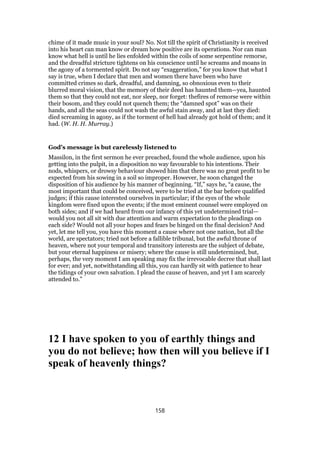
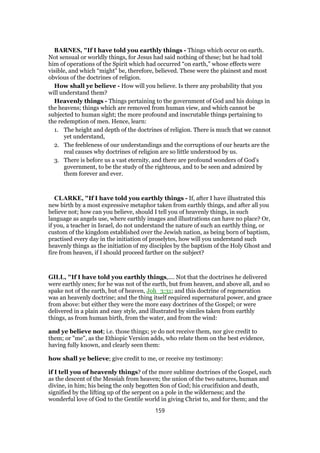
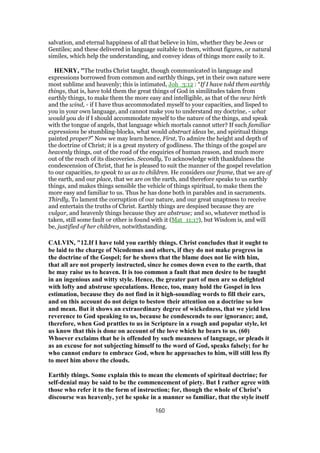
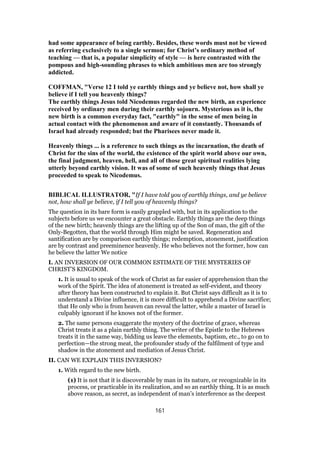
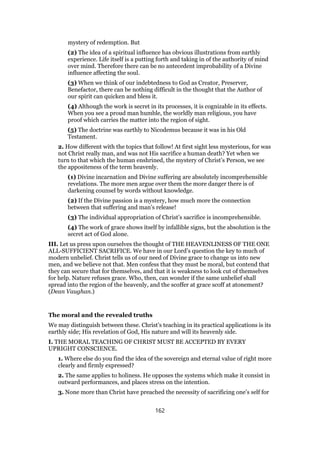
![the sake of truth.
4. Whoever taught as Christ the relations of men with one another and the bonds
of justice and mercy which should units them? Christ alone has made love the
supreme law of mankind.
5. Not only has He taught all this; He has acted all He has taught.
6. This is why He has a right to the authority He claims over our consciences, and
why when He tells us of earthly things He has a right to be believed.
II. CHRIST CLAIMS THE SAME FAITH AS THE REVEALER OF RELIGIOUS
TRUTH. He is not merely a teacher of morals; He speaks of the things which are far
beyond our human vision: of God, His government, providence, saving purposes,
judgment. In the presence of these affirmations our situation changes. So long as His
moral teaching was in question we could judge of it by our consciences, but here are
declarations we cannot control.
1. Are we justified in putting faith in Christ.? If we set aside this faith, no other
means of access to religious truth remains. Science can teach us nothing. Are we
then to remain in the dark? Men have tried to do so, but always unsuccessfully.
2. Is Christ to be believed?
(1) The very accent of His affirmations leads us to reflection. No man ever
spoke with such authority. We believe the assertions of Christ when He tells
us of heavenly things, because lie has always spoken truth when He has told
us of earthly things.
(2) If we believe the religious truths revealed by Christ it is because they are
the necessary complement of the moral truths our conscience compels us to
believe; so that accepting the latter, we are led by an invincible logic to believe
the former. There is no moral truth in the gospel that does not expand into a
religious truth. (E. Bersier, D. D.)
Earthly and heavenly things
Heavenly things, being represented unto us in an earthly form (Joh_3:8), come
clothed to us with our own notions. We can see the sun better when reflected in the
water of a vase than in the firmament; and we can interpret heaven’s language best
when it speaks to us in the language of earth. (T. Manton.)
13 No one has ever gone into heaven except the
one who came from heaven—the Son of Man.[e]
163](https://image.slidesharecdn.com/john3commentary-151103172742-lva1-app6891/85/John-3-commentary-163-320.jpg)
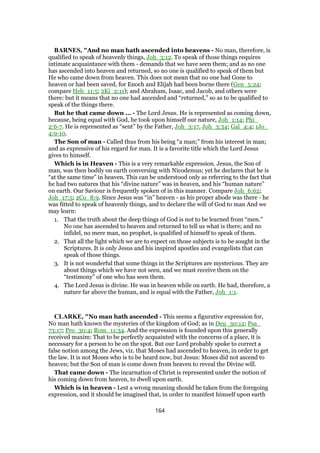
![he must necessarily leave heaven; our blessed Lord qualifies it by adding, the Son of
man who is in heaven; pointing out, by this, the ubiquity or omnipresence of his
nature: a character essentially belonging to God; for no being can possibly exist in
more places than one at a time, but He who fills the heavens and the earth.
GILL, "And no man hath ascended into heaven,.... Though Enoch and Elias
had, yet not by their own power, nor in the sense our Lord designs; whose meaning
is, that no man had, or could go up to heaven, to bring from thence the knowledge of
divine and heavenly things; in which sense the phrase is used in Deu_30:12, and
which may be illustrated by Joh_1:18; wherefore inasmuch as Nicodemus had
acknowledged Christ to he a teacher come from God, our Lord, would have him
know, that he was the only teacher of heavenly things, as being the only person that
had been in heaven, and in the bosom of the Father; and therefore, if he, and the rest
of the Jews, did not receive instructions from him, they must for ever remain
ignorant; for there never had been, nor was, nor could be, any mere man that could
go up to heaven, and learn the mysteries of God, and of the kingdom of heaven, and
return and instruct men in them:
but he that came down from heaven; meaning himself, who is the Lord from
heaven, and came from thence to do the will of God by preaching the Gospel, working
miracles, obeying the law, and suffering death in the room of his people, and thereby
obtaining eternal redemption for them. Not that he brought down from heaven with
him, either the whole of his human nature, or a part of it; either an human soul, or an
human body; nor did he descend locally, by change of place, he being God
omnipresent, infinite and immense, but by assumption of the human nature into
union with his divine person:
even the son of man which is in heaven; at the same time he was then on earth:
not that he was in heaven in his human nature, and as he was the son of man; but in
his divine nature, as he was the Son of God; see Joh_1:18; though this is predicated
of his person, as denominated from the human nature, which was proper to him only
in his divine nature; for such is omnipresence, or to be in heaven and earth at the
same time: just as on the other hand God is said to purchase the church with his
blood, and the Lord of glory is said to be crucified, Act_20:28, where those things are
spoken of Christ, as denominated from his divine nature, which were proper only to
his human nature; and is what divines call a communication of idioms or properties;
and which will serve as a key to open all such passages of Scripture: and now as a
proof of our Lord's having been in heaven, and of his being a teacher come from God,
and such an one as never was, or can be, he opens and explains a type respecting
himself, in the following verse.
HENRY, "He gives them a proof of his ability to speak to them heavenly things,
and to lead them into the arcana of the kingdom of heaven, by telling them, (1.) That
he came down from heaven. The intercourse settled between God and man began
above; the first motion towards it did not arise from this earth, but came down from
heaven. We love him, and send to him, because he first loved us, and sent to us. Now
this intimates, [1.] Christ's divine nature. He that came down from heaven is
certainly more than a mere man; he is the Lord from heaven, 1Co_15:47. [2.] His
intimate acquaintance with the divine counsels; for, coming from the court of
heaven, he had been from eternity conversant with them. [3.] The manifestation of
God. Under the Old Testament God's favours to his people are expressed by his
hearing from heaven (2Ch_7:14), looking from heaven (Psa_80:14), speaking from
165](https://image.slidesharecdn.com/john3commentary-151103172742-lva1-app6891/85/John-3-commentary-165-320.jpg)
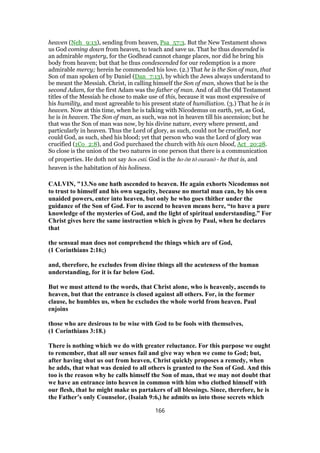
![otherwise would have remained in concealment.
Who is in heaven. It may be thought absurd to say that he is in heaven, while he
still dwells on the earth. If it be replied, that this is true in regard to his Divine
nature, the mode of expression means something else, namely, that while he was
man, he was in heaven. It might be said that no mention is here made of any
place, but that Christ is only distinguished from others, in regard to his
condition, because he is the heir of the kingdom of God, from which the whole
human race is banished; but, as it very frequently happens, on account of the
unity of the Person of Christ, that what properly belongs to one nature is applied
to another, we ought not to seek any other solution. Christ, therefore, who is in
heaven, hath clothed himself with our flesh, that, by stretching out his brotherly
hand to us, he may raise us to heaven along with him.
COFFMAN, "Verse 13
And no one hath ascended into heaven, but he that descended out of heaven,
even the Son of man who is in heaven.
Here Jesus claimed his unique office as God's messenger who descended to man
out of heaven, and yet, in a sense, who was still in heaven. This verse, admittedly
difficult, has led to the view that heaven is a state rather than a place, and that
Jesus could say the Son of man was in heaven even while he was on earth.
Another view supported by this is that during the personal ministry of Christ he
continued in the full possession of his heavenly attributes. Still another concept
that finds support is the doctrine of the ubiquitousness of Jesus. Dogmatism is
out of order here, due to the textual questions regarding this verse. Westcott
wrote that these words were "omitted by many very ancient authorities, and
appear to be an early gloss bringing out the right contrast between the ascent of
a man to heaven and the abiding of the Son of man in heaven."[15] In the
International Version, this place reads: "No one has ever gone into heaven
except the one who came from heaven, the Son of man."
ENDNOTE:
[15] B. F. Westcott, op. cit., p. 57.
14 Just as Moses lifted up the snake in the
wilderness, so the Son of Man must be lifted
up,[f]
BARNES, "And as Moses - Jesus proceeds in this and the following verses to
state the reason why he came into the world and, in order to this, he illustrates His
design, and the efficacy of his coming, by a reference to the case of the brass serpent,
167](https://image.slidesharecdn.com/john3commentary-151103172742-lva1-app6891/85/John-3-commentary-167-320.jpg)
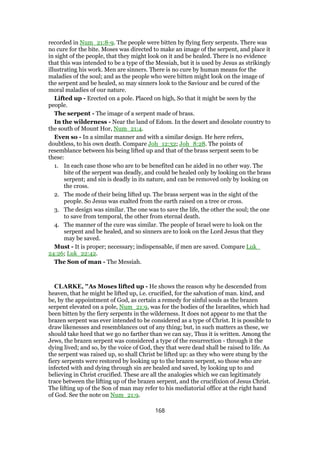
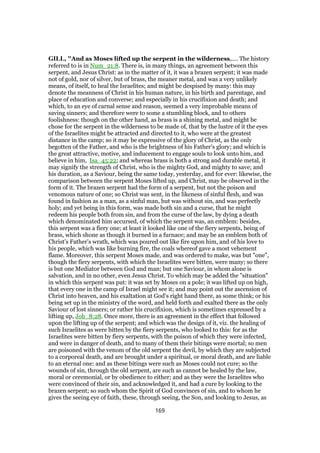
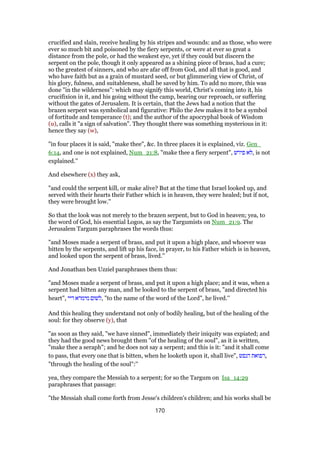
![among you as a "flying serpent".''
And who else can be designed by the "other serpent of life" (z), and the "holy serpent"
(a) they speak of, in opposition to the evil serpent that seduced Eve? And it is well
known, that ,נחש "a serpent", and ,משיח "Messiah", are numerically, or by gematry, the
same; a way of interpretation, and explanation, often in use with the Jews. Now, as
this serpent was lifted up on a pole on high, that every one that was bitten with the
fiery serpent might look to it, and be healed;
even so must the son of man be lifted up; upon the cross, and die: the
crucifixion and death of Christ were necessary, and must be, because of the decrees
and purposes of God, by which he was foreordained thereunto, and by which
determinate counsel he was delivered, taken, crucified, and slain; and because of his
own engagements as a surety, laying himself under obligations in the council and
covenant of peace, to suffer, and die, in the room of his people; and because of the
prophecies in the Old Testament, and his own predictions, that so it should be; as
also, that the antitype might answer the type; and particularly, that he might be a
suitable object of faith for wounded sinners, sensible of sin, to look unto.
HENRY, " Christ here discourses of the great design of his own coming into the
world, and the happiness of those that believe in him, Joh_3:14-18. Here we have
the very marrow and quintessence of the whole gospel, that faithful saying (1Ti_
1:15), that Jesus Christ came to seek and to save the children of men from death, and
recover them to life. Now sinners are dead men upon a twofold account: - (1.) As one
that is mortally wounded, or sick of an incurable disease, is said to be a dead man,
for he is dying; and so Christ came to save us, by healing us, as the brazen serpent
healed the Israelites, Joh_3:14, Joh_3:15. (2.) As one that is justly condemned to die
for an unpardonable crime is a dead man, he is dead in law; and, in reference to this
part of our danger, Christ came to save as a prince or judge, publishing an act of
indemnity, or general pardon, under certain provisos; this saving here is opposed to
condemning, Joh_3:16-18.
JAMIESON, "And as Moses, etc. — Here now we have the “heavenly things,”
as before the “earthly,” but under a veil, for the reason mentioned in Joh_3:12. The
crucifixion of Messiah is twice after this veiled under the same lively term -
“uplifting,” Joh_8:28; Joh_12:32, Joh_12:33. Here it is still further veiled - though
to us who know what it means, rendered vastly more instructive - by reference to the
brazen serpent. The venom of the fiery serpents, shooting through the veins of the
rebellious Israelites, was spreading death through the camp - lively emblem of the
perishing condition of men by reason of sin. In both cases the remedy was divinely
provided. In both the way of cure strikingly resembled that of the disease. Stung by
serpents, by a serpent they are healed. By “fiery serpents” bitten - serpents, probably,
with skin spotted fiery red [Kurtz] - the instrument of cure is a serpent of brass or
copper, having at a distance the same appearance. So in redemption, as by man
came death, by Man also comes life - Man, too, “in the likeness of sinful flesh” (Rom_
8:3), differing in nothing outward and apparent from those who, pervaded by the
poison of the serpent, were ready to perish. But as the uplifted serpent had none of
the venom of which the serpent-bitten people were dying, so while the whole human
family were perishing of the deadly wound inflicted on it by the old serpent, “the
Second Man,” who arose over humanity with healing in His wings, was without spot
or wrinkle, or any such thing. In both cases the remedy is conspicuously displayed;
in the one case on a pole, in the other on the cross, to “draw all men unto Him” (Joh_
171](https://image.slidesharecdn.com/john3commentary-151103172742-lva1-app6891/85/John-3-commentary-171-320.jpg)
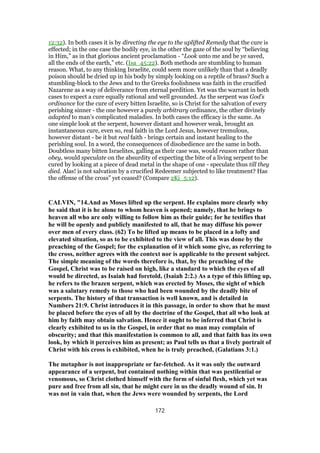
![formerly prepared this kind of antidote; and it tended to confirm the discourse
which Christ delivered. For when he saw that he was despised as a mean and
unknown person, he could produce nothing more appropriate thanthe lifting up
of the serpent, to tell them, that they ought not to think it strange, if, contrary to
the expectation of men, he were lifted up on high from the very lowest condition,
because this had already been shadowed out under the Law by the type of the
serpent.
A question now arises: Does Christ compare himself to the serpent, because there
is some resemblance; or, does he pronounce it to have been a sacrament, as the
Manna was? For though the Manna was bodily food, intended for present use,
yet Paul testifies that it was a spiritual mystery, (1 Corinthians 10:3.) I am led to
think that this was also the case with the brazen serpent, both by this passage,
and the fact of its being preserved for the future, until the superstition of the
people had converted it into an idol, (2 Kings 18:4.) If any one form a different
opinion, I do not debate the point with him.
COFFMAN, "Verse 14
And as Moses lifted up the serpent in the wilderness, even so must the Son of
man be lifted up; that whosoever believeth may in him have eternal life.
The connection between John 3:14-15 and John 3:13 is in the title "Son of man."
John 3:13 gave Jesus' identity as God incarnate, and these cite the necessity for
his Passion, his being lifted up on the cross, and through that, lifted up on High.
Moses lifted up the serpent ... refers to the last of Moses' miracles, which took
place on the borders of Canaan (Numbers 21:7ff). Fiery serpents had been sent
among the people producing suffering and death; Moses fashioned a serpent of
brass and lifted it up on a pole in the center of the camp, and all who looked
upon it were healed.
Those who would make that brass snake a type of Jesus Christ go much too far.
As Clarke noted:
It does not appear that the brazen serpent was ever intended as a type of Christ.
It is possible to draw likenesses out of anything; but, in such matters as these, we
should take heed that we go no farther than we can say, "Thus it is written."[16]
The usual analogies drawn from the brass snake are these: (1) in each case, those
who were benefited could not have been aided any other way; (2) the lifting up in
each case was before all Israel, the serpent in the camp, Jesus on the cross; (3)
the design in each case was to save life, the serpent physical, the Lord eternal
life; (4) the manner of the cure is similar, the Israelites having merely to look on
the serpent in order to be cured, and Christians, of course, having to do nothing
except believe in order to be saved! Such analogies are not merely
untrustworthy; they are fallacious and contradictory to the Sacred Scriptures.
There are far more dissimilarities than there are similarities, thus: (1) the brass
serpent was of different material from the deadly snakes that were tormenting
Israel; but Jesus was made in all points like unto his brethren (Hebrews 2:17);
(2) Israel was forbidden to worship the brass snake; but all people are
commanded to worship Christ; (3) the brass snake eventually became an idol
173](https://image.slidesharecdn.com/john3commentary-151103172742-lva1-app6891/85/John-3-commentary-173-320.jpg)
![and was defiled and burned up (2 Kings 18:1,4); (the manner of appropriating
the blessing is exceedingly diverse in each case, there having been no moral or
spiritual conditions whatever in the healing of snake bites, not even faith). Now,
when the Pharisees looked upon Jesus on the cross, were they saved? No! Far
more than looking is required for salvation in Christ, as revealed in the next
verse. And, as for those who would take this verse as the basis for promising
salvation to all who "look upon" Jesus, and then interpret that to mean "faith
only," it should be pointed out that Jesus had just revealed to Nicodemus that
absolutely nothing short of being born again, born of water and of the Spirit,
could suffice for entry into God's kingdom.
Whosoever believeth may in him have eternal life ... The particular construction
of these words reveals that eternal life is promised not to "whosoever believeth,"
but to all believers who are "in him," that is, in Christ. The misconception
sometimes substituted for the promise here is that "all believers SHALL be
saved, whether or not they are ever baptized into Christ." The key word in this
clause is "may." meaning the right or privilege of entering Christ and thus
receiving eternal life in him. To be sure, "may" and "shall" are poles apart in
meaning. To read that believers "shall be saved" is to read what is nowhere
taught in the Bible; but to read that believers "may be saved" is to read the truth
of God. The corruption of this text and that of John 3:16 by rendering "shall"
instead of "may" or "should" must be rejected. Both here and in John 3:16, the
true rendition is "may" or "should" and not in a thousand years "SHALL have
eternal life." See Westcott[17] and all of the legitimate versions. When
translators take the liberty of rendering "shall have eternal life," as, for
example, in the International Version and others, they are not translating God's
word at all but perverting it. Let the student of the word of God beware of the
hand of Satan in such translations.
[16] Adam Clarke, Commentary on the Holy Bible (London: Mason and Lane,
1837), Vol. V, p. 533.
[17] B. F. Westcott, op. cit., p. 55.
BARCLAY, "THE UPLIFTED CHRIST (John 3:14-15)
3:14-15 And as Moses lifted up the serpent in the wilderness, so the Son of Man
must be lifted up, that every one who believes in him may have eternal life.
John goes back to a strange Old Testament story which is told in Numbers
21:4-9. On their journey through the wilderness the people of Israel murmured
and complained and regretted that they had ever left Egypt. To punish them God
sent a plague of deadly, fiery serpents; the people repented and cried for mercy.
God instructed Moses to make an image of a serpent and to hold it up in the
midst of the camp; and those who looked upon the serpent were healed. That
story much impressed the Israelites. They told how in later times that brazen
serpent became an idol and in the days of Hezekiah had to be destroyed because
people were worshipping it (2 Kings 18:4). The Jews themselves were always a
little puzzled by this incident in view of the fact that they were absolutely
forbidden to make graven images. The rabbis explained it this way: "It was not
174](https://image.slidesharecdn.com/john3commentary-151103172742-lva1-app6891/85/John-3-commentary-174-320.jpg)
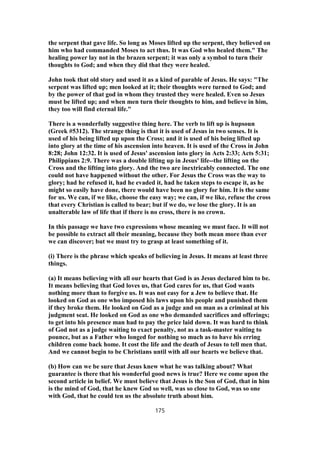
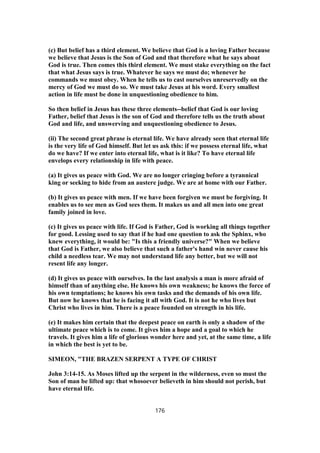
![A MORE instructive portion of Scripture than this before us we cannot easily
find. The conversation of our Lord with Nicodemus was intended to lead him to
the knowledge of salvation: and, being directed to a person of his rank, and high
attainments in morality, it will serve as a model for our instructions to the
greatest and best of men. The first point which our Lord insisted on was the
necessity of a new birth: for, whatever our attainments be, it is impossible for us
to enter into heaven till this has taken place in our souls; since we brought
nothing into the world with us but what is carnal; and we must possess a
spiritual nature, before we can be capable of enjoying a spiritual kingdom. But
besides this, it is necessary also that we be interested in his atoning sacrifice: for,
having once contracted guilt, we must be purged from that guilt, before we can
be admitted into the Divine presence: and there is nothing but his atoning
sacrifice that can avail for this. Hence our Lord, after shewing Nicodemus that
he must experience a change of nature by means of a new and heavenly birth,
tells him, that he must prepare to see the Messiah crucified for the sins of men,
and must look to him for the healing of his soul as the dying Israelites did to the
brazen serpent for the healing of the wounds inflicted by the fiery serpents in the
wilderness.
The parallel which our Lord here draws between the brazen serpent and himself,
represents that as the type, and himself as the antitype: and, that we may fully
understand it, I will trace the resemblance,
I. In the occasion on which the type was instituted—
The Israelites were dying of the wounds received from the fiery flying serpents—
[They had provoked God by their murmuring and rebellion [Note: Numbers
21:4-6.] — — — and to punish them God had sent fiery serpents which they
could in no wise avoid, and whose bite was mortal. To heal themselves was
beyond their power. Multitudes died: and many, finding that they must die,
unless God should graciously interpose for them, entreated Moses to intercede
for them: and in answer to his intercession God appointed that a brazen serpent
should be erected, and that by looking to it they should be healed.]
Similar to this was our state when God gave his Son to be nailed upon the
cross—
[Through the agency of that old serpent the devil, sin had entered the world, and
inflicted a deadly wound on every child of man. To heal ourselves was
impossible. Death, eternal death, awaited us. And, as the only means of averting
it, God, in tender mercy, sent his only dear Son into the world to die for us, and
to save all who would look unto him for salvation.
But if there was in this respect a great resemblance between the occasions that
existed for the erection of the serpent, and the exaltation of our blessed Lord
upon the cross, there was also a material difference between them; the one being
in answer to the prayers of men, the other being given unsolicited and unsought:
the one also being appointed as a mere arbitrary ordinance, that had no
177](https://image.slidesharecdn.com/john3commentary-151103172742-lva1-app6891/85/John-3-commentary-177-320.jpg)
![suitableness to the end proposed; the other being appointed to make satisfaction
for the sins of men, and to merit in our behalf the Divine favour.
In both cases, however, the occasion was the same: death was inflicted as the
punishment of sin; and the remedy, the only remedy, against it, in either case,
was to look to the object, proposed by God, and lifted up by man, for our relief.]
But let us contemplate the type yet more particularly,
II. In the end of its appointment—
The serpent was erected that all who were bitten might look unto it and live.
[An assurance was given to Moses, that all who looked to the brazen serpent
should live. And so it proved, in fact. Not one who directed his eyes to it, died.
However desperate his wounds might be, or however distant he might be from
the object, so as scarcely to have any clear view of it at all, yet, instantly on
looking to it he was healed.]
And does not the crucifixion of our Lord ensure the same benefit to those who
look unto him—
[It matters not how long, or how grievously, any man may have sinned, provided
he look truly and humbly to the Lord Jesus Christ as dying for him. As for the
brazen serpent, it had no suitableness whatever to the end proposed. It was a
mere arbitrary appointment of the Deity: and was available in that view alone.
But the Lord Jesus Christ died upon the cross under the guilt of all our sins, and
offered a full and perfect satisfaction for them to Divine justice. True, indeed, to
the judgment of carnal reason, that also appears “foolishness;” but it was in
reality the most stupendous effort of “divine power and wisdom;” and it has in
itself a proper suitableness and sufficiency for the salvation of all who trust in it.
We may therefore safely assure every child of man, that, if he believe in Jesus,
“he shall never perish, but shall have eternal life.” Nor shall the conferring of
this benefit be delayed. The sight of the brazen serpent healed instantly the dying
Israelite: and so shall a sight of Jesus instantly remove the guilt of all our sins,
and infuse into our souls a new and heavenly life. Nor shall the blessing ever
terminate. The benefit that accrued to those who looked to the brazen serpent
lasted but for a time: but that which the believer in Jesus shall receive, shall
endure for ever and ever.]
Address—
1. Those who feel not their need of such a remedy—
[Such persons existed in the camp of Israel: but where shall one be found in our
camp? Where is there one whose whole man is not impregnated with the venom
of sin? If you feel it not, that only shews that your wounds are the more deep and
deadly: but know assuredly, that, unless you be brought to a sense of your
perishing condition, your doom is sealed; and in a little time you will perish for
178](https://image.slidesharecdn.com/john3commentary-151103172742-lva1-app6891/85/John-3-commentary-178-320.jpg)
![ever.]
2. Those who would substitute some other remedy in the place of Christ—
[What would have become of any man who should have persisted in devising
some mode of healing himself, instead of looking to the brazen serpent? He must
of necessity have died. And no other fate awaits you, if you will be substituting
your own works, whether in whole or in part, in the place of Christ. Every other
hope must be utterly renounced, and Christ alone be made the one object of your
affiance.]
3. Those who desire the healing of their souls—
[Make the Israelites a pattern for yourselves. When they felt in themselves that
they were dying, they sought after God through Moses their mediator; and
confessed their sins, and implored mercy, and thankfully availed themselves of
the proferred benefit, seeking it humbly in God’s appointed way. Thus then do
ye also: seek your God through the Lord Jesus Christ, who is the only mediator
between God and man; and with deep contrition implore mercy at his hands:
then direct your eyes to the cross on which the Lord Jesus Christ was crucified
for you; and doubt not but that you shall be made monuments of his grace and
mercy to all eternity. Let no doubt about his sufficiency or your own worthiness
keep you from him: for he “is able to save to the uttermost all that come unto
God by him;” and “whosoever” believeth in him shall assuredly be saved [Note:
Isaiah 45:22.].”]
4. Those who doubt whether this mode of healing will not encourage sin—
[Such doubts were entertained in the Apostle’s days: but he spurned at the idea
with holy indignation: “Shall we continue in sin that grace may abound? God
forbid.” What think you? Would an Israelite have taken one of the fiery serpents
to his bosom, because he had been healed of his wounds, and because the same
means of healing were yet open to him? How much less would one who has felt
the bitterness of sin, cherish it any longer in his bosom, because he has obtained
deliverance from its guilt and condemnation? When he reflects that nothing but
the crucifixion of the Son of God could heal him, will he think lightly of his sins?
Will he not rather “look on him whom his sins have pierced, and mourn, and be
in bitterness, as one that is in bitterness for his first-born?” Truly this is the
proper effect of faith in Christ, who, if he redeem us from guilt and
condemnation, will also “purify us unto himself a peculiar people zealous of good
works.”]
LIGHTFOOT, "14. And as Moses lifted up the serpent in the wilderness, even so
must the Son of man be lifted up:
[And as Moses lifted up the serpent, &c.] The Jews dote horribly about this
noble mystery. There are those in Bemidbar Rabba, that think that the brazen
serpent was not affixed to a pole, but thrown up into the air by Moses, and there
to have settled without any other support.
179](https://image.slidesharecdn.com/john3commentary-151103172742-lva1-app6891/85/John-3-commentary-179-320.jpg)
!["Moses put up the serpent for a sign; as he that chastiseth his son sticks up the
rod in some eminent place, where the child may see it, and remember."
Thou shalt remove the mischief by that which did the mischief; and thou shalt
heal the disease by that which made thee sick. The same hath R. Bechai; and
both confess that it was a miracle within a miracle. But it is not for a Jew to
understand the mystery; this is the Christian's attainment only.
GREAT TEXTS OF THE BIBLE 14-15, "Look And Live
And the Lord said unto Moses, Make thee a fiery serpent, and set it upon a
standard: and it shall come to pass, that every one that is bitten, when he seeth it,
shall live. And Moses made a serpent of brass, and set it upon the standard: and
it came to pass, that if a serpent had bitten any man, when he looked unto the
serpent of brass, he lived.—Num_21:8-9.
[And as Moses lifted up the serpent in the wilderness, even so must the Son of
man be lifted up: that whosoever believeth may in him have eternal life.—Joh_
3:14-15.]
1. While the children of Israel were roaming homeless through the wilderness,
their heart, we read, failed them because of the way, and, as was their wont, they
vented their vexation in angry thoughts and rebellious words against God. On
this occasion God sent among them judgment in the form of fiery serpents. The
bite of these serpents was deadly, so that when a man was once bitten by their
venomous fangs his life was forfeited, and, although he did not drop down dead
on the instant, in one sense he was a dead man already. What a moment of agony
and terror it must have been as all around unfortunate victims were being
attacked by these messengers of death! In this terrible emergency the people
cried to God, and in doing so confessed, “We have sinned”; and in answer to
their prayer Moses was instructed to make a fiery serpent of brass and set it on a
pole, and it should come to pass that, if any were bitten by a fiery serpent, on
looking at this they would live.
They did well, when they came to Moses, and said, “We have sinned, for we have
spoken against the Lord, and against thee.” So far as I know, it is the only real
expression of true sorrow and willing confession which we find in the wilderness
story. “We have sinned.” And if so, it is well worth while for us to notice, that
this was the occasion for God’s giving to them the great sign of mercy to which
Jesus Christ pointed as a sign of Himself. So it is that God gives grace to the
humble, encourages the contrite, is found of those who seek.1 [Note: E. S.
Talbot.]
2. Recalling this incident of Israel, Jesus found in it a type and prophecy of
Himself. “As Moses lifted up the serpent in the wilderness, even so must the Son
of man be lifted up: that whosoever believeth in him should not perish, but have
eternal life.”
180](https://image.slidesharecdn.com/john3commentary-151103172742-lva1-app6891/85/John-3-commentary-180-320.jpg)
![It is very instructive to notice the New Testament use of the Old Testament
record of Moses. His history and its incidents are constantly referred to as
illustrations and types of Christ. St. Paul again and again finds his illustrations
in the life of Moses, and much more than illustrations. Not with any curious
fancy is it that his sturdy logic finds the materials for two compact arguments in
these chapters. The manna, the rock, the veil on the face of Moses, are all
immediately connected with Jesus Christ. St. John, too, in the Book of
Revelation, constantly finds here the imagery by which he sets forth the things
which are to come. And the Church in all ages has found in Egypt and the
wilderness journey to the goodly land a very Pilgrim’s Progress. No type is more
familiar, no illustration more constant. The arrangements of Jewish worship are
full of predictions of Christ—living pictures of our salvation. The Lord Jesus is
the sacrifice for our sins—the Lamb of God which beareth away the sins of the
world. He is the Mercy-seat, as the word propitiation is rendered in the marginal
reference. He is the High Priest who ever liveth to make intercession for us, and
who is able to save to the uttermost all that come to God by Him.2 [Note: M. G.
Pearse.]
The old is always becoming the new. “As Moses … so the Son of man”; as the
old, so the new; as the historical so the prophetical. All the pattern of the
spiritual temple has been shown in the mountain, and has been frayed out in
shapely and significant clouds which themselves were parables. “That the
Scripture might be fulfilled.” History always has something more to do than it
seems to have; it does not only record the event of the day, it redeems old
subjects, old vows and oaths; it takes up what seems to be the exhausted past and
turns it into the present and energetic action of the moment. As Moses, as Jonah,
as Solomon, as the bold Esaias; it is always a going-back upon the sacred past
and eating up the food that was there provided. Do not live too much in what we
call the present; do not live upon the bubble of the hour; have some city of the
mind, some far-away strong temple-sanctuary made noble by associations and
memories of the tenderest kind. You could easily be dislodged from some
sophism of yesterday. If you are living in the little programmes that were
published but last night you have but a poor lodgment, and to-morrow you will
be found naked, destitute, and hungry. Always go back to the “As Moses, as
David, as Daniel, as Jeremiah,” and see in every culminating event a
confirmation of this holy word—“that the Scripture might be fulfilled.” The plan
was drawn before the building was commenced; the specification was all written
out before the builder handled his hammer and his trowel; we do but work out
old specifications—old, but not decayed; old with the venerableness of truth. See
that you stand upon a broad rock, and do not try to launch your lifeship upon a
bubble.1 [Note: Joseph Parker.]
We have here—
I. A Pressing Danger.
i. Death from the bite of a Serpent—“The Lord sent fiery serpents among the
people, and they bit the people; and much people of Israel died” (Num_21:6).
181](https://image.slidesharecdn.com/john3commentary-151103172742-lva1-app6891/85/John-3-commentary-181-320.jpg)
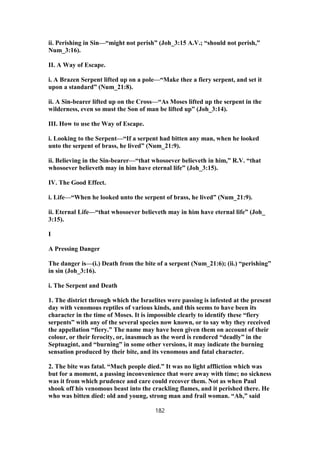
![some of those who are always ready to make light of any illness unless it is their
own, “he will get over it; he is young, and he has youth on his side.” “See,” said
another, “what a splendid constitution he has; he will mend.” “Come,” said
another, “we must hope for the best.” But much people died.
In October, 1852, Gurling, one of the keepers of the reptiles in the Zoological
Gardens, was about to part with a friend who was going to Australia, and
according to custom he must needs drink with him. He drank considerable
quantities of gin, and although he would probably have been in a great passion if
any one had called him drunk, yet reason and common sense had evidently been
overpowered. He went back to his post at the gardens in an excited state. He had
some months before seen an exhibition of snake-charming, and this was on his
poor muddled brain. He must emulate the Egyptians, and play with serpents.
First he took out of its cage a Morocco venom-snake, put it round his neck,
twisted it about, and whirled it round about him. Happily for him it did not
rouse itself so as to bite. The assistant-keeper cried out, “For God’s sake, put
back the snake,” but the foolish man replied, “I am inspired.” Putting back the
venom-snake, he exclaimed, “Now for the cobra!” This deadly serpent was
somewhat torpid with the cold of the previous night, and therefore the rash man
placed it in his bosom till it revived, and glided downward till its head appeared
below the back of his waistcoat. He took it by the body, about a foot from the
head, and then seized it lower down by the other hand, intending to hold it by the
tail and swing it round his head. He held it for an instant opposite to his face,
and like a flash of lightning the serpent struck him between the eyes. The blood
streamed down his face, and he called for help, but his companion fled in horror;
and, as he told the jury, he did not know how long he was gone, for he was “in a
maze.” When assistance arrived, Gurling was sitting on a chair, having restored
the cobra to its place. He said, “I am a dead man.” They put him in a cab, and
took him to the hospital. First his speech went, he could only point to his poor
throat and moan; then his vision failed him, and lastly his hearing. His pulse
gradually sank, and in one hour from the time at which he had been struck he
was a corpse. There was only a little mark upon the bridge of his nose, but the
poison spread over the body, and he was a dead Man_1:1 [Note: C. H.
Spurgeon.]
ii. Sin and Perishing
1. The bite of these serpents was mortal. The Israelites could have no question
about that, because in their own presence “much people of Israel died.” They
saw their own friends die of the snake-bite, and they helped to bury them. They
knew why they died, and were sure that it was because the venom of the fiery
serpents was in their veins. They were left almost without an excuse for
imagining that they could be bitten and yet live. Now, we know that many have
perished as the result of sin. We are not in doubt as to what sin will do, for we
are told by the infallible Word, that “the wages of sin is death,” and, yet again,
“sin, when it is finished, bringeth forth death.”
Sin can have but one ending—death—death—death. The soul that sinneth it
shall die, so rings the warning of God. How foolishly we talk of it! When it is the
183](https://image.slidesharecdn.com/john3commentary-151103172742-lva1-app6891/85/John-3-commentary-183-320.jpg)
![child, we say, “He is young, and will grow better.” When it is the youth, we say,
“Let him sow his wild oats, and he will settle down.” Ah, what cruel folly! What
a man soweth, that shall he also reap. When it is middle age, we say, “Yes, it is
very sad, but he has a great many good points, you know.” And when he is an old
man and dies, we say, “Well, we must hope for the best.” And in upon this Babel
there comes the terrible note of doom: The wages of sin is death.1 [Note: M. G.
Pearse.]
2. Is it always immediate? Not always. May we not play with the serpent? We
may not. Are there not moments when the cruel beast is not cruel? Not one. The
sandwasp paralyses the beetle with his sting that he may, and that his progeny
may profit, by the paralysis. The sandwasp does not kill the insect, but thrusts a
sting into him, not fatally; the insect can still lay eggs for the advantage of the
progeny of the sandwasp. It is so with many serpentine tricks; we are paralysed
to be used, not to-day, but to be eaten in six months. We are so paralysed that we
will do this or do that and have joy in it and have a banquet over it, ay, a
foaming tankard of wine that froths out its own mocking laugh. It is the sting of
the sandwasp; it has thrust in that venomous sting and hung us up for the next
meeting, for the next occasion, just before the bankruptcy comes, and the
devouring of our very soul by those whom we have wronged.
The worst consequences of sin are sin itself, more sin. Drink and lust mean
stronger passion, more ungovernable desire. Anger and temper mean as their
consequence a heart more bitter, more ready for more wrath. Selfish ways mean
less power even to see when we are selfish or what selfishness is. Yes, and not
only is there deepening of the same sin, but other sins are bred from it; cruelty,
even murderous, out of lust and drink; cruelty, too, out of selfishness; lying and
slander out of the hot heart and ungoverned life of anger. So it goes: sin breeding
sin, sin deepening into more sin.2 [Note: E. S. Talbot.]
It is necessary to be ever vigilant, and, always looking on a trifling sin as one of
magnitude, to flee far from it; because if the virtuous deeds exceed the sinful acts
by even the point of one of the hairs of the eyelashes, the spirit goes to Paradise;
but should the contrary be the case, it descends to hell.1 [Note: “The Dabistan”
in Field’s Book of Eastern Wisdom, 121.]
3. What was the sin the Israelites were guilty of?
(1) The fiery serpents came among the people because they had despised God’s
way. “The soul of the people was much discouraged because of the way.” It was
God’s way; He had chosen it for them, and He had chosen it in wisdom and
mercy, but they murmured at it. As an old divine says, “It was lonesome and
longsome”; but still it was God’s way, and therefore it ought not to have been
loathsome. His pillar of fire and cloud went before them, and His servants Moses
and Aaron led them like a flock, and they ought to have followed cheerfully.
Every step of their previous journey had been rightly ordered, and they ought to
have been quite sure that this compassing of the land of Edom was rightly
ordered too. But, no; they quarrelled with God’s way, and wanted to have their
own way. This is one of the great standing follies of men; they cannot be content
184](https://image.slidesharecdn.com/john3commentary-151103172742-lva1-app6891/85/John-3-commentary-184-320.jpg)
![to wait on the Lord and keep His way, but prefer a will and a way of their own.
(2) The people also quarrelled with God’s food. He gave them the best of the
best, for “men did eat angels’ food”; but they called the manna by an
opprobrious title, which in the Hebrew has a sound of ridicule about it, and even
in our translation conveys the idea of contempt. They said, “Our soul loatheth
this light bread,” as if they thought it unsubstantial, and only fitted to puff them
out, because it was easy of digestion, and did not breed in them that heat of blood
and tendency to disease which a heavier diet would have brought with it. Being
discontented with their God they quarrelled with the bread which He set upon
their table. This is another of man’s follies; his heart refuses to feed upon God’s
Word or believe God’s truth. He craves the flesh-meat of carnal reason, the leeks
and the garlic of superstitious tradition, and the cucumbers of speculation; he
cannot bring his mind down to believe the Word of God, or to accept truth so
simple, so fitted to the capacity of a child.
II
A Way of Escape
The way is—(i.) a brazen serpent lifted up on a pole; (ii.) a Sin-bearer lifted up
on the cross.
i. The Brazen Serpent
1. The command to make a brazen or copper serpent, and set it on some
conspicuous place, that to look on it might stay the effect of the poison, is
remarkable, not only as sanctioning the forming of an image, but as associating
healing power with a material object. Two questions must be considered
separately—What did the method of cure say to the men who turned their
bloodshot, languid eyes to it? and What does it mean for us, who see it by the
light of our Lord’s great words about it? As to the former question, we have not
to take into account the Old Testament symbolism which makes the serpent the
emblem of Satan or of sin. Serpents had bitten the wounded. Here was one like
them, but without poison, hanging harmless on the pole. Surely that would
declare that God had rendered innocuous the else fatal creatures.
That to which they were to look was to be a serpent, but it was to be a serpent
triumphed over, as it were, not triumphing, and held up to view and exhibited as
a trophy. Around on every side the serpents are victorious, and the people are
dying. Here the serpent is represented as conquered and, we may say, made a
spectacle of, and the people who see it live. Strong were the serpents in their
power of death, but stronger was God in His omnipotence of life, and the life
triumphed.
The sight of the brazen serpent was as though God’s spear had pierced the
plague, and held it aloft before their eyes, a vanquished, broken thing. It was not
one of the serpents; it was an image of all and any of them; it was the whole
serpent curse and plague in effigy.1 [Note: E. S. Talbot.]
185](https://image.slidesharecdn.com/john3commentary-151103172742-lva1-app6891/85/John-3-commentary-185-320.jpg)
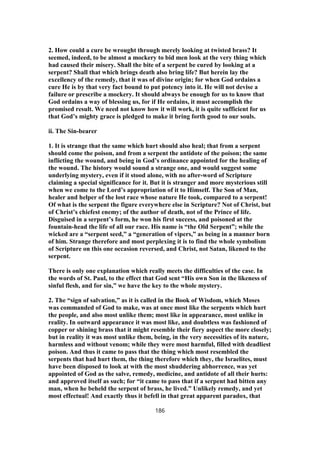
![“foolishness of God,” the plan of our salvation. As a serpent hurt and a serpent
healed, so in like manner, as by man came death, by man should come also the
resurrection from the dead; as by “one man’s disobedience many were made
sinners, so by the obedience of one should many be made righteous”; “as in
Adam all die, even so in Christ,” the second Adam, “shall all be made alive.”
3. That serpent, so like in many points to those which hurt the people, so like in
colour, in form, in outward show, was yet unlike in one, and that the most
essential point of all—in this, namely, that it was not poisonous, as they were;
that there was no harm or hurt in it, as there was in them. Exactly so the
resemblance of Christ to His fellow-men, most real in many things, for He was
“found in fashion as a man,” hungered, thirsted, was weary, was tempted,
suffered, died like other men, was yet in one point, and that the most essential,
only apparent. He only seemed to have that poison which they really had.
Wearing the sinner’s likeness, for He came “in the likeness of sinful flesh,”
bearing the sinner’s doom, “His face was more marred than any man’s,” He was
yet “holy, harmless, undefiled, separate from sinners”; altogether clear from
every spot, taint, and infection of our fallen nature. What was, and indeed could
only be, negative in a dead thing, such as that brazen serpent, the poor type and
weak figure of the true, namely, the absence of the venom, this was positive in
Him, as the presence of the antidote. And thus out of this Man’s curse came
every man’s blessing, out of this Man’s death came every other man’s life.
My predecessor, Dr. Gill, edited the works of Tobias Crisp, but Tobias Crisp
went further than Dr. Gill or any of us can approve; for in one place Crisp calls
Christ a sinner, though he does not mean that He ever sinned Himself. He
actually calls Christ a transgressor, and justifies himself by that passage, “He
was numbered with the transgressors.” Martin Luther is reputed to have
broadly said that, although Jesus Christ was sinless, yet He was the greatest
sinner that ever lived, because all the sins of His people lay upon Him. Now, such
expressions I think to be unguarded, if not profane. Certainly Christian men
should take care that they use not language which, by the ignorant and
uninstructed, may be translated to mean what they never intended to teach.1
[Note: C. H. Spurgeon.]
There is a text (2Co_5:21) which tells us that He “knew no sin.” That is very
beautiful and significant—“who knew no sin.” It does not merely say did none,
but knew none. Sin was no acquaintance of His; He was acquainted with grief,
but no acquaintance of sin. He had to walk in the midst of its most frequented
haunts, but did not know it; not that He was ignorant of its nature, or did not
know its penalty, but He did not know it; he was a stranger to it, He never gave it
the wink or nod of familiar recognition. O f course He knew what sin was, for He
was very God, but with sin He had no communion, no fellowship, no
brotherhood. He was a perfect stranger in the presence of sin; He was a
foreigner; He was not an inhabitant of that land where sin is acknowledged. He
passed through the wilderness of suffering, but into the wilderness of sin He
could never go. “He knew no sin”; mark that expression and treasure it up, and
when you are thinking of your substitute, and see Him hang bleeding upon the
Cross, think that you see written in those lines of blood traced along His blessed
187](https://image.slidesharecdn.com/john3commentary-151103172742-lva1-app6891/85/John-3-commentary-187-320.jpg)
![body, “He knew no sin.” Mingled with the redness of His blood (that Rose of
Sharon), behold the purity of His nature (the Lily of the Valley)—“He knew no
sin.”2 [Note: Ibid.]
4. The Serpent and the Sin-bearer were “lifted up.” The elevation of the serpent
was simply intended to make it visible from afar; but it could not have been set
so high as to be seen from all parts of the camp, and we must suppose that the
wounded were in many cases carried from the distant parts of the wide-
spreading encampment to places whence they could catch a glimpse of it
glittering in the sunshine.
Of the meaning of this there cannot well be any mistake. It denotes the lifting up
of our Lord on the Cross; as St. John, in another place, tells us, that when He
said to the Pharisees, “I, if I be lifted up from the earth, will draw all men unto
me,” He spoke, ‘signifying by what death he should die.” He did not mean
merely that His Name should be preached in all the world, and made thoroughly
known as the only way of salvation; He meant that He should be really and
bodily lifted up. He meant His nailing to the Cross, and then the setting of the
Cross upright in the earth. By this He became, more especially, the “scorn of
men, and the outcast of the people.”1 [Note: John Keble.]
It is the lifting up that is the chief point in the comparison The word is
mentioned twice—“As Moses lifted up the serpent, even so must the Son of man
be lifted up.” To Jesus, and to John as taught by Him, the “lifting up” was
doubly significant. It meant death upon the Cross, but it also suggested the
beginning of His exaltation. As the serpent was lifted up so that it might be seen,
we are compelled to adopt the same reason for the lifting up of the Son of Man. It
is a marvellous thought, an amazing foresight. The death which was intended to
consign Him and His teaching to oblivion was the means by which attention was
directed to them. That which was to make Him “accursed” became the means by
which He entered into His glory. His name was not obscured, but was exalted
above all other names by the shame which men put upon it. The crucifixion was
the first step of exaltation, the beginning of a higher stage of Revelation 2 [Note:
John Reid.]
I feel a need divine
That meeteth need of mine;
No rigid fate I meet, no law austere.
I see my God, who turns
And o’er His creature yearns:
Upon the cross God gives and claims the tear.3 [Note: Dora Greenwell, Carmina
Crucis.]
III
188](https://image.slidesharecdn.com/john3commentary-151103172742-lva1-app6891/85/John-3-commentary-188-320.jpg)
![The Acceptance of the Offer of Escape
The offer of escape is accepted—(i.) by looking to the brazen serpent; (ii.) by
believing in the Sin-bearer.
i. Looking to the Serpent
1. We are not told that trust in God was an essential part of the look, but that is
taken for granted. Why else should a half-dead man lift his eyelids to look? Such
a one knew that God had commanded the image to be made, and had promised
healing for a look. His gaze was fixed on it, in obedience to the command
involved in the promise, and was, in some measure, a manifestation of faith. No
doubt the faith was very imperfect, and the desire was only for physical healing;
but none the less it had in it the essence of faith. It would have been too hard a
requirement for men through whose veins the swift poison was burning its way,
and who, at the best, were so little capable of rising above sense, to have asked
from them, as the condition of their cure, a trust which had no external symbol
to help it. The singularity of the method adopted witnesses to the graciousness of
God, who gave their feebleness a thing to look at, in order to aid them in
grasping the unseen power which really effected the cure. “He that hath turned
himself to it,” says the Book of Wisdom, “was not saved by the thing which he
saw, but by thee, that art the Saviour of all.”
They would try all their own remedies before they turned to the Lord. I can
think that none would be so busy as the charmers. Amongst them would be some
who knew the secrets of the Egyptian snake-charmers. In the “mixed multitude”
may have been the professional charmer, boasting a descent which could not fail
in its authority. And they come bringing assured remedies. There is the music
that can charm the serpent, and destroy the poison. There is the mystic sign set
around the place that made it sacred. There are mysterious magic amulets to be
worn for safety; this on the neck, and this about the wrist. There is a ceremony
that shall hold the serpent spellbound and powerless. But come hither. Lift up
this curtain. See here one lies on the ground. “He sleeps.” Nay, indeed, he will
never wake again. Why, it is the charmer. Here are the spells and the charms
and the mystic signs all around him. And lo! there glides the serpent; the
charmer himself is dead.1 [Note: M. G. Pearse.]
2. We can imagine that when that brazen serpent was lifted up in the wilderness,
there were some bitten by those fiery serpents who refused to look at this exalted
sign of salvation, and so perished after all.
We may imagine, for instance, a wounded Israelite saying, “I do not believe this
hurt of mine to be deadly. If some have died of the same, yet this is no reason
why all should die. Surely there are natural remedies, herbs, or salves which the
desert itself will supply, by whose aid I can restore health to myself.”
We can imagine another Israelite running into an opposite extreme, not slighting
his hurt, but saying on the contrary, “My wound is too deadly for any remedy to
189](https://image.slidesharecdn.com/john3commentary-151103172742-lva1-app6891/85/John-3-commentary-189-320.jpg)
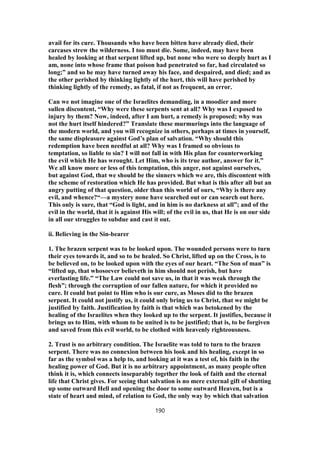
![can come into a man’s heart is that he, knowing his need of it, shall trust Christ,
and through Him the new life will flow into his heart. Faith is trust, and trust is
the stretching out of the hand to take the precious gift, the opening of the heart
for the influx of the grace, the eating of the bread, the drinking of the water, of
life.
Looking at Jesus—what does it mean practically? It means hearing about Him
first, then actually appealing to Him, accepting His word as personal to one’s
self, putting Him to the test in life, trusting His death to square up one’s sin
score, trusting His power to clean the heart and sweeten the spirit and stiffen the
will. It means holding the whole life up to His ideals. Ay, it means more yet;
something on His side, an answering look from Him. There comes a
consciousness within of His love and winsomeness. That answering look of His
holds us for ever after His willing slaves, love’s slaves. Paul speaks of the eyes of
the heart. It is with these eyes we look to Him, and receive His answering look.1
[Note: S. D. Gordon, Quiet Talks on Service, 16.]
Faith is the keynote of the Gospel by John. The very purpose for which this
Gospel was written was that men might believe that Jesus is the Son of God, and
that believing they might have life through His name (Joh_20:31). This purpose
is everywhere its predominant feature. From the announcement that John the
Baptist was sent “that all men through him might believe” (Joh_1:7), to the
confident assurance with which the beloved disciple makes the declaration that
he knows his testimony is true (Joh_21:24), the Gospel of John is one long
argument, conceived with the evident intention of inducing men to believe that
Jesus is the Son of God and the Saviour of all who trust in Him. The word
“believe” occurs in this Gospel no fewer than ninety-eight times, and either that
or some cognate word is to be found in every chapter.2 [Note: H. Thorne.]
A woman who was always looking within herself, and could not reach assurance
and peace, was told she must look out and up. Yet light did not come. One night
she dreamed that she was in a pit which was deep, dark, and dirty. There was no
way of escape—no door, no ladder, no steps, no rope. Looking right overhead
she saw a little bit of blue sky, and in it one star. While gazing at the star she
began to rise inch by inch in the pit. Then she cried out, “Who is lifting me?”
and she looked down to see. But the moment she looked down she was back
again at the bottom of the pit. Again she looked up, saw the star, and began to
rise. Again she looked down to see who or what was lifting her, and again she
found herself at the bottom. Resolving not to look down again, she for the third
time gazed at the star. Little by little she rose; tempted to look down, she resisted
the desire; higher and higher she ascended, with her eyes on the star, till at last
she was out of the pit altogether. Then she awoke, and said, “I see it all now. I am
not to look down or within, but out and up to the Bright and Morning Star, the
Lord Jesus Christ.”3 [Note: J. J. Mackay.]
IV
The Good Effect
191](https://image.slidesharecdn.com/john3commentary-151103172742-lva1-app6891/85/John-3-commentary-191-320.jpg)
![The effect is—(i.) life: “when he looked unto the serpent of brass, he lived”; (ii.)
eternal life: “that whosoever believeth may in him have eternal life.”
i. Life
It does not seem possible that so great a thing as life should depend upon so small
a thing as a look. But life often depends on a look. A traveller was once walking
over a mountain-road; it grew quite dark, and he lost his way. Then a
thunderstorm came on, and he made all the haste he could to try to find some
shelter. A flash of lightning showed just for a moment where he was going. He
was on the very edge of a precipice. The one look that the lightning enabled him
to take saved his life. A few weeks ago I was in a train after it was dark. The
signal was put “all right,” and the train started. We had gone a few hundred
yards, when I heard the whistle sound very sharply, and soon the train stopped.
Some one had shown the engine-driver a red light, and warned him of danger. It
turned out that one of the chains by which the carriages were coupled together
had broken. If the man who saw the broken chain had not looked, and if the
engine-driver had not looked and so seen the red light, most likely many lives
would have been lost. Here, again, life depended upon a look.
The wounded Israelite was in one sense dead already, his life was forfeit as soon
as he was bitten; it follows that the new life infused by a look at the brazen
serpent was miraculous in its character. What have we here but a striking figure
of death and resurrection? Not by any natural process of improvement or
gradual restoration was the death-stricken Israelite rescued from his fate, but by
the direct and supernatural intervention of Him who was even then, as He is still,
the resurrection and the life, in whom whosoever believes lives though he were
dead.1 [Note: W. H. M. H. Aitken.]
ii. Eternal Life
1. Our Lord said, “Ye must be born again,” and Nicodemus answered, “How can
a man be born again when he is old?” Our Lord replied by telling him something
more. A man needs to be born not only outwardly of water, but inwardly of the
Spirit, and when he is so born he will be as free as the wind—from legal
bondage—from the tyranny of sin. And to this Nicodemus replied by asking yet
more impatiently, “How can these things be?” The answer that he receives is
given through the speaking figure of death and resurrection, and if we desire a
striking commentary on the figure, and a definite statement of the truth, we have
only to turn to St. Paul’s Epistles. “You hath he quickened, who were dead in
trespasses and sins.” “But God, who is rich in mercy, for his great love
wherewith he loved us, even when we were dead in sins, hath quickened us
together with Christ, and hath raised us up together.” “And you, being dead in
your sins and the uncircumcision of your flesh, hath he quickened together with
him, having forgiven you all trespasses.” “Having spoiled principalities and
powers, he made a show of them openly, triumphing over them in his cross.”
Surely nothing can be more striking than the parallelism between the words of
this passage and the symbolism of the scene that we are contemplating.
192](https://image.slidesharecdn.com/john3commentary-151103172742-lva1-app6891/85/John-3-commentary-192-320.jpg)
![Eternal life is the blessing of the Kingdom of God viewed as a personal
possession. The description is peculiar to John’s Gospel, but it agrees with the
“life” which is spoken of with such emphasis in the other Gospels. According to
them, to enter into the Kingdom is to enter into “life” (Mat_18:3; Mat_18:8-9). It
is not so much duration that is expressed by the word “eternal” as the peculiar
quality of the life that arises out of the new relations with God which are brought
about by Jesus Christ. It is deathless life, although the believer has still to die,
“and go unterrified into the gulf of Death.” It may be described as a life which
seeks to obey an eternal rule, the will of God; which is inspired by an eternal
motive, the love of God; which lives for and is lightened by an eternal glory, the
glory of God; and abides in an eternal blessedness, communion with God. It is
both present and future. Here and now for the believer there are a new heaven
and a new earth, and the glory of God doth lighten them, and the Lamb is the
light thereof. No change which time or death can bring has power to affect the
essential character of his life, though its glory as terrestrial is one, and its glory
as celestial is another. Wherever after death the man may be who has believed in
Jesus, the life that he lives will be the same in its inner spirit and relation. “To
him all one, if on the earth or in the sun,” God’s will must be his law, God’s glory
his light, God’s presence his blessedness, God’s love his inspiration and joy.1
[Note: John Reid.]
I distinguish between Life, which is our Being in God, and Eternal Life, which is
the Light of the Life, that is, fellowship with the Author, Substance, and Former
of our Being, the Alpha and Omega. It is the heart that needs re-creation; it is
the heart that is desperately wicked, not the Being of man. I think a distinction is
carefully maintained in Holy Scripture between the life in the heart and the Life
of the Being: “Lighten thou my eyes that I sleep not in death.” It is the Light of
Life we want, to purify or re-create or regenerate our hearts so that we may be
the Children of Light.2 [Note: R. W. Corbet, Letters from a Mystic of the Present
Day, 63.]
2. In the Revised Version there is a little change made here, partly by the
exclusion of a clause and partly by changing the order of the words. The
alteration is not only nearer the original text, but brings out a striking thought.
It reads that “whosoever believeth may in him have eternal life.” “May in him
have eternal life”—union with Christ by faith, that profound incorporation into
Him, which the New Testament sets forth in all sorts of aspects as the very
foundation of the blessings of Christianity; that union is the condition of eternal
life.
A soldier lay dying on the battlefield; the chaplain speaking to him read St. John
3. When he came to Num_21:14-15, he was asked to read them again; when they
were read, the soldier, having repeated them, added, “That is enough for me;
that is all I want.”3 [Note: L. N. Caley.]
There is a most impressive little story which tells how Sternberg, the great
German artist, was led to paint his “Messiah,” which is his masterpiece. One day
the artist met a little gypsy girl on the street, and was so struck by her peculiar
beauty that he requested her to accompany him to his studio in order that he
193](https://image.slidesharecdn.com/john3commentary-151103172742-lva1-app6891/85/John-3-commentary-193-320.jpg)
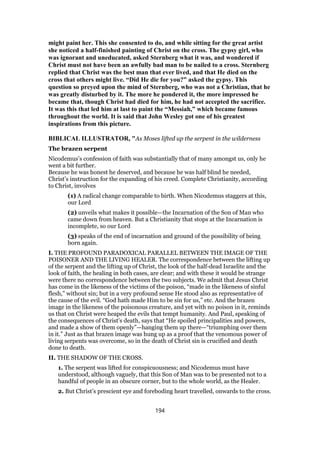
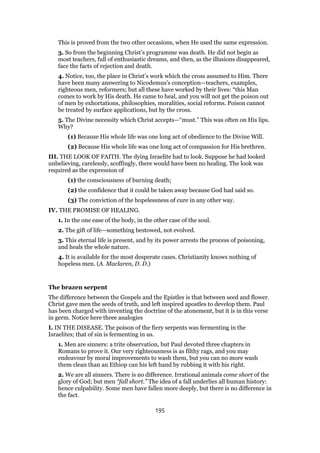
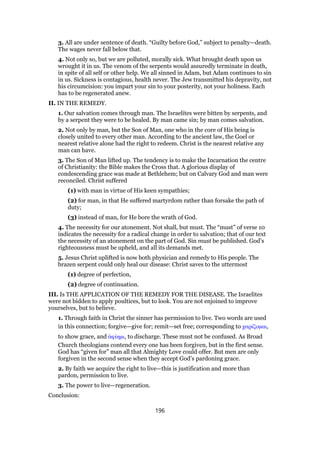
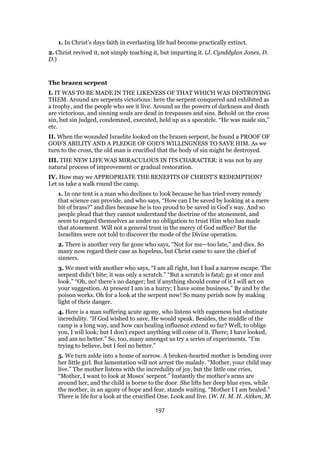
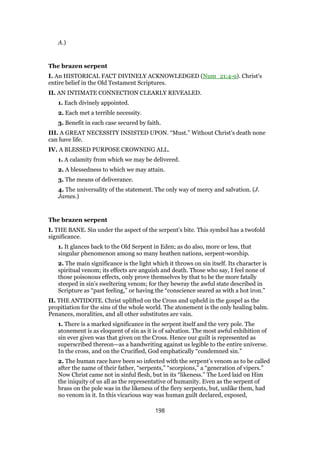
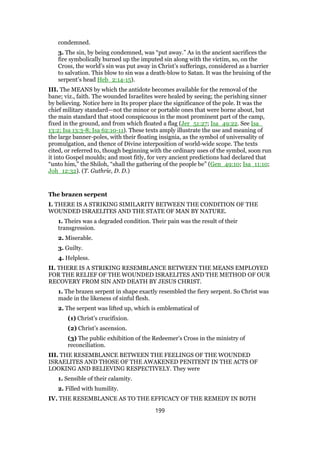
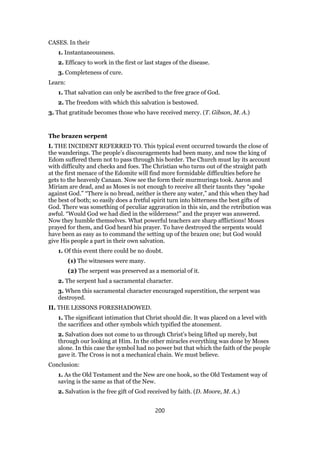
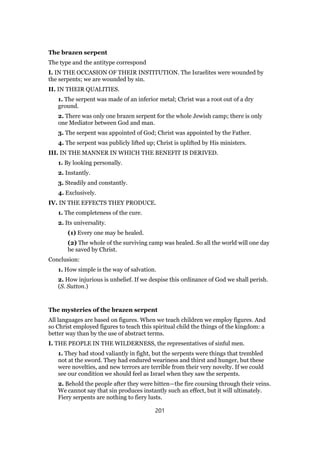
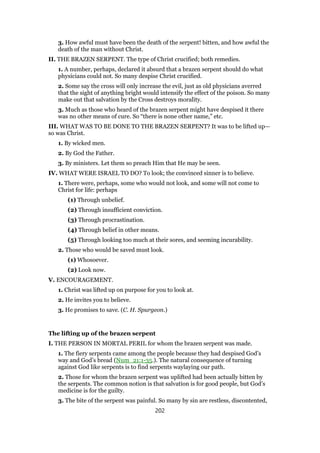
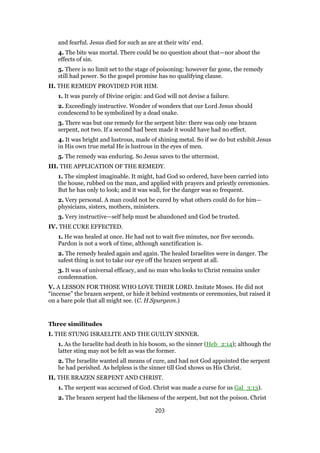
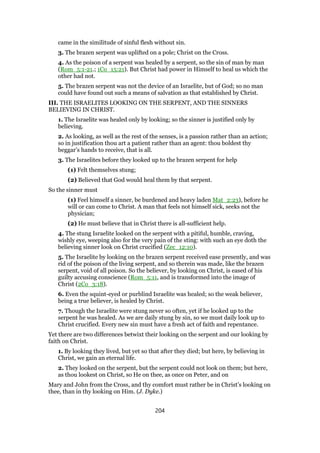
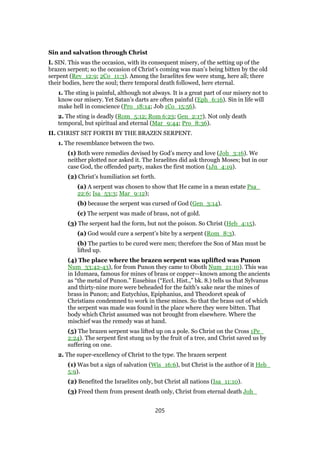
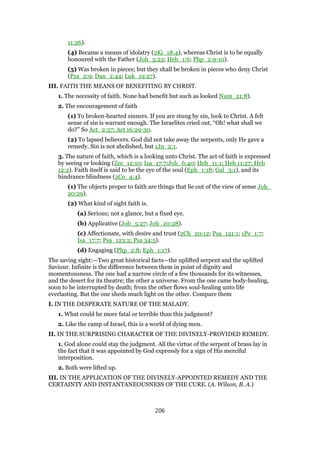
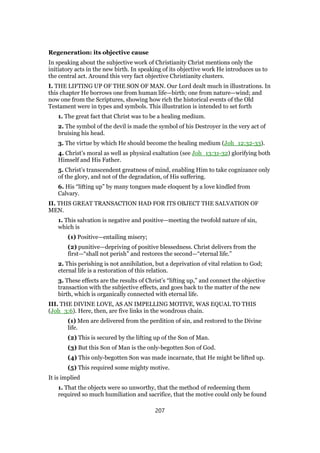
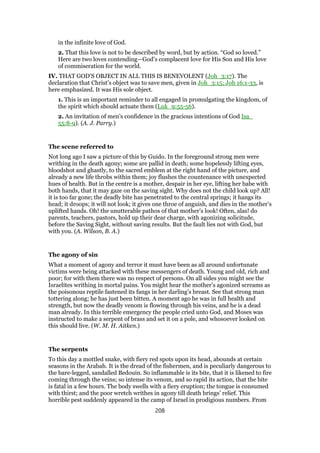
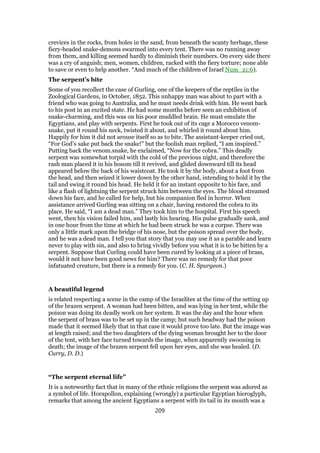
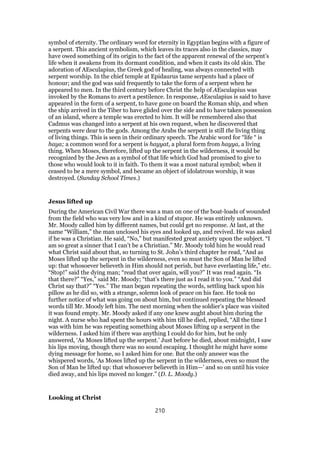
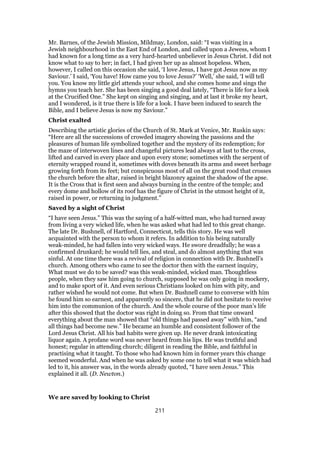
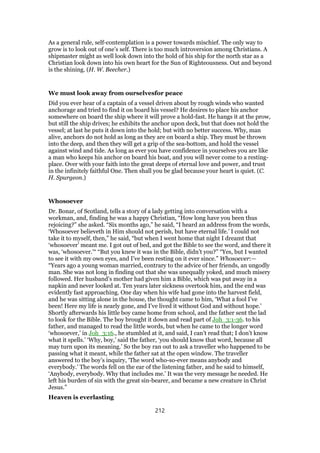
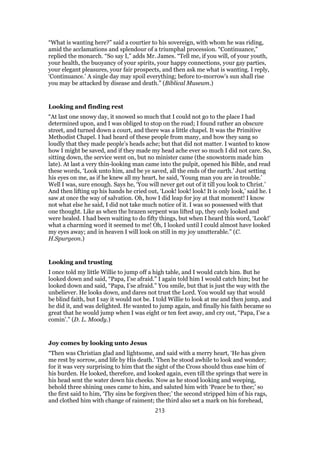
![and gave him a roll with a seal on it, which he bid him look on as he ran, and that he
should give it in at the celestial gate; so they went their way.” (Pilgrim’s Progress.)
Looking brings life
If we look upon Christ with the eye though of a weak faith, we shall be saved. Dr.
Cneciger when he lay a-dying cried out, “Credo languida fide, sed tamen fide.” I
believe with a weak faith, but with a faith such as it is. (J. Trapp.)
15 that everyone who believes may have eternal
life in him.”[g]
BARNES, "That whosoever - This shows the fulness and freeness of the gospel.
All may come and be saved.Believeth in him - Whosoever puts confidence in him
as able and willing to save. All who feel that they are sinners, that they have no
righteousness of their own, and are willing to look to him as their only Saviour.
Should not perish - They are in danger, by nature, of perishing - that is, of
sinking down to the pains of hell; of being “punished with everlasting destruction”
from the presence of the Lord and from the glory of his power, 2Th_1:9. All who
believe on Jesus shall be saved from this condemnation and be raised up to eternal
life. And from this we learn:
1. That there is salvation in no other.
2. That salvation is here full and free for all who will come.
3. That it is easy. What was more easy for a poor, wounded, dying Israelite, bitten
by a poisonous serpent, than to look up to a brass serpent? So with the poor,
lost, dying sinner. And what more foolish than for such a wounded, dying man
to refuse to look on a remedy so easy and effectual? So nothing is more foolish
man for a lost and dying sinner to “refuse” to look on God’s only Son, exalted
on a cross to die for the sins of men, and able to save to the uttermost “all” who
come to God by him.
CLARKE, "That whosoever believeth - Bp. Pearce supposes that this verse is
only the conclusion of the 16th, and that it has been inserted in this place by mistake.
The words contain the reason of the subject in the following verse, and seem to break
in upon our Lord’s argument before he had fully stated it. The words, µη αποληται
αλλα, may not perish but, are omitted by some very ancient MSS. and versions.
GILL, "That whosoever believeth in him,.... Whether Jew or Gentile, a greater,
or a lesser sinner, and of whatsoever state and condition, age or sex; and though ever
214](https://image.slidesharecdn.com/john3commentary-151103172742-lva1-app6891/85/John-3-commentary-214-320.jpg)
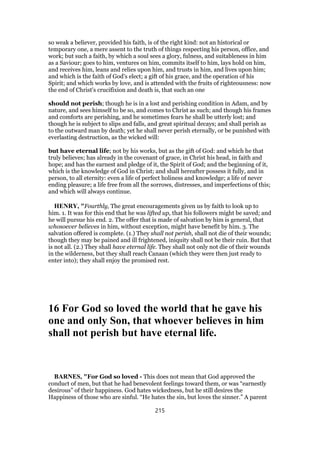
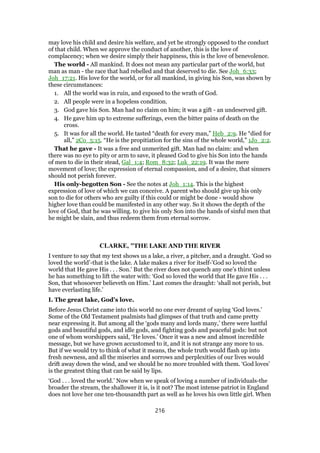
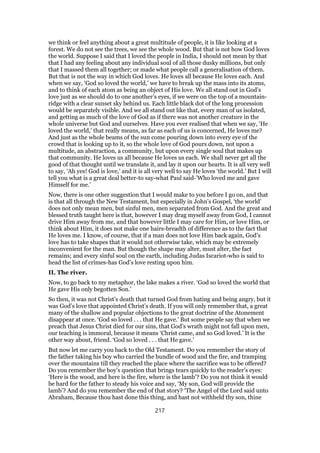
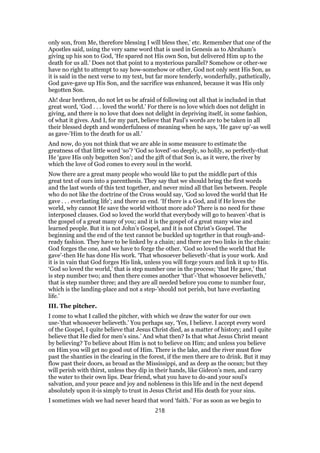
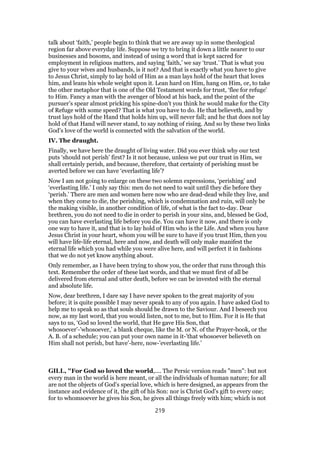
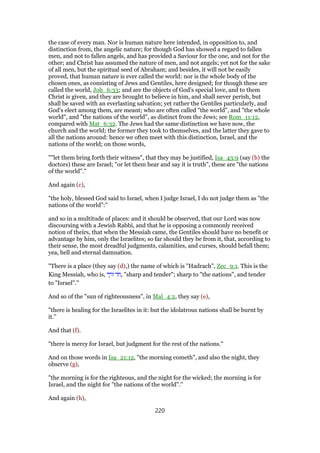
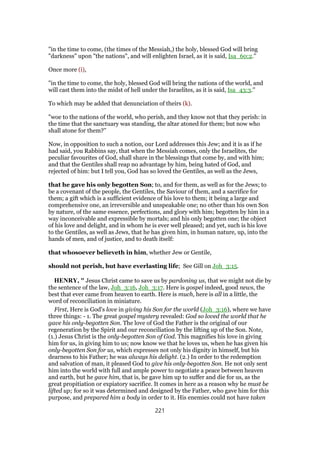
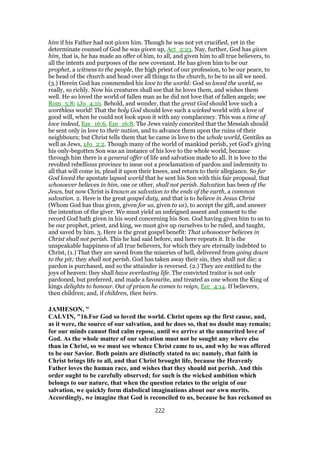
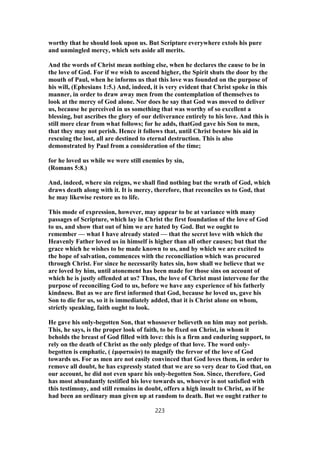
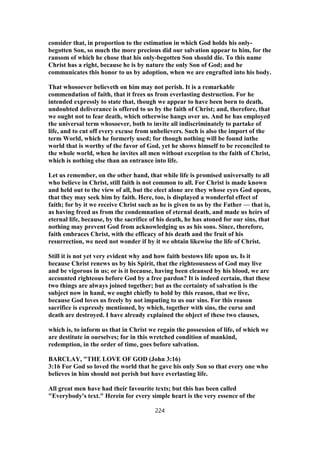
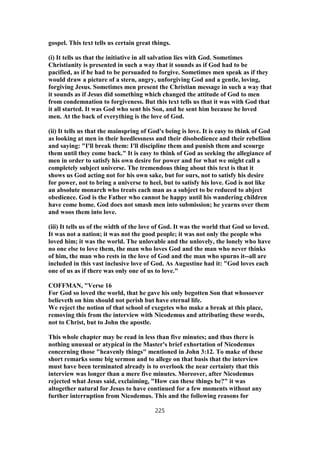
![rejection of the idea of a break at this point are weighty enough for doing so.
(1) It is fully in keeping with many of Jesus' actions that the world-shaking
concept of the new birth should first have been mentioned to this proud and
bigoted Pharisee. Did Jesus not also propound the greatest sermon on worship to
a woman at the well?
(2) It is more logical to believe that the epic teachings of this passage came first
from the lips of Jesus, rather than from John. This verse is the heart of
Christianity; and to identify it as coming from the reflections of a Spirit-guided
John so long afterward is simply unreasonable. Scholars favoring such a view
are unconsciously advocating an evolutionary hypothesis of Christianity, rather
than the view that Christ brought it all at one time. They forget that the function
of the Spirit in the apostles was to help them remember what Jesus said (John
14:26).
(3) The technical reasons alleged against this position are weak. For example,
some words in the paragraph beginning here do not appear elsewhere in words
attributed to Jesus but do appear in other writings of John, "only begotten"
being a conspicuous example. As Reynolds noted:
The reply is that John used this great word because he had heard it on the lips of
Jesus. He would not have dared use it otherwise; and he used it because he had
heard our Lord thus express himself.[18]
Furthermore, the connective, "for," at the beginning of the paragraph shows
that there is no break. See below.
For God so loved the world ... "For" indicates that we do not have here a new
section, but the continuation of the interview with Nicodemus.
So loved the world ... is the burden of the entire corpus of divine revelation.
Fittingly, this announcement of God's universal love was made to a
representative of the narrowest and strictest sect in ancient Judaism, who taught
that God's love was the special province of Israel, who were at that very time
hoping for their long-awaited Messiah, who would, according to their views,
restore the kingdom of Israel and judge the whole Gentile world with an
overwhelming destruction. Jesus' refusal to conform to such an idea of the
Messiah was a very conspicuous element in their rejection of him. Here, Christ
hurled into the very teeth of the Sanhedrin the mind-blowing concept that God
loved everyone on earth, the whole creation! It is no wonder that John never
forgot such a confrontation as this; and no wonder that some of the words in this
interview became a part of his permanent vocabulary, appearing even in the
writings of his old age, as in "And he is the propitiation for our sins; and not for
ours only, but also for the sins of the whole world" (1 John 2:2).
God's love for mankind is pure, spontaneous, and constant. Jesus did not die on
the cross to compel God to love people, but because he already loved them, the
cross being a result of God's love, not the cause of it. God's holy love is not
226](https://image.slidesharecdn.com/john3commentary-151103172742-lva1-app6891/85/John-3-commentary-226-320.jpg)
![inconsistent with His wrath, for God's love extends to man himself, but not to the
sins that man is guilty of. The doom of the wicked appears by implication in this
very statement of his love.
That he gave his only begotten Son ... Although the initiative of the Father
appears here in the word "gave," Christ also gave himself for man. Seven
centers of initiative are discernible in the drama of the cross, and the student is
referred to my Commentary on Romans, pp. 117f, for a review of them. It is the
Father's initiative on view here, and it is significant that in the Christian religion
alone it is God who provides the offering for sin. In this sublime fact,
Christianity rises above any comparison with ethnic and natural religions, in
which, in all of them, it is man himself who pays and pays. It is always a man,
like Prometheus, who is chained to the rock; but in the holy religion of Christ, it
is God who provides the offering for man's sin.
The thought in focus here is the sacrifice of Christ. Such is the nature of sin and
rebellion against God, that only God could extricate fallen humanity from the
morass into which they had fallen; and God could do it only at awful cost in the
giving of Jesus as an offering. Note the significant shift of titles. John 3:14 spoke
of the Son of man; here Jesus spoke of the Son of God. No MAN could have died
for all men; only God in the form of man could have done it. The highest angel in
heaven would not have sufficed to provide such an offering as Jesus.
O listen to our wondrous story: Counted once among the lost, Jesus came from
heaven's glory, Saving us at awful cost.
No angel could his place have taken, Highest of the high though he; The loved
one on the cross forsaken Was one of the Godhead three![19]
This was the mystery hidden before times eternal, that God would enter the lists
of humanity as a man, paying the penalty of human transgression himself in the
person of his Son and discharging the debt due to the fall in Eden. It was
primarily for the purpose of delivering the flesh of the Messiah to humanity that
the device of a chosen people had been provided by God in the days of Abraham;
and, despite the will of the chosen people to reject him, Christ here unfolded the
full mystery to one of the noblest and best men in the very council of the
Sanhedrin itself.
That whosoever believeth on him ... Faith is the great principle of Christianity,
motivating every act of obedience, securing the believer in times of bewilderment
or temptation, sustaining the disciple through tribulations and distress, and
enlightening the soul during every darkness. Faith is the first of the
preconditions of redemption in Christ Jesus, and it is also the last, there never
being a single moment of the Christian pilgrimage when faith is not required.
Without faith it is impossible to please God (Hebrews 11:6). "On him ..." is
alleged to be one of the words that is Johannine rather than from Christ, but
such a conceit is rejected. Glorious as faith assuredly is, it is faith "in Christ"
that saves, not faith "in faith."
227](https://image.slidesharecdn.com/john3commentary-151103172742-lva1-app6891/85/John-3-commentary-227-320.jpg)
![Should not perish ... The so-called translations that read this place "shall not
perish" are incorrect. See under John 3:15. "Perish ..." is a reference to the
overthrow of the wicked in hell, and is a hint of the judgment when God will
settle accounts with evil. Tender as the love of God is, it does not extend far
enough to include any divine acceptance of man's rebellion against the Creator.
But have everlasting life ... Such an unspeakable reward contrasts with God's
wrath (John 3:36), destruction (Matthew 7:13,14), eternal fire (Matthew 18:9),
and with judgment or death (John 5:24). Everlasting life is antithetical to such
things, being eternal both in its excellence and in its duration.
The careful student should not overlook the fact that this passage (John 3:15)
reveals that the eternal life which is available to men is located "in Christ." This
means that eternal life is available only for those who become identified with
Christ in the absolute sense, being so united with him that they are in fact
"Christ," as Paul declared (Galatians 2:20). Nor is this teaching ever lost sight of
by the apostle John; he said:
And the witness is this, that God gave unto us eternal life, and this life is in his
Son. He that hath the Son hath the life; he that hath not the Son hath not life (1
John 5:11,12).
[18] H. R. Reynolds, op. cit., Vol. 17, p. 122.
[19] L. O. Sanderson, Christian Hymns Number Two (Nashville: The Gospel
Advocate Company, 1948), What Did He Do? No. 187.
GREAT TEXTS OF THE BIBLE, "The Amazing Gift of Love
For God so loved the world, that he gave his only begotten Son, that whosoever
believeth on him should not perish, but have eternal life.—Joh_3:16.
1. This is perhaps the favourite text in the Bible—one of the first texts which we
learn as children, and one whose meaning becomes only the more precious to us
as we grow older. For in these few simple words the whole Gospel is summed up.
The depth of God’s love, the greatness of His gift, and the blessings which He
freely offers to us—all are made known to us every time that we repeat these
words.
I suppose it is a common fact of experience that those who live within sound of
church bells after awhile do not notice their striking; might I suggest that
something similar may be true of the great bell-note that is struck for us in the
opening clause of this text? Which of us is sufficiently sensitive or responsive to
its vibrations? Which of us realizes sufficiently that these words proclaim a final
truth, the culmination of religious thought, something never to be transcended?1
[Note: J. Warschauer.]
2. It is no accident that has given to this statement its unique place in the mind
and heart of Christendom. The deepest thinker sees in this verse a summing-up
of the Gospel; the humblest believer feels that it expresses the whole substance of
228](https://image.slidesharecdn.com/john3commentary-151103172742-lva1-app6891/85/John-3-commentary-228-320.jpg)
![his faith. The inspired writer gathers himself up, as it were, to a supreme effort,
and presents in one majestic, sweeping, comprehensive sentence the essence of
Christian belief. And there stands the declaration still in all its simple grandeur,
in all its boundless love, in all its mighty power. Centuries have passed over it,
and left no impress. Time has failed to impair its freshness; it is the same to-day
as it was yesterday. That which it is to-day it will be for ever. For eighteen
hundred years and more it has poured forth its blessings with unceasing flow
upon the foolish and the wise, upon the sinner and the saint, upon the martyr
and his murderer. Years have thrown no new light upon its meaning. The
wisdom and learning of men, the meditations of the holiest and the best, have not
added one jot to our comprehension of its mystery. Age upon age of opposition,
of scorn, and of derision have as little succeeded in shaking its power. When we
accept it in all its fulness, is it not still as much the source of joy as when it
supported men, women, and children to a cruel death, gladly offering their lives
in its defence? When we reject it, what can we offer in its place to support the
weak or encourage the desperate? Is it not still the most sovereign balm to bind
up the broken hearts of mourners; the surest stay of the dying? Is it not still the
silver clarion, whose peal rises high and clear above the din of strife—stirring
wearied soldiers of Christ to renew their struggle with evil, whether within their
own hearts or in the world? Is it not still the rock upon which Christianity is
founded? Is it not in reality the sum and substance of Christianity itself?
For six nights Mr. Moorhouse had preached on this one text. The seventh night
came and he went into the pulpit. Every eye was upon him. He said, “Beloved
friends, I have been hunting all day for a new text, but I cannot find anything so
good as the old one, so we will go back to Joh_3:16”; and he preached the
seventh sermon from those wonderful words: “God so loved the world.” I
remember the end of that sermon: “My friends,” he said, “for a whole week I
have been trying to tell you how much God loves you, but I cannot do it with this
poor stammering tongue. If I could borrow Jacob’s ladder, and climb up into
Heaven, and ask Gabriel, who stands in the presence of the Almighty, to tell me
how much love the Father has for the world, all he could say would be: ‘God so
loved the world, that he gave his only begotten Son, that whosoever believeth on
him should not perish, but have eternal life.’ ”1 [Note: Life of D. L. Moody, 128.]
At the World Missionary Conference held in Edinburgh in 1910, Dr. Tasaku
Harada, President of the Doshisha College, said: “As regards the aspects of the
Christian Gospel and Christian life which appeal to the Japanese, in the first
place I mention the love of God. Dr. Neesima used to say that he regarded the
16th verse of the third chapter of St. John’s Gospel as the Fujiyama of the New
Testament—‘God so loved the world that he gave his only begotten Son.’ If there
are two words which have created the greatest transformation since the
introduction of Christianity into Japan they are the words ‘God’ and ‘love.’ ”1
[Note: World Missionary Conference, 1910, iv. 305.]
Fuji, it should be said, is not only the sacred mountain of Japan but the ideal of
excellence. Its almost perfect cone can be seen from most parts of the main
island, and it forms the background of many Japanese landscapes, whether
actually visible or not.
229](https://image.slidesharecdn.com/john3commentary-151103172742-lva1-app6891/85/John-3-commentary-229-320.jpg)
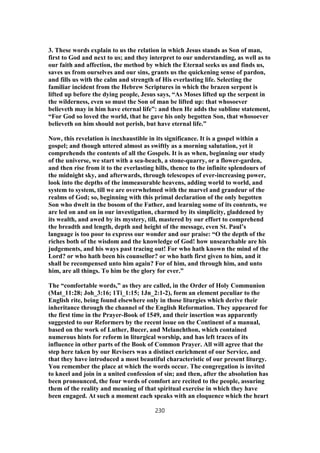
![of the faithful worshipper can readily understand. No comment is added,
because none is required, and any paraphrase would be felt to jar upon the ear.
The actual language of Holy Writ has been incorporated into the scheme of our
liturgy, and the utterances of our Lord and His Apostles are left to make good by
themselves the force of their appeal.1 [Note: H. T. Knight. The Cross, the Font,
and the Altar, 1.]
4. Let us distribute the text into parts for easier apprehension, and in such a way
as seems to us best “for the use of edifying.” Dr. Warschauer proceeds in a direct
line, taking the thoughts of the verse as they come—(1) God, (2) a loving God, (3)
a great Giver, (4) the Gift of the Son, (5) Belief, (6) Eternal Life. Dr. Eadie makes
God’s Love the subject, and begins with the world as the Object of God’s love,
takes next the Gift of God’s love, and ends with the Design of God’s love. Dr.
Maclaren’s divisions are: (1) The great Lake—“God so loved the world”; (2) the
River—“that he gave his only begotten Son”; (3) the Pitcher—“that whosoever
believeth on him”; (4) the Draught—“should have eternal life.” If any criticism
should be made of so effective and attractive a division of the text, it would be
that it misses the prominence due to the world. For it has to be remembered that
the revelation to Nicodemus was twofold—first, that he, a Pharisee, had to be
born again before he could enter the Kingdom of God; and, next, that the way
was open not only to Pharisees, but to sinners, including sinners of the Gentiles,
that is to say, to the whole world. And it is this second part of the great revelation
that St. John is now giving us. Accordingly the next verse proceeds, “For God
sent not the Son into the world to judge the world; but that the world should be
saved through him.”
Let us, then, in order to keep the world-wide offer in our mind throughout,
adopt this method of exposition—
I. God and the World—“God so loved the world.”
II. Christ and the World—“that he gave his only begotten Son.”
III. The World and Christ—“that whosoever believeth on him.”
IV. The World and God—“should not perish but have eternal life.”
I
God and the World
“God so loved the world.”
The introductory “for” shows that this verse presents itself as the reason of a
previous statement. The reference in it is to a remarkable incident in the history
of ancient Israel. They had, in one of their periodical fits of national insanity, so
provoked God that He sent among them “fiery flying serpents,” and many of
them were bitten and died. But to counteract the chastisement, and make its
terror a means of salutary impression, Moses was commanded to frame a brazen
231](https://image.slidesharecdn.com/john3commentary-151103172742-lva1-app6891/85/John-3-commentary-231-320.jpg)
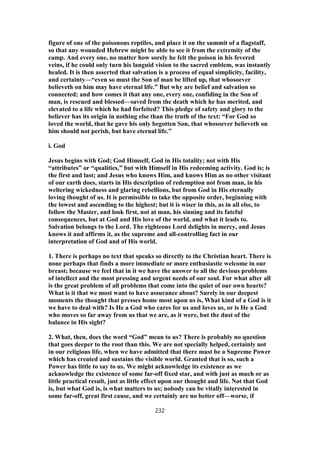
![anything—when we hear or use such empty phrases as the totality of being,
instead of speaking of our Father in heaven.
ii. God’s Love
1. A God who does not care, does not count; if He is not interested in us, how—to
say it boldly—are we to be interested in Him? That is why, in practice,
pantheism is hardly to be distinguished from atheism; you cannot worship a
totality of being—you cannot pray to a nameless Power that is heedless of your
welfare, not concerned in human joy or despair. No, the assurance which man’s
soul craves is that which bursts upon him in this declaration, “God so loved the
world.”
For a loving worm within the clod
Were better far than a loveless God.
He created the world, not in order to escape the boredom of eternity, but from
love; He called souls into being, not for the purpose of conducting an endless
series of aimless experiments, but in order that His love might have objects on
which to bestow itself; He leads them, not through a gnat-like span of existence
to the gloom of annihilation, but to the home of everlasting love. That
conception—and it alone—gives us anything worth calling a religion; and
because Christianity insists upon and emphasizes this conception—God’s love of
the world and for the human soul—it is the absolute religion.
If our endeavours, our struggles, our failures, our hopes, our aspirations, were
nothing to the Eternal, what could the Eternal be to us? Here is a human
document which came into my hands only a couple of days ago. The writer says:
“The conception of God that I now have is not the personal one that I had under
the old belief.… Instead of living under the daily notice of God’s favour or
resentment, I find that … we are but unnoticed units in all the vast millions of
the universe. The result is that I am questioning the value of life.” Can you
wonder? I do not wonder at all! But if we feel that His eye is upon us, that our
little lives mean something to His heart, that we matter to Him, and that His
intention is for our good, then that very fact lifts our lives out of insignificance,
makes the conflict worth waging, and enables the toiler, the sufferer, the witness
for truth and right to say in the midst of seeming defeat and desolation, “And yet
I am not alone, because the Father is with me.” God loves the world: all faith
which stops short of that lacks the element which makes it faith indeed.1 [Note:
J. Warschauer.]
2. “God loves.” Where, outside of Christianity, does anybody dare to say that as
a certainty? Men have hoped it; men have feared that it could not be; men have
dimly dreamed and strongly doubted; men have had gods cruel, gods lustful,
gods capricious, gods good-natured, gods indifferent or apathetic, but a loving
God is the discovery of Christianity. Neither the gross deities of heathenism, nor
the shadowy god of theism, nor the unknown somewhat which (perhaps) “makes
for righteousness” of our modern agnostics, presents anything like this—“God
233](https://image.slidesharecdn.com/john3commentary-151103172742-lva1-app6891/85/John-3-commentary-233-320.jpg)
![loves.”
It seems to us a simple and purely elementary truth that God is holy love, but
how could we have known anything about it without Christ and the revelation
made by Him? Nature and history show us clearly the wise and mighty God, but
where do they show Him as holy and loving?2 [Note: R. Rothe, Still Hours, 107.]
God is here set forth as a lover; loving men, all men, every man. “God so loved
the world.” Let us then at once make an addition to the first avowal of the
Apostles’ Creed, and say:—“I believe in God the Father Almighty, maker of
heaven and earth, and lover of the whole world.” We sing, “Jesus, lover of my
soul.” We have equal right and warrant to sing, “God the Father Almighty, lover
of my soul.”1 [Note: H. Johnson, From Love to Praise, 10.]
iii. The World
This designation of the object upon which the Divine love rested and rests
eternally is to be interpreted according to the usage of this Gospel, and that
usage distinctly gives to the expression “the world” not only the meaning of the
total of humanity, but also the further meaning of humanity separated by its own
evil from God. And so we get, not only the statement of the universality of the
love of God, but also this great truth, that no sin or unworthiness, no
unfaithfulness or rebellion, nothing which degrades humanity even to its lowest
depths, and seems all but to extinguish the spark within it that is capable of
being fanned into a flame, has the least power to deflect, turn back, or alter the
love of God. That love falls upon “the world,” the mass of men who have
wrenched themselves away from Him, but cannot wrench Him away from
themselves. They never can prevent His love from pouring itself over them; even
as the bright waters of the ocean will break over some grim rock, black in the
sunshine. Thus the outcasts, criminals, barbarians, degraded people that the
world consents to regard as irrevocably bad and hopeless are all grasped in His
love.
The first meaning of the Greek word for world (kosmos) is “order.” And as all
order is more or less beautiful, the second meaning of the term is “ornament.”
The word is found with this meaning in 1Pe_3:3,—“Whose adorning let it not be
that outward adorning of plaiting the hair, and of wearing of gold, or of putting
on of apparel; but let it be the hidden man of the heart, in that which is not
corruptible, even the ornament of a meek and quiet spirit, which is in the sight of
God of great price.” After the word had for ages been employed by the Greeks in
these acceptations, it occurred to one of the greatest thinkers that ever lived that
there was no order so wonderful as the order of the universe, no ornament so
ornamental, so real, as the great world. Hence he employed the word which
signified “order” and “ornament” to designate the “world.” The Holy Spirit,
who guided the holy men who wrote the New Testament, approving of his idea,
adopted the Greek term in its Pythagorean sense. And thus it is that we read
such expressions as the following:—“The invisible things of God from the
creation of the (orderly and beautiful) world, are clearly seen, being understood
by the things that are made.” “Glorify thou me with thine own self, with the
234](https://image.slidesharecdn.com/john3commentary-151103172742-lva1-app6891/85/John-3-commentary-234-320.jpg)
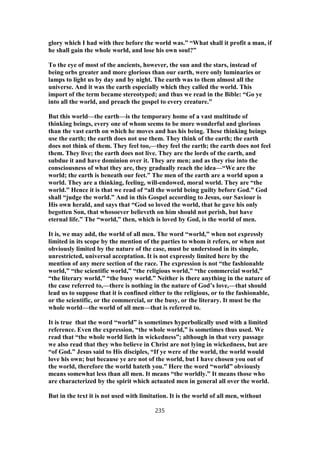
![distinction or exception, that is meant. It is the same world which is called “the
whole world” in that other precious little gospel which runs thus:—“If any man
sin, we have an advocate with the Father, Jesus Christ the righteous: and he is
the propitiation for our sins; and not for ours only, but also for the sins of the
whole world.” The true extent of the import of the word may be seen in those
other passages which assure us that there “is one mediator between God and
men, the man Christ Jesus; who gave himself a ransom for all,” and who tasted
death for every Man_1:1 [Note: J. Morison, Holiness and Happiness, 14.]
1. But what about election? There is nothing in this text about it. God so loved
the world—not a portion of the world—not the elect. The elect are only a part of
the world and chosen out of it. But this love of God is world-wide, for everybody,
without a hint of election in it. It sweeps away out beyond election, and has no
boundaries, no limitations, no reservations.
I believe in election. It is one of the great basal truths of Scripture, and a most
blessed doctrine, charged with infinite stay and comfort for God’s believing
children. It puts the Father’s everlasting arms about every child of His, and
makes it certain he will never perish. But while it clearly and definitely includes
somebody, it just as clearly and positively excludes nobody. It makes heaven sure
for the chosen, but it keeps no one out of heaven. It is no chain gang bound about
the necks of men, dragging some to salvation and some to perdition.1 [Note: H.
Johnson, From Love to Praise, 17.]
2. This is the vital doctrine of election, the election of some for the benediction of
the whole. “I pray for these, that the world may believe.” The elect are called not
to a sphere of exclusion, but to a function of transmission. They are elected not to
privilege, but to service; not to the secret hoarding of blessing, but to its
widespread distribution. The elect are not circles, but centres, heat centres for
radiating gracious influence to remote circumferences, that under its warming
and softening ministry “the world may believe” in the Son of God. That is the
way of the Master. He will work upon the frozen streams and rivers of the world
by raising the general temperature. He seeks to increase the fervour of those who
are His own, and, through the pure and intense flame of their zeal, to create an
atmosphere in which the hard frozen indifference of the world shall be melted
into wonder, into tender inquisition, that on the cold altar of the heart may be
kindled the fire of spiritual devotion. “I pray not for the world, but for these …
that the world may believe.” Through the disciple He seeks the vagrant; through
the believer He seeks the unbeliever; through the Church He seeks the world;
through the ministry of Christian men and women the world is to be won for
Christ.
iv. God’s Love of the World
God loves the world, the world of men, Gentile as well as Jew, Cornelius not less
than Nicodemus, Scythian as well as Syrian, bond not less than free. God in His
totality loves man in his totality, loves his welfare, which is purity and peace,
faith and love, self-poise and perseverance, devotion to high ideals, and enduring
joy. “There is no difference.” The Divine love is infinite as the Divine nature. It
236](https://image.slidesharecdn.com/john3commentary-151103172742-lva1-app6891/85/John-3-commentary-236-320.jpg)
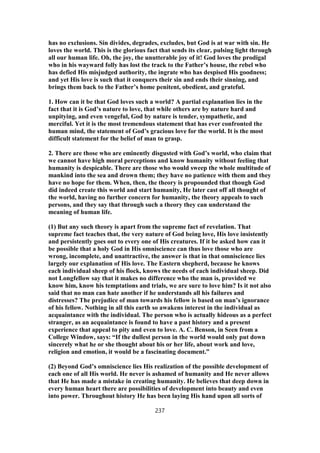
![people in sheepfolds or on farms, in obscure villages, in streets of both small and
great cities, and He has summoned them to great riches of character, and to
great usefulness of service. Where others look in hopelessness, He looks in
profound expectation. To Him humanity has expressed itself in the spirit and
conduct of Jesus Christ, and He anticipates that man after man from all sections
and tribes of the earth will measure up to the likeness of Christ; and He rejoices
with abundant joy when the Magdalenes are restored, the lepers are healed, the
dumb sing, the blind see, and the dead live again. God is always anticipating
glorious transformations of character.
3. Do we realize that, when we say “God loves the world,” that really means, as
far as each of us is concerned, God loves me? And just as the whole beams of the
sun come pouring down into every eye of the crowd that is looking up to it, so the
whole love of God pours down, not upon a multitude, an abstraction, a
community, but upon every single soul that makes up that community. He loves
us all because He loves each of us. We shall never get all the good of that thought
until we translate it, and lay it upon our hearts. It is all very well to say, “Ah yes!
God is love,” and it is all very well to say He loves “the world.” But what is a
great deal better is to say, as St. Paul said, “Who loved me and gave himself for
me.”
When we speak of loving a number of individuals—the broader the stream, the
shallower it is, is it not? The most intense patriot in England does not love her
one ten-thousandth part as well as he loves his own little girl. When we think or
feel anything about a great multitude of people, it is like looking at a forest. We
do not see the trees, we see the whole wood. But that is not how God loves the
world. Suppose I said that I loved the people in India, I should not mean by that
that I had any feeling about any individual soul of all those dusky millions, but
only that I massed them all together, or made what people call a generalization of
them. But that is not the way in which God loves. He loves all because He loves
each. And when we say, “God so loved the world,” we have to break up the mass
into its atoms, and to think of each atom as being an object of His love. We all
stand out in God’s love just as we should do to one another’s eyes if we were on
the top of a mountain-ridge with a clear sunset sky behind us. Each little black
dot of the long procession would be separately visible. And we all stand out like
that, every man of us isolated, and getting as much of the love of God as if there
were not another creature in the whole universe but God and ourselves.1 [Note:
A. Maclaren.]
After this he seems to have again paid a flying visit to Bathgate, the residence of
his brother-in-law; for to this year belongs a beautiful anecdote told of him in
that place. A young man belonging to the Church there was very ill, “dying of
consumption.” Mr. Martin had promised to take his distinguished relative to see
this youth, and Irving’s time was so limited, that the visit had to be paid about
six in the morning, before he started on his further journey. When the two
clergymen entered the sick chamber, Irving went up to the bedside, and looking
in the face of the patient said softly, but earnestly, “George M——, God loves
you; be assured of this—God loves you.” When the hurried visit was over, the
young man’s sister, coming in, found her patient in a tearful ecstasy not to be
238](https://image.slidesharecdn.com/john3commentary-151103172742-lva1-app6891/85/John-3-commentary-238-320.jpg)
![described. “What do you think? Mr. Irving says God loves me,” cried the dying
lad, overwhelmed with the confused pathetic joy of that great discovery. The
sudden message had brought sunshine and light into the chamber of death.2
[Note: Mrs. Oliphant, The Life of Edward Irving, ii. 87.]
4. “God so loved the world.” The pearl of this wonderful statement is the
measure it supplies of that eternal love which redeems sinful man. “God so loved
the world, that he gave his only begotten Son.” It is the earthly way of describing
the sacrifice God makes of God, of His true and real self for man. Language
could not more clearly or strongly declare the fact that God gives Himself, His
essential self, to the temptation and toil, the suffering and anguish, of our limited
and burdened life, that He may carry out His world-loving purpose.
The marvel of God’s love for mankind grows as we learn the degree of that love.
It is the degree of it that is apocalyptic. The Old Testament had attempted to
disclose the graciousness of God, telling men that like as a father pities, so God
pities. Exterior nature too had tried to make known God’s healing and
comforting power; abundant harvests telling of His affection, zephyrs breathing
His soothing kindness, health-giving air and the recuperative tendencies within
every normal body indicating that love is over mankind. But the degree of that
love was never known to any man, however scholarly, until it was revealed when
God out of desire to secure to man the highest possible good actually gave His
Son for Man_1:1 [Note: J. G. K. McClure, Supreme Things, 19.]
Winds weary with the old sea tune
Slide inland with some cloud, and soon
From woods that whisper summer noon
Weigh their wight wings with odour boon.
So I, long salted in our ocean drear
Of disbelief that Essence can be won
By any form of thought invented here,
Felt such a gush of joy about
My heart-roots, as if in and out
’Twas life-blood billowed; and as stout
As once we sent the battle-shout
Pitching clear notes against barbaric din,—
Oh, brother, my soul’s voice against the rout
239](https://image.slidesharecdn.com/john3commentary-151103172742-lva1-app6891/85/John-3-commentary-239-320.jpg)
![Of unbeliefs a man doth muse within,
Arising and protesting wild,
Spake, speaking out untruth defiled;
Spake, speaking in the truth exiled;
Spake, Little head and weary child,
Come home, God loves, God loves through sin and shame,—
Come home, God loves His world.2 [Note: Richard Watson Dixon.]
II
Christ and the World
“He gave his only begotten Son.”
The evidence of the love of God is the advent of God into the sinful and suffering
life of man, bearing sin vicariously as His way of eradicating it from the heart
and will of the sinner. “God,” as St. Paul says, “was in Christ, reconciling the
world unto himself.” “It is a faithful saying, and worthy of all acceptation, that
Christ Jesus”—“the effulgence of the Father’s glory and the very image of his
person,” uniquely and inexpressibly related to Him as “the only begotten Son”—
He, and not a stranger, nor a seraph; He, and not one of the ordinary sons of
men—“came into the world to save sinners”; to enter into contest with the awful
power of sin; to make an end of it, and to bring in an everlasting righteousness.
Here, then, in the life of Jesus are the only unerring measures of the love of God.
He spared not Himself from the suffering and agony and sacrifice necessary to
save them, but in love of them bore it for them, to rescue them from the stupor
and death of sin, and lift them to a share in His life. He who sees Jesus in
Bethlehem as a babe, in Galilee as a working healer and wise teacher, in
Gethsemane and on Calvary as the Just One dying for the unjust, sees the
Father, and knows and understands a little of the way in which He mediates the
redemption of a lost world.
1. Let us seek, first of all, to get rid of misconceptions in this vital matter.
(1) One of the most prevalent notions of God is this: that God is a hard,
inexorable Being, who has been made mild and forgiving only by the death of
Jesus Christ. This great Gospel text teaches just the contrary. It represents God
as in love with men already before Christ came—with all men—with every man.
“God so loved the world.” And this is not any elect or select portion of the world,
but the whole world of human beings that ever have lived, that live now or that
ever will live on the face of the earth: not the world of the elect, but the world of
240](https://image.slidesharecdn.com/john3commentary-151103172742-lva1-app6891/85/John-3-commentary-240-320.jpg)
![sinners.
How can you appease love? How can a loving God propitiate Himself? Read this
text with this thought of a propitiation of God injected into it, and see how it
sounds. “God so loved the world that he gave his beloved Son to abate his own
wrath and to placate himself!” Or, “God so loved the world that he gave his only
begotten Son that he might stop hating it.” This is simply suicide by self-
contradiction! What folly to talk of bribing to mercy One who is bent by every
instinct and prompting of His heart to the exhibition of mercy! Will you bribe a
mother to love her child?1 [Note: H. Johnson, From Love to Praise, 5.]
(2) But there is another false notion of God quite as prevalent in our day as the
one just named, and probably quite as mischievous. It arises from the swing of
the human heart to the opposite extreme of thought. God is conceived of as a
Being whose love is so vast and sweeping as to make punishment at last
impossible. Instead of being thought of now as a stern judge who will by no
means clear the guilty, He is thought of as a Father too loving to punish, and so
full of mercy that it will not be in His heart to deal with men according to any
rigid standard of justice. But this notion is as false and unscriptural as the other,
and to this notion as well as to the other the great Gospel text we have before us
stands opposed. In the bosom of this heavenly message we not only find the beat
of an infinite heart, but the imperial majesty of a holy will.
There is no more warrant for the dear God of sentimentalism than for the hard
malignant God of railing unbelief, and there is no warrant whatever for either.
Let us carefully read the text again. “God so loved the world, that he gave his
only begotten Son, that whosoever believeth on him should not perish.”
Whosoever believes. But suppose men do not believe and will not believe. Do you
not see the inevitable, irresistible next step? If men still will not believe, then they
still will perish. God’s love does not save everybody, although it goes out to
everybody. Some men will not take its great gift. And if the sacrifice is rejected,
how can it help the sinner it is made for?
God is all Love, and nothing but Love and Goodness can come from Him. He is
as far from Anger in Himself, as from Pain and Darkness. But when the fallen
Soul of Man had awakened in itself a wrathful, self-tormenting Fire, which could
never be put out by itself, which could never be relieved by the natural Power of
any Creature whatsoever, then the Son of God, by a Love greater than that
which created the World, became Man, and gave His own Blood and Life into
the fallen Soul, that it might, through His Life in it, be raised, quickened, and
born again into its first state of inward Peace and Delight, Glory and Perfection,
never to be lost any more.1 [Note: William Law.]
2. “God so loved the world that he gave.” This is always and everywhere the sign
and token of love, this generous need to give itself forth. Love is prodigal—a
reaching out, an overflowing beyond the borders and boundaries of self; an
imperious desire to make some sacrifice, to do something for the sake of the
beloved. Wherever you meet this passion of affection, you will meet that same
splendid impetus of self-giving. The one great passion of a poet like W. E. Henley
241](https://image.slidesharecdn.com/john3commentary-151103172742-lva1-app6891/85/John-3-commentary-241-320.jpg)
![is a love of his country—not always wise but always genuine—and it bursts forth
into those exultant lines—
What have I done for you,
England, my England?
What is there I would not do,
England, my own?
The story is told by Luther that when his translation of the Bible was being
printed in Germany, pieces of the printer’s work were allowed to fall carelessly
upon the floor of his shop. One day the printer’s little daughter coming in picked
up a piece of paper on which she found just the words, “God so loved the world
that he gave”—the rest of the sentence not having yet been printed. It was a
veritable revelation to her, for up to that time she had always been told that the
Almighty was to be dreaded, and could be approached only through penance.
The new light thrown upon God’s nature by the scrap that had fallen into her
hands seemed to flood her whole being with its radiance, so that her mother
asked her the reason of her joyfulness. Putting her hand in her pocket, Luther
tells us, the girl handed, out the little crumpled piece of paper with the
unfinished sentence. Her mother read it, and was perplexed: “He gave—what
was it He gave?” For a moment the child was puzzled, but only for a moment;
then, with a quick intuition, “I don’t know; but if He loved us well enough to
give us anything, we need not be afraid of Him.” Truly there are things hidden
from the wise and prudent that are revealed to babes. How impossible is
Spinoza’s demand that although God is not so much as interested in us, we ought
to feel towards Him an overmastering love of the mind! And how absolutely true,
on the other hand, is the insight which declares, “We love him because he first
loved us!”1 [Note: J. Warschauer]
In the next verse, where the same subject is dealt with, a different expression is
employed. There we read, “God sent his Son.” But here, where the matter in
hand is the love of God, sent is far too cold a word, and gave is used as congruous
with loved. It must needs be that the Divine love manifest itself even as the
human does by an infinite delight in bestowing. The very property and life of
love, as we know it even in its tainted and semi-selfish forms as it prevails
amongst us, is to give, and the life of the Divine love is the same. He loves, and
therefore He gives. His love is a longing to bestow Himself, and the proof and
sign that He loves is that “He gave his only begotten Son.”2 [Note: A. Maclaren.]
3. “He gave his only begotten Son.” We cannot reach the bottom of this saying.
The shallow sounding lines of men that are cast into that deep water do not touch
the bottom, though some imagine that they do. What does it mean?—“His only
begotten Son.” There are some that would seek to minimize the force of that
wonderful designation “only begotten.” They tell us that it does not always
signify soleness, or even uniqueness; and they point us to the fact that Isaac is
called Abraham’s only begotten son although Ishmael was equally his child. But
242](https://image.slidesharecdn.com/john3commentary-151103172742-lva1-app6891/85/John-3-commentary-242-320.jpg)
![such an argument is not good enough even to be called sophistical. It has no
point and no relevancy. “Only begotten” must of necessity mean both uniqueness
and soleness. Isaac was Abraham’s only begotten son from the standpoint from
which the term was applied. He was so with reference to the promise and the
seed of Abraham. He was the promised only begotten son of the sacred line, and
that of course is the meaning which no sophistry, no amount of quibbling, can
ever get rid of. As applied to Christ it means a relation to God, which is not, and
can not, be shared by any other man or by any other creature in the whole
universe of God.
The true test, as it seems to me, between a view of Christ’s nature which can be
regarded as a legitimate development of historical Christianity and one which
can only be looked upon as a new and different creed, is this, “Does it admit the
Divine Sonship of Christ in some unique, some solitary sense, or does it make
Christ merely one of many sons of God?”1 [Note: H. Rashdall, Doctrine and
Development, 79.]
It is hardly denied that Browning’s whole being was penetrated with this idea of
Christ as the supreme revealer, the one paramount representative of God to
man. And yet we have been told by his biographer that, though he uses the
language of Christian Theology, his declarations cannot of course be understood
in the sense of orthodox Christianity. Why “of course”? If we tried to get to the
bottom of the old phrases in which orthodox Christianity has become
stereotyped, we should find perhaps sometimes that the burning words of a
nineteenth-century poet are after all only the present-day equivalent of the
thoughts and words of a St. John in the first century, and of an Athanasius in the
fourth. If there be any truth in the way in which I have attempted to explain this
tremendous phrase, “the only begotten Son of God,” the thought which they
contain is one of which Robert Browning’s poetry is simply full.2 [Note: Ibid.
81.]
Why have we only one Christ? We have had many philosophers, and neither to
Socrates, nor Plato, nor Aristotle among the ancients; neither to Bacon, nor
Descartes, nor Spinoza, nor Kant, nor Schelling, nor Hegel among the moderns,
could the palm of solitary, indisputable superiority be given. We have had many
poets, and neither to Homer, nor Dante, nor Shakespeare, nor Milton, nor
Goethe could the praise of unique and unapproachable excellence be awarded.
We have had many soldiers, and neither to Alexander, nor Hannibal, nor Cæsar,
nor Charlemagne, nor to any of the mediaeval and modern commanders could
absolutely unequalled military genius be attributed. And so in every other
department of human thought and action. No man is entirely unique. Every man
has many compeers; Christ, and Christ alone, and that in the highest
department, the religious, is unique, solitary, incomparable; and our question is,
Why? Why has the Creator of men created only one Christ, while He has created
myriads of all other kinds of men? That Creator is infinitely benevolent; He
loves His creatures, He seeks their highest well-being. That well-being Christ has
promoted not only more than any other man, but more than all other men that
have ever lived. If one Christ has been so mighty for good, what would a
multitude have accomplished? Yet God has given to our poor humanity only one,
243](https://image.slidesharecdn.com/john3commentary-151103172742-lva1-app6891/85/John-3-commentary-243-320.jpg)
![and if we persist in asking, Why? can we find a fitter answer than the answer
that stands written in the history of the Word made flesh? God in giving one
gave His all: “God so loved the world, that he gave his only begotten Son, that
whosoever believeth on him should not perish, but have eternal life.”1 [Note: A.
M. Fairbairn, The City of God, 251.]
This has always been the Christian religion. There has never been any other
Christian religion except this—never. St. Paul believed this. This was his
religion. “God sent forth his Son made of a woman, made under the law.” “God
sent forth his Son.” How can you reconcile that with Jesus Christ being only a
very good man? “Declared to be the Son of God with power.” Does that sound
like a very good man? “Through whom are all things.” Is that the sort of thing
you would say about a man? “Who, though he was rich, yet for our sakes became
poor.” When was He ever rich as man? Never. From those four undisputed
Epistles of St. Paul—the two to the Corinthians, Romans, and Galatians—it can
be proved to demonstration that St. Paul believed that the Incarnation was the
centre of the Christian religion. Take St. Peter and read what he says about “the
Shepherd and Bishop of your souls,” to see what he believed. Take St. John. This
is St. John: “God so loved the world, that he gave his only begotten Son.” Take
the old Christian liturgies—take a hymn like the Gloria in Excelsis, which has
come down to us from the beginning, and you find the same thing: “Thou art the
Everlasting Son.” Take the Nicene Creed, which the early Church fought about
with those who did not believe, and its final shape states that the Son was of the
very substance with the Father, the same, identically the same substance with the
Father.2 [Note: Bishop Winnington Ingram, The Love of the Trinity, 117.]
One of the most notable events of my freshman’s term was the death of the Rev.
Charles Simeon. He was persuaded, though much advanced in years and
diffident concerning his own physical strength, to accept the office of Select
Preacher for the month of November. He had prepared his four sermons; but
when November came, he was lying on a sick-bed; and when St. Mary’s bell
tolled for him, it announced, not his sermons, but his death. I heard those four
sermons delivered by Mr. Simeon’s successor in his own pulpit. So far as I can
remember, the first three were introductory to the fourth, and the fourth
gathered up the whole course and showed how type and shadow and prophecy
and all the preparatory portion of God’s dispensation found their fulfilment and
explanation in the coming of the Lord Jesus Christ. Whether my recollection of
those particular sermons be correct or not, certain it is that the supreme position
of Christ, as the Alpha and Omega of the revelation of God, as “the way, the
truth, and the life,” as the true link between earth and heaven, as the one
sufficient sacrifice for sin, “the Lamb of God which taketh away the sin of the
world,” as the one foundation of human hope laid by the love of God Himself—
certain it is, I say, that this supreme position of Christ was the point to which all
Mr. Simeon’s teaching turned, the basis upon which his ministry was built. What
was the difference between that teaching and the teaching which it strove to
supersede? It professed no new discovery, it did not consciously embody any
doctrine which was not already embodied in the Book of Common Prayer. The
difference would seem to be expressible by the phrase, the preaching of a living
Christ. The teaching purported to reproduce the words of the text, “God so loved
244](https://image.slidesharecdn.com/john3commentary-151103172742-lva1-app6891/85/John-3-commentary-244-320.jpg)
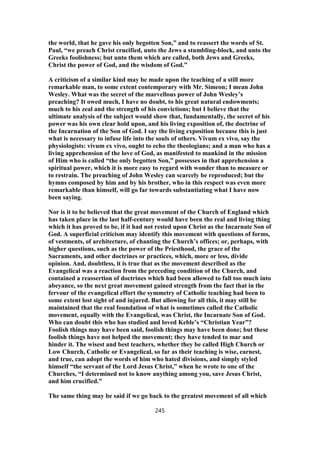
![can be found in our English Church history, namely, the Reformation of the
sixteenth century. A variety of causes, as we all know, conspired at that time to
bring about a great religious change; a variety of smaller causes conspired to
determine the precise form which the change should assume in this country:
general dissatisfaction with the then condition of things, long-standing jealousy
of the Pope of Rome, the increase of learning, the translation of the Scriptures,
the growth of the seed which John Wyclif had sown, combined with political and
local causes to overthrow the Church as it then was. The traces of destruction
are clear enough; but what were the forces of conservation and growth? Surely
these were to be found in the fact that the wisest and best amongst the Reformers
held fast to the doctrine of Jesus Christ as the Son of God. Truly the Church
needed a strong foundation in those terrible days; the storms raged and the
winds beat upon the house; and it fell not, because it was founded upon a rock,
and “that rock was Christ.” In this supreme crisis of the Church’s history she
needed no new doctrine, no new faith, no new machinery, but only a clearing
away of all that tended to obscure the visage of her Lord and towards
substituting the legends and inventions of man for the faith once delivered to the
saints.
And if I wished for another illustration of the point which I am now pressing, I
would seek it in a very different quarter, namely, in that wonderful book known
by the title De Imitatione Christi. The title, as we know, is taken from one
particular portion of the volume; but did you ever observe what an absolute
misnomer it is as applied to the whole? To speak of imitating another implies
that imitation is possible; a child imitates its father or its mother, or a man sees
his neighbour do a charitable act and he follows his example, or the pupil
imitates his tutor, hoping to become like him; and so when you read the history
of Christ being kind and gentle, holy and devout and good; when you read of His
being constant in prayer, or of His indignation against hypocrisy, and His
compassion for the ignorant and fallen, or when you are told that when He was
reviled He reviled not again, when He suffered He threatened not, and so forth
throughout the whole human side of His history, you feel not only that you can
try at least to follow His example, but that you ought and would like to do it; and
if this were all, still more if Jesus Christ were such as Renan and others would
represent Him to have been, you feel that there is at least nothing impossible in
an imitation of Christ; but the Christ of Thomas à Kempis is very different from
our modern pictures of Jesus of Nazareth; it is not only Christ the man, to be
followed as an example, as all good men should be, but Christ the Son of God,
who in the plenitude of His love and condescension holds converse with the
human soul. And because this is so, the title of the book may be called a
misnomer; but also because this is so, therefore the book has its marvellous and
unequalled power of influence and magical fascination; it is the record of the
possible communion of the soul with God through Christ, which is unspeakably
precious, just because Christ is infinitely higher than humanity, and is worthy of
worship, but incapable of imitation.1 [Note: Bishop Harvey Goodwin, in The
Cambridge Review, Nov. 24, 1886.]
4. Must we not say more and go further than this? Must we not say that in giving
us Jesus Christ, God gave us Himself, just so far as we could receive this
246](https://image.slidesharecdn.com/john3commentary-151103172742-lva1-app6891/85/John-3-commentary-246-320.jpg)
![culminating gift? Is it not the fact that in Him we have the Way to God, the
Truth about God, and the Life of God lived out among men? Is it not He who has
made God real for us, by interpreting Godhead in terms of Fatherhood, so that
henceforth we know God and have seen Him? He brings men to God as Teacher
and Leader; but, even more wonderful, He brings God to men by visibly
manifesting the Divine within Himself. In the face of so great a proof we can no
longer doubt the love which prompted it. Men had thought of the Eternal as of
some mighty Potentate, irresponsible in power, jealous of His own dignity,
exacting obedience and praise and sacrifices; but in Christ they saw God willing
to seek and to save, ready even, incredible though it might seem, to suffer and
agonize for their sakes, loving men even in their disobedience and wilfulness, and
giving Himself for them. “God so loved the world that he gave” Himself to us in
His own dear Son.
Men readily concede that God gave us Jesus, but they do not seem to see with
equal clearness that God gave Himself in Jesus, and that He still continues to
give Himself in everything worthy of Jesus that is making the world better,
nobler, kinder. I remember reading during the South African war that the
greatest deaths were those of the mothers who died in their sons, the greatest
gifts were those of the mothers who gave their sons, the keenest anguish was that
of the mothers who suffered in their sons for the sake of England. Here is a
figure of the word of God for the world.1 [Note: R. J. Campbell.]
SIMEON, "THE LOVE OF GOD IN GIVING HIS SON FOR MAN
John 3:16. For God so loved the world, that he gave his only-begotten Son, that
whosoever believeth in him should not perish, but have everlasting life.
THE doctrine of our reconciliation with God through the death of his Son, is
calculated to impress our minds with a deep sense of the love of Christ in
undertaking for us; but, if not cautiously stated, it may give us very erroneous
conceptions respecting the Father. If, for instance, we imagine that the Father
needed the mediation of his Son to render him propitious, then we must ascribe
all the glory of our salvation to the Son, and consider the Father merely as
acquiescing in the Son’s wishes, and shewing mercy to us for his sake. But the
whole plan of our salvation originated with the Father: the very gift of a Saviour
was the fruit of the Father’s love; and therefore, in contemplating the wonders of
Redemption, we must trace them to their proper source, the love of God the
Father.
To this view of things we are led by the text; in elucidating which, we shall not
form any particular arrangement, but simply take the several expressions
contained in it, and use them as so many mirrors to reflect light upon one central
point, the love of God the Father in sending his only-begotten Son to die for us.
Consider then, first, the Giver—
[If man confer a benefit upon his fellow-creature, we are not surprised; because
there is no man so elevated, but he may need the assistance of his inferiors; nor is
247](https://image.slidesharecdn.com/john3commentary-151103172742-lva1-app6891/85/John-3-commentary-247-320.jpg)
![there any man so depressed, but he may, at some period or other, have it in his
power to requite a kindness. But “God” is totally independent of us; “our
goodness extendeth not to him [Note: Psalms 16:2.];” “it is no profit to him that
we are righteous [Note: Job 22:2-3.]:” he would have been equally happy and
glorious, though no creature had ever been formed; and he would remain so, if
every creature in the universe were annihilated. How wonderful, then, was it,
that he should condescend to look on us; yea, that he should take such an interest
in our affairs, as to supply, at a most incalculable price, our pressing necessities!
Even in this first view of his love we are lost with wonder.]
But our admiration will be greatly increased, if we reflect upon the gift—
[It was his Son, “his only-begotten Son,” whom he vouchsafed to give. It was not
a creature; no, not the first of all created beings, but his co-equal, co-eternal Son
[Note: Micah 5:2.]; who from eternity had been in his bosom [Note: John 1:13.],
and “daily his delight [Note: Proverbs 8:22-30.].” A less gift than that would not
have sufficed for our relief: and a greater, God himself was not able to bestow. In
comparison of this, ten thousand angels would have been as nothing; yea, all the
hosts of heaven would not have been more than a grain of sand is in comparison
of the universe. Yet God, seeing our wants, “sent his own Son to be a propitiation
for our sins [Note: 1 John 4:9-10.].” What manner of love was this! How
“incomprehensible are its breadth and length, and depth and height [Note: 1
John 4:9-10. with Ephesians 3:18-19.]!”]
Additional lustre will be reflected on this mystery, if we consider the manner in
which he bestowed this gift—
[He waited not to be solicited: indeed no creature could have asked for such a
favour: the thought could not have entered into the mind of any created
intelligence; nor, if it had occurred, could he have presumed to utter it. But God
needed no suggestion from his creatures: his love prevented their requests [Note:
God, instead of following our first parents with denunciations of wrath, gave,
unsolicited, that promise, which was the foundation of hope to them and all their
posterity. Genesis 3:15.]; it even provided for their wants before those wants
existed, yea, before the creatures themselves had any being. He himself is love
[Note: 1 John 4:16.]; and the exercise of mercy is his delight [Note: Micah 7:18.].
He neither had, nor could have, any inducement from without: all his motives
were found within his own bosom: the displaying of his own unbounded love was
a sufficient reason for his utmost exertions: he shewed mercy for mercy sake;
and “gave,” because it was the joy of his soul to give.]
But how will this stupendous love be heightened in our esteem, if we take into
consideration the persons on whom this gift was bestowed!
[It was not vouchsafed to angels, though angels needed it as much as we. This
was a mercy reserved for fallen man, even for “the world” that lieth in
wickedness [Note: Hebrews 2:16.]. To form an estimate of the world, let us look
around us, and see to what an awful extent iniquity abounds: or, if we would
have our judgment still more according to truth, let us look within our own
248](https://image.slidesharecdn.com/john3commentary-151103172742-lva1-app6891/85/John-3-commentary-248-320.jpg)
![hearts, and see what horrible abominations are harboured there. We know
nothing of others, but by their words and actions: but we have a juster criterion
within our own bosoms: we may search into our own thoughts and desires; we
may discern the base mixture that there is in all our motives and principles of
action: in short, we may see such “a world of iniquity” within us, as may well
constrain us to say, with David, “My heart sheweth me the wickedness of the
ungodly, that there is no fear of God before his eyes [Note: Psalms 36:1. Prayer-
book translation.]:” yes, in our own hearts there is an epitome of all the evil that
is in the world: and, if we know any thing of ourselves, we shall stand amazed
that God should look upon such a world as this, and give his only dear Son to
save those who so richly merited his hottest indignation.]
We cannot do justice to this subject, if we do not further notice God’s ultimate
design in bestowing this precious gift upon us—
[We must, but for this marvellous effort of divine love, have perished in our sins.
Having resembled the fallen angels in their sin, we must have resembled them
also in their misery. But “God would not that we should perish.”
Notwithstanding the greatness and universality of our guilt, he would not that we
should suffer according to our desert; and therefore he interposed for our
deliverance. But this was not all. He desired to restore us to our forfeited
inheritance, and to bring us to the possession of “everlasting life.” It was not
enough for him to save us from perishing; he must also renovate us after his own
image, and make us partakers of his own glory. What stupendous love was this!
That he should ever think of receiving such hateful creatures into his presence;
that he should lay a plan for the exalting of them to thrones and kingdoms in
heaven; and that he should even give his only-begotten Son out of his bosom to
effect it! How infinitely does this surpass all the comprehension of men or
angels!]
The condition which he has imposed for our participation of these benefits, yet
further illustrates and magnifies his love—
[Suppose God had said, “Find me fifty righteous, or forty, or thirty, or twenty, or
only ten, and for their sakes I will pardon and save all the rest [Note: Genesis
18:24-32.]:” we must have perished, because among the whole human, race there
is “not one righteous, no, not one [Note: Romans 3:10.].”
Suppose that, instead of this, he had said, “I will give my Son to die for your past
offences, and will bring you back to a state of probation; whereby, if you fall not
again from your righteousness, you shall be saved:” the offer had been exceeding
kind and gracious; but we should not long have reaped any solid advantage from
it: we should soon have broken the covenant again, and been involved in the
same misery as before.
Suppose God had said, “I foresee that a renewal of your former covenant would
be to no purpose; and therefore my Son shall work out a righteousness for you;
and I require nothing of you, but to add to that a righteousness of your own, that
the two righteousnesses together may form a joint ground of your acceptance
249](https://image.slidesharecdn.com/john3commentary-151103172742-lva1-app6891/85/John-3-commentary-249-320.jpg)
![with me:” alas! we should have been in as deplorable a state as ever; for we
never have done, nor ever can do, one single act, which, if weighed in the balance
of the sanctuary, will not be found wanting.
But suppose God yet further to lower his demands, and to say, “I will give you a
complete salvation through the blood and righteousness of my dear Son; and I
will require nothing of you, but only to render yourselves worthy of it;” still had
our state been altogether hopeless; for we can no more render ourselves worthy
of such a mercy, that we can create a world.
This was well known to God; and therefore he proposed none of these things: he
requires only that we should believe in his Son, and accept freely what he so
freely offers. It is true, that, if even this depended on ourselves, we should perish:
because without the grace of God we cannot exercise saving faith [Note:
Philippians 1:29.]: but still this is the condition, which alone is suited to our
helpless state; because it implies a total renunciation of all merit or strength in
ourselves, and leads us to Christ, that we may find our all in him. O how does
this enhance the love of God! And in what bright colours does that love appear,
when viewed in the light which so many mirrors reflect upon it!]
If any thing can add to the lustre with which his love already shines, it is the
extent in which the offers of these benefits are made—
[There is not a human being upon earth, who shall not be a partaker of all these
benefits, if only he believe in Christ. There is no limitation, no exception: God
gave his Son, that “whosoever” believeth in him should not perish. Past sins,
however numerous or heinous, are no bar to our acceptance with God, if only we
accept his mercy on the terms on which it is offered. This is the uniform
testimony of Holy Writ [Note: Isaiah 45:22; Isaiah 55:1 and Revelation 22:17 and
John 6:37.] — — — O let us magnify God for his mercy; and be telling of the
wonders of his love from day to day!]
Infer—
1. How aggravated must be the condemnation of them that reject the
Gospel!
[Our Lord says, “This is the condemnation, that light is come into the world, but
men loved darkness rather than light, because their deeds were evil [Note: John
3:19.].” Let this sink down into our ears: for, if such love cannot melt us into
contrition, and such goodness bring us to repentance, we may well expect a most
accumulated weight of vengeance at the hands of an offended God.]
2. How groundless are the fears of many who embrace the truth!
[Many sincere Christians are troubled in mind; some on account of their
temporal wants, and others on account of their spiritual necessities. But “if God
has delivered up his own Son for us, will he not with him also freely give us all
things [Note: Romans 8:32.]?” And “if, when we were enemies, we were
250](https://image.slidesharecdn.com/john3commentary-151103172742-lva1-app6891/85/John-3-commentary-250-320.jpg)
![reconciled to God by the death of his Son, much more, being reconciled, shall we
be saved by his life [Note: Romans 5:10.].” These are unanswerable arguments;
and they should compose our minds under trials, of whatever kind.]
3. How deeply should we all be affected by the love of God!
[Pungent indeed is that question, “What could I have done more for my
vineyard, that I have not done [Note: Isaiah 5:4.]?” The more we consider how
God has loved the world, the more we shall see, that he has indeed done all for us
that he could do, consistently with our free agency, and his own honour. And
when he has so loved the world, are we at liberty to forget him? Does such love
call for no return? or are we to requite it only by increased impiety? O let every
one of us say, “What shall I render to the Lord?” And let his love to us constrain
us to devote ourselves unreservedly to him.]
BIBLICAL ILLUSTRATOR, "God so loved the world, that He gave His-only
begotten Son
The gospel in brief
Pliny declares that Cicero once saw the Iliad of Homer written in so small a character
that it could be contained in a nutshell.
Peter Bales, a celebrated caligrapher, in the days of Queen Elizabeth, wrote the whole
Bible so that it was shut up in a common walnut as its casket. In these days of
advanced mechanism even greater marvels in miniature have been achieved, but
never has so much meaning been compressed into so small a space as in that famous
little word “So,” in the text. (C. H. Spurgeon.)
The gospel
The text gives a deeper insight into the Divine character than the heavens which
declare God’s glory and than those tender mercies of His providence which are over
all His works.
I. THE DIVINE LOVE.
1. Its marvellousness. The world is
(1) not the wondrously perfect material universe;
(2) not the world of unfallen angels;
(3) not a world of creatures such as Adam was when pronounced “very good.”
Then had there been no wonder. But
(4) the world the whole of which lieth in wickedness.
2. Its universality.
(1) Salvation is as common as sunshine, yet if a man will close his eyes the
sun is of no use to him. So while salvation is for all many put it away from
them.
(2) It was originally meant to be so. The Jews denied it because “they erred,
not knowing the Scripture.” The promise to Abraham and renewed to Isaac
and repeated by Isaiah was a universal one.
251](https://image.slidesharecdn.com/john3commentary-151103172742-lva1-app6891/85/John-3-commentary-251-320.jpg)
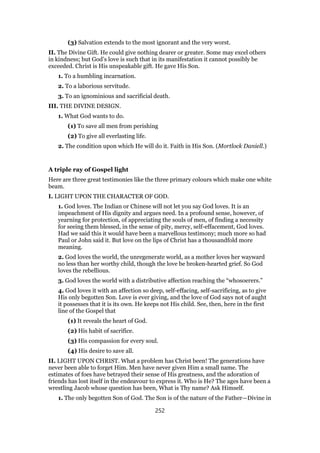
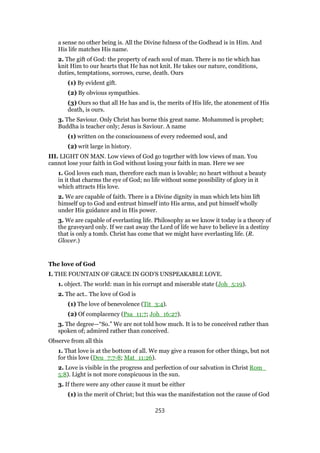
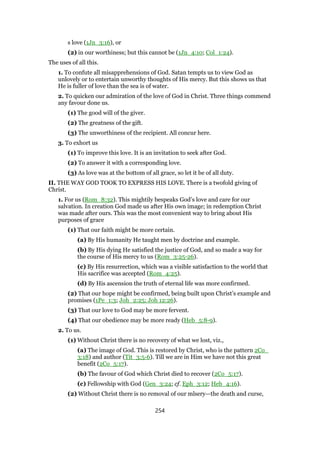
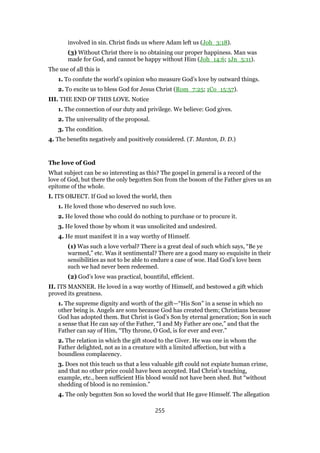
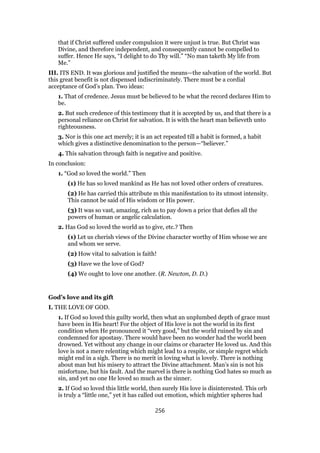
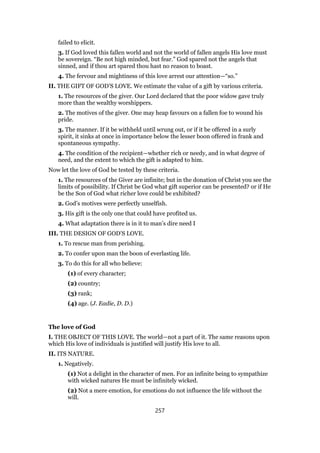
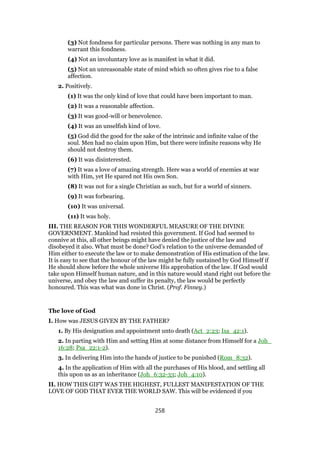
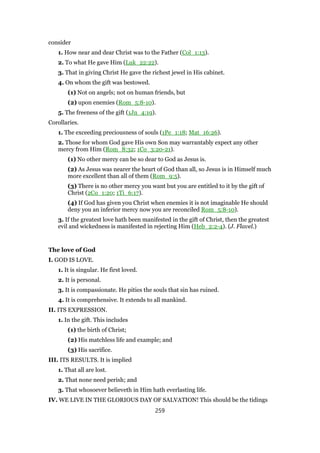
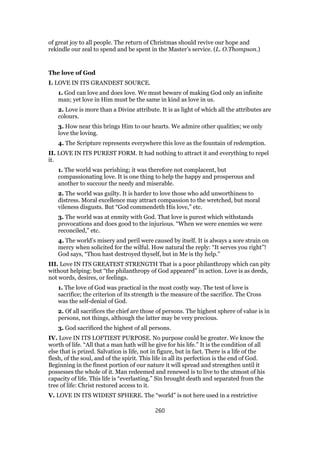
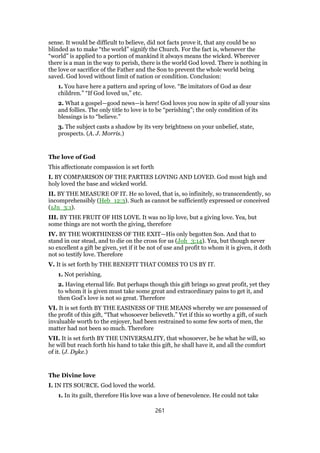
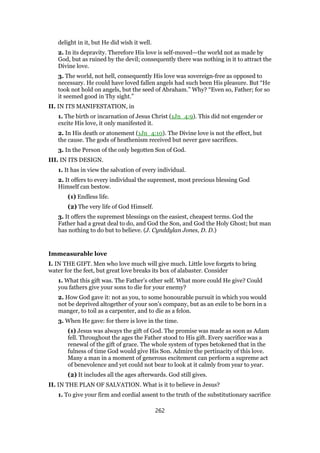
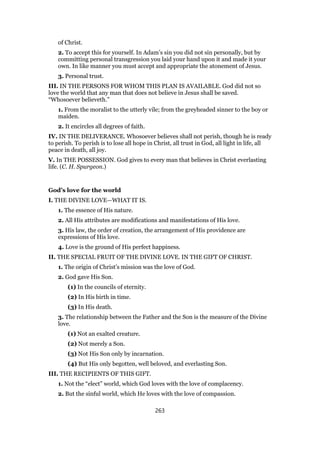
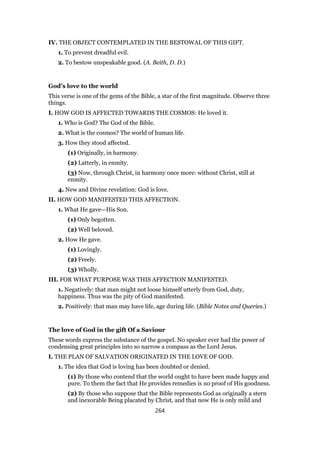
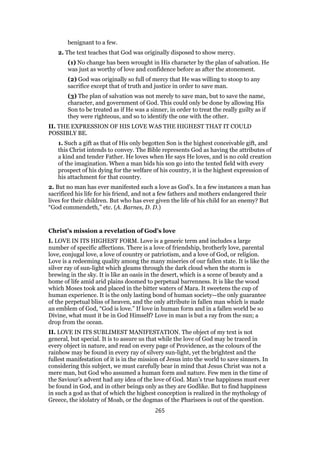
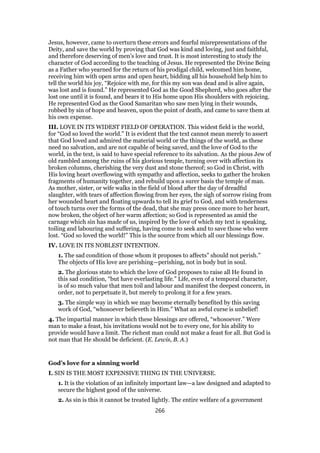
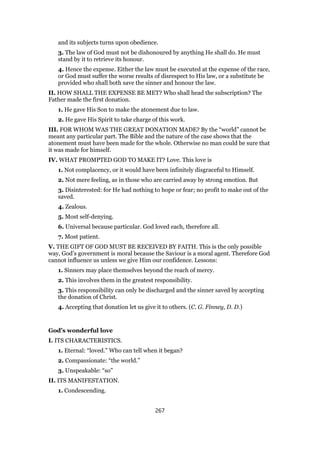
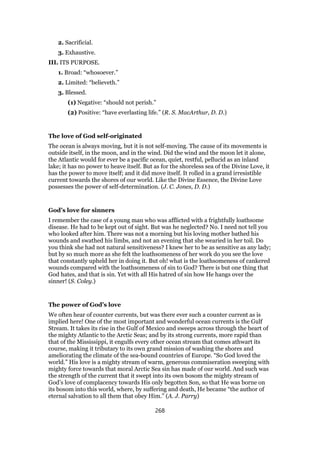
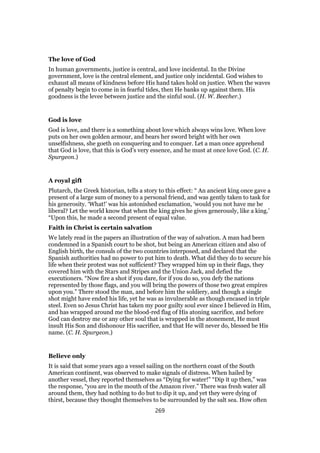
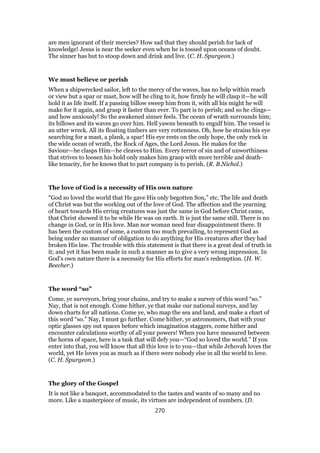
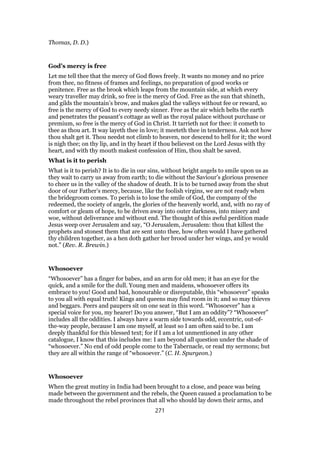
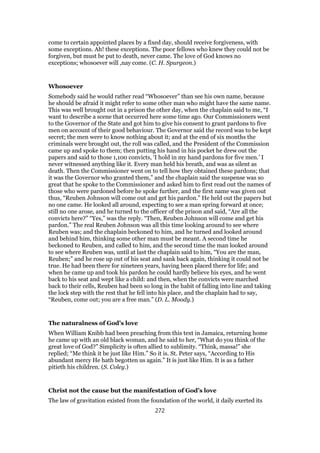
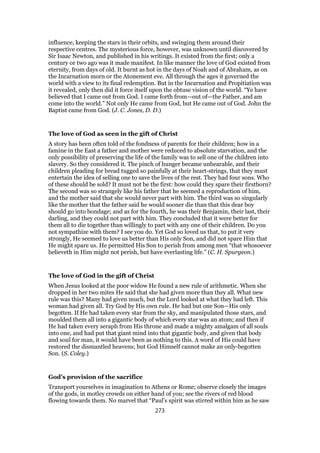
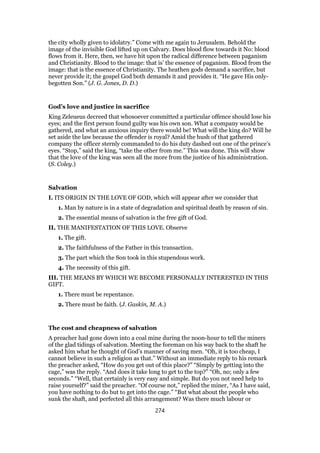
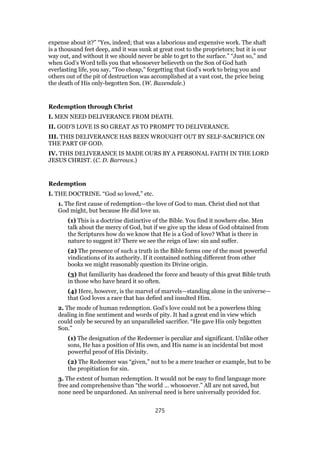
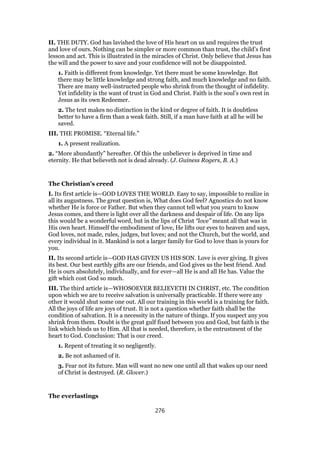
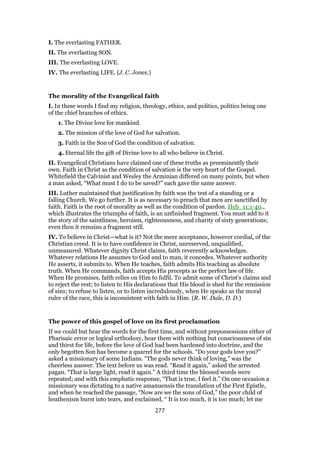
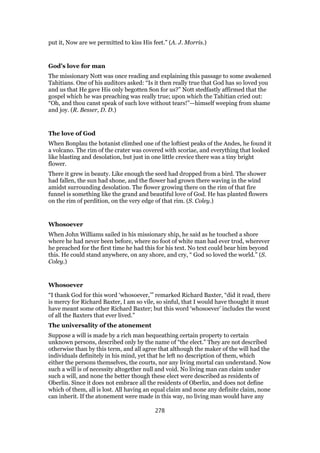
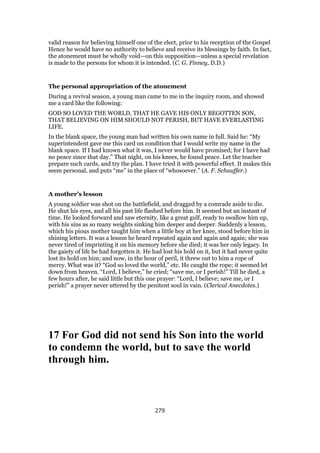
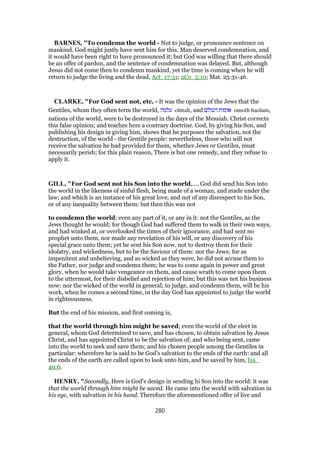
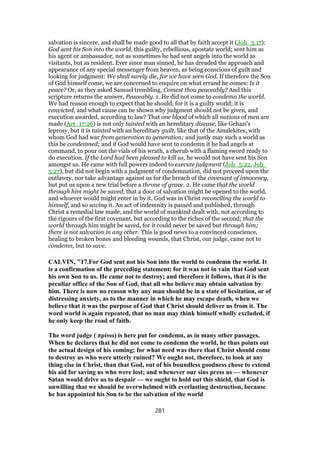
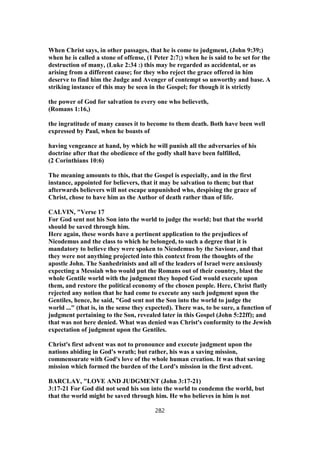
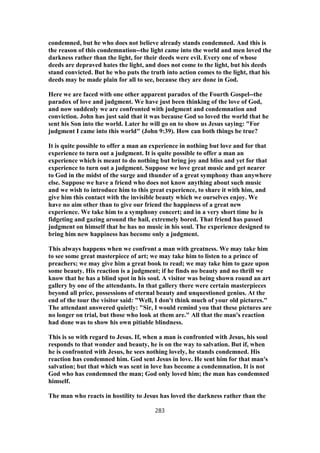
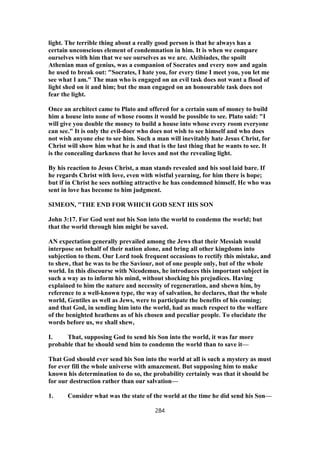
![[Had he seen the greater part of mankind lamenting their fall, wishing earnestly
that some way could be devised for their recovery, and struggling, but with
unsuccessful efforts, to get free from sin, we might have supposed that God
would exercise mercy towards us, and open a way for our restoration through
the sacrifice of his Son. But when the whole mass of mankind were up in arms
against him, when not one of the whole human race (except a few whose hearts
he himself had touched) desired reconciliation with him; yea, when all were
utterly averse from it, and desired nothing so much as to live in sin with
impunity, and wished for no better heaven than the unrestrained indulgence of
their lusts; for what end could God send his Son, but to execute upon them the
vengeance they deserved?]
2. Consider for what end God had before sent messengers from heaven—
[God had on some remarkable occasions commissioned angels to perform his
will: and though, when sent to some highly-favoured individuals, they were
messengers of mercy, yet, when sent to the avowed enemies of God, they were,
for the most part, ministers of wrath to execute the most signal vengeance. Who
can contemplate Sodom and the cities of the plain; who can call to mind the
Egyptian first-born; who can survey one hundred and eighty-five thousand
soldiers lying dead in the Assyrian camp; and not tremble at the thought of a
messenger being sent from heaven? Suppose then we should hear that God was
about to send his own Son from heaven to execute his will with respect to the
whole world, and especially such a world as this; what would any one imagine,
but that, as it was not a particular city or nation that God was about to punish,
but a whole world, he had determined to employ his own Son; and that the
judgments he was about to inflict, would be great in proportion to the power and
dignity of the executioner? As for conceiving the idea that he should send his Son
to save the world, it would not so much as enter into the mind of any created
being.]
3. Consider that God certainly foreknew the way in which the world would
treat his Son—
[If God had not certainly foreknown all future events, he might perhaps have
reasoned thus: ‘I have sent to that wretched world my servants the prophets, and
instead of attending to them they have persecuted them even unto death: but if I
should send them my Son, surely they would reverence him; they would not dare
to lift up a finger against him; they would be so struck with wonder at my
condescension and love, that they would return instantly to their allegiance.
Rather therefore than they should perish, I will send them my Son to save them.’
But God knew that instead of reverencing his Son, they would no sooner see him,
than they would exclaim, “This is the heir; come let us kill him, that the
inheritance may be ours.” He knew full well that, however manifest the
credentials of his Son, and however indisputable the evidences of his divine
mission, they would not believe in him, but would cast him out of the vineyard
and slay him. What then must we suppose God would say on such an occasion?
Surely he would speak to this effect: ‘If I could hope that they would reverence
285](https://image.slidesharecdn.com/john3commentary-151103172742-lva1-app6891/85/John-3-commentary-285-320.jpg)
![my Son, I would overlook all the injuries done to my prophets, and would even
send my Son for their salvation: but I know they would all thirst for his blood;
they would pluck me from my throne if they were able; and, if I should put my
Son into their power, they would load him with all manner of indignities, and
put him to the most ignominious death: shall I then, foreseeing these things as I
do, put him into their power? No: that were unworthy of my majesty, and
degrading to my Son. I may possibly send my Son; but, if I do, it shall not be to
save the world, but to condemn them according to their desert.’]
These considerations fully evince the improbability that God should ever use the
mediation of his Son in a way of mercy towards us. Yet we must add,
II. That, notwithstanding it was so improbable, God did really send his Son,
not to condemn, but to save the world—
The frequency with which we hear of this stupendous mystery, prevents the
surprise which the declaration of it must otherwise excite. But, whatever the
ignorance of scoffers, and the pride of infidels may suggest, be it known to all,
that God did send his Son,
1. To expiate sin—
[God knew that it was impossible for man to atone for sin — — — Yet it was
also impossible that sin could be forgiven, unless an adequate atonement were
offered to the Divine Majesty — — — What was to be done? The angels, even if
they were willing, were not able to undertake our cause. There was but one, even
in heaven, that was competent to the mighty task of appeasing incensed Majesty,
and of satisfying offended justice: there was none but Jesus, the best-beloved of
the Father, who from eternity had lain in his bosom. And would the Father give
him? Yes; “He spared not his own Son, but delivered him up for us all.” “He
prepared him a body,” and “sent him to be a propitiation, not for our sins only,
but also for the sins of the whole world” — — — What amazing love! Eternity
will not suffice to explore and celebrate this stupendous mystery.]
2. To work out a righteousness for us—
[Mankind were as unable to provide for themselves a righteousness wherein they
might stand before God, as they were to make an atonement for their past
offences — — — But, behold, God would not leave us destitute; he gave his Son
to fulfil the law which we had broken, and, “to bring in an everlasting
righteousness,” “which should be unto all and upon all them that
believe” — — — The name given him on this very account is, “The Lord our
Righteousness.” Clothed in his unspotted robe, the vilest of returning prodigals
may stand perfect and complete in the presence of their God — — — Every one
of them may say, “In the Lord have I righteousness and strength.”]
3. To exalt us to glory—
[It was not only to begin, but to carry on and perfect our salvation, that the
286](https://image.slidesharecdn.com/john3commentary-151103172742-lva1-app6891/85/John-3-commentary-286-320.jpg)
![Father sent his Son into the world. He is to be both “the author and the finisher
of our faith” — — — Having delivered our souls from the guilt of sin, and from
the powers of darkness, he will raise up our bodies also from the grave, and exalt
us to sit upon his throne for evermore — — — Never will he cease from his
work, till he has fully and finally accomplished it on behalf of his people — — —
How wonderful is this! Surely it almost exceeds belief: that, instead of
condemning the world, God should send his Son to save it, to save it by laying
down his own life a ransom for us, and by managing all the concerns of every
one of his elect till he shall have finally established them in the possession of their
heavenly inheritance! Hear, O heavens, and be astonished, O earth: yea, let all
the choirs of heaven make it the everlasting subject of their highest
praises — — —]
Address—
1. Those who are regardless of their own salvation—
[Alas! how little effect do the wonders of redemption produce on the world at
large! But what an aggravation of their guilt will it be to have poured contempt
upon the Son of God! Surely God’s greatest mercy will prove their heaviest
curse. The very devils will have more to say on their own behalf than they. Satan
himself may say, “I never had salvation offered me; I never sinned against
redeeming love.” But careless sinners are daily “trampling under foot the Son of
God,” who lived and died to save them. O lay this to heart, and seek an interest
in him who alone can deliver you from the wrath to come.]
2. Those who are ready to doubt whether they ever can be saved—
[Many such there are in the Church of Christ — — — But did God send his Son
to execute a work which he was not able to perform? or has Jesus discovered any
backwardness to fulfil his engagements? — — — Let not any be afraid: for if a
whole world is to be saved by him, he cannot but have a sufficiency to supply all
our wants, provided we commit ourselves entirely to him — — —]
3. Those who are enjoying salvation—
[While you are reaping the blessed fruits of the Father’s love, surely you will
often say, what shall I render to the Lord? If he gave up his dear Son for my
salvation, shall not I give up a bosom lust for his glory? — — — Think how
much you are indebted to him; and endeavour to glorify him with your body and
your spirit which are his.]
LIGHTFOOT, "17. For God sent not his Son into the world to condemn the
world; but that the world through him might be saved.
[Not to condemn the world.] In what sense (beside that which is most common
and proper) the Jewish schools use the word the world, we may see from these
and such like instances:
287](https://image.slidesharecdn.com/john3commentary-151103172742-lva1-app6891/85/John-3-commentary-287-320.jpg)
![I. The whole world hath forsaken the Misnas, and followed the Gemara. Where
something may be noted in the story as well as in the grammar of it.
So John 12:19: Behold the world is gone after him. We very often meet with All
the world confesseth, &c. and The whole world doth not dissent, &c. By which
kind of phrase, both amongst them and all other languages, is meant a very great
number or multitude.
II. When they distinguish, as frequently they do, betwixt the poor of their own
city, and the poor of the world; it is easy to discern, that by the poor of the world
are meant those poor that come from any other parts.
III. "R. Ulla requires not only that every great man should be worthy of belief,
but that the man of the world should be so too." It is easy to conceive, that by the
man of the world is meant any person, of any kind or degree.
IV. But it is principally worthy our observation, that they distinguish the whole
world into Israel, and the nations of the world; the Israelites and the Gentiles.
This distinction, by which they call the Gentiles the nations of the world, occurs
almost in every leaf, so that I need not bring instances of this nature. Compare
Luke 12:30 with Matthew 6:32; and that may suffice.
V. They further teach us, that the nations of the world are not only not to be
redeemed, but to be wasted, destroyed, and trodden underfoot. "This seems to
me to be the sense: the rod of the exactor shall not depart from Judah, until his
Son shall come to whom belongs the subduing and breaking of the people; for he
shall vanquish them all with the edge of his sword." So saith Rambam upon that
passage in Genesis 49.
"'The morning cometh, and also the night,' Isaiah 21:12. It will be the morning
to Israel [when the Messiah shall come]; but it will be night to the nations of the
world."
"R. Abin saith, That the Holy Blessed God will make the elders of Israel sit down
in a semicircle, himself sitting president, as the father of the Sanhedrim; and
shall judge the nations of the world."
"Then comes the thrashing; the straw they throw into the fire, the chaff into the
wind; but the wheat they keep upon the floor: so the nations of the world shall be
as the burning of a furnace; but Israel alone shall be preserved."
I could be endless in passages of this nature out of these authors: but that which
is very observable in all of them is this; That all those curses and dreadful
judgments which God in his holy writ threatens against wicked men, they post it
off wholly from themselves and their own nation, as if not at all belonging to
them, devolving all upon the Gentiles and the nations of the world. So that it was
not without great reason that the apostle asserteth, Romans 3:19, "Whatsoever
things the law saith, it saith to them which are under the law." Which yet they
will by no means endure.
288](https://image.slidesharecdn.com/john3commentary-151103172742-lva1-app6891/85/John-3-commentary-288-320.jpg)
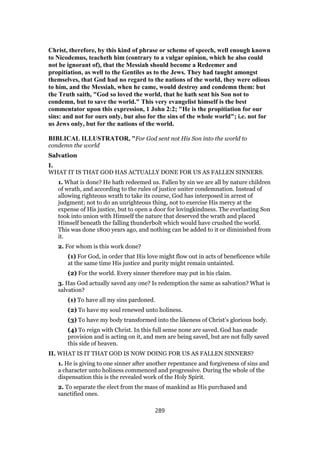
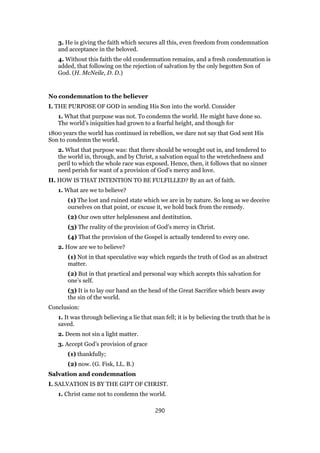
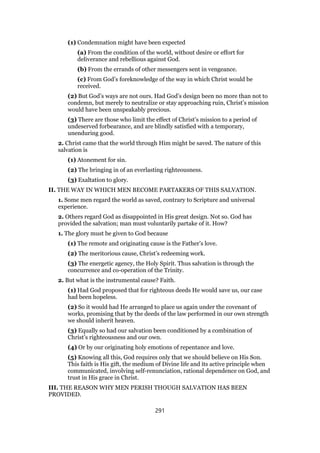
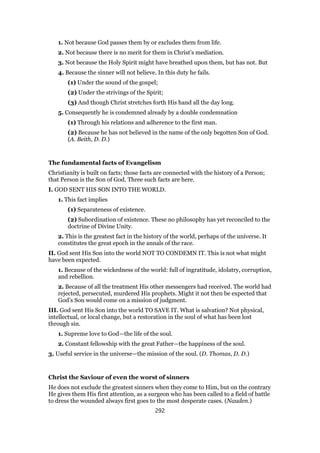
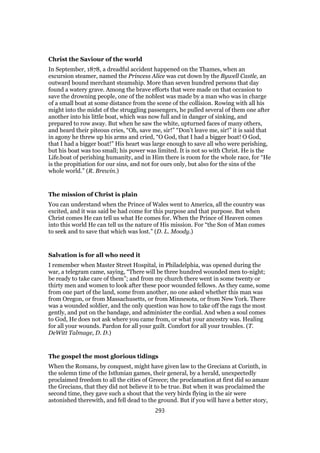
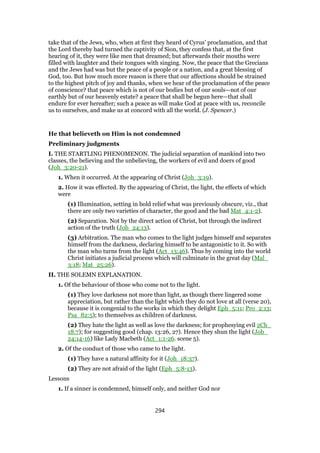
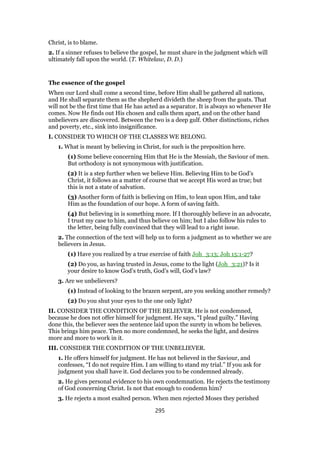
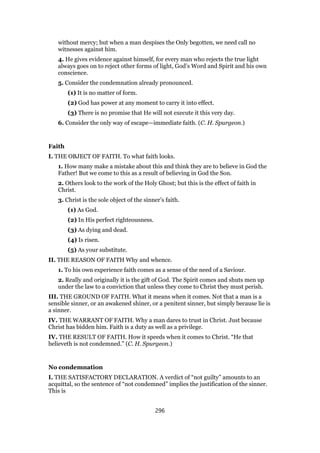
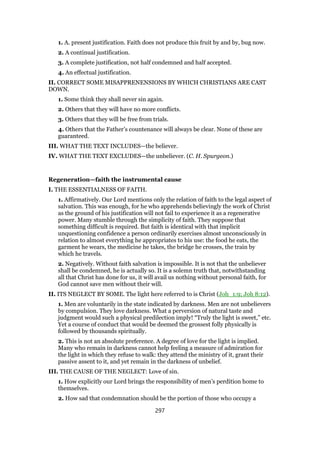
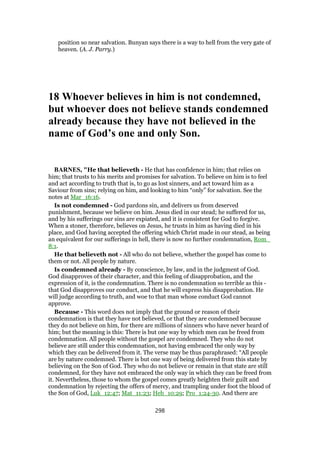
![thousands going to eternity under this “double” condemnation:
1. For positive, open sin; and,
2. For rejecting God’s mercy, and despising the gospel of his Son. This it is which
will make the doom of sinners in Christian lands so terrible.
CLARKE, "He that believeth - As stated before on Joh_3:16.
Is not condemned - For past sin, that being forgiven on his believing in Christ.
But he that believeth not - When the Gospel is preached to him, and the way of
salvation made plain.
Is condemned already - Continues under the condemnation which Divine
justice has passed upon all sinners; and has this superadded, He hath not believed on
the name of the only begotten Son of God, and therefore is guilty of the grossest
insult to the Divine majesty, in neglecting, slighting, and despising the salvation
which the infinite mercy of God had provided for him.
GILL, "He that believeth on him is not condemned,.... Whether Jew or
Gentile, because a believer is openly in Christ; and there is no condemnation to those
that are in him: and though the sentence of death passed upon all in Adam, and
judgment came upon all men to condemnation in him; yet this sentence being
executed on Christ, the surety of his people, who has been condemned to death, and
has suffered it in their stead, his death is a security to them from all condemnation:
and they are delivered by him from the curse and condemnation of the law: and
having in conversion openly passed from death to life, they shall never enter into
condemnation; and this is the happy case of every one that believes in Christ:
but he that believeth not is condemned already. The Persic version renders it,
"from the beginning"; he remains under the sentence of condemnation passed in
Adam upon him; the law accuses him, and pronounces him guilty before God; he is
under the curse of it, and it is a ministration of condemnation and death to him; nor
has he any thing to secure him from its charge, curse, and condemnation: this must
be understood of one that is a final unbeliever, or that lives, and dies, in a state of
impenitence, and unbelief:
because he hath not believed in the name of the only begotten Son of
God; whom God has sent to be the Saviour of lost sinners, and to deliver them from
wrath to come; and there is no other name but his, whereby men can be saved; so
that such that do not believe in him, must be damned.
HENRY, "[3.] From all this is inferred the happiness of true believers: He that
believeth on him is not condemned, Joh_3:18. Though he has been a sinner, a great
sinner, and stands convicted (habes confilentem reum - by his own confession), yet,
upon his believing, process is stayed, judgment is arrested, and he is not condemned.
This denotes more than a reprieve; he is not condemned, that is, he is acquitted; he
stand upon his deliverance (as we say), and if he be not condemned he is discharged;
ou krinetai - he is not judged, not dealt with in strict justice, according to the desert of
his sins. He is accused, and he cannot plead not guilty to the indictment, but he can
plead in bar, can plead a noli prosequi upon the indictment, as blessed Paul does,
Who is he that condemns? It is Christ that died. He is afflicted, chastened of God,
299](https://image.slidesharecdn.com/john3commentary-151103172742-lva1-app6891/85/John-3-commentary-299-320.jpg)
![persecuted by the world; but he is not condemned. The cross perhaps lies heavy upon
him, but he is saved from the curse: condemned by the world, it may be, but not
condemned with the world, Rom_8:1; 1Co_11:32.
4. Christ, in the close, discourses concerning the deplorable condition of those that
persist in unbelief and wilful ignorance, Joh_3:18-21.
(1.) Read here the doom of those that will not believe in Christ: they are
condemned already. Observe, [1.] How great the sin of unbelievers is; it is
aggravated from the dignity of the person they slight; they believe not in the name of
the only-begotten Son of God, who is infinitely true, and deserves to be believed,
infinitely good, and deserves to be embraced. God sent one to save us that was
dearest to himself; and shall not he be dearest to us? Shall we not believe on his
name who has a name above every name? [2.] How great the misery of unbelievers
is: they are condemned already; which bespeaks, First, A certain condemnation.
They are as sure to be condemned in the judgment of the great day as if they were
condemned already. Secondly, A present condemnation. The curse has already taken
hold of them; the wrath of God now fastens upon them. They are condemned already,
for their own hearts condemn them. Thirdly, A condemnation grounded upon their
former guilt: He is condemned already, for he lies open to the law for all his sins; the
obligation of the law is in full force, power, and virtue, against him, because he is not
by faith interested in the gospel defeasance; he is condemned already, because he
has not believed. Unbelief may truly be called the great damning sin, because it
leaves us under the guilt of all our other sins; it is a sin against the remedy, against
our appeal.
JAMIESON, "is not condemned — Having, immediately on his believing,
“passed from death unto life” (Joh_5:24).
condemned already — Rejecting the one way of deliverance from that
“condemnation” which God gave His Son to remove, and so willfully remaining
condemned.
SBC, 'In this text unbelief in Christ is represented as a positive crime—a crime with
which, in point of enormity, no other form of human sinfulness can be compared—a
crime which not only fastens upon its subject the guilt, and binds him over to the
penalty of all his other sins, but which is itself the fullest and most striking
development of enmity against God and opposition to His government which can
possibly be presented.
I. Note the new circumstances and position in which the Gospel of Christ places
every one of its subjects. We are here upon trial for an eternal world. Pardon is
offered to us as a free gift from Him who has magnified the law and made it
honourable; and everything now turns upon simple faith in Jesus Christ, upon an
accordance with God’s plan of forgiveness, a cordial acquiescence in the principles
upon which that forgiveness is offered. Now the language addressed to us is not "He
that doeth these things shall live by them," but "He that believeth shall be saved."
II. It goes not a little way to aggravate the guilt of the unbeliever, that God has been
pleased in His Gospel not only to state the plan through which He forgives sin, but to
show also the indispensable necessity of that plan as growing out of His justice as
God, and His uprightness as a moral governor. He tells us in language too plain to be
misunderstood, that He can save us in no other way than through faith in His Son.
The a sacrifice of Jesus Christ was a method of infinite wisdom to pay tribute of
justice, while it threw the mantle of mercy over the lost.
300](https://image.slidesharecdn.com/john3commentary-151103172742-lva1-app6891/85/John-3-commentary-300-320.jpg)
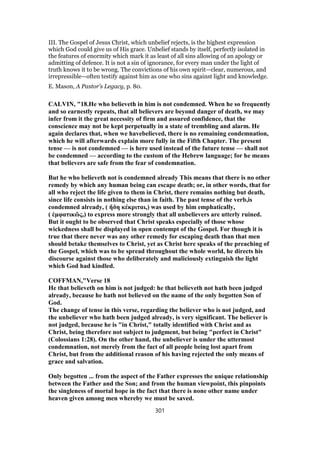
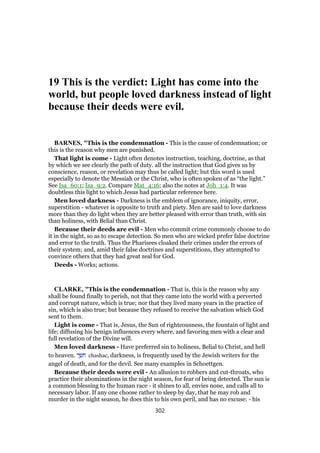
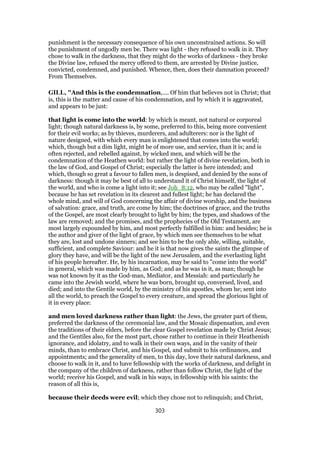
![his Gospel and ordinances are contrary to them; for the doctrine of the grace of God,
which has appeared, and shone out in great lustre, and splendour, in the world,
teaches men to deny ungodliness, and worldly lusts; and therefore it is hated, and
rejected, by men.
HENRY, "(2.) Read also the doom of those that would not so much as know him,
Joh_3:19. Many inquisitive people had knowledge of Christ and his doctrine and
miracles, but they were prejudiced against him, and would not believe in him, while
the generality were sottishly careless and stupid, and would not know him. And this
is the condemnation, the sin that ruined them, that light is come into the world, and
they loved darkness rather. Now here observe, [1.] That the gospel is light, and,
when the gospel came, light came into the world, Light is self-evidencing, so is the
gospel; it proves its own divine origin. Light is discovering, and truly the light is
sweet, and rejoices the heart. It is a light shining in a dark place, and a dark place
indeed the world would be without it. It is come into all the world (Col_1:6), and not
confined to one corner of it, as the Old Testament light was. [2.] It is the unspeakable
folly of the most of men that they loved darkness rather than light, rather than this
light. The Jews loved the dark shadows of their law, and the instructions of their
blind guides, rather than the doctrine of Christ. The Gentiles loved their
superstitious services of an unknown God, whom they ignorantly worshipped,
rather than the reasonable service which the gospel enjoins. Sinners that were
wedded to their lusts loved their ignorance and mistakes, which supported them in
their sins, rather than the truths of Christ, which would have parted them from their
sins. Man's apostasy began in an affectation of forbidden knowledge, but is kept up
by an affectation of forbidden ignorance. Wretched man is in love with his sickness,
in love with his slavery, and will not be made free, will not be made whole. [3.] The
true reason why men love darkness rather than light is because their deeds are evil.
They love darkness because they think it is an excuse for their evil deeds, and they
hate the light because it robs them of the good opinion they had of themselves, by
showing them their sinfulness and misery. Their case is sad, and, because they are
resolved that they will not mend it, they are resolved that they will not see it. [4.]
Wilful ignorance is so far from excusing sin that it will be found, at the great day, to
aggravate the condemnation: This is the condemnation, this is what ruins souls, that
they shut their eyes against the light, and will not so much as admit a parley with
Christ and his gospel; they set God so much at defiance that they desire not the
knowledge of his ways, Job_21:14. We must account in the judgment, not only for the
knowledge we had, and used not, but for the knowledge we might have had, and
would not; not only for the knowledge we sinned against, but for the knowledge we
sinned away. For the further illustration of this he shows (Joh_3:20, Joh_3:21) that
according as men's hearts and lives are good or bad, so they stand affected to the
light Christ has brought into the world.
JAMIESON, "this is the condemnation, etc. — emphatically so, revealing the
condemnation already existing, and sealing up under it those who will not be
delivered from it.
light is come into the world — in the Person of Him to whom Nicodemus was
listening.
loved darkness, etc. — This can only be known by the deliberate rejection of
Christ, but that does fearfully reveal it.
SBC, "God’s Condemnation of Men.
304](https://image.slidesharecdn.com/john3commentary-151103172742-lva1-app6891/85/John-3-commentary-304-320.jpg)
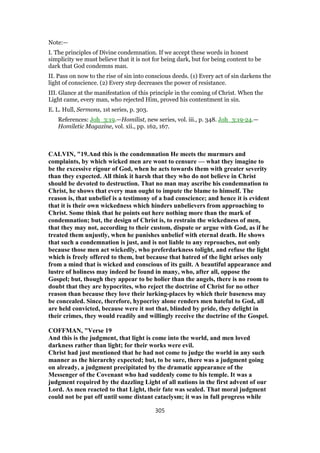
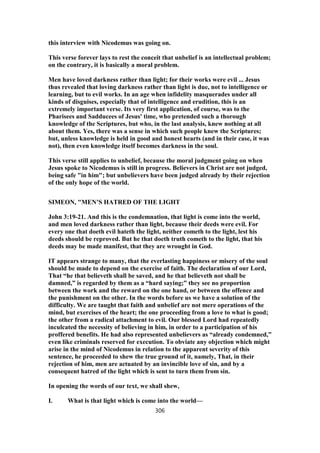
![Christ is called “The light of the world,” “The true light,” “The Day-star,” and
“The Sun of righteousness that arises with healing in his wings.” But,
It is the Gospel which is here said to have “come into the world”—
[The glad tidings of salvation were now published by Christ himself; and both
the manner in which that salvation was to be effected, and the manner in which
it was to be received, were clearly revealed. Our blessed Lord had in this very
discourse with Nicodemus declared, that “the Son of Man was to be lifted up
upon the cross, as the serpent had been in the wilderness,” in order that all who
were dying of the wounds of sin might look to him and be healed. He had
repeated again and again this important truth, on which the salvation of our
fallen race depends. This mystery had from eternity been hid in the bosom of the
Father; but now it was made fully manifest. This “light was now come into the
world.”]
The Gospel, in this view of it, is fitly designated under the metaphor of “light”—
[Light is that, without which no one thing can be discerned aright. And how
ignorant are we, till the light of the Gospel shines in our hearts! We know
nothing of ourselves, of God, of Christ, or of the way to heaven. We cannot even
appreciate the value of the soul, the importance of time, the emptiness of earthly
vanities. We may indeed give our assent to the statements which we hear made
upon these subjects; but we cannot have an experimental and abiding sense, even
of the most obvious truths, till our minds are enlightened by the Gospel of Christ.
Light causes all other things to be seen in their true colours. Thus does also the
Gospel: in setting forth the Son of God as dying for our sins, it shews us the
malignity of sin; the justice of God which required such an atonement for it; and,
above all, the wonderful love of God in giving us his only dear Son, in order that
we might have peace through the blood of his cross.
Light carries its own evidence along with it. Thus does also that glorious Gospel
of which we are speaking: it is so peculiarly suited to the necessities of man, and
at the same time so commensurate with his wants; it is so calculated to display
and magnify all the perfections of the Deity, and is in every respect so worthy of
its Divine Author; that it commends itself to us instantly as of heavenly origin,
the very masterpiece of Divine wisdom.]
One would imagine that such light should be universally welcomed: but since
this is not the case, we shall proceed to shew,
II. Whence it is that men reject it—
It is but too evident, that, as in former ages, so now also, men reject the light. But
whence does this arise? It is not because they have any sufficient reason to reject
it—
307](https://image.slidesharecdn.com/john3commentary-151103172742-lva1-app6891/85/John-3-commentary-307-320.jpg)
![[If there were any thing in the Gospel that rendered it unworthy of men’s
regard, they would have some excuse for rejecting it. But,
They cannot say that it is inapplicable in its nature.—We will appeal to the
world, and ask, What is there, that guilty and helpless sinners would desire?
Would they wish for a Saviour? Would they be glad that the whole work of
salvation should be committed into his hands? Would they be especially desirous
that nothing should be required of them, but to receive with gratitude, and
improve with diligence, what the Saviour offers them? In short, would they be
glad of a free and full salvation? This is precisely such a salvation as is provided
for them in the Gospel.
They cannot say that it is inadequate in its provisions.—If the Gospel brought
salvation to those only who were possessed of some amiable qualities, or to those
who had committed only a certain number of offences; if it made any limitation
or exception whatever in its offers of mercy; if it provided pardon, but not
strength, or grace to begin our course, but not grace to persevere; if, in short, it
omitted any one thing which any sinner in the universe could need, then some
persons might say, ‘It is not commensurate with my necessities.’ But we defy the
imagination of man to conceive any case which the Gospel cannot reach, or any
want which it cannot satisfy.
They cannot say that it is unreasonable in its demands.—It does indeed require
an unreserved surrender of ourselves to God: and on this account it appears to
many to be strict and severe. But let any one examine all its prohibitions and all
its commands, and he will find them all amounting in fact to these two; “Do
thyself no harm;” and, “Seek to be as happy as thy heart can wish.” If there be
any thing in the Gospel which bears a different aspect, it is owing entirely to our
ignorance of its real import. The more thoroughly the Gospel is understood, the
more worthy of acceptation will it invariably appear.]
The only true reason is, that they “hate the light”—
[Till men are truly converted to God, “their deeds are universally evil;” yea
“every imagination of the thoughts of their hearts is evil, only evil, continually.”
Now the Gospel is a light which shews their deeds in their proper colours.
It reproves their ways.—They have been “calling good evil, and evil good; and
putting bitter for sweet, and sweet for bitter.” In reference to these things, it
undeceives them. It declares plainly, that they who do such things as they have
done, and perhaps have accounted innocent, shall not inherit the kingdom of
God.
Ii mortifies their pride.—It not only shews them that they are obnoxious to the
wrath of God, but that they are incapable of averting his displeasure by any
thing which they themselves can do. It brings down the proud Pharisee, and
places him on a level with publicans and harlots. It requires every man to
acknowledge himself a debtor to divine grace for every good thing that he either
has or hopes for. All this is extremely humiliating to our proud nature.
308](https://image.slidesharecdn.com/john3commentary-151103172742-lva1-app6891/85/John-3-commentary-308-320.jpg)
![It inculcates duties which they are unwilling to perform.—Humility and self-
denial, renunciation of the world and devotedness to God, enduring of shame
and glorying in the cross; these, and many other duties, it enjoins, which to our
carnal and corrupt nature are hateful in the extreme: yet the Gospel inculcates
them with a strictness not to be lowered, a plainness not to be misinterpreted,
and an authority not to be withstood.
These, these are the grounds on which the Gospel is rejected. If it would admit of
persons following their own ways, or of their accommodating its precepts to their
own views or interests, they would give it a favourable reception. But as it
requires all to be cast into the very mould which it has formed, and will tolerate
not the smallest wilful deviation from its rules, it is, and must be, odious in the
eyes of the ungodly: “they love darkness rather than it; nor will they come to it,
lest their deeds should be reproved.”]
A just view of these things will prepare us for contemplating,
III. Their guilt and danger in rejecting it—
Doubtless every kind of sin will be a ground of “condemnation.” But men’s
hatred of the light is that which chiefly, and above all other things,
1. Aggravates their guilt—
[The Gospel is a most wonderful provision for the salvation of fallen man. It is
the brightest display of Divine wisdom, and the most stupendous effort of Divine
goodness. The rejection of this therefore, especially as proceeding from a hatred
of it, argues such a state of mind as no words can adequately express. The
malignity of such a disposition rises in proportion to the excellence of the Gospel
itself. We presume not to weigh the comparative guilt of men and devils, because
the Scriptures have not given us sufficient grounds whereon to institute such a
comparison: but the guilt of those who reject the Gospel far exceeds that of the
heathen world: the wickedness of Tyre and Sidon, yea, of Sodom and Gomorrha,
was not equal to that of the unbelieving Jews: nor was the guilt of those Jews,
who rejected only the warnings of the prophets, comparable to that of those who
despised the ministry of our Lord. In like manner, they who live under the
meridian light of the Gospel in this day will have still more, if possible, to answer
for, than the hearers of Christ himself; because his work and offices are now
more fully exhibited, and more generally acknowledged. And in the day of
judgment the Gospel will be as a millstone round the neck of those who rejected
it: not having been a savour of life unto their salvation, it will be a savour of
death unto their more aggravated condemnation.]
2. Insures their punishment—
[If men did not hate the Gospel itself, there would be some hope that they might
in due time embrace it, and be converted by it. If they would even come to the
light in order that the true quality of their works might be made manifest, then
309](https://image.slidesharecdn.com/john3commentary-151103172742-lva1-app6891/85/John-3-commentary-309-320.jpg)
![we might hope that they would be convinced of their wickedness, and be
constrained to flee from the wrath to come. But when they dispute against the
truth, and rack their invention in order to find out objections against it; when
they indulge all manner of prejudices against the Gospel; when they withdraw
themselves from the ministry of those who faithfully preach it, and say, as it
were, to their minister, “Prophesy unto us smooth things, prophesy deceits;”
what hope can there be of such persons? Their hearts are so hardened, that it is
scarcely possible to make any impression upon them: if a ray of light do shine
into their minds, they will endeavour to extinguish it as soon as possible; they
will go to business, to pleasure, to company, yea, to intoxication itself, in order to
stifle the voice of conscience, and to recover their former delusive peace. Alas!
they are not only perishing of a fatal disorder, but they reject with disdain the
only remedy that can do them good: they therefore must die, because they persist
in drinking of the poisonous cup that is in their hands, and dash from their lips
the only antidote and cure.]
Application—
In so saying, thou reprovest us—
[Behold! we declare unto you, that light, even the glorious light of the Gospel of
Christ, is now come into the world — — —
Ye lovers of darkness, reject not this blessed Gospel. Little can sin contribute to
your happiness, even while you are most capable of tasting its pleasures: but
what it can do for you in a dying hour, or in the day of judgment, it is needless
for me to say. Let it not then keep you from coming to the light. Surely it is better
that “your deeds should be reproved,” while you have opportunity to amend
them, than that you should continue in them till you experience their bitter
consequences. You would not travel in the dark when you could enjoy the light
of day, or refuse the assistance of a guide that would lead you into the path
which you professed to seek. Only then act for your souls as you would do in
your temporal concerns, and all shall yet be well. Believe in Christ, and you shall
yet be saved by him; as well from the commission of sin, as from the
condemnation due to it.
Ye who profess to love the light, be careful to “walk as children of the light.”
Bring every thing to the touchstone of God’s word. Try your spirit and temper,
as well as your words and actions by this test. See whether you take the precepts
of Christ as your rule, and his example as your pattern. For the sake of the world
too, as well as for your own comfort, you should come continually to the light. If
you would conciliate their regard for the Gospel, or remove their prejudice from
yourselves, you should “make your works manifest that they are wrought in
God.” You should let your light shine before men, that they, seeing your good
works, may glorify your Father that is in heaven.]
310](https://image.slidesharecdn.com/john3commentary-151103172742-lva1-app6891/85/John-3-commentary-310-320.jpg)
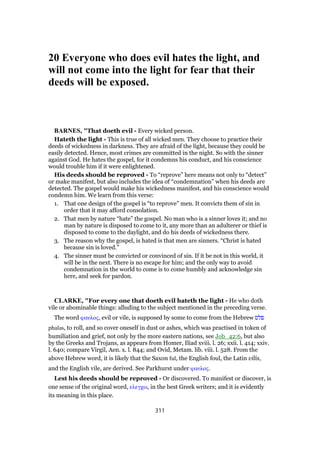
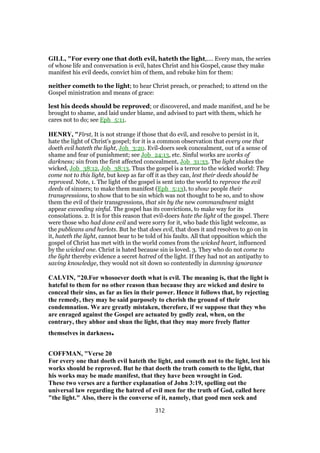
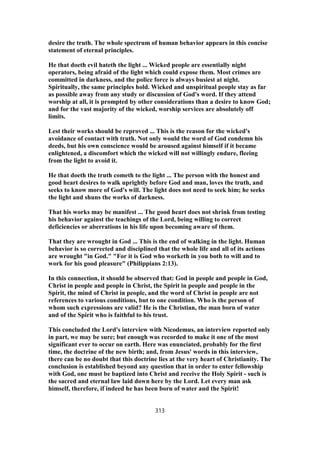
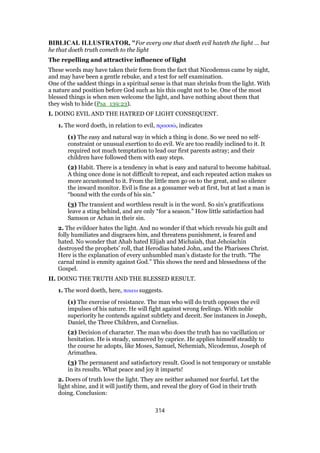
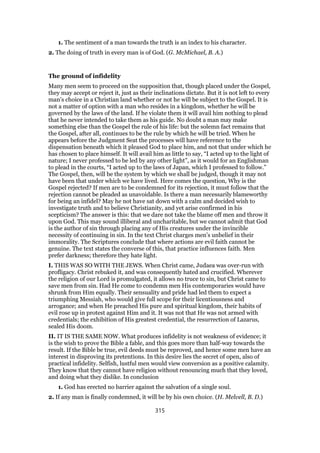
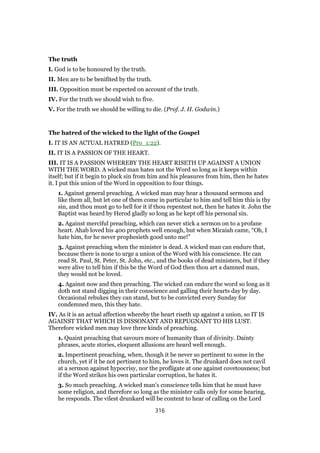
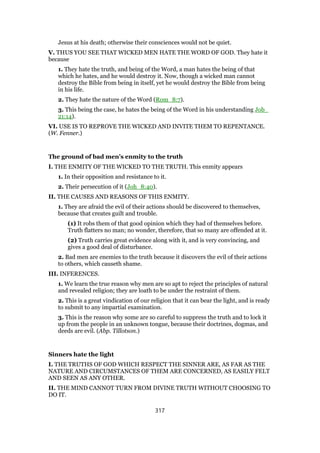

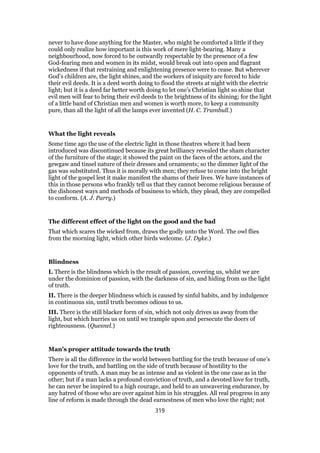
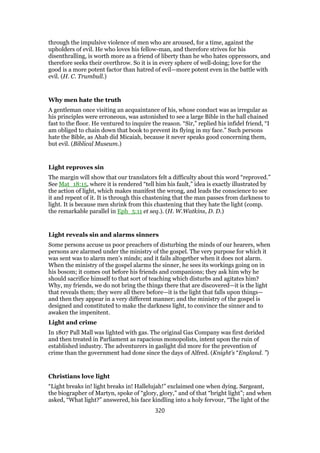
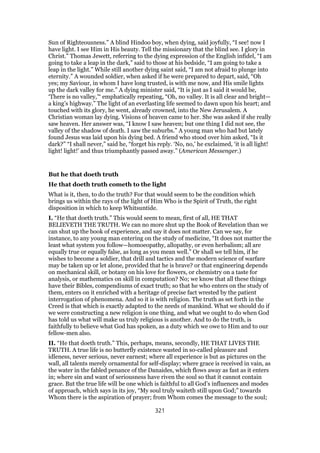
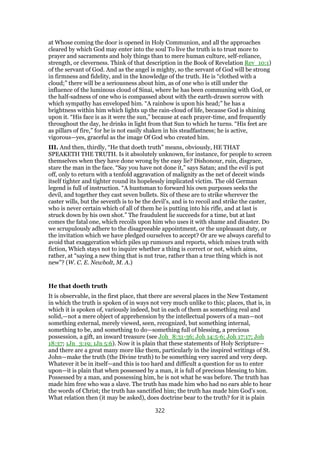
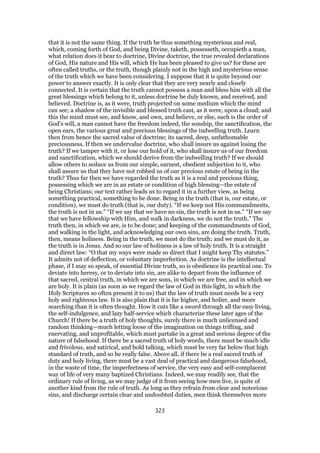
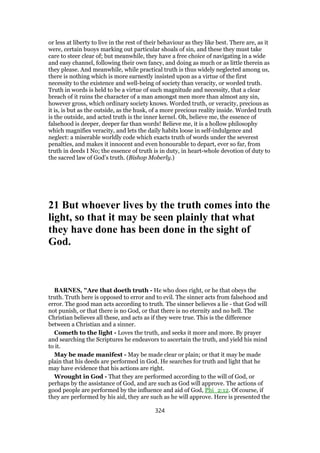
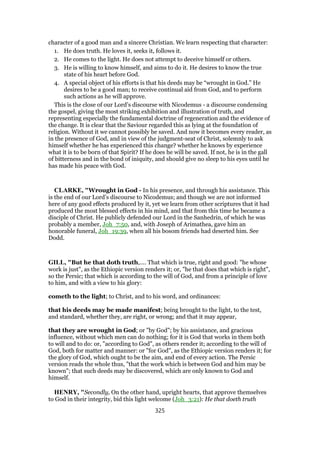
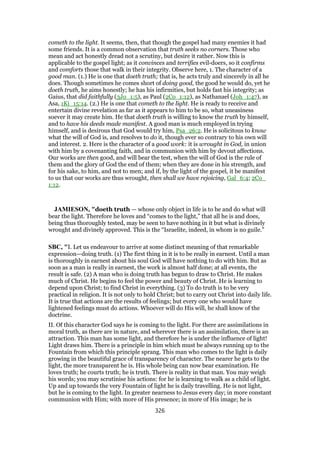
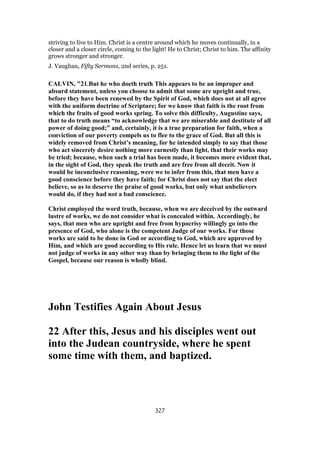
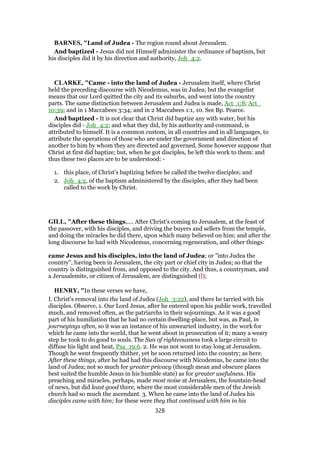
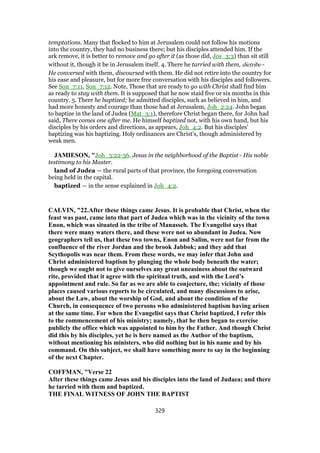
![Into the land of Judaea ... is somewhat of an indefinite location of Jesus' activity
at this point; but Hendriksen suggestion the location was "not far from Jericho,
near the fords of the Jordan."[20]
This Gospel gives the Judean ministry of Christ, almost totally omitted by the
synoptics. The Spirit of God directed the apostles in the choice of the material
they included. Jesus had definitely stressed the fact that the Gospel should first
be offered to the Jews and then to the Gentiles (Luke 24:27; Acts 1:8); and "to
the Jew first" became a slogan of the missionary work of Paul, and presumably
of all the apostles. How fitting, therefore, that the Lord himself should have
carried his great message first to the Jews as revealed in this Gospel, and as we
should not have known if only the synoptics existed. Furthermore, this Judean
ministry explains a number of statements in the synoptics which, in the light of
this Gospel, are clear references to the Judean ministry. Thus, Jesus said in
Matthew that he had "often" attempted to gather the citizens of Jerusalem unto
himself (Matthew 23:37). See Matthew 26:6; Mark 14:3if, and Luke 13:34,35, all
of which are trace references to the great Judean ministry of Jesus which
occurred before John the Baptist was cast into prison, a fact John stressed, thus
making it very early in the Lord's ministry. This Judean part of it lasted from
May until December.
His disciples ... probably refers to the six already mentioned in this Gospel:
Peter, James, John, Andrew, Philip, and Nathaniel. It is not certain if more had
been added at this time or not.
He tarried with them and baptized ... It must be assumed that Jesus took up the
work of carrying forward God's work already being evident in the labors of
John the Baptist, and that the baptism administered by Jesus (through his
disciples) was God's baptism exactly like that of the great herald. It must not be
thought that Jesus, in any sense, was here working under the administration of
John the Baptist. John was a servant carrying out God's orders; and Jesus was a
Son doing the same thing; but in order not to mislead anyone, Jesus refrained
from administering God's baptism personally, doing so only through his
disciples.
This taking a hand in the preaching of baptism, on the part of Jesus, was
probably the result of our Lord's having seen the urgent need in his interview
with Nicodemus. With the blindness of the religious leaders in their rejection of
John the Baptist's preaching, it was clear that John needed all the help he could
get; therefore, Jesus encouraged his disciples to take a hand in the baptizing. The
connection of John's baptism (so-called) with the kingdom of heaven lies in the
fact of its being the only baptism submitted to by the Lord's disciples prior to
Pentecost; for all such, it was not necessary for them to be baptized again, but
only to receive the Holy Spirit, thus completing in them the new birth. After
Pentecost, the old baptism was no longer valid, but was replaced by the baptism
of the great commission.
Nothing may be made of the fact that Jesus did not baptize, but his disciples
330](https://image.slidesharecdn.com/john3commentary-151103172742-lva1-app6891/85/John-3-commentary-330-320.jpg)
![baptized. See under John 4:2. What one does through his agents he is lawfully
said to do; therefore Jesus baptized. Why did he refrain from doing so
personally? It might have given rise to jealousies and strife, later on, through
some claiming greater privilege in having been baptized personally by the Lord.
Perhaps, as noted above, it was to avoid any mistaken notion that Jesus was one
of John's subordinates. Furthermore, although Jesus had submitted to God's
baptism as preached by John, and for a time administered by himself through
his disciples, he was nevertheless above John's baptism in the sense that baptism
in his own blessed name was designed to succeed it. For more on the baptism of
Christ, see my Commentary on Matthew, Matthew 3:13.
ENDNOTE:
[20] William Hendriksen, Exposition of the Gospel according to John (Grand
Rapids, Michigan: Baker Book House, 1961), p. 146.
BARCLAY, "A MAN WITHOUT ENVY (John 3:22-30)
3:22-30 After these things Jesus and his disciples went to the district of Judaea.
He spent some time there with them, and he was baptizing; and John was
baptizing at Ainon, near Salem, because there was much water there. The people
kept coming to him and being baptized, for John had not yet been thrown into
prison. A discussion arose between some of John's disciples and a Jew about the
matter of cleansing. So they came to John and said to him: "Rabbi, look now!
The man who was with you on the other side of Jordan, the man to whom you
bore your witness, is baptizing and they are all going to him." John answered:
"A man can receive only what is given to him from heaven. You yourselves can
testify that I said, 'I am not the Anointed One of God,' but, 'I have been sent
before him.' He who has the bride is the bridegroom. But the friend of the
bridegroom who stands and listens for him, rejoices at the sound of the voice of
the bridegroom. So, then, my joy is complete. He must increase, but I must
decrease."
We have already seen that part of the aim of the writer of the Fourth Gospel is to
ensure that John the Baptist received his proper place as the forerunner of Jesus,
but no higher place than that. There were those who were still ready to call John
master and lord; the writer of the Fourth Gospel wishes to show that John had a
high place, but that the highest place was reserved for Jesus alone; and he also
wishes to show that John himself had never any other idea than that Jesus was
supreme. To that end he shows us the ministry of John and the ministry of Jesus
overlapping. The synoptic gospels are different: Mark 1:14 tells us that it was
after John was put into prison that Jesus began his ministry. We need not argue
which account is historically correct; but the likelihood is that the Fourth Gospel
makes the two ministries overlap so that by contrast the supremacy of Jesus may
be clearly shown.
One thing is certain--this passage shows us the loveliness of the humility of John
the Baptist. It was clear that men were leaving John for Jesus. John's disciples
were worried. They did not like to see their master take second place. They did
not like to see him abandoned while the crowds flocked out to hear and see this
331](https://image.slidesharecdn.com/john3commentary-151103172742-lva1-app6891/85/John-3-commentary-331-320.jpg)
